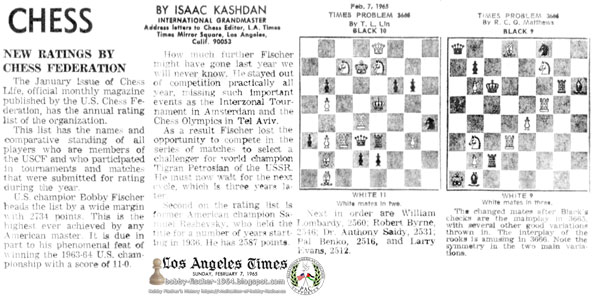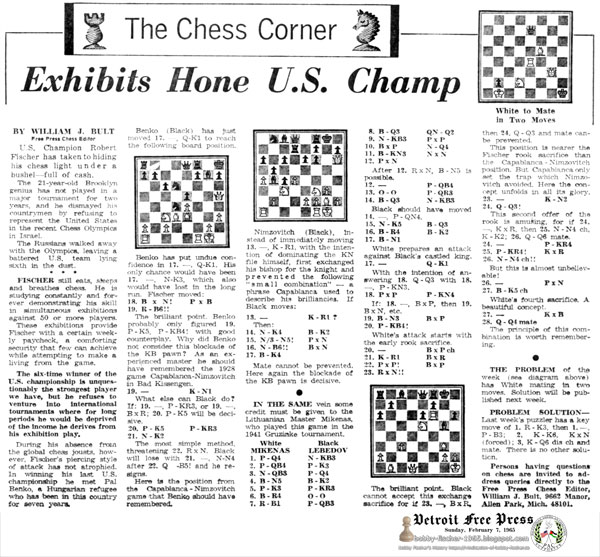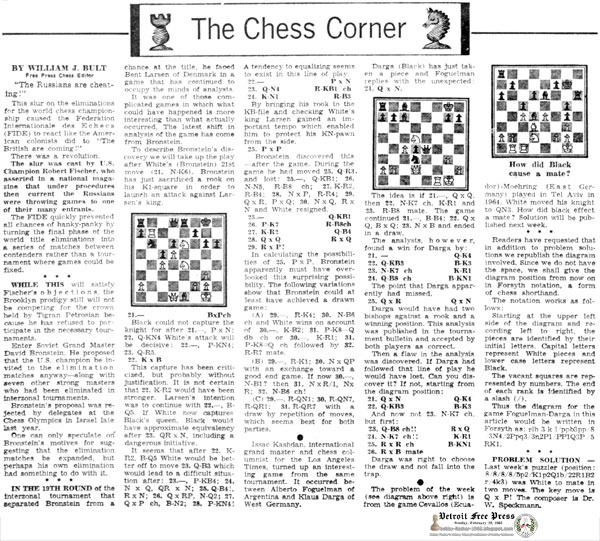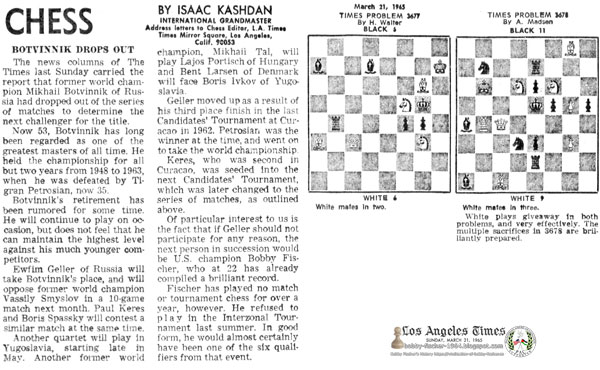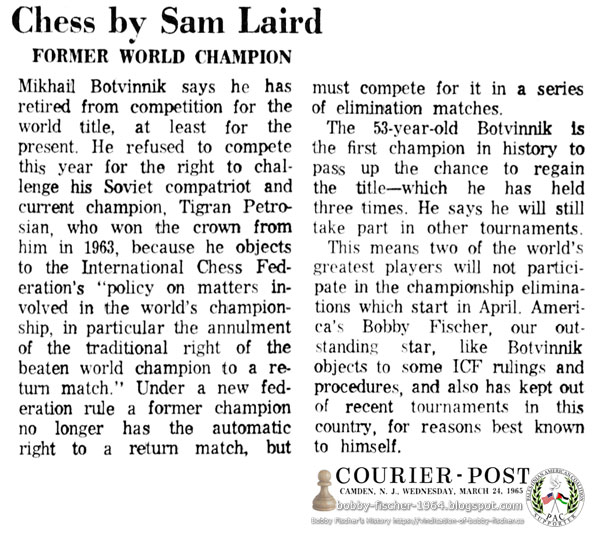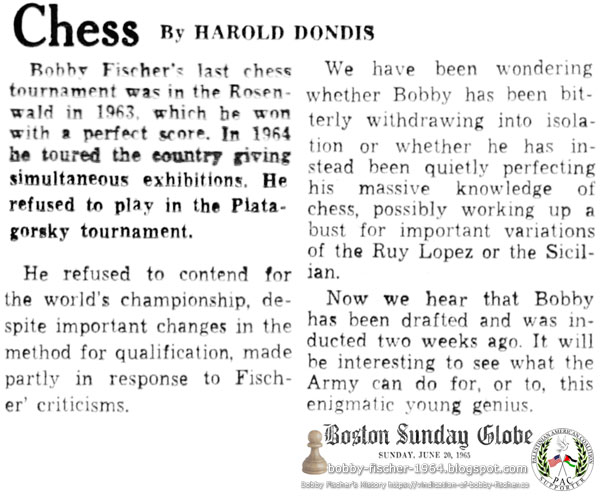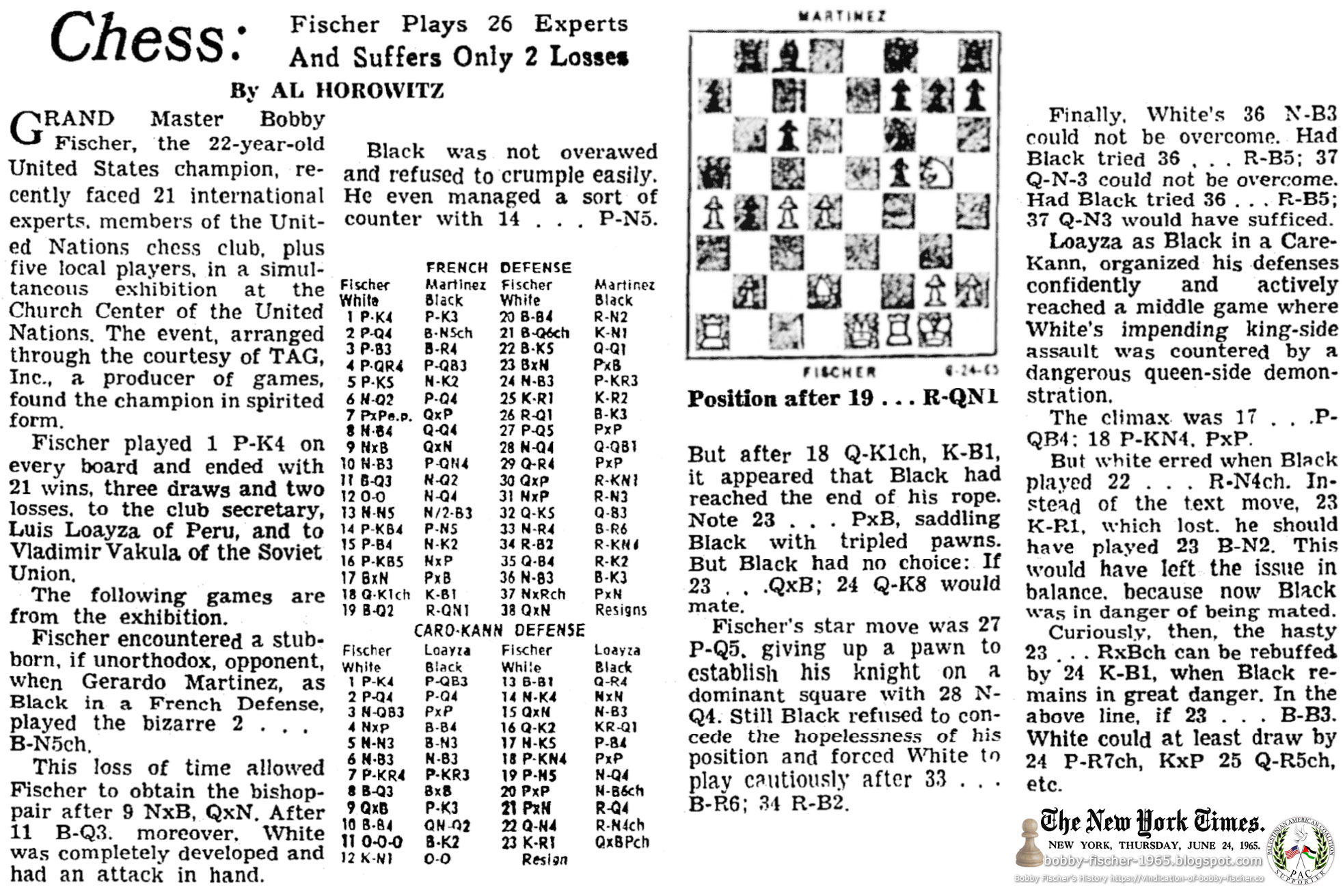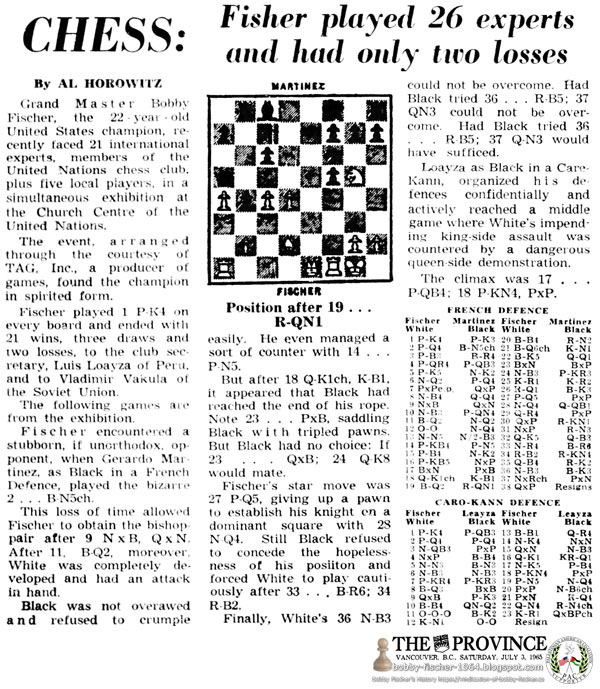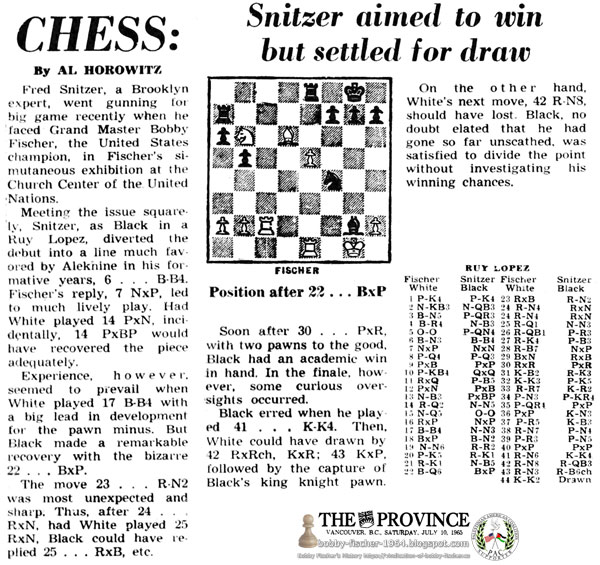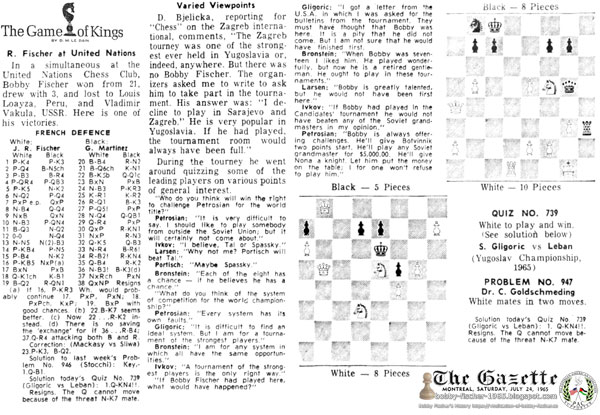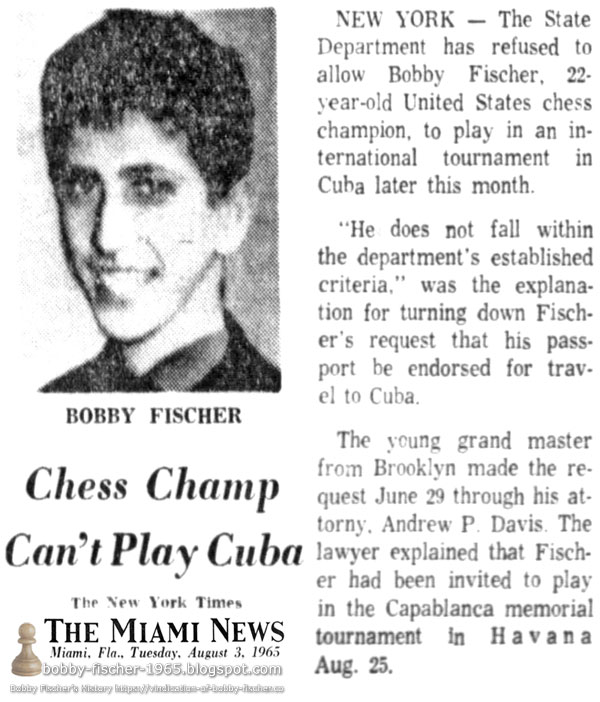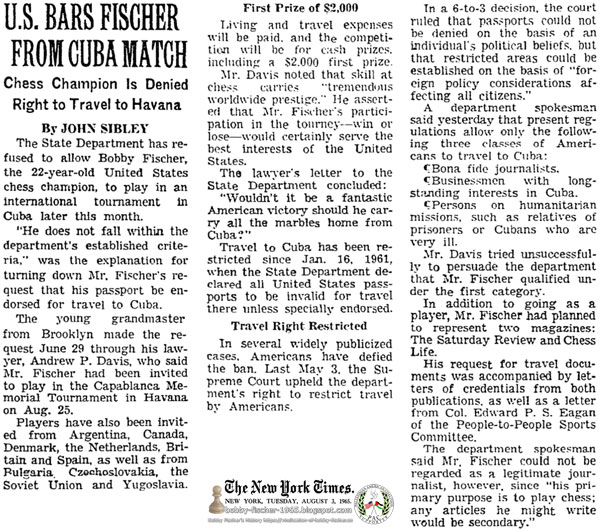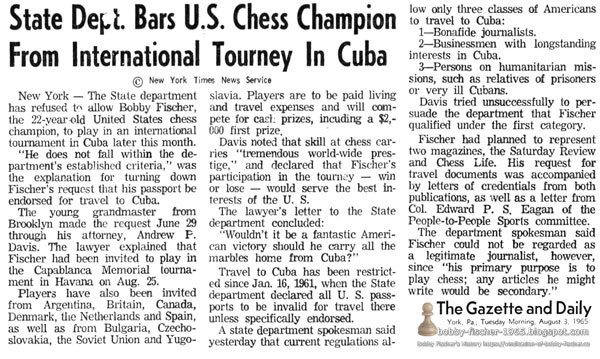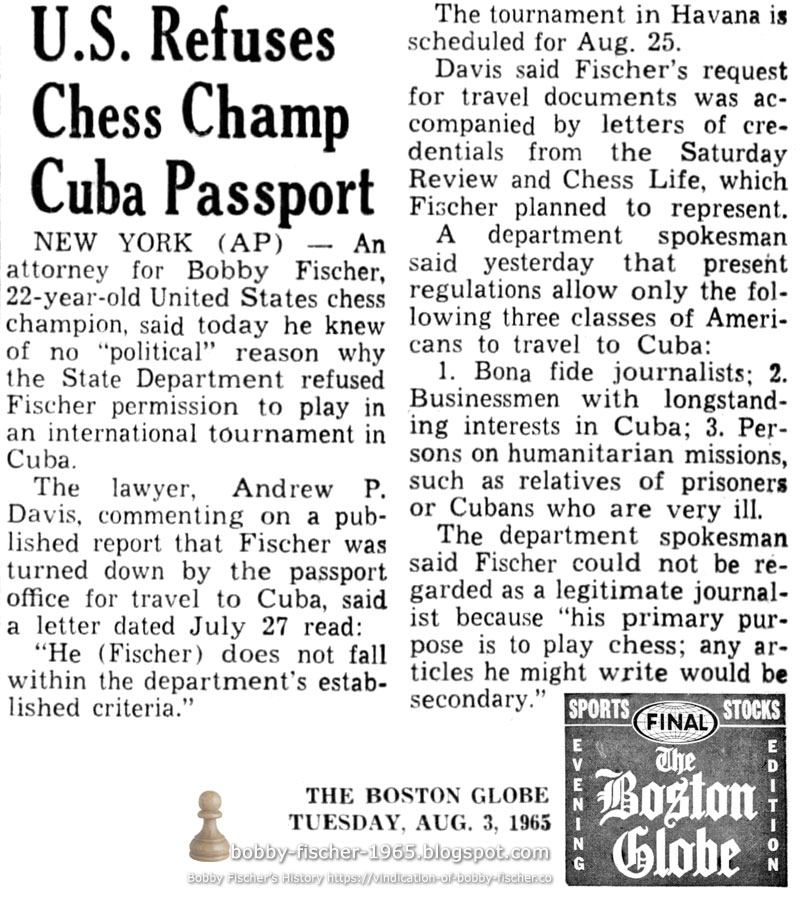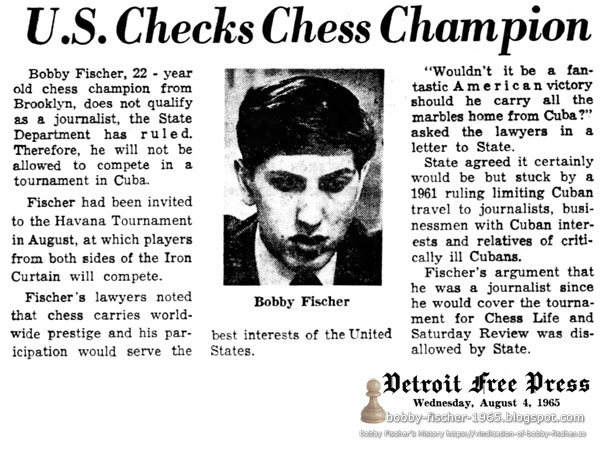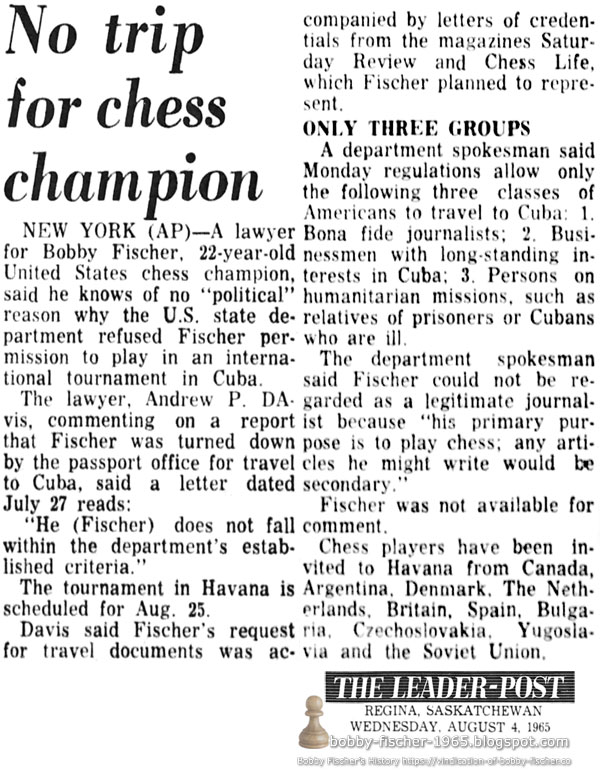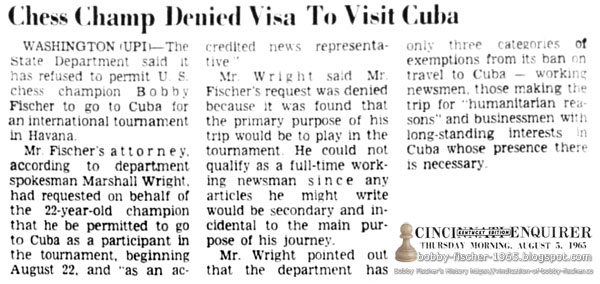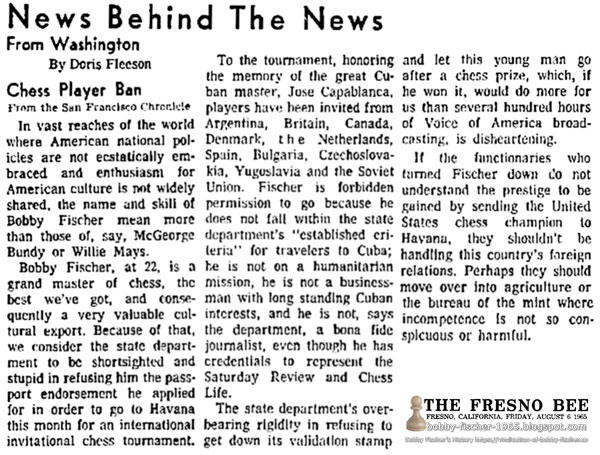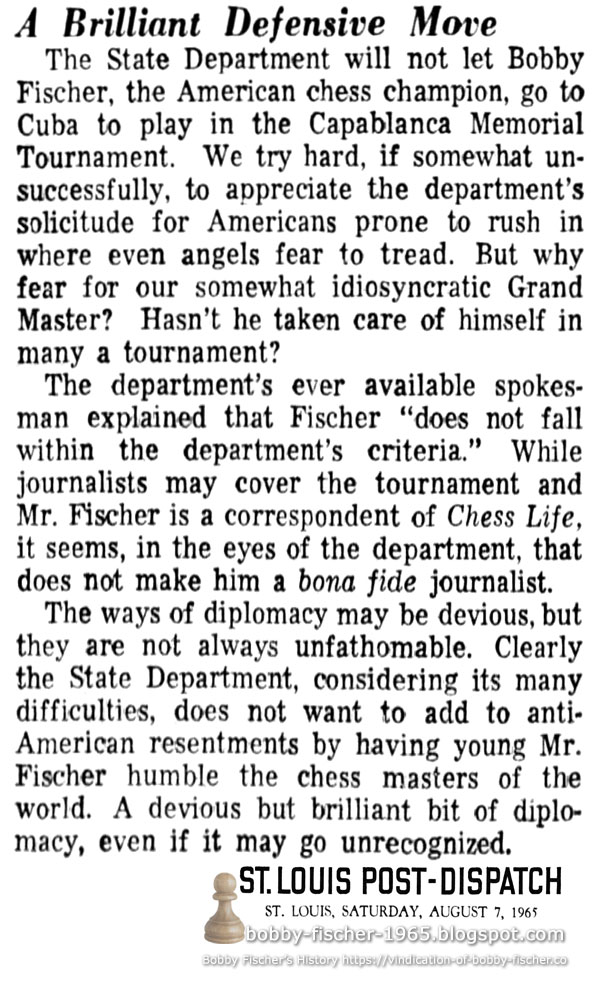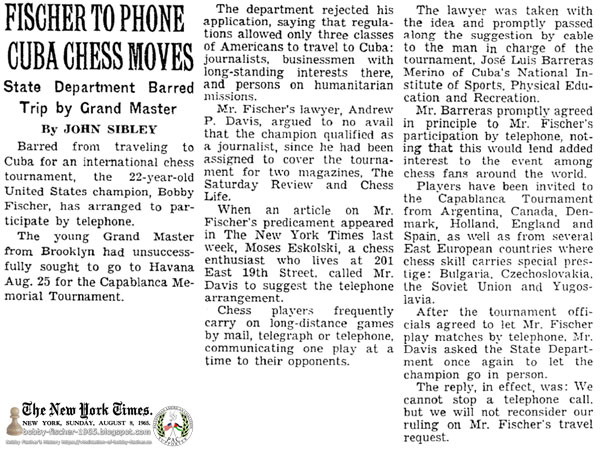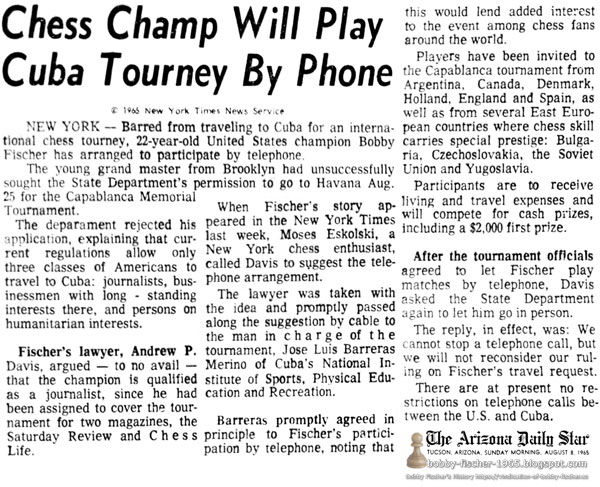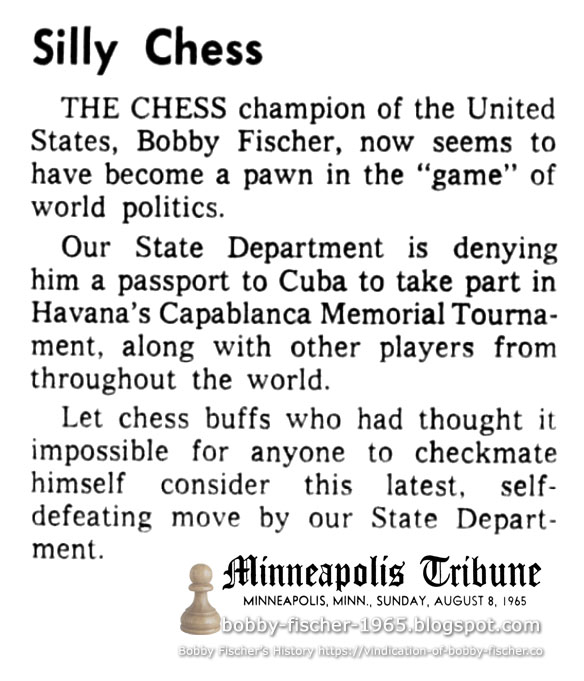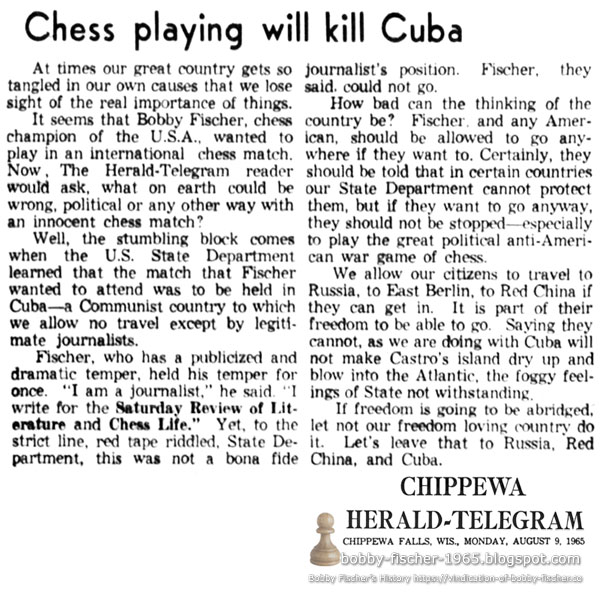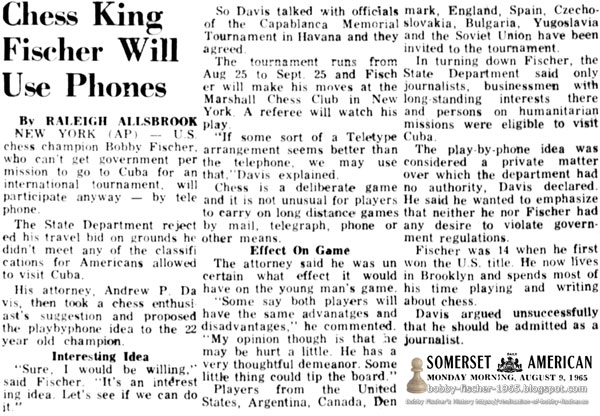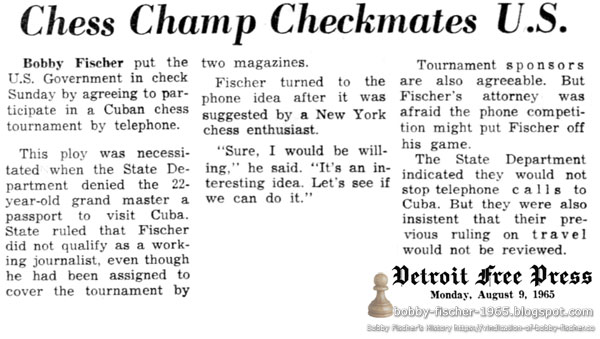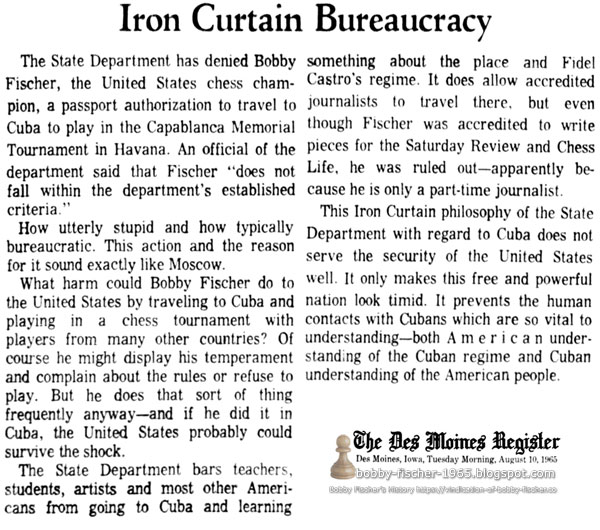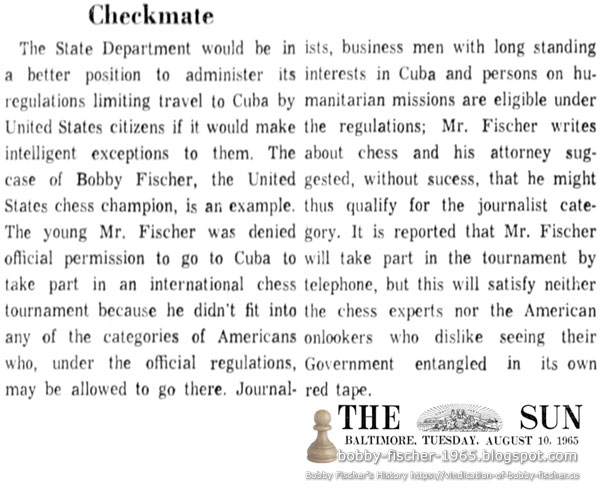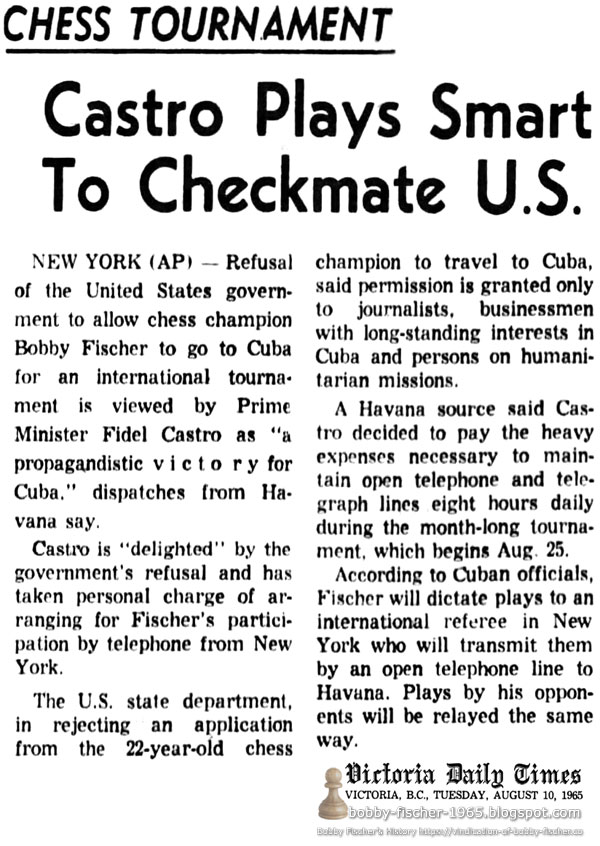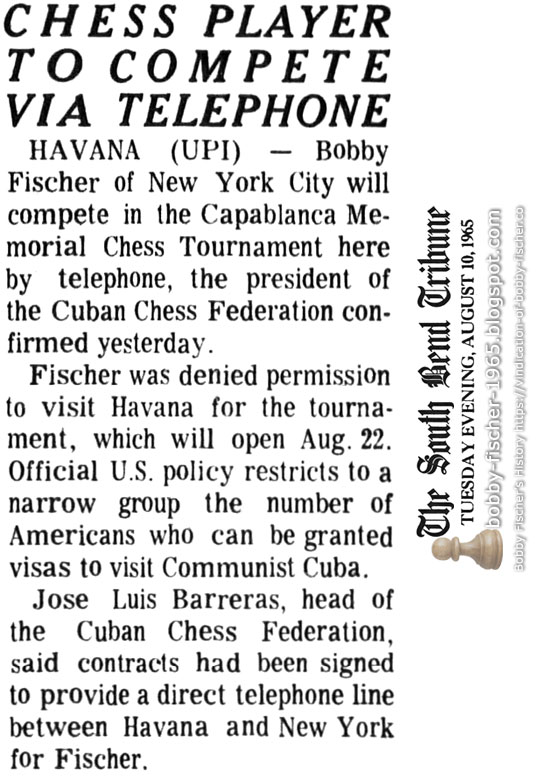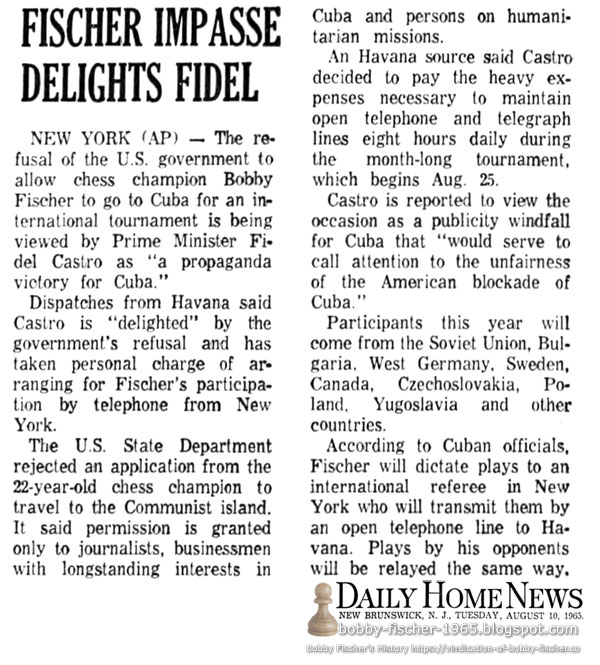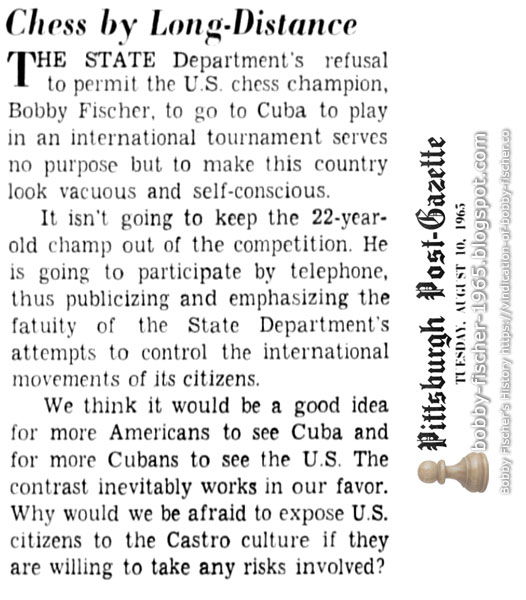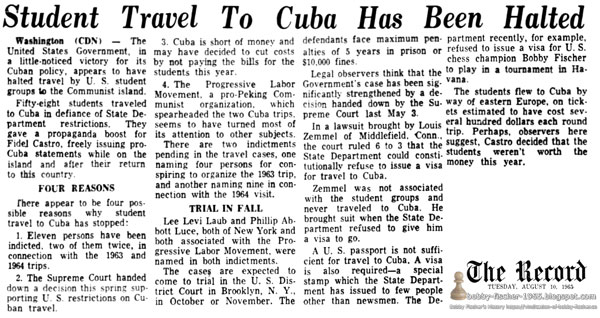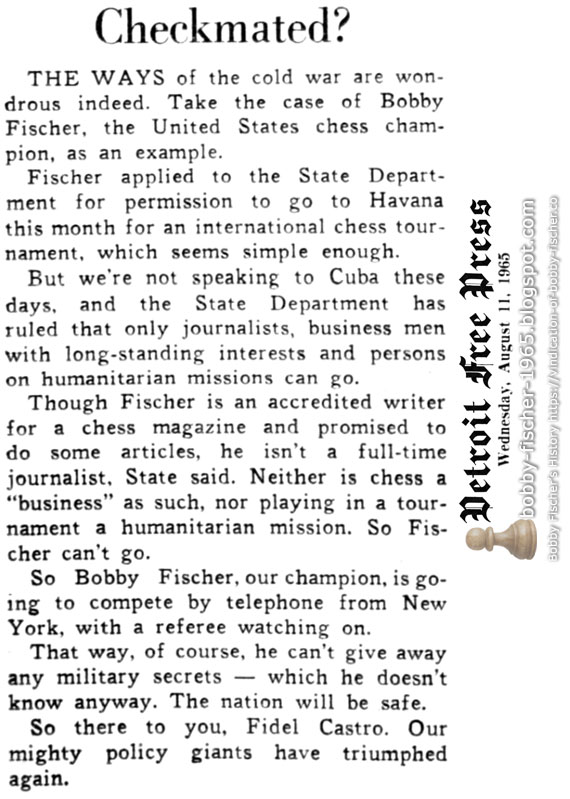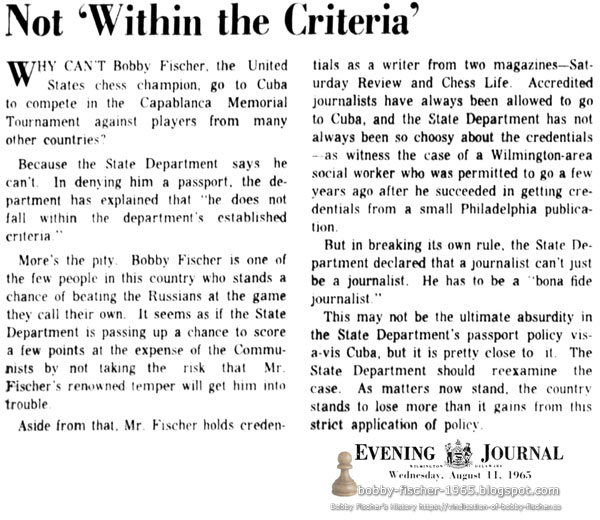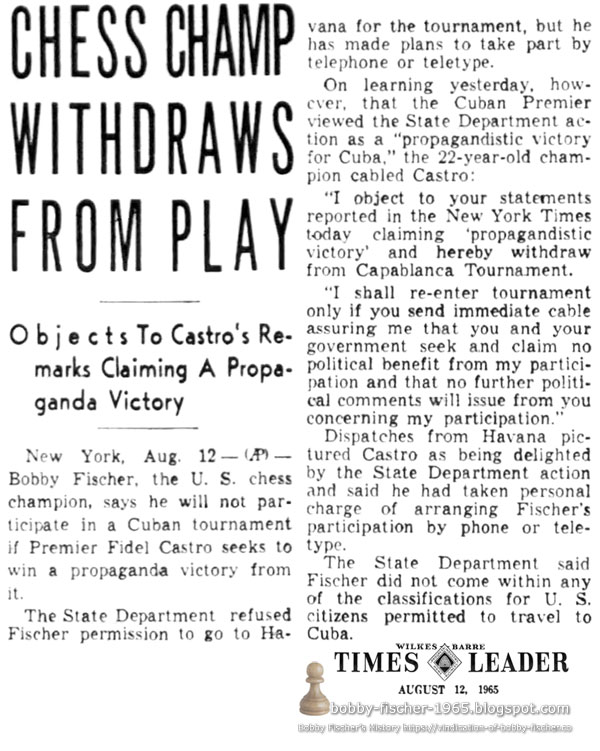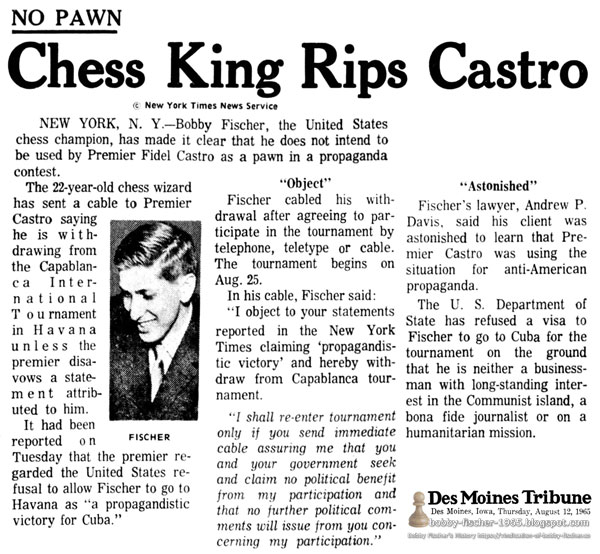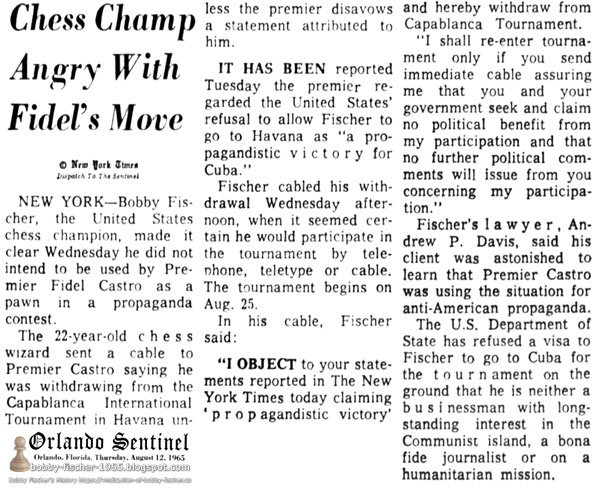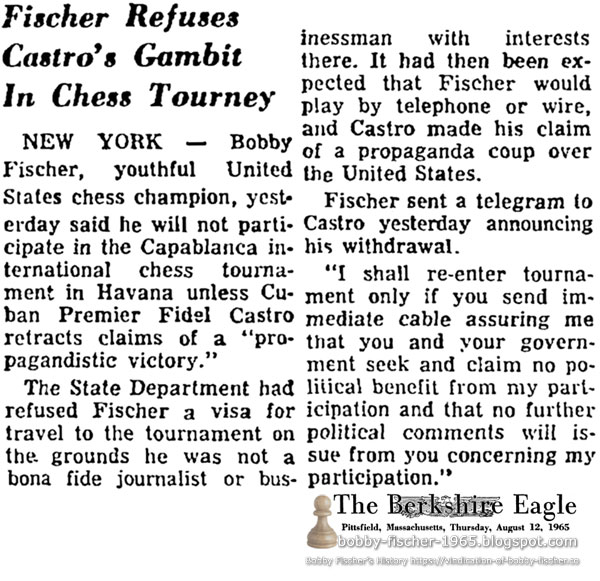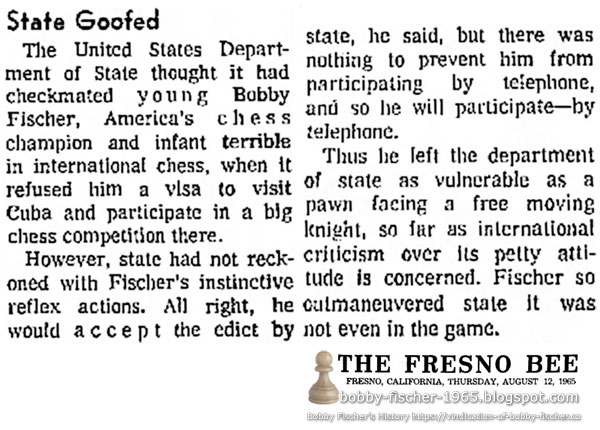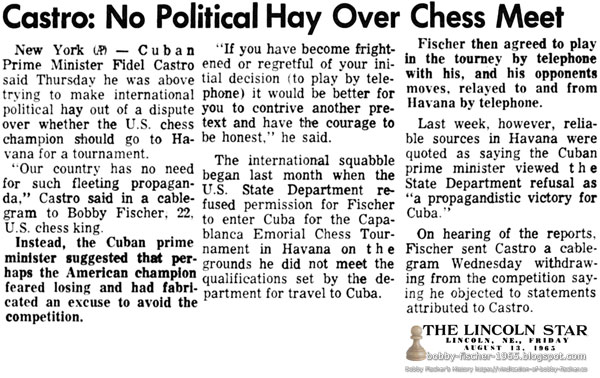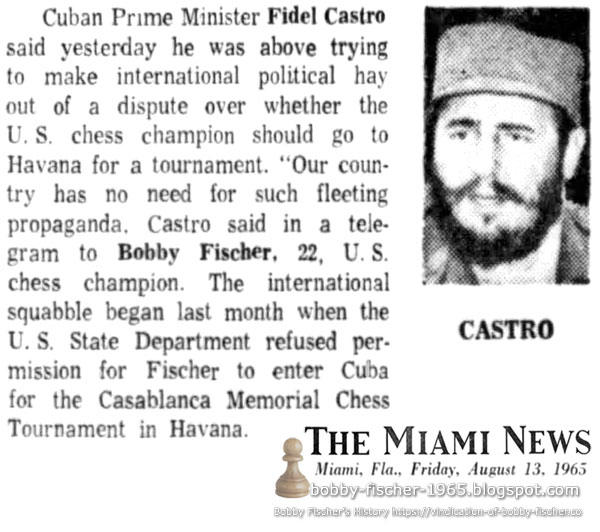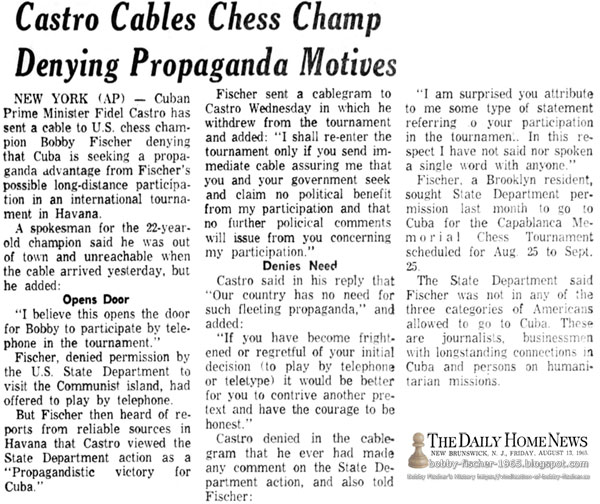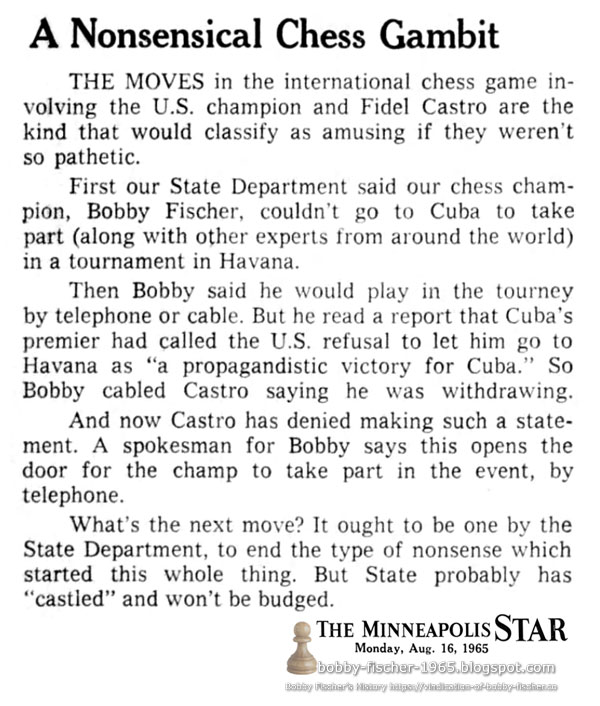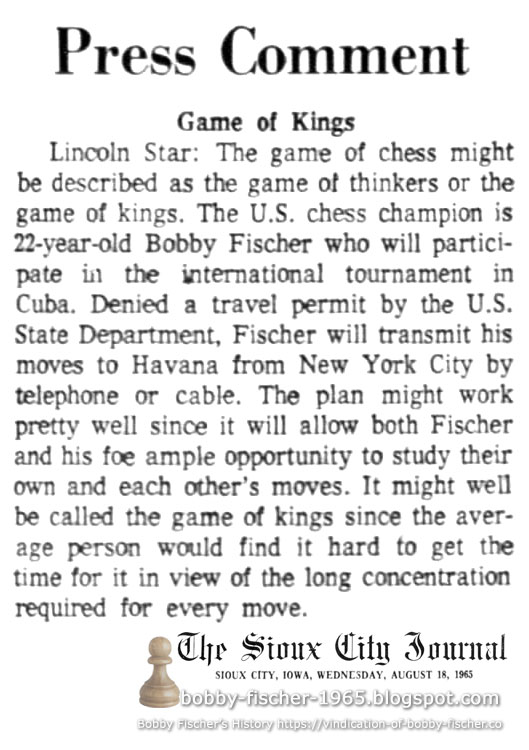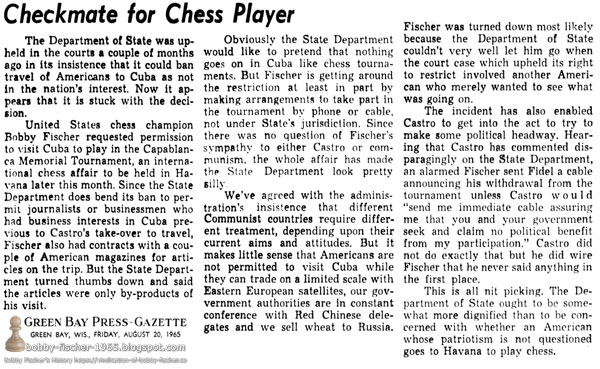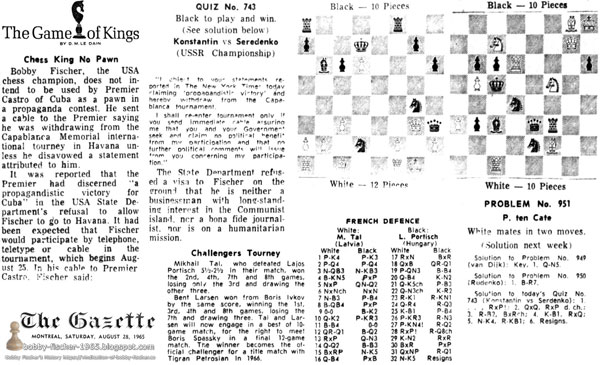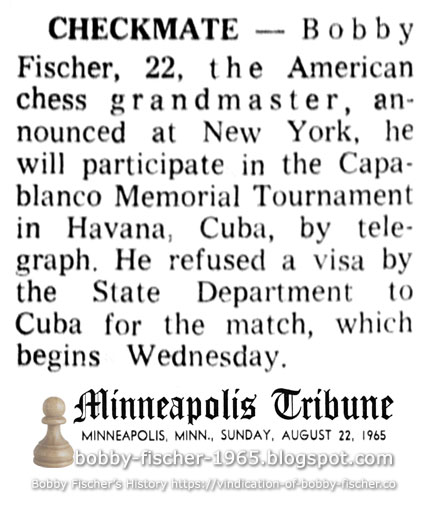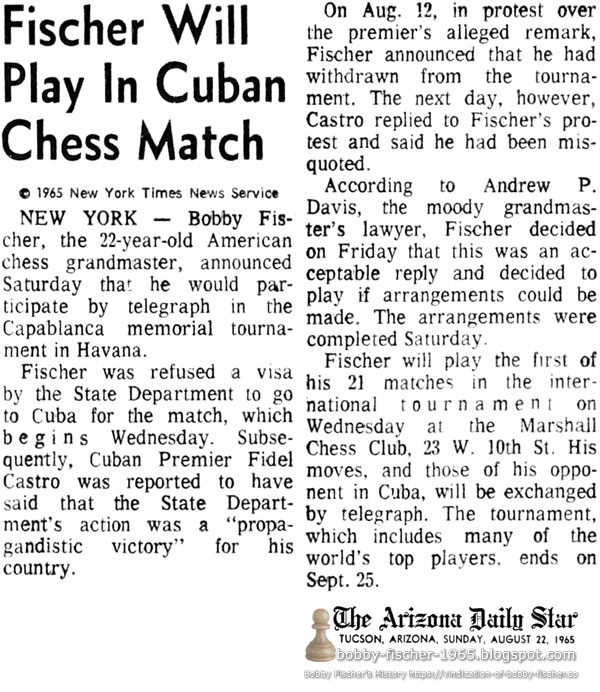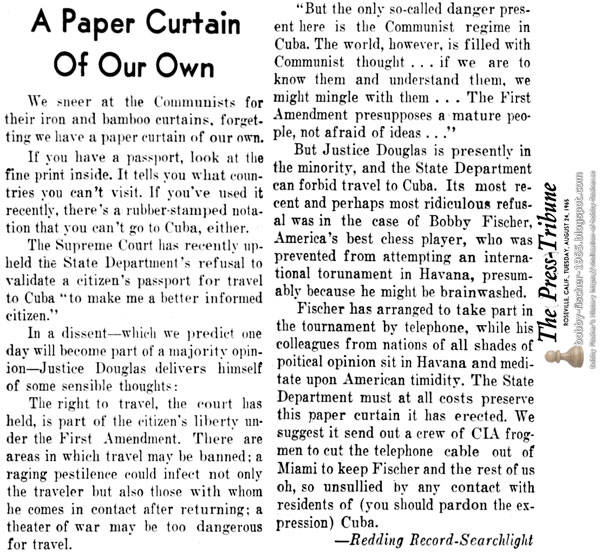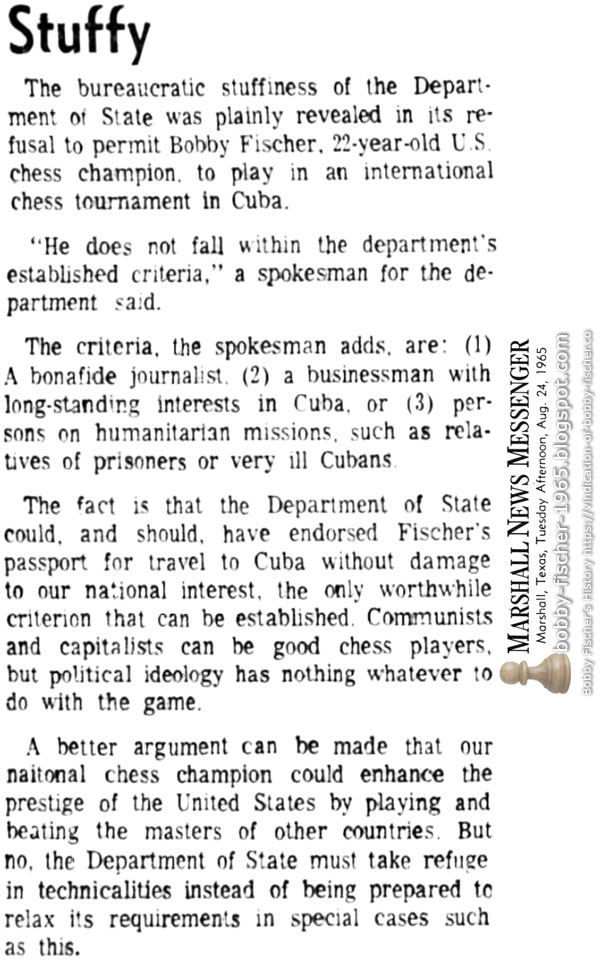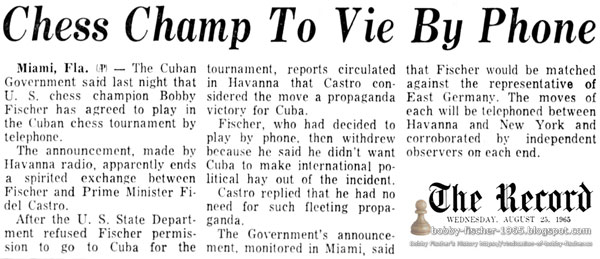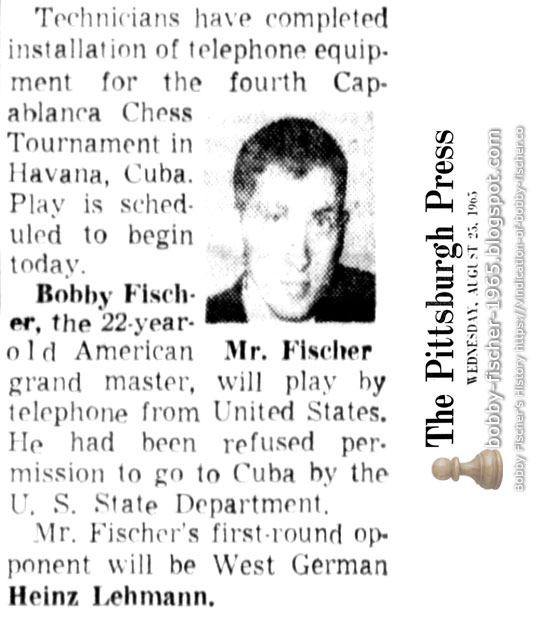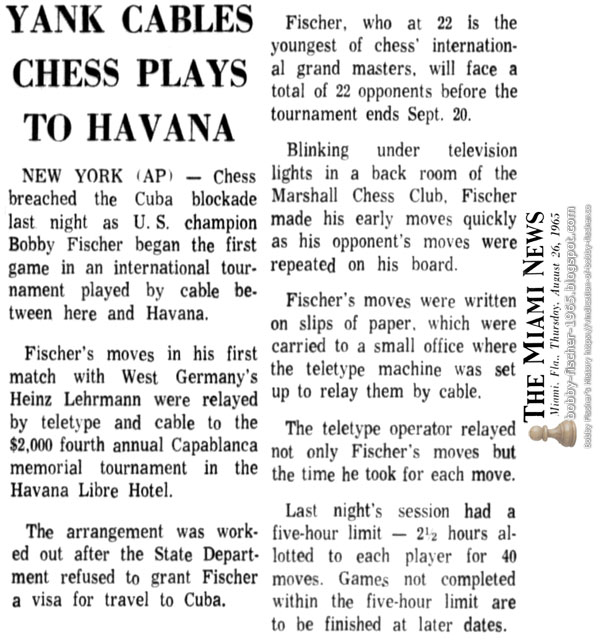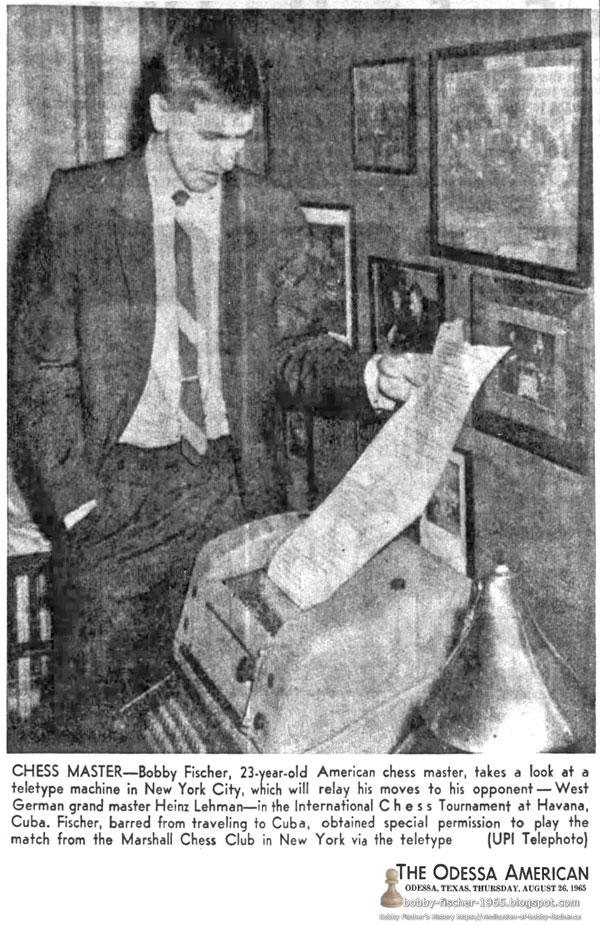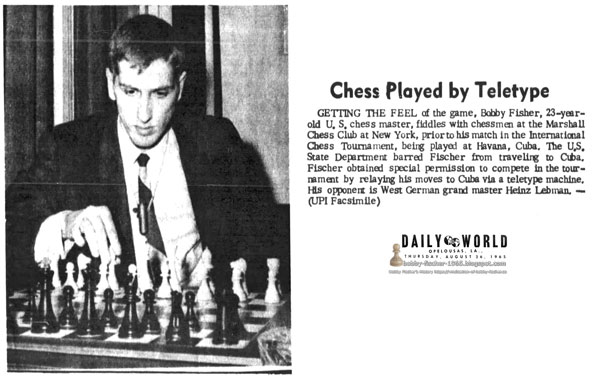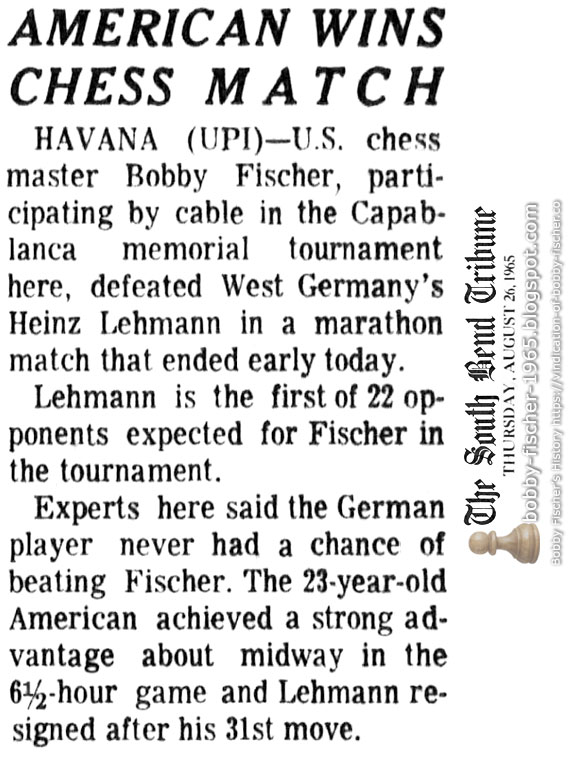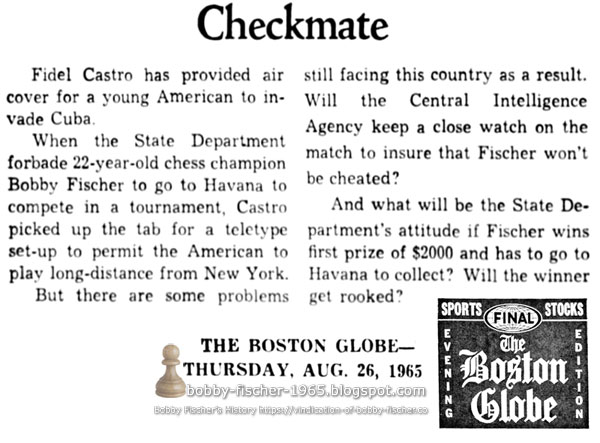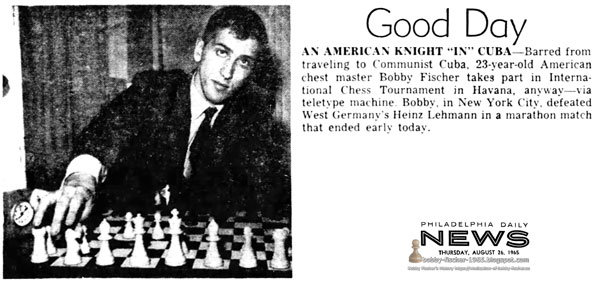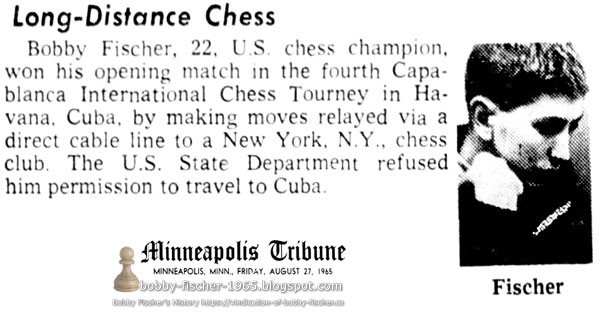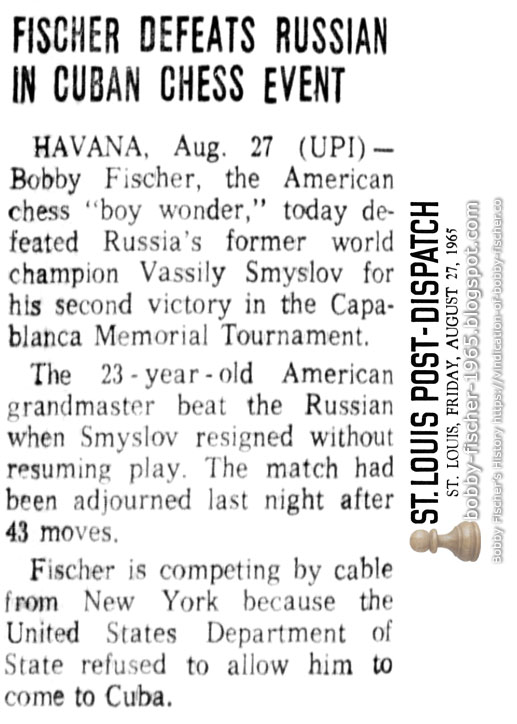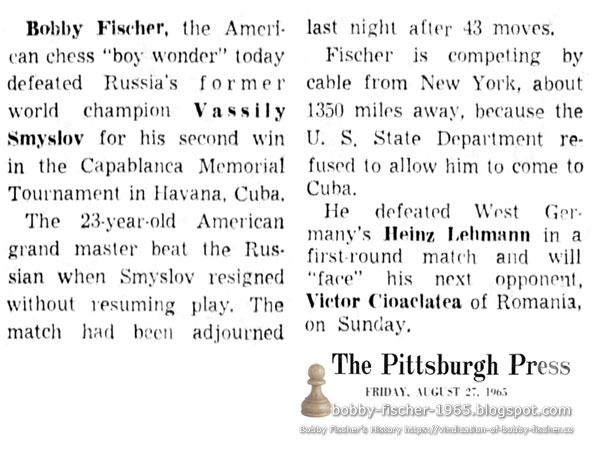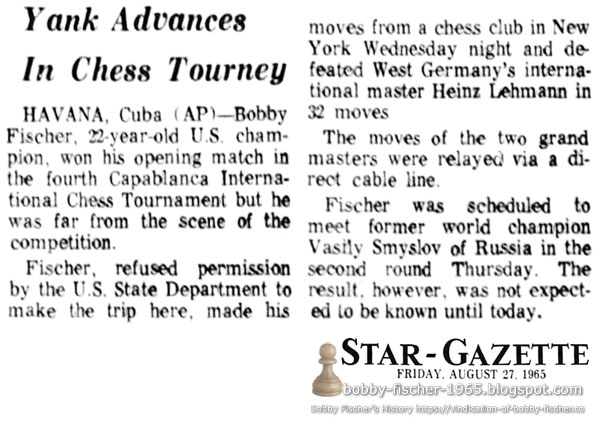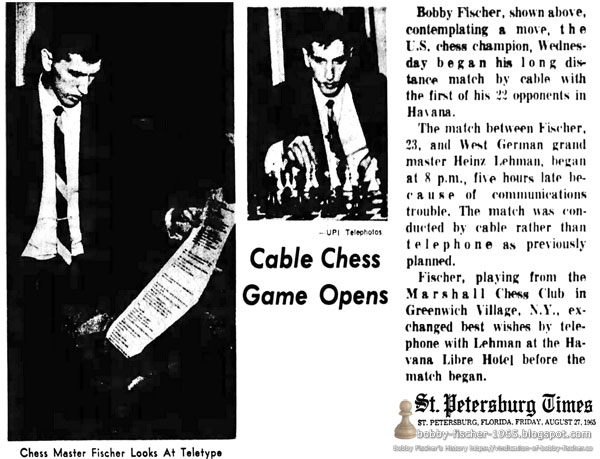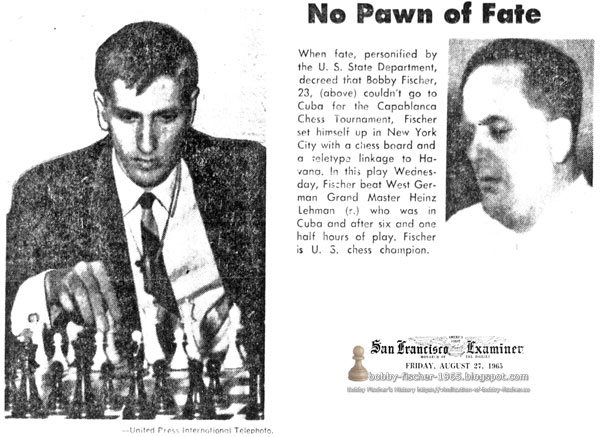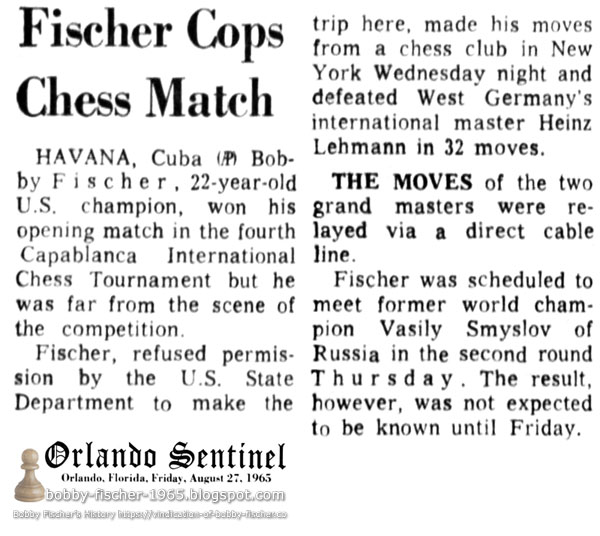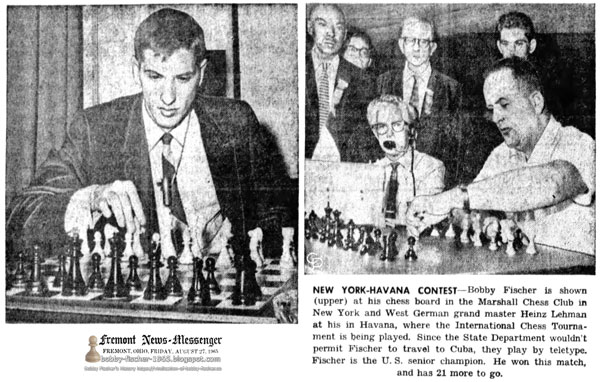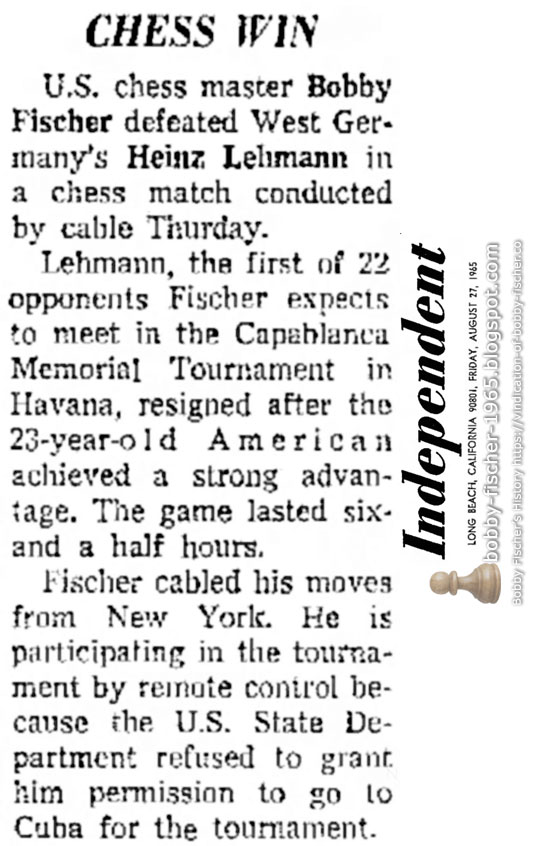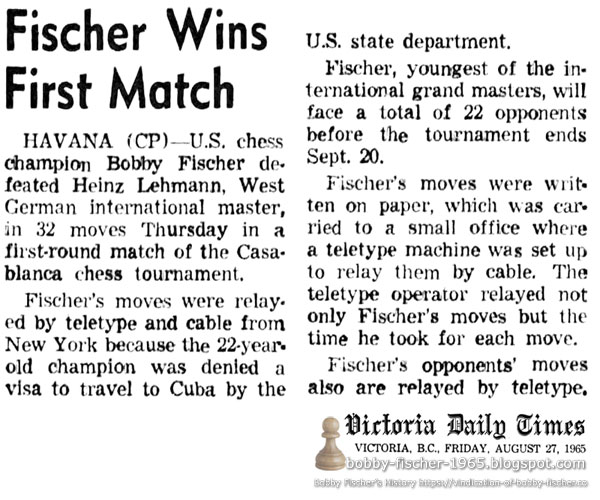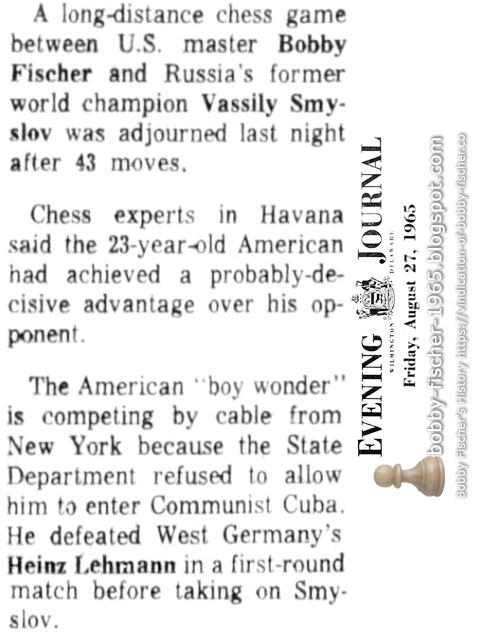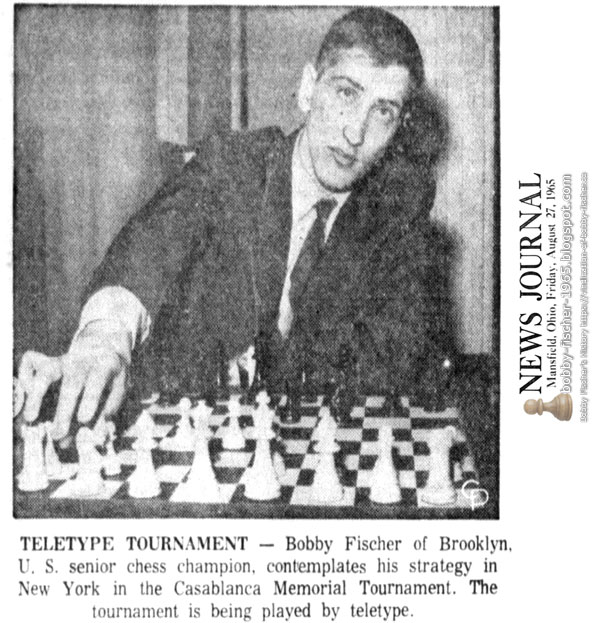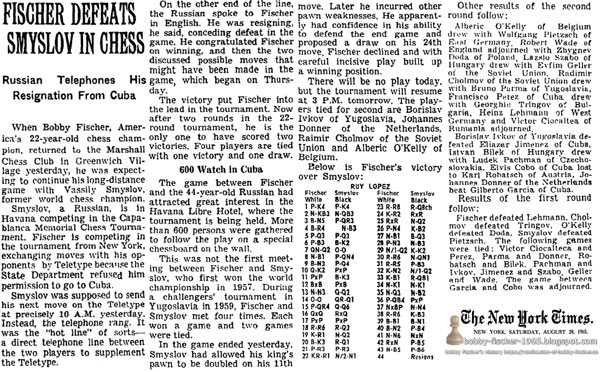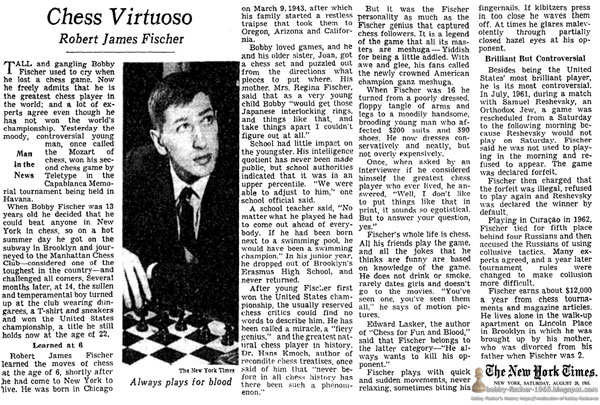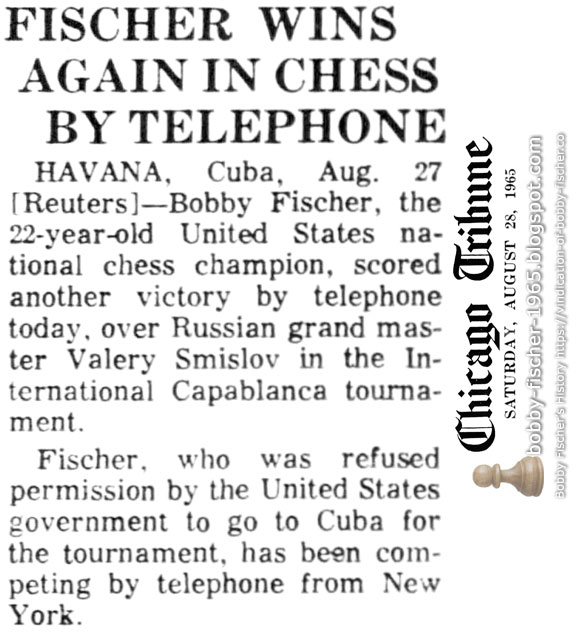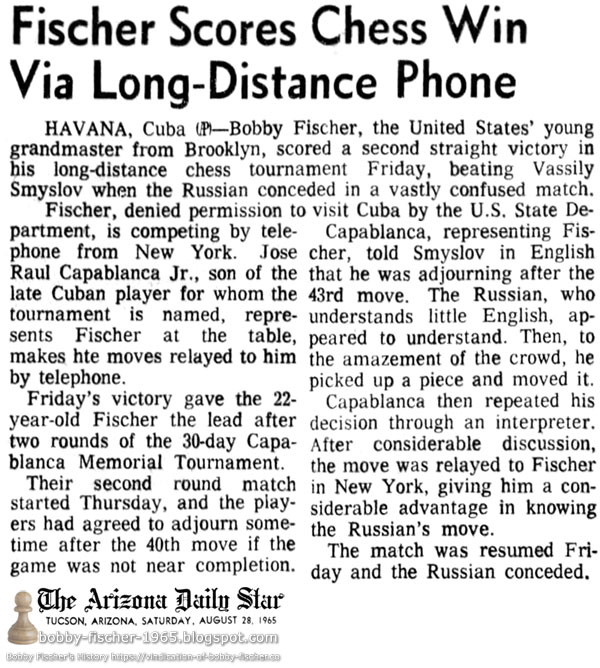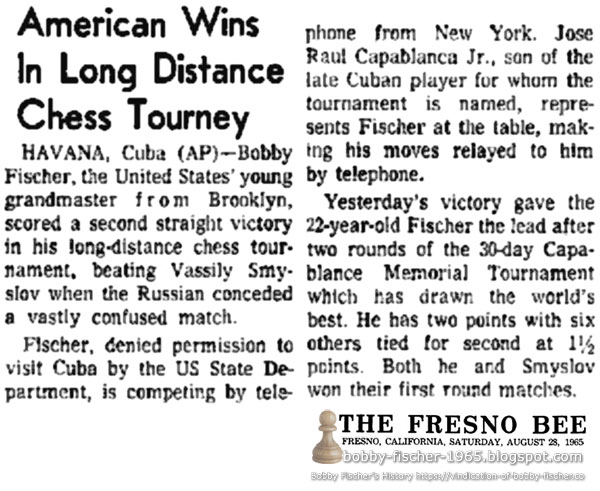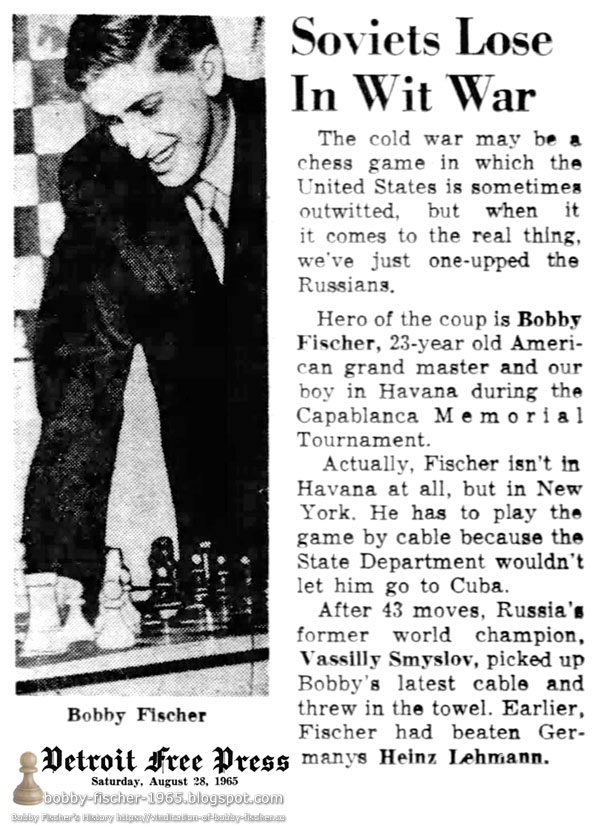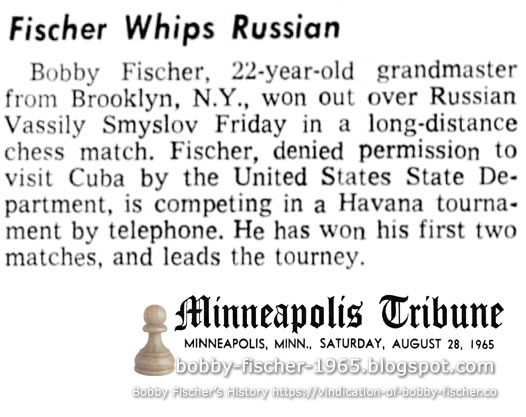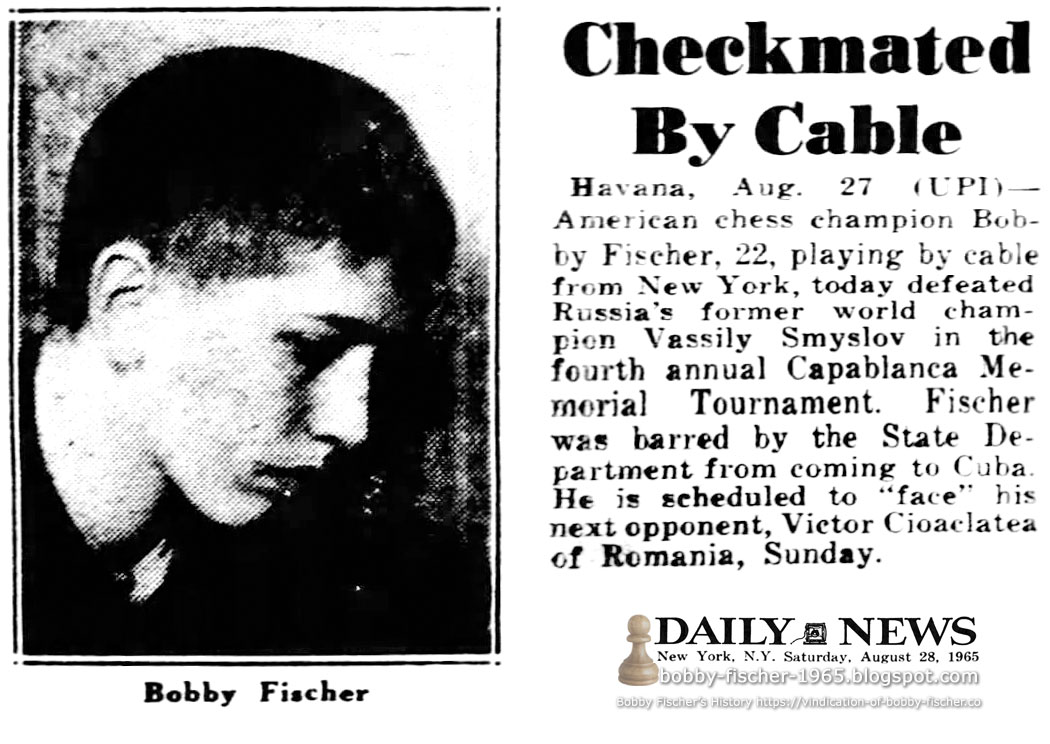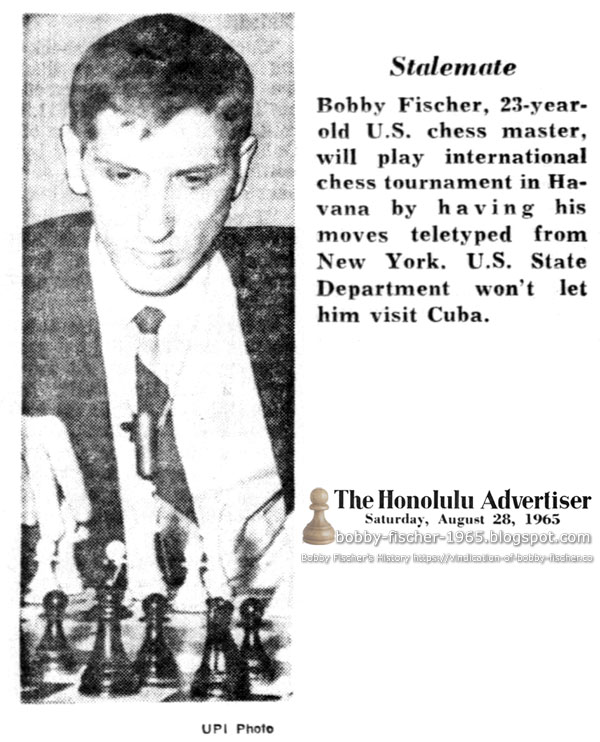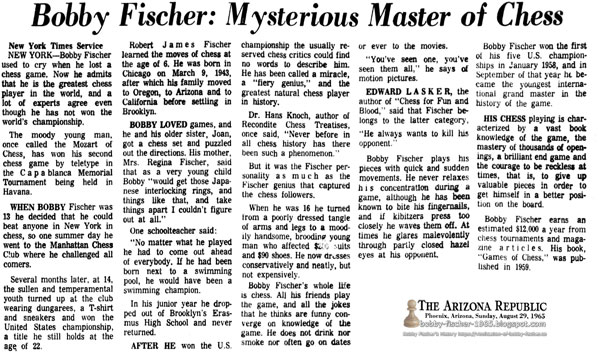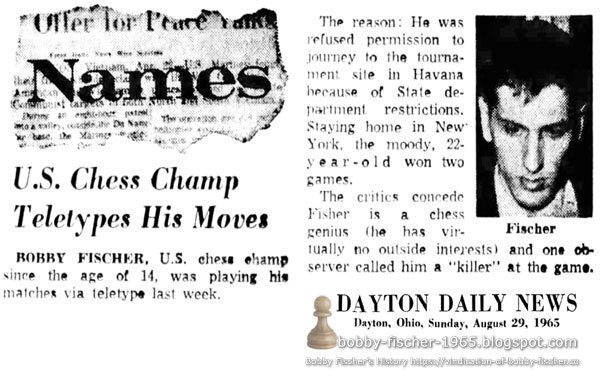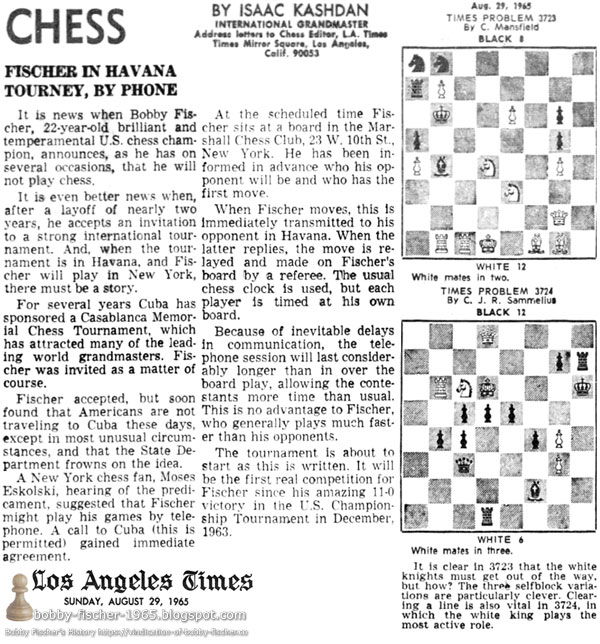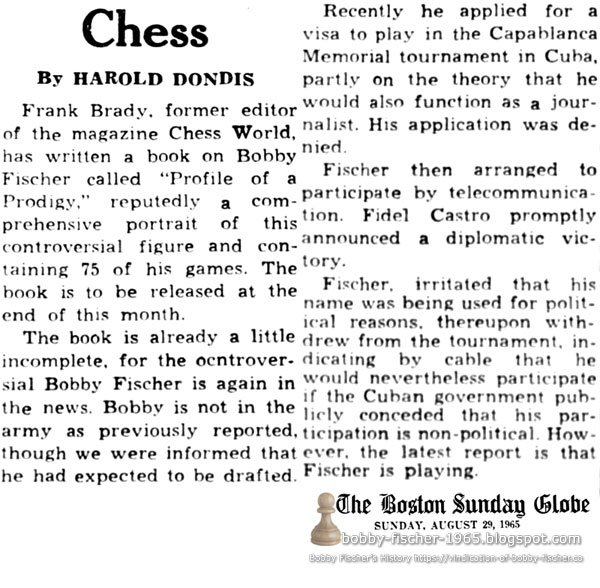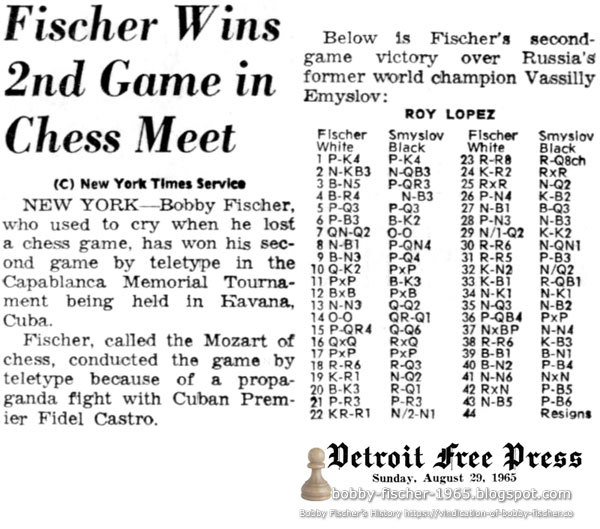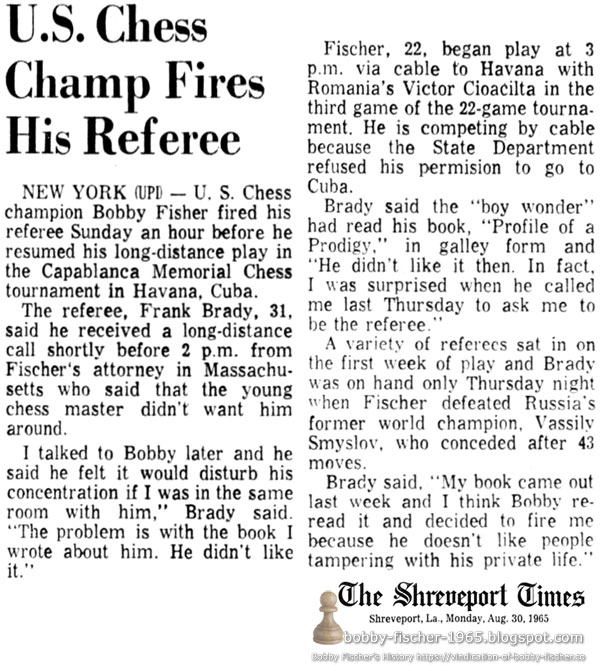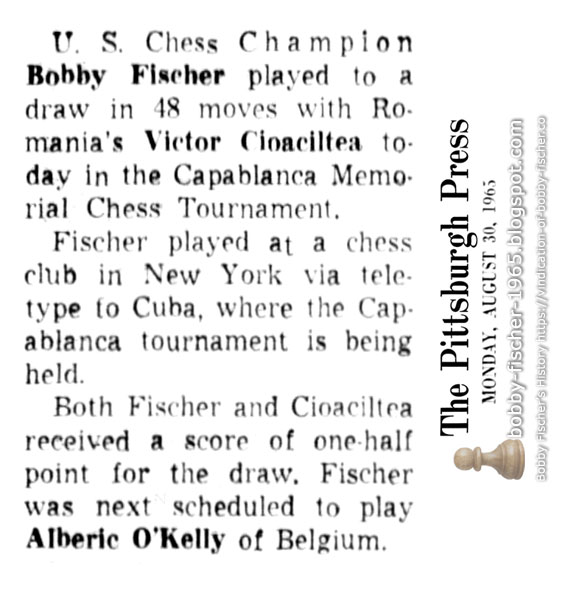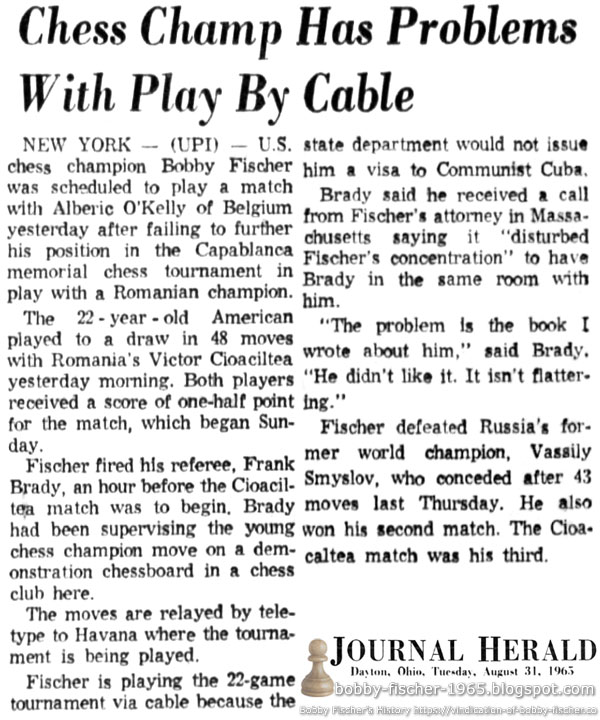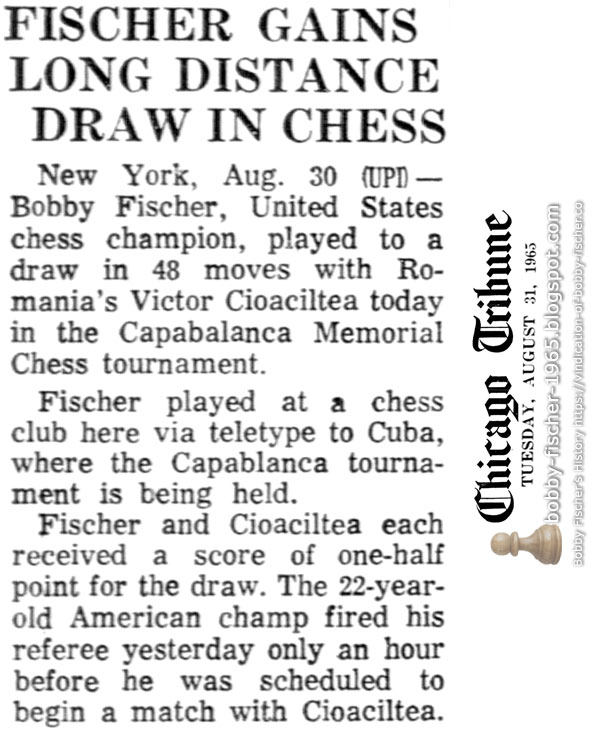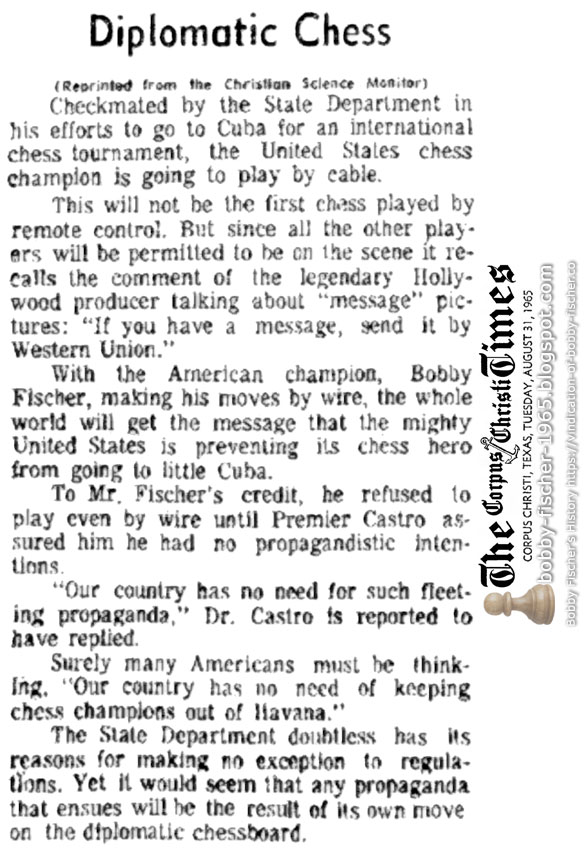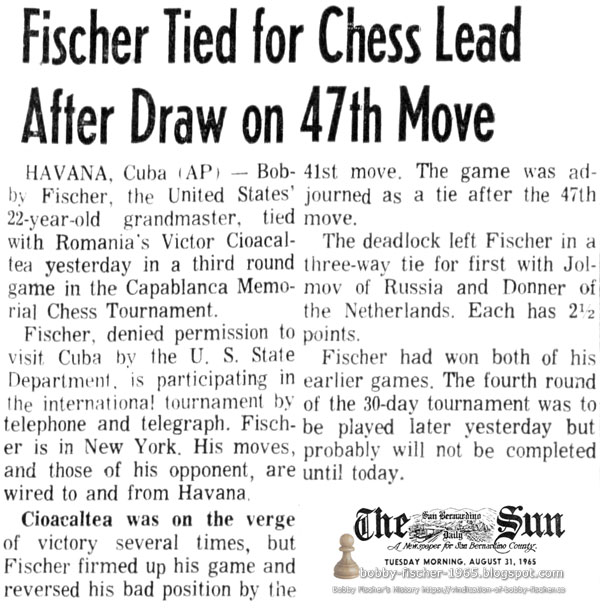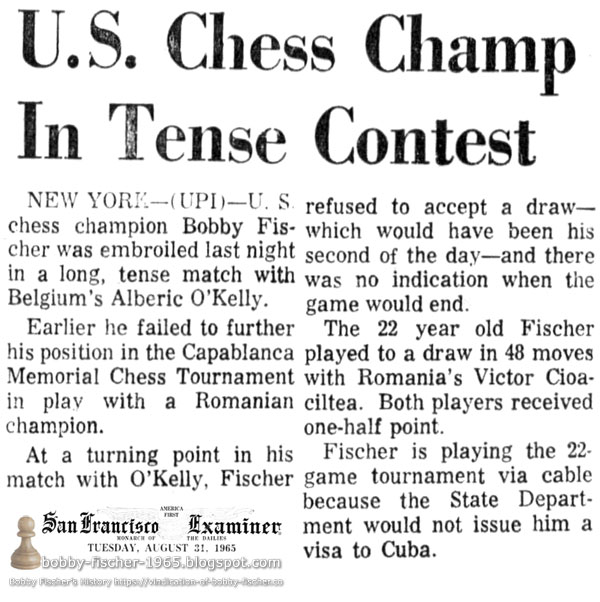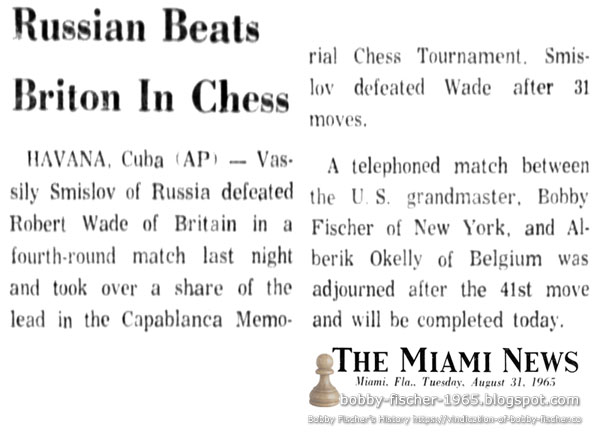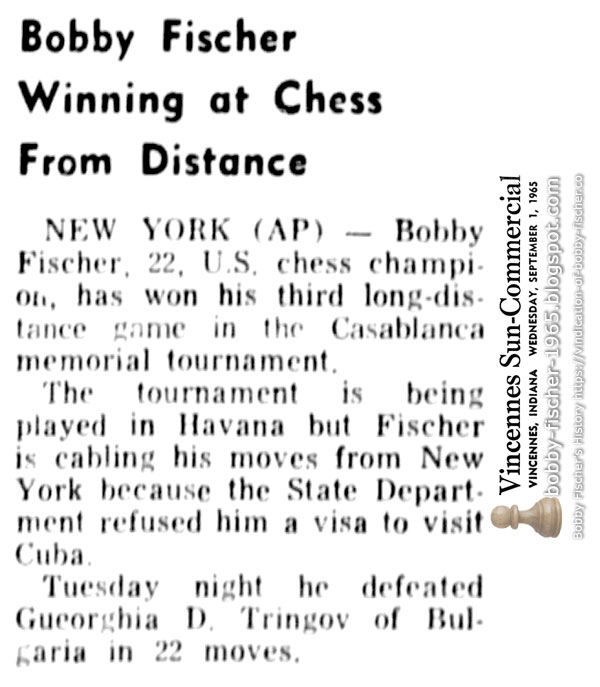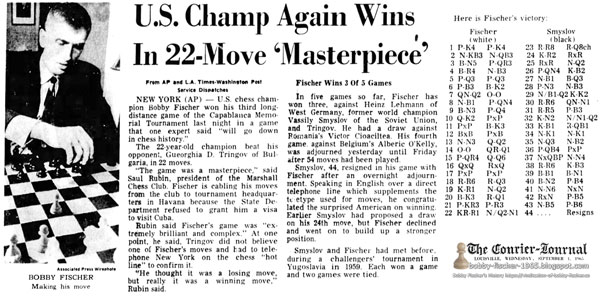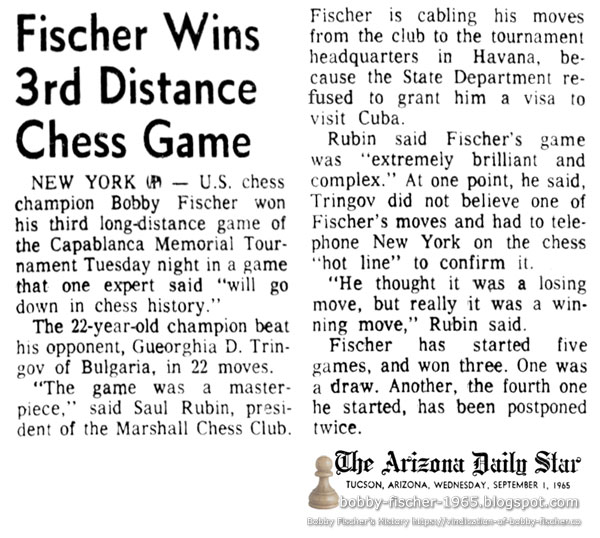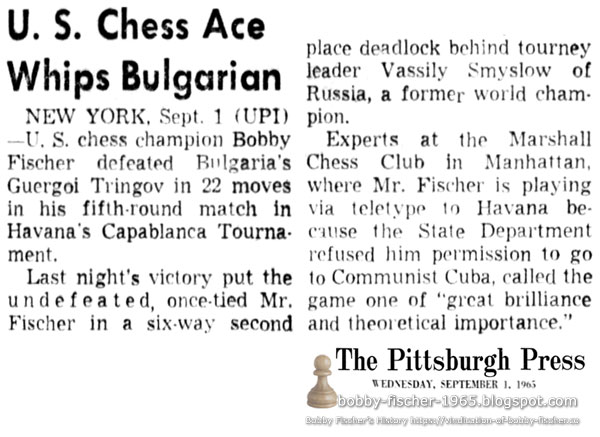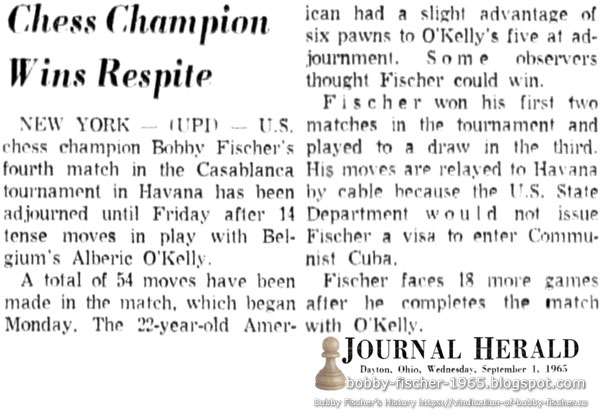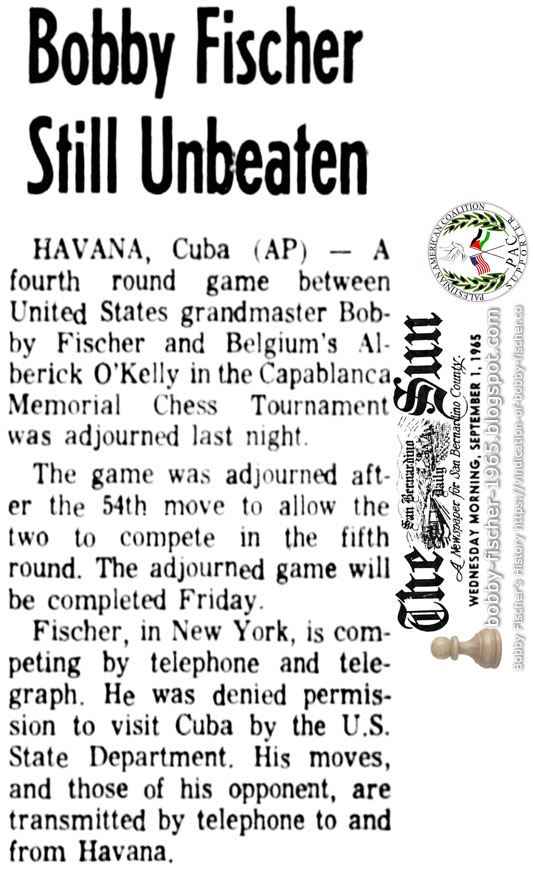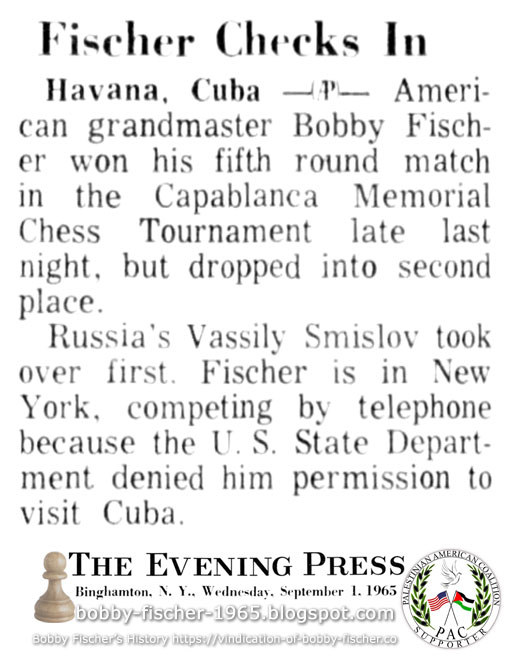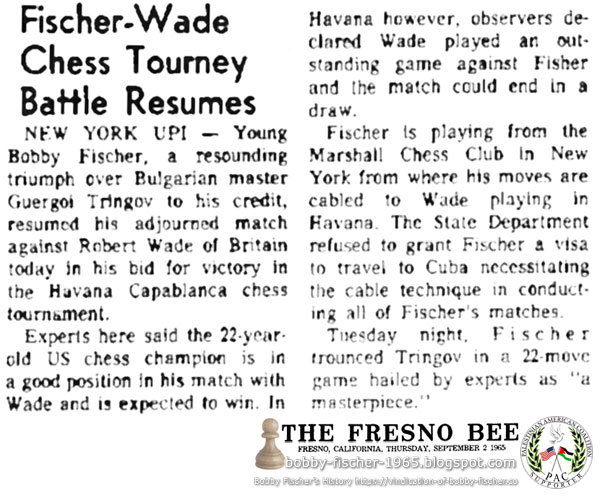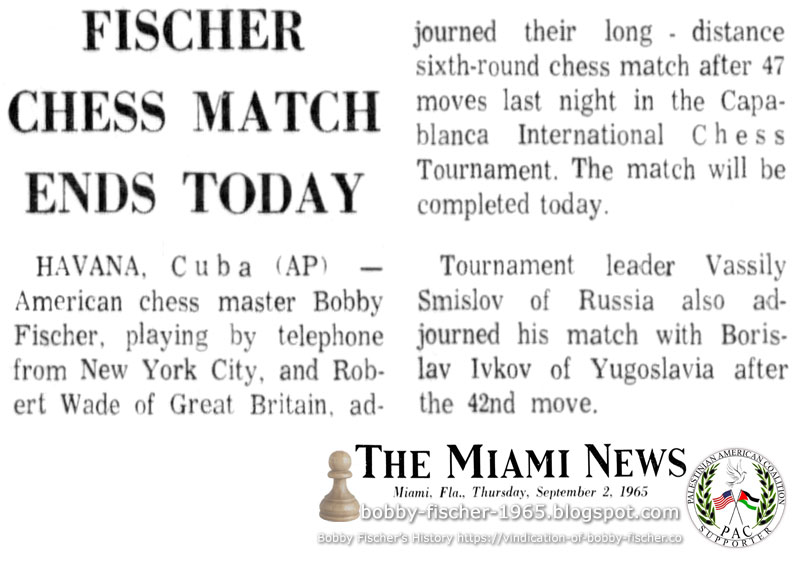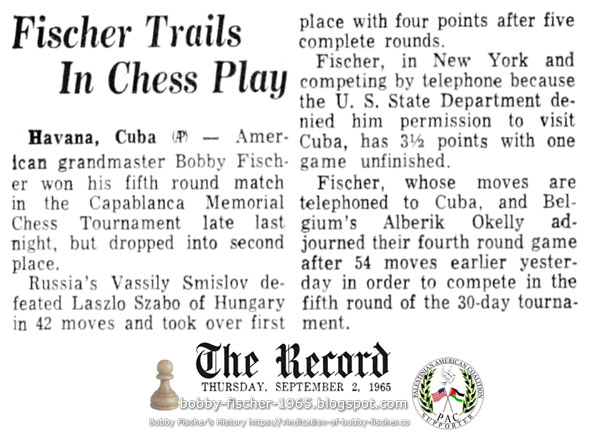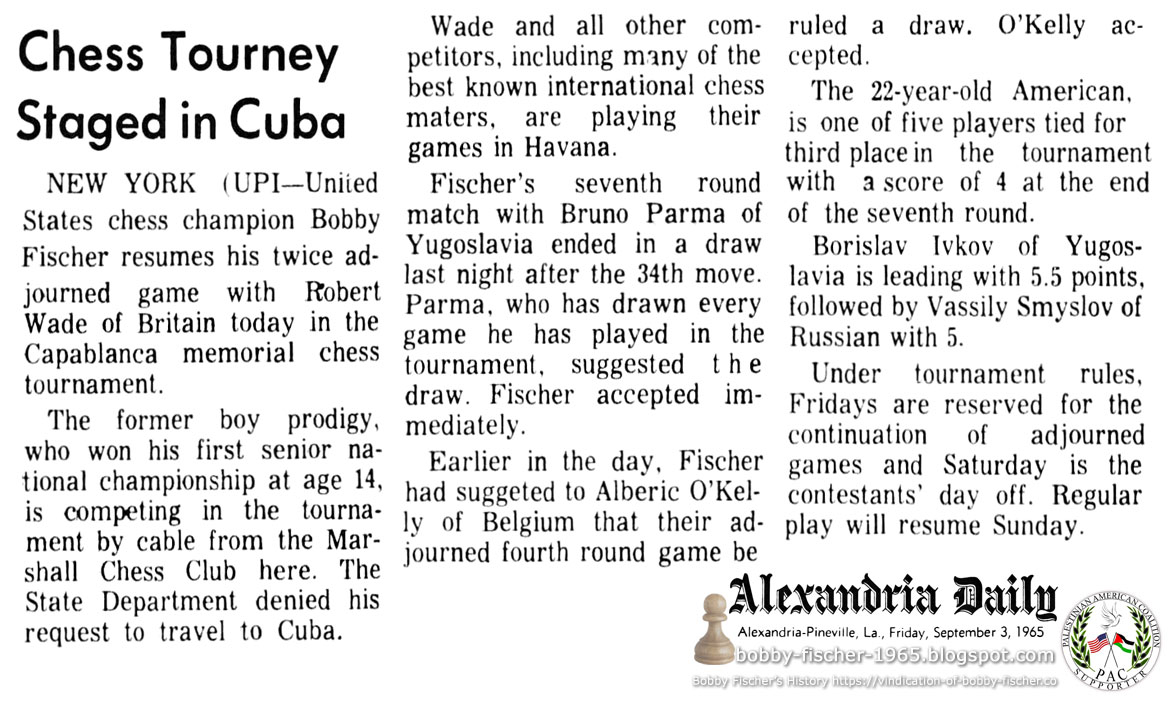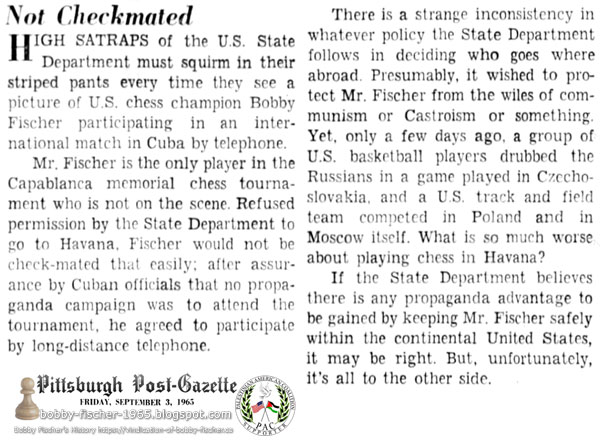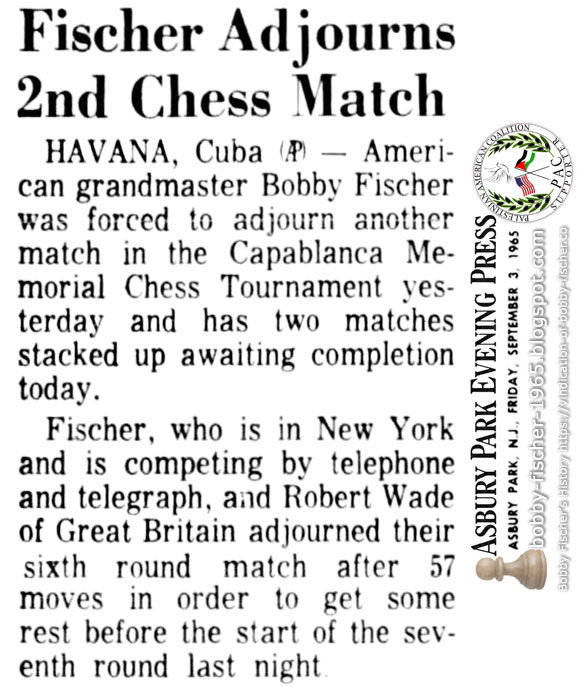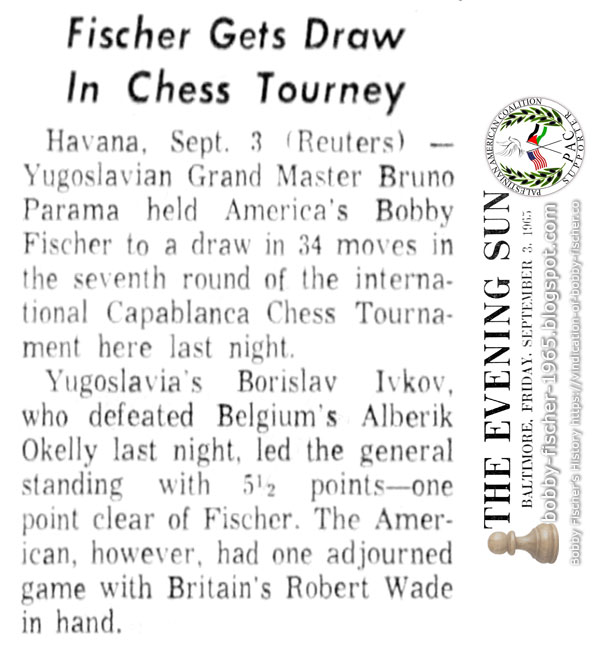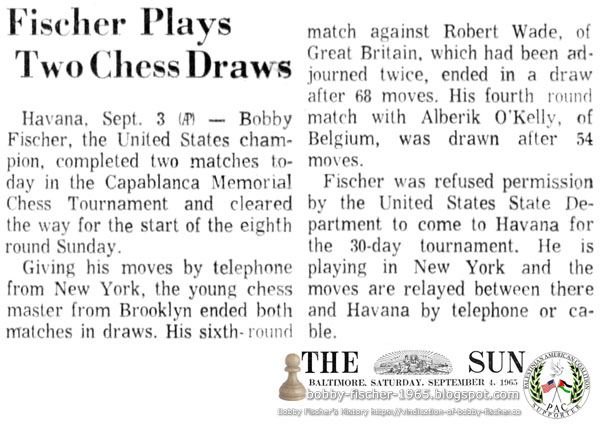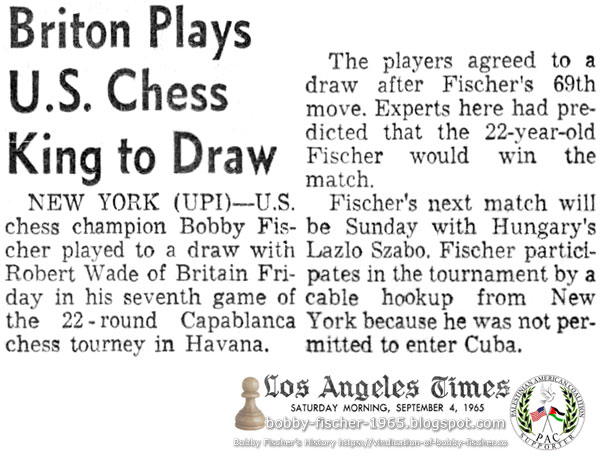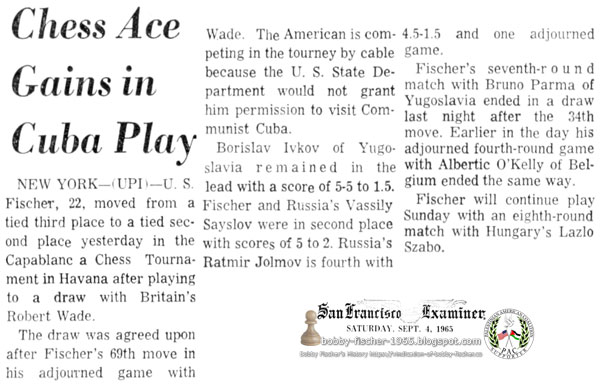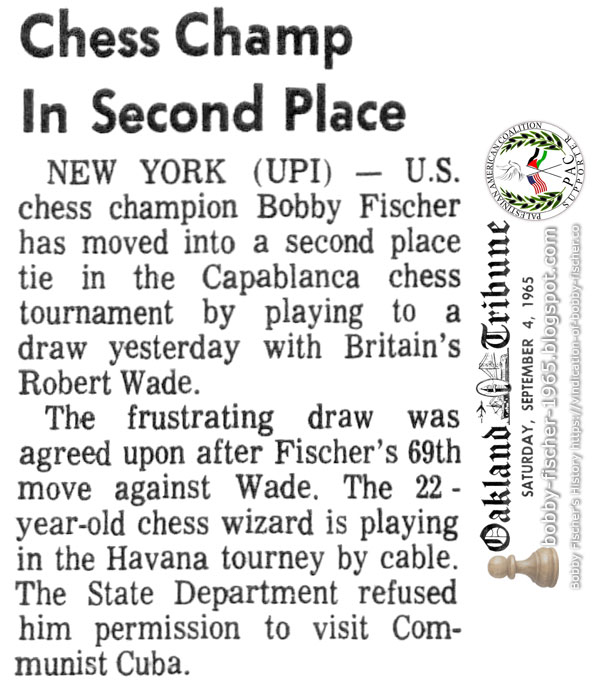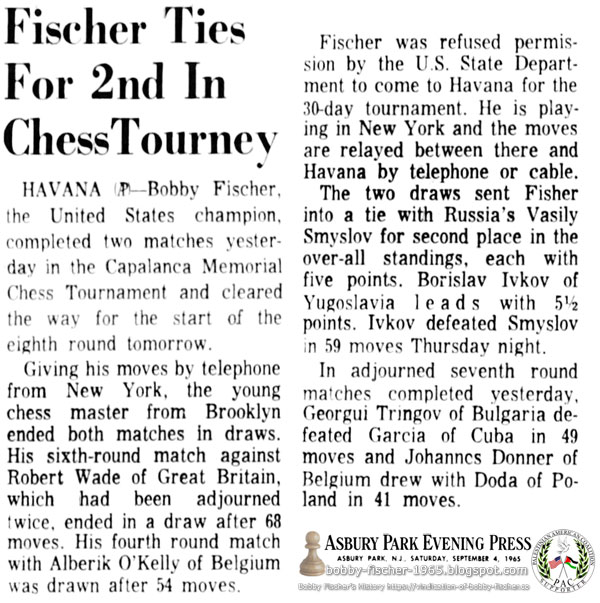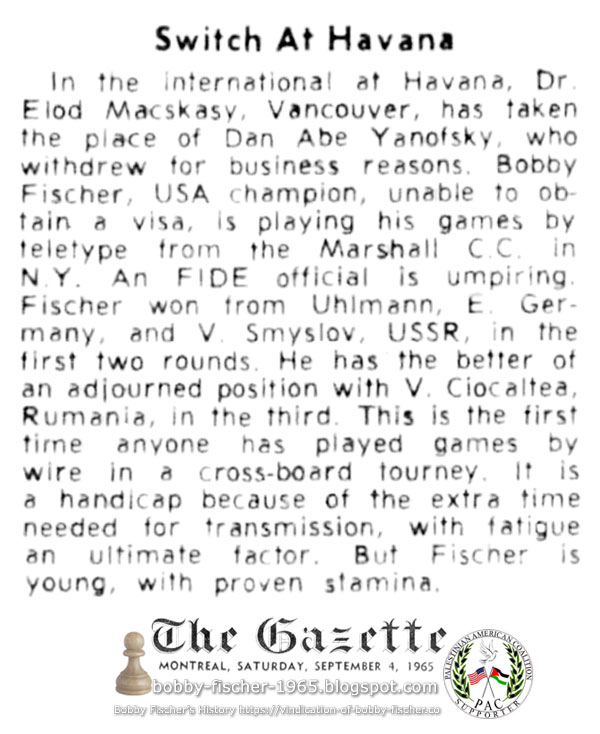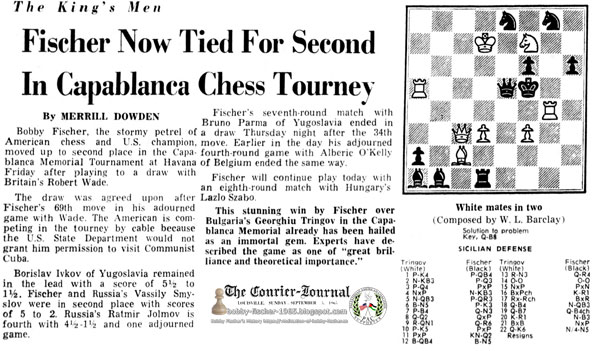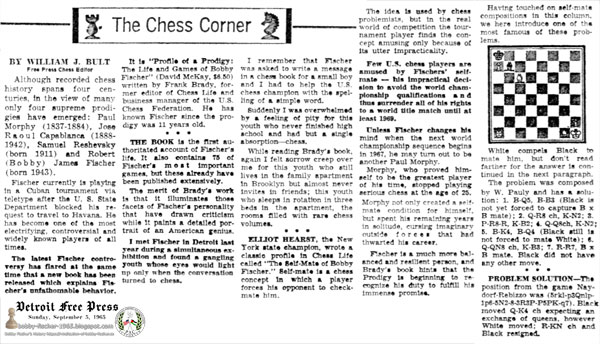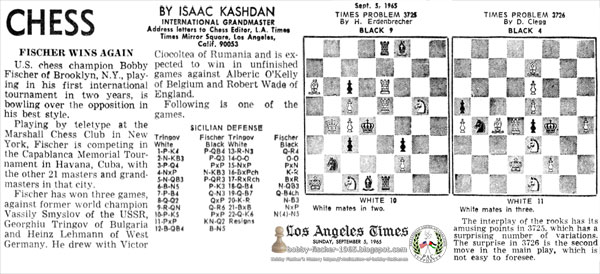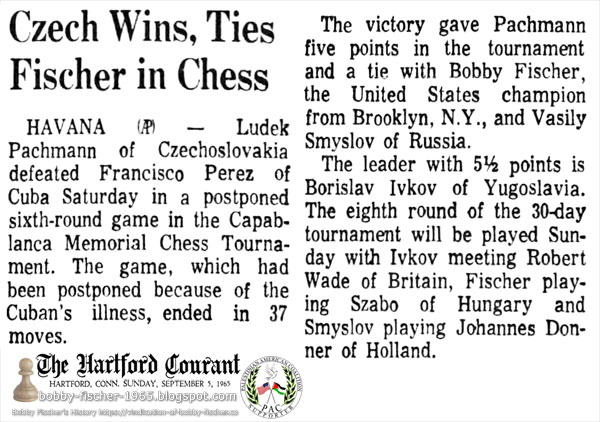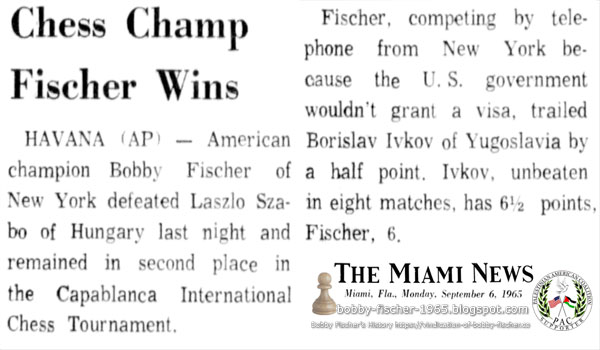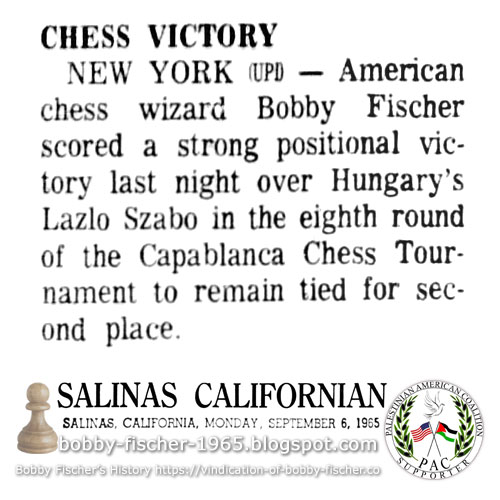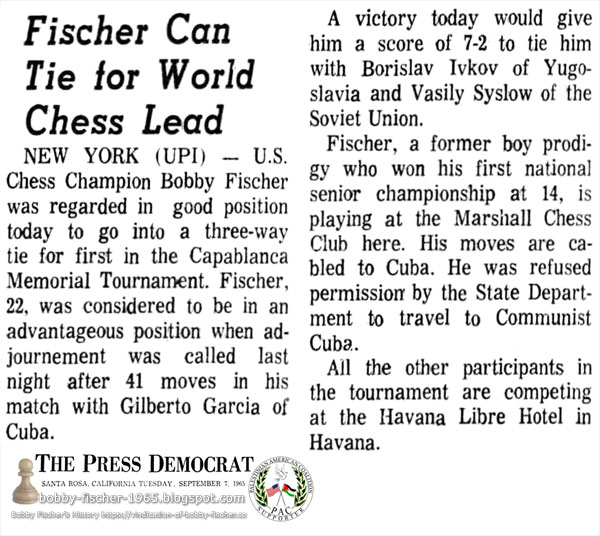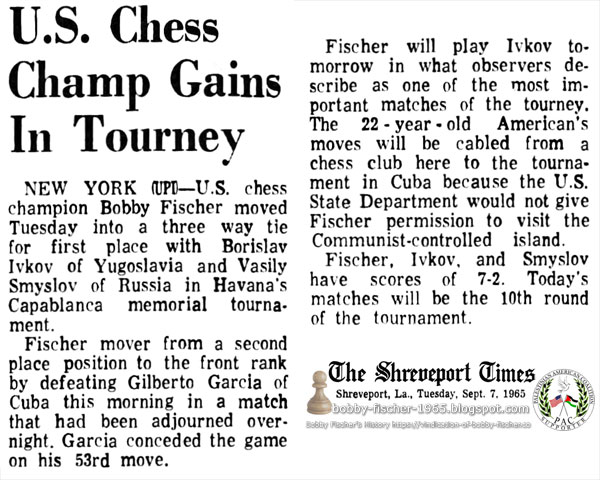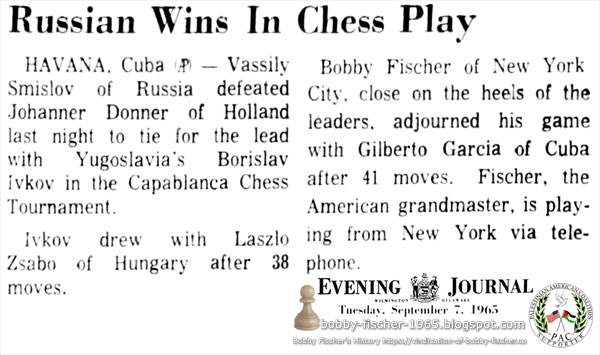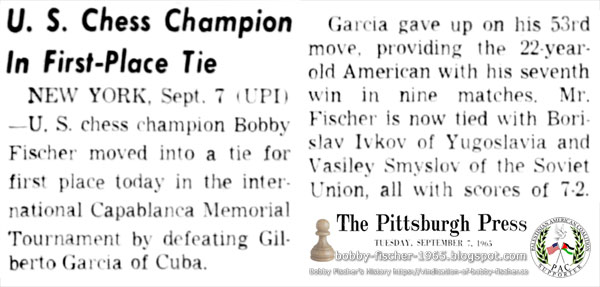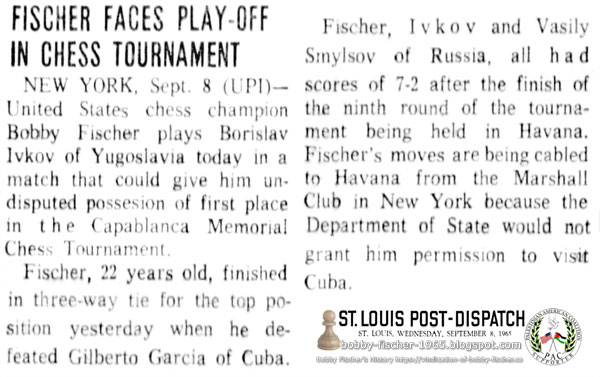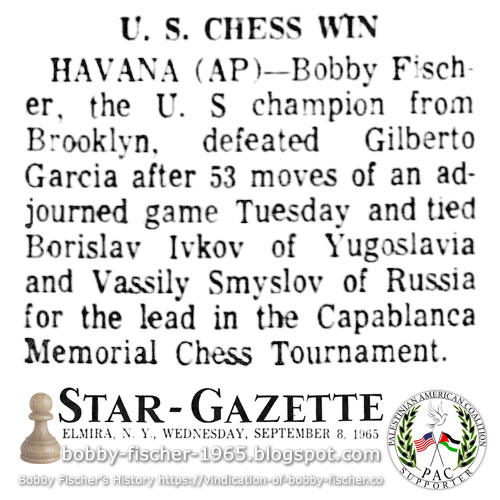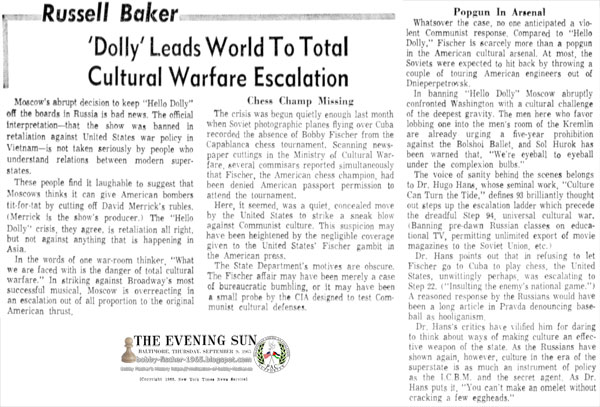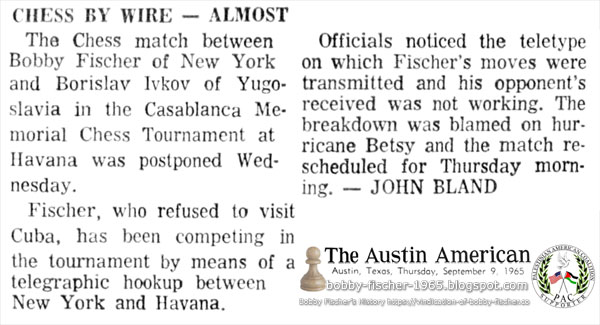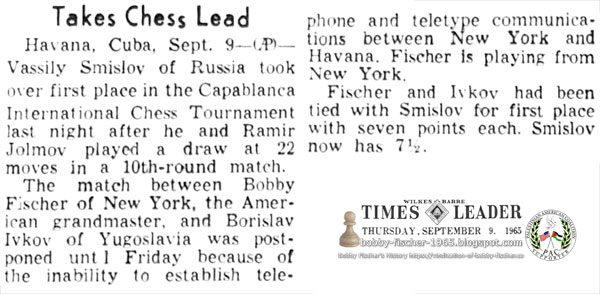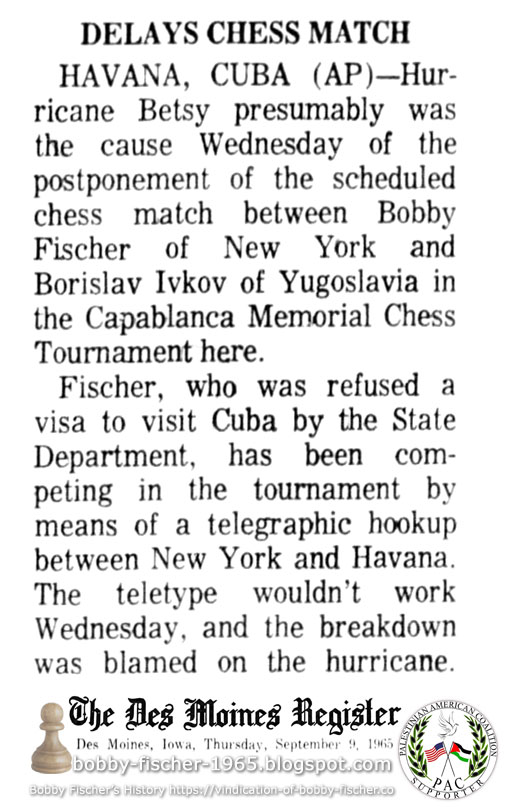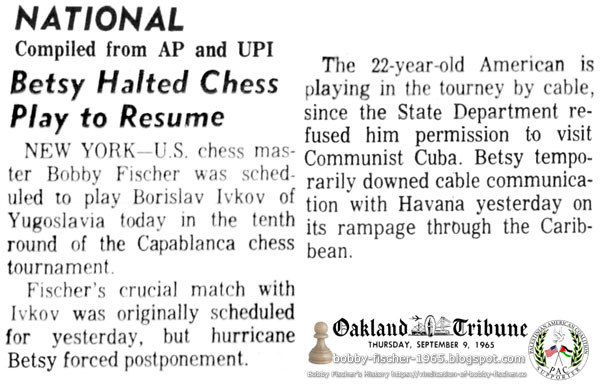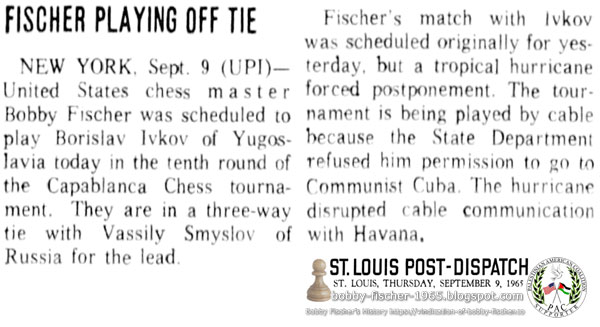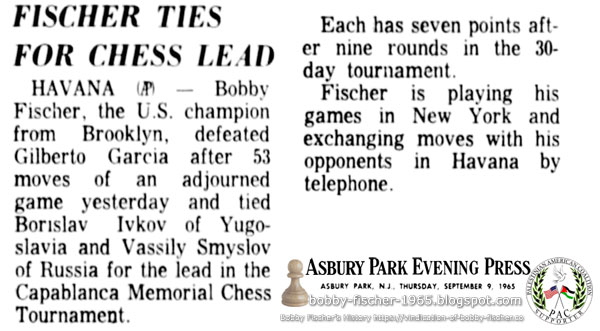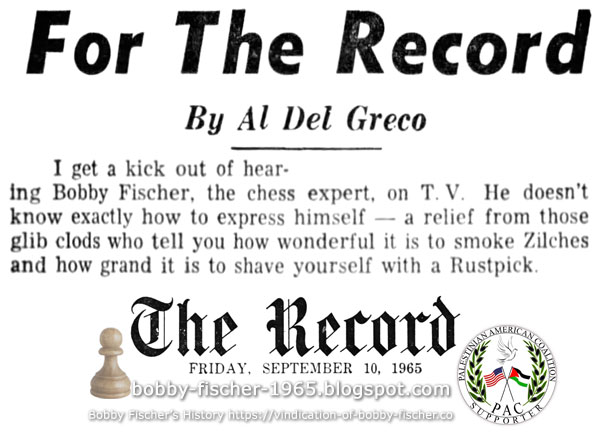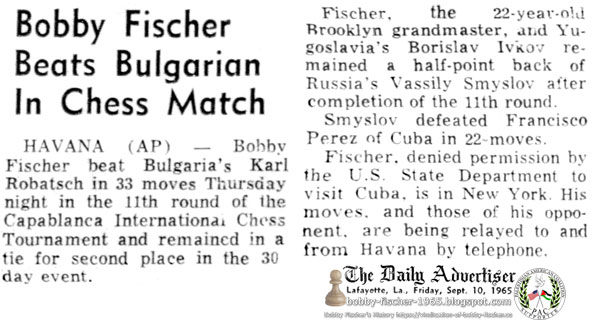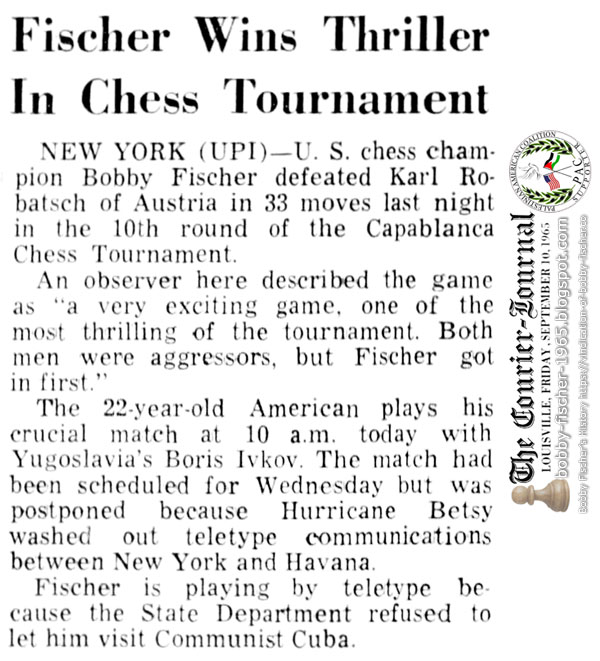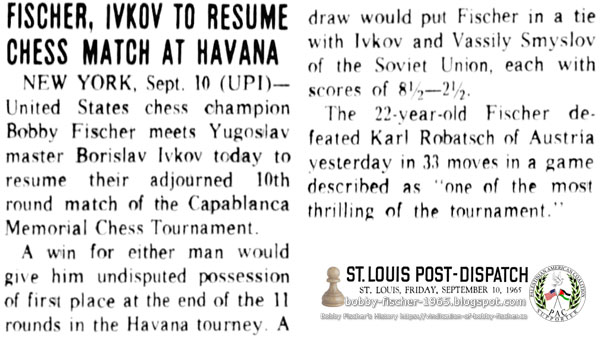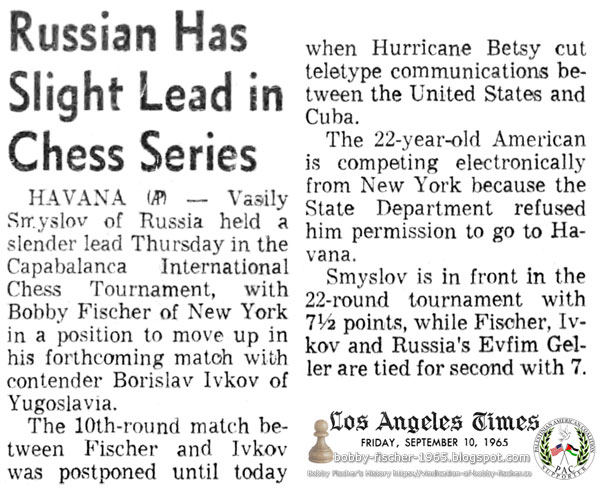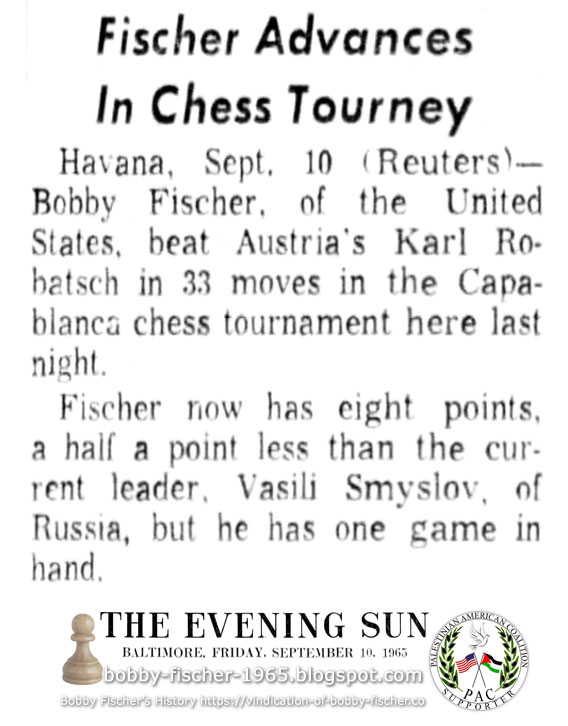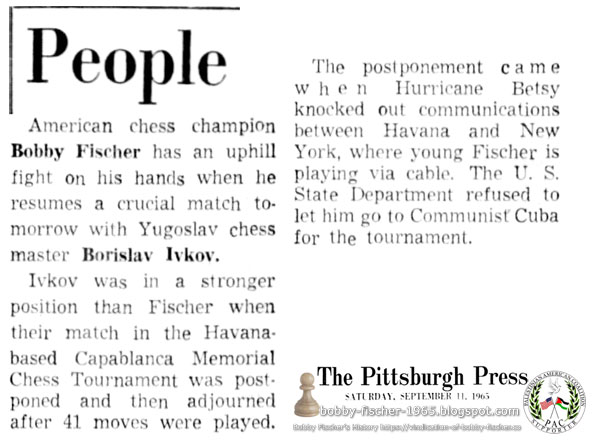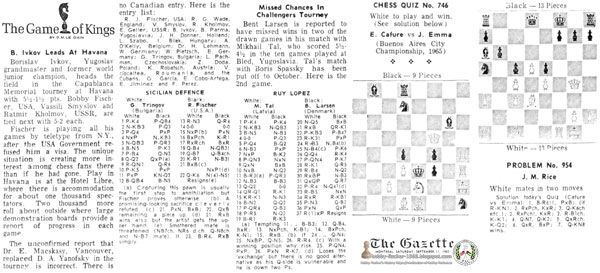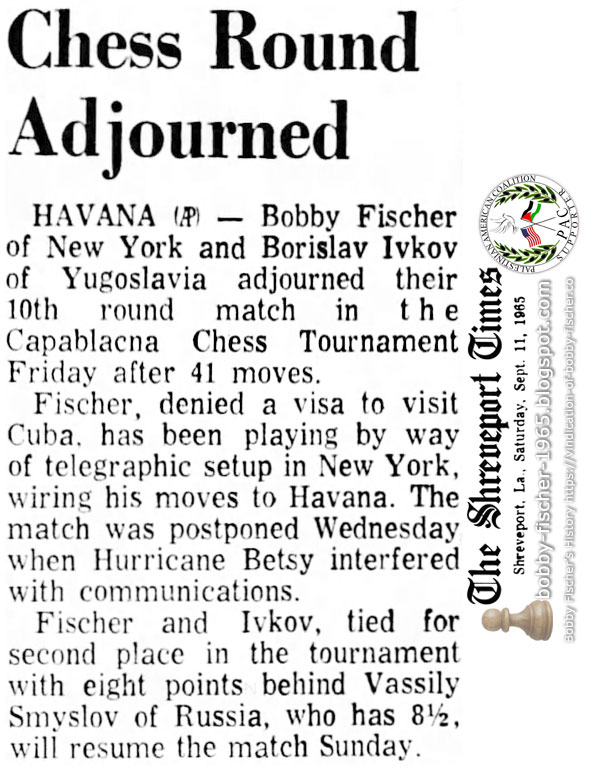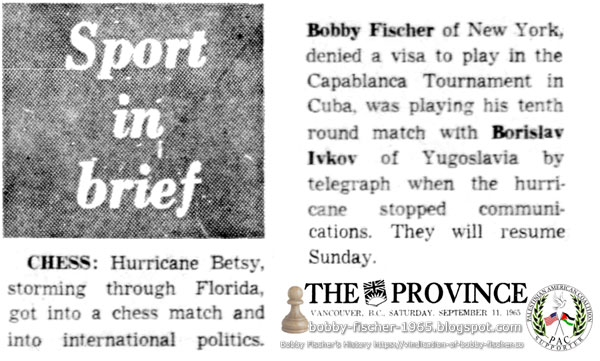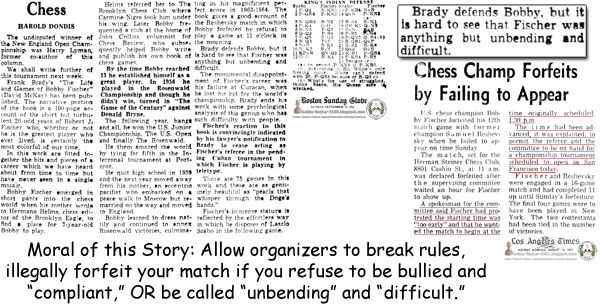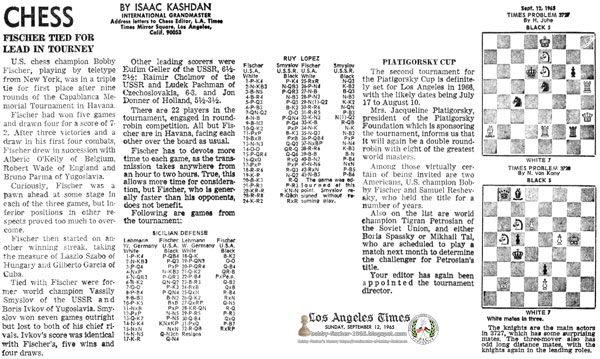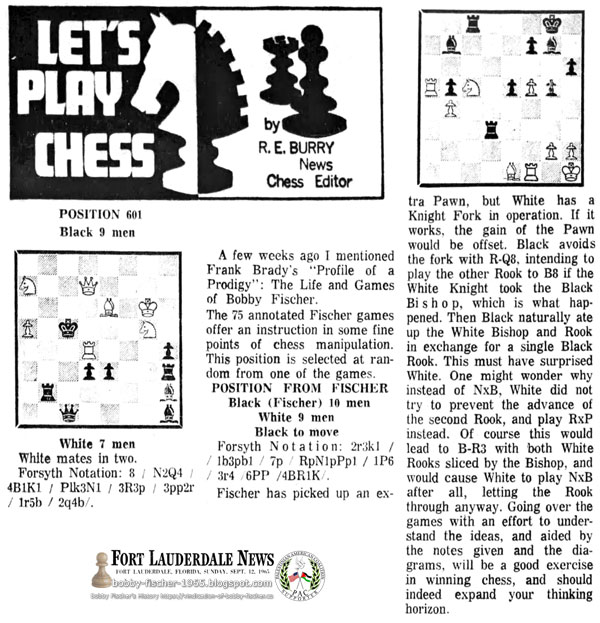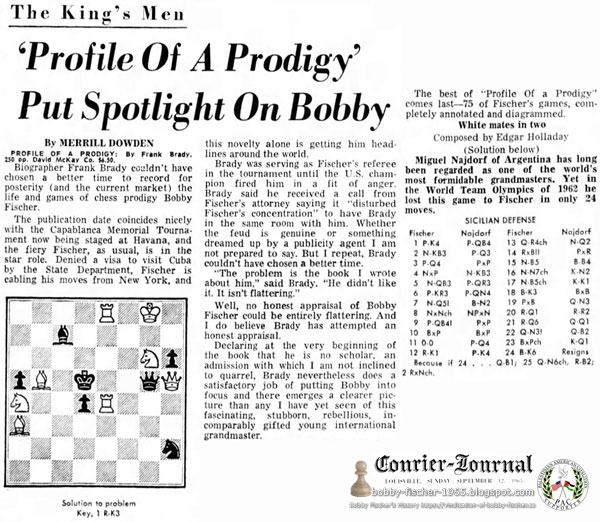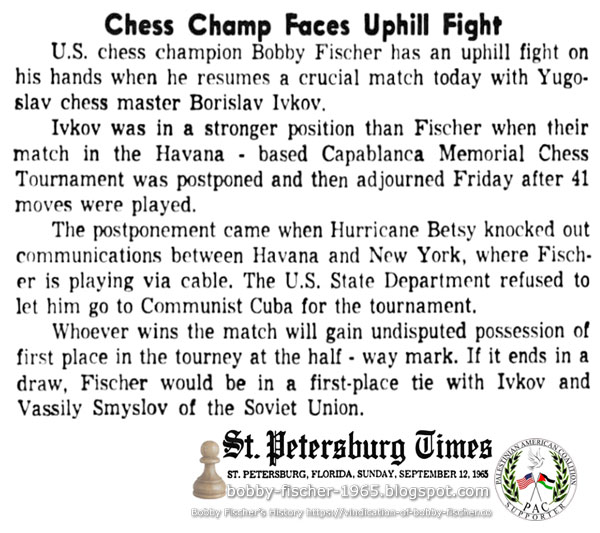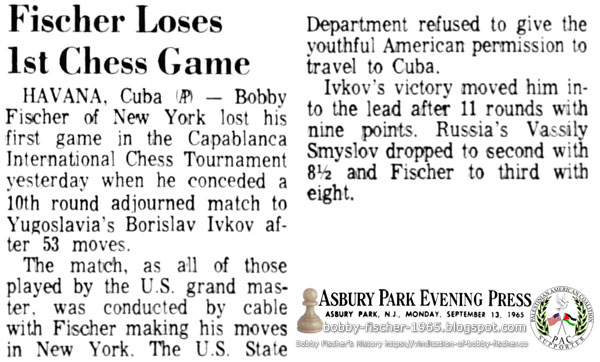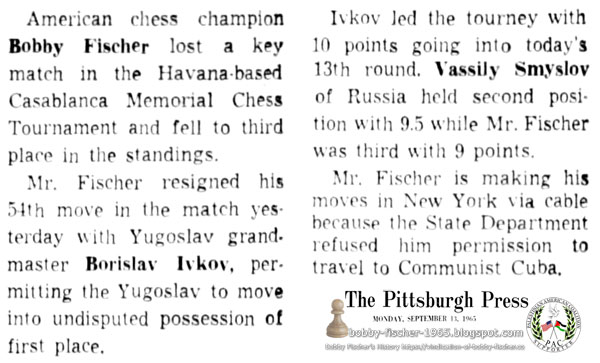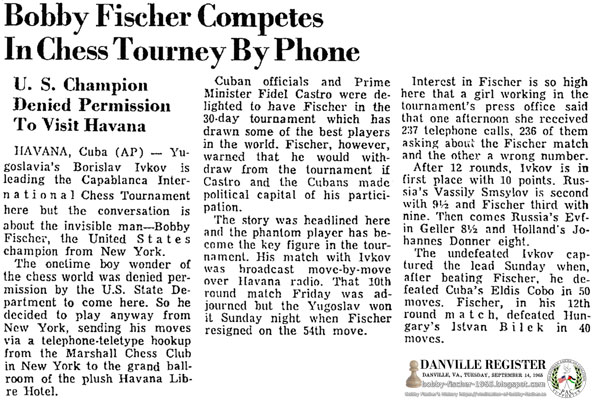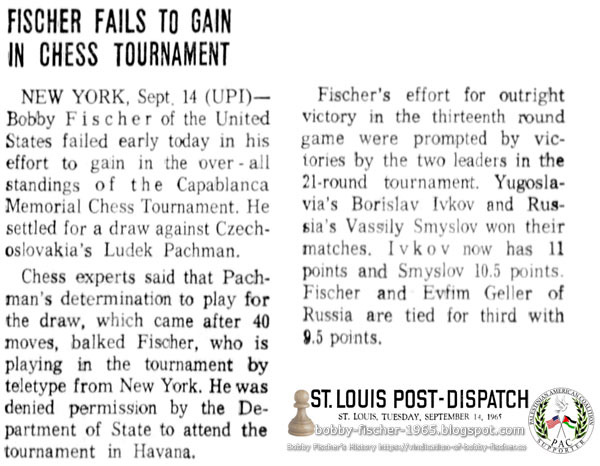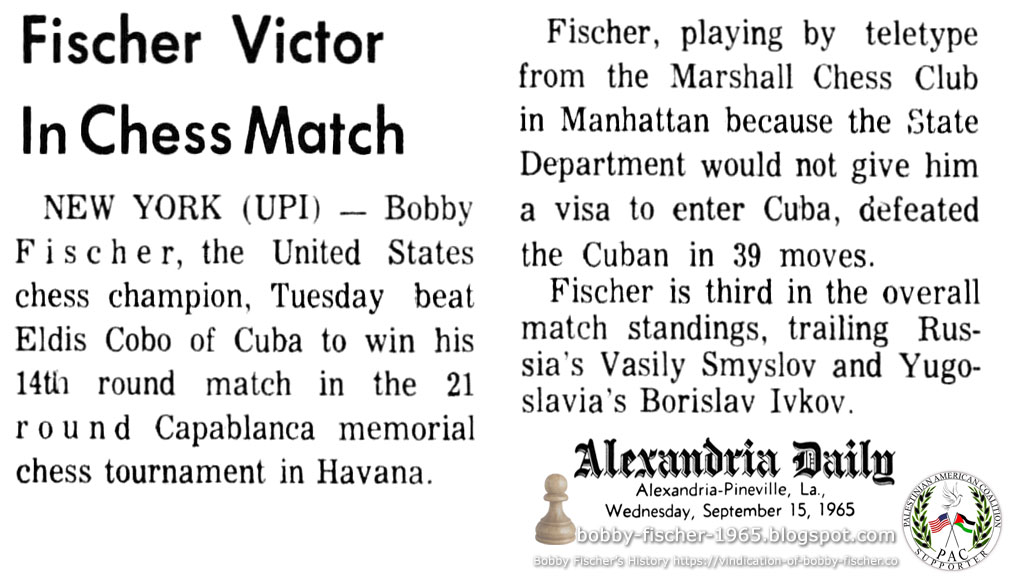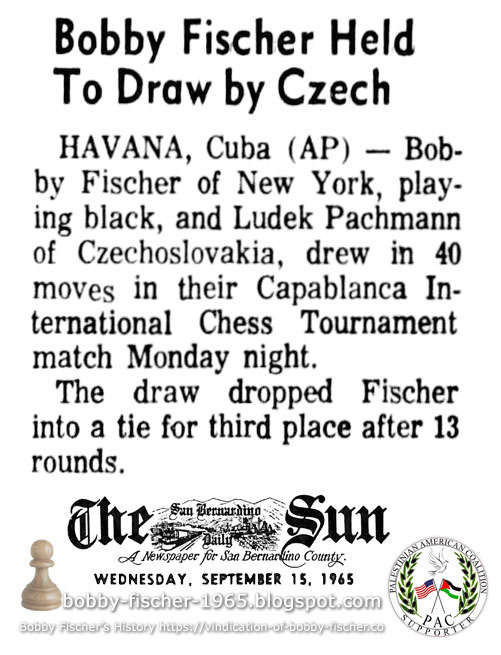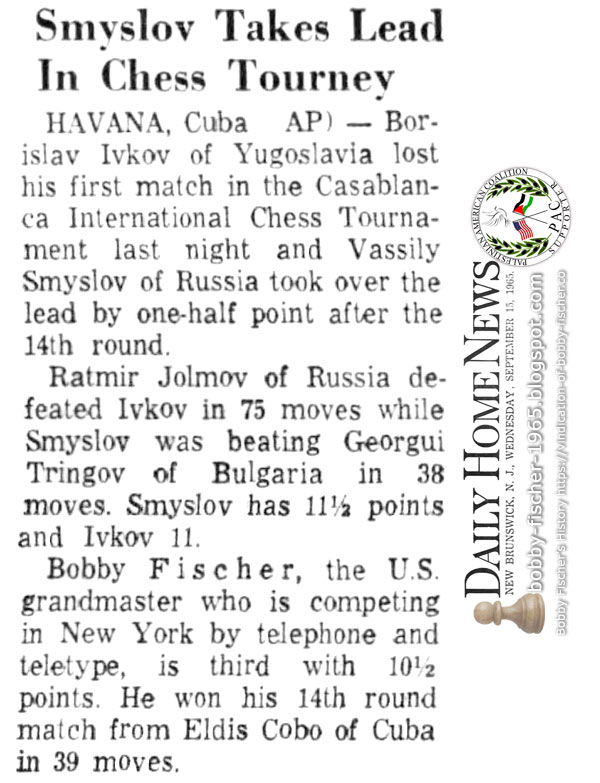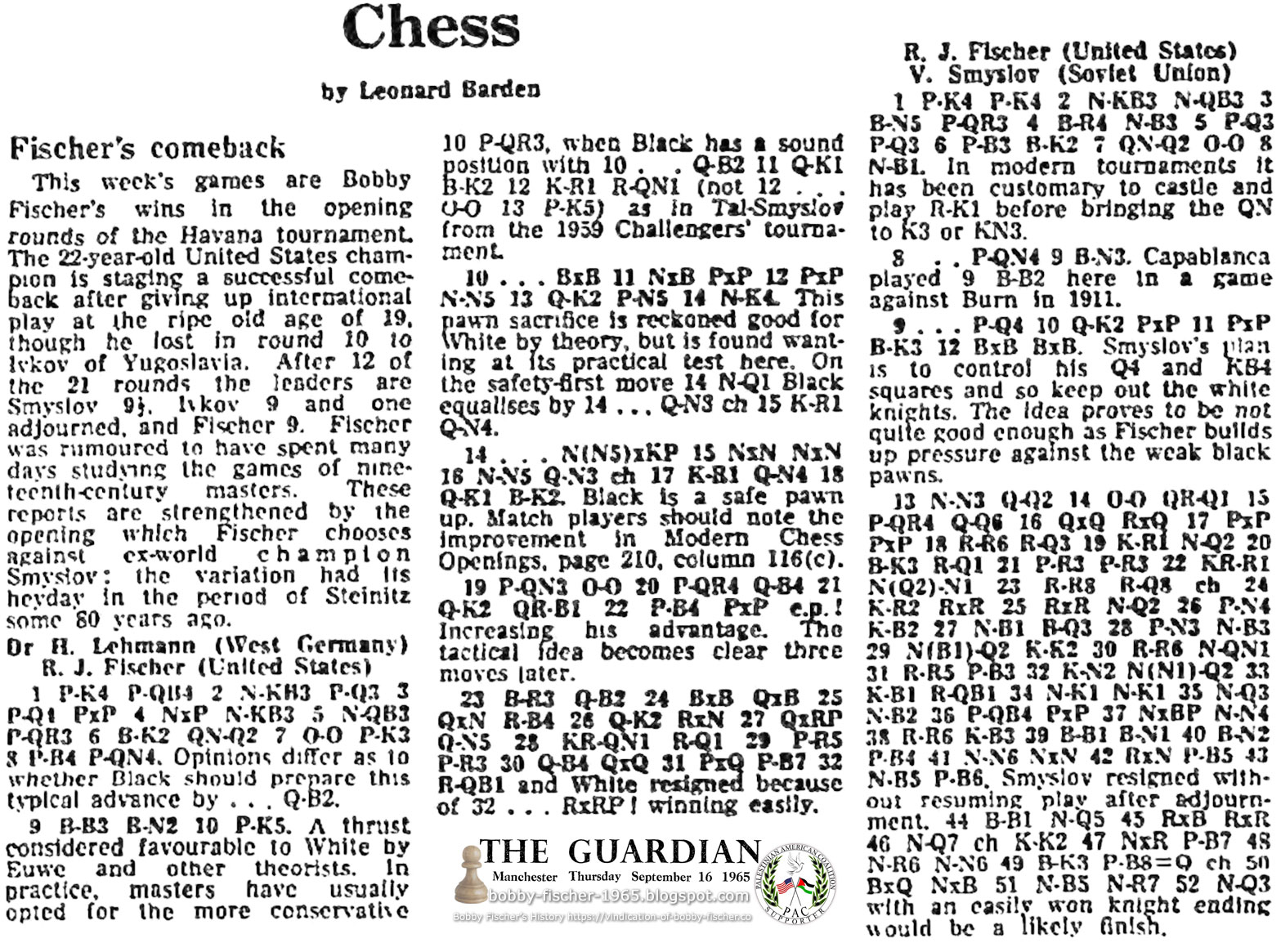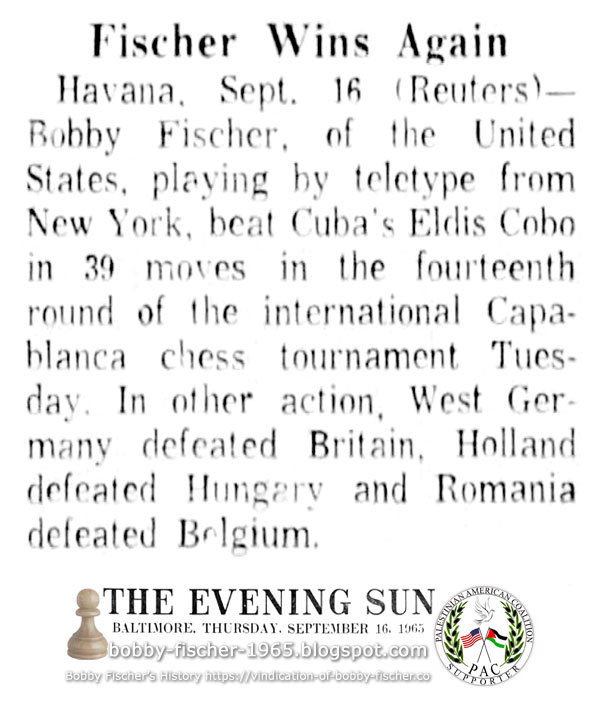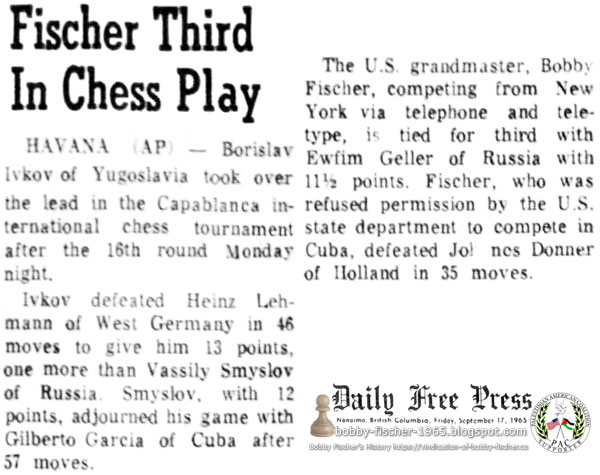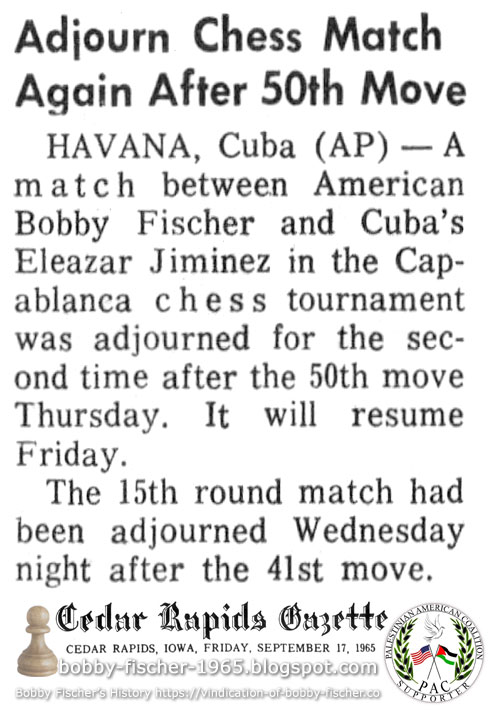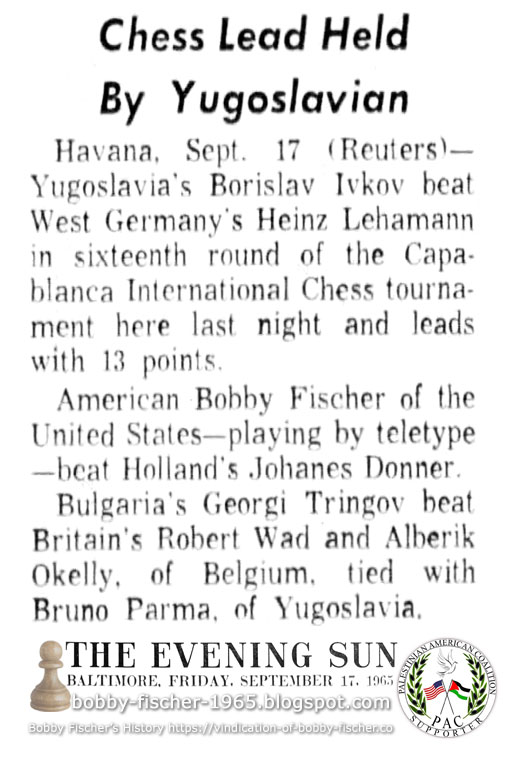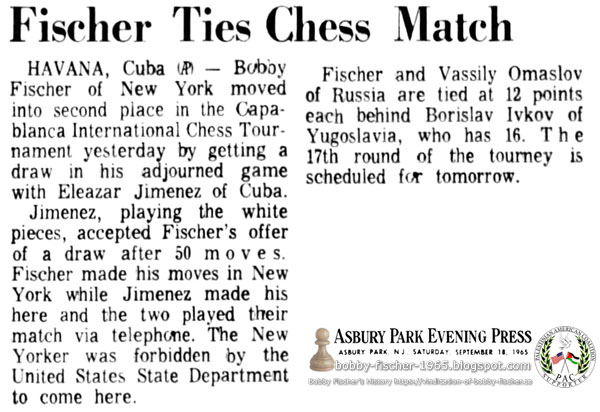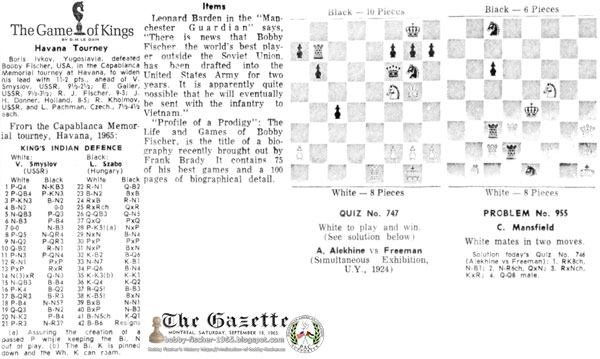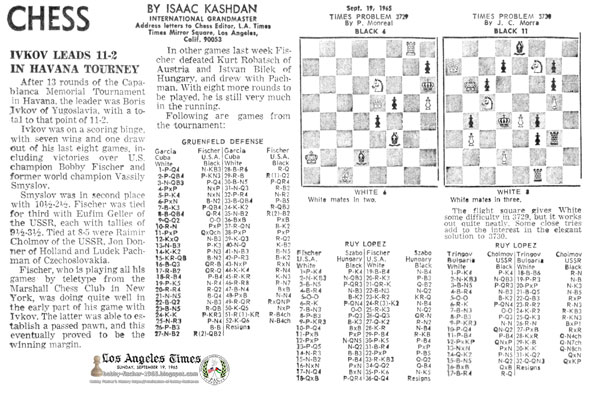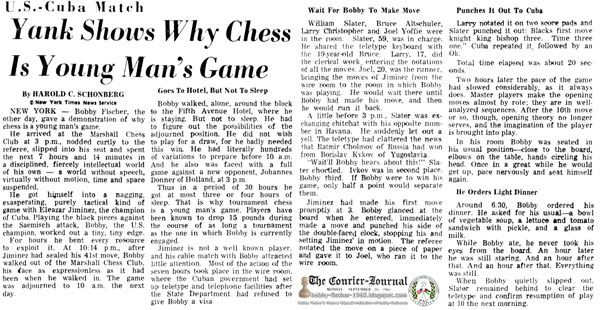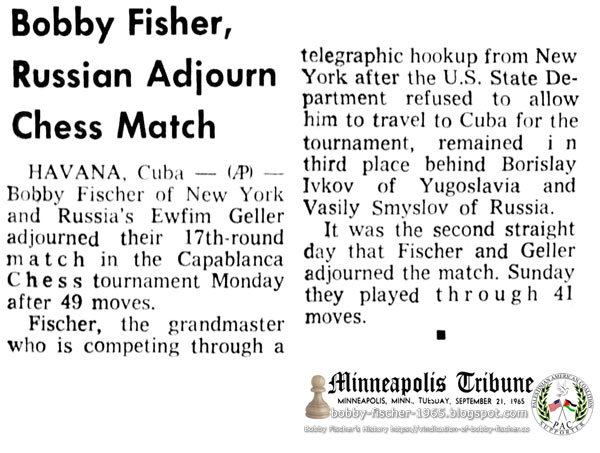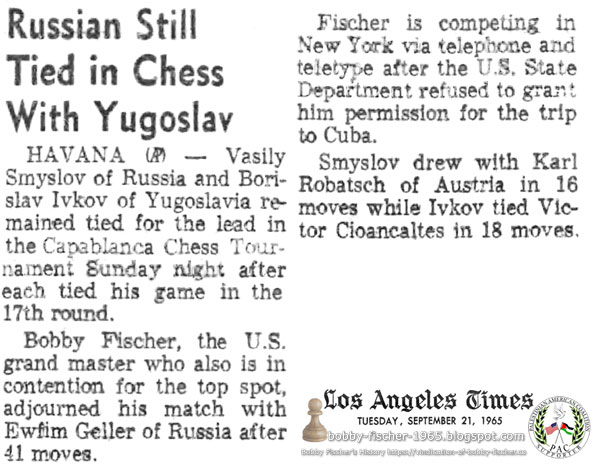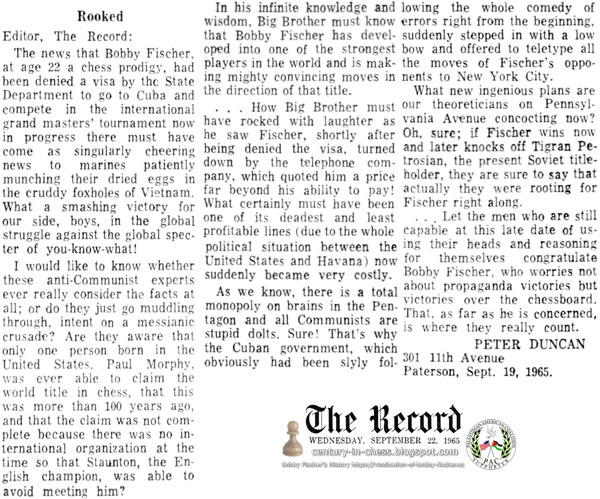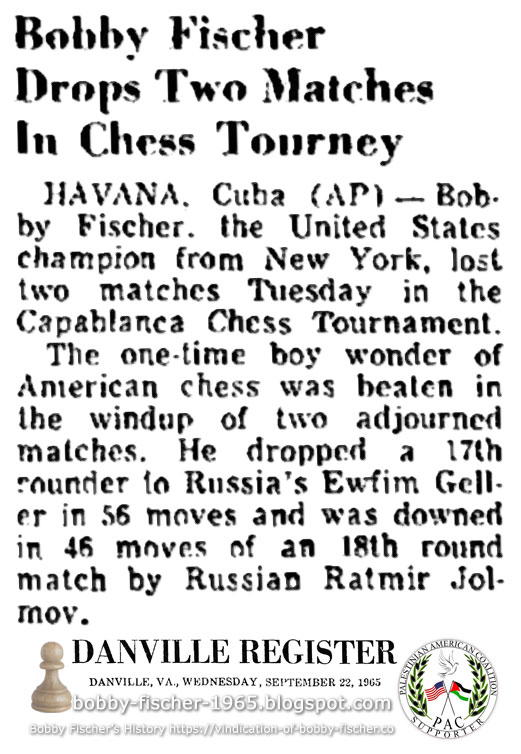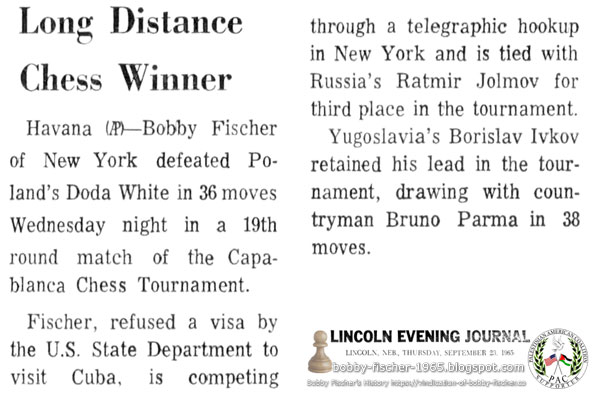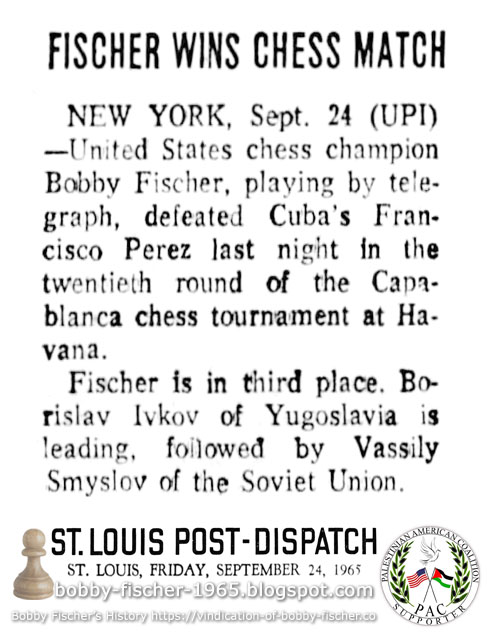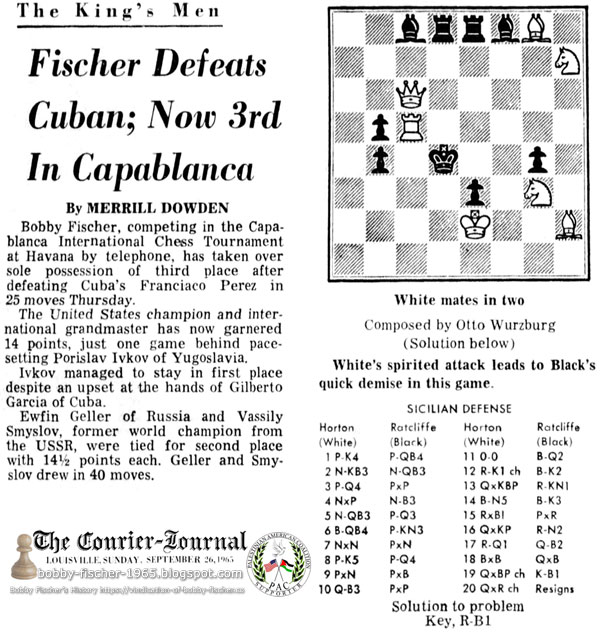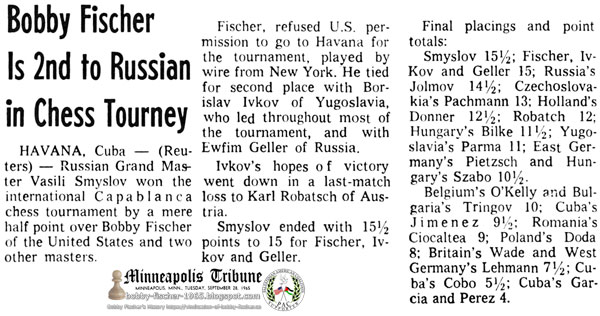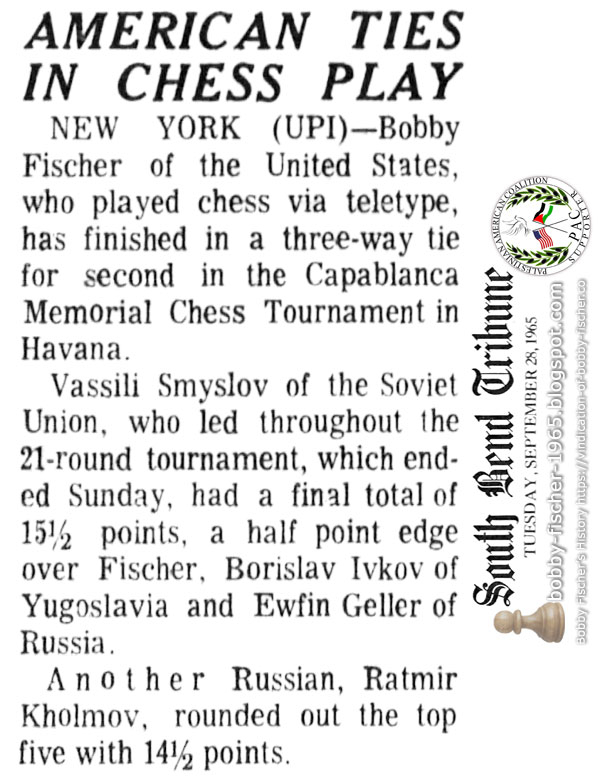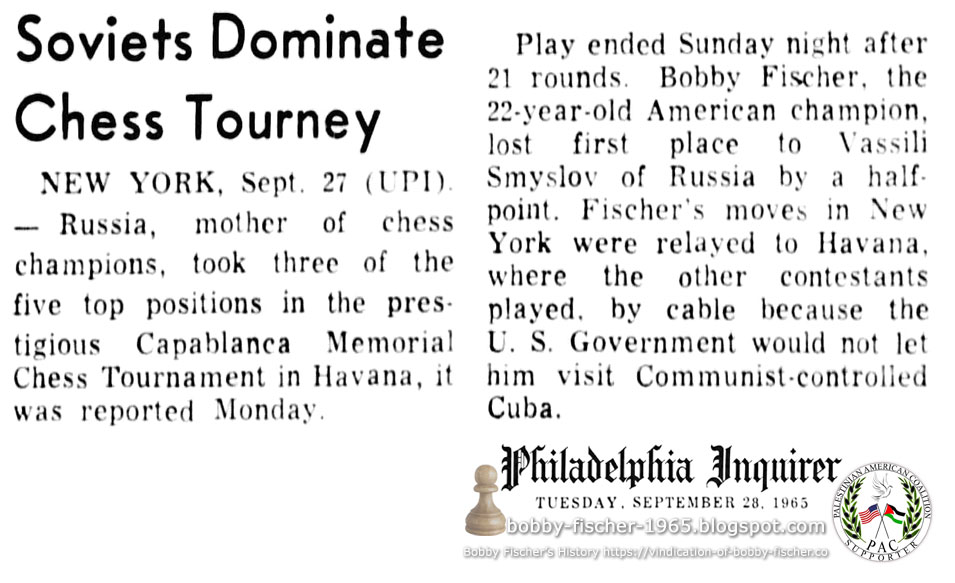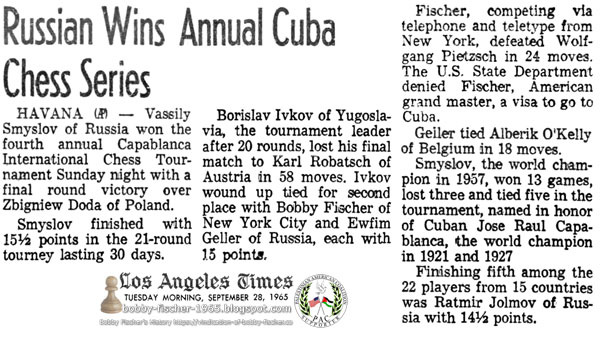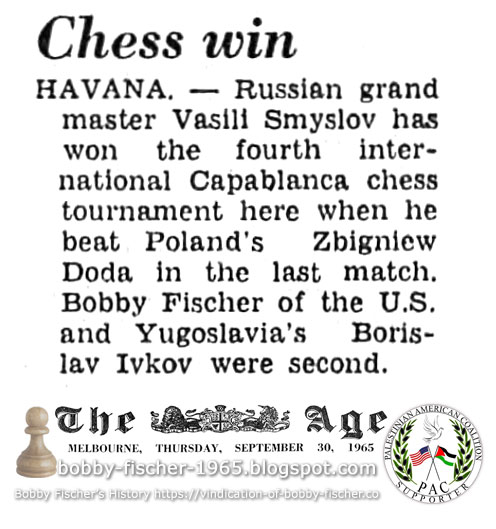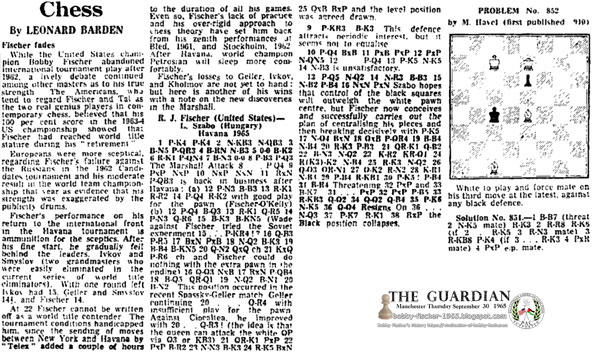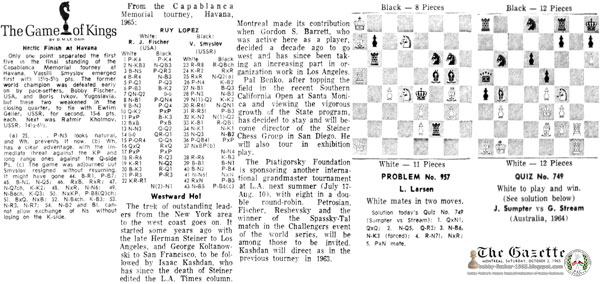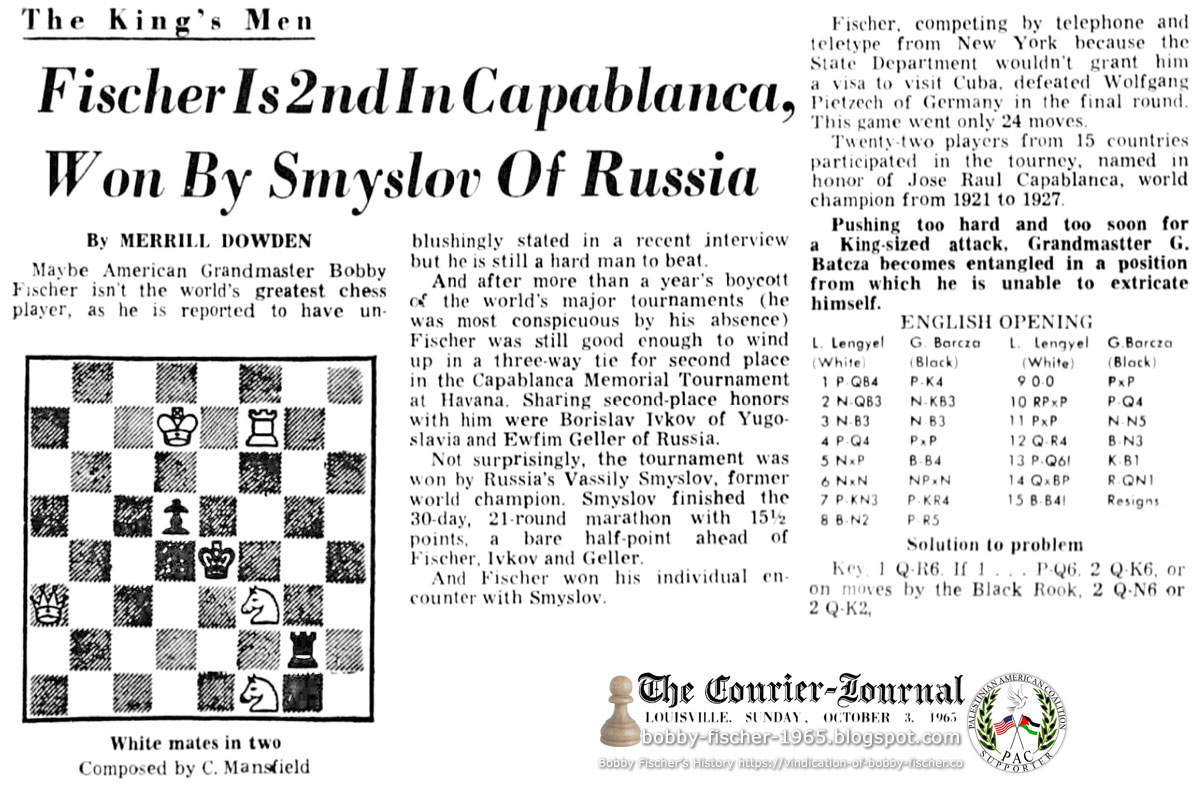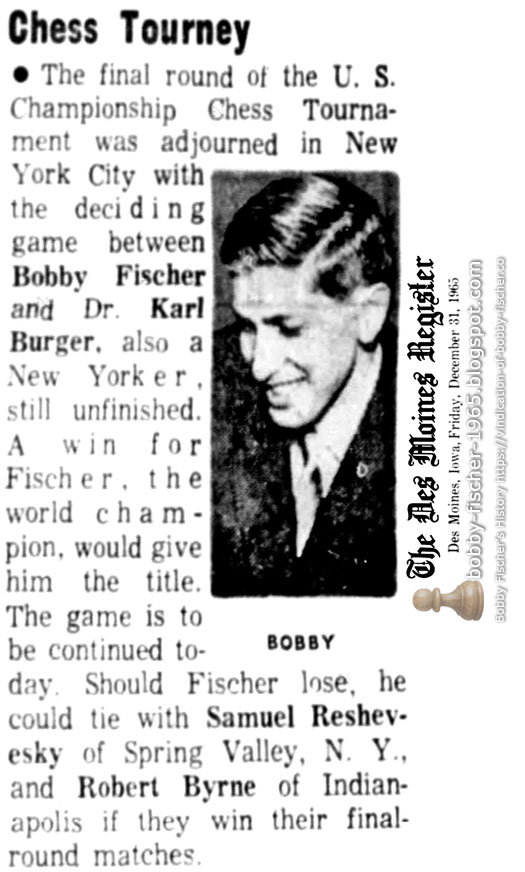The Los Angeles Times Los Angeles, California Sunday, February 07, 1965 - Page 82
New Ratings By Chess Federation
The January issue of Chess Life, official monthly magazine published by the U.S. Chess Federation, has the annual rating list of the organization.
This list has the names and comparative standing of all players who are members of the USCF and who participated in tournaments and matches that were submitted for rating during the year.
U.S. champion Bobby Fischer heads the list by a wide margin with 2734 points. This is the highest ever achieved by any American master. It is due in part to his phenomenal feat of winning the 1963-64 U.S. championship with a score of 11-0.
How much further Fischer might have gone last year we will never know. He stayed out of competition practically all year, missing such important events as the Interzonal Tournament in Amsterdam and the Chess Olympics in Tel Aviv.
As a result Fischer lost the opportunity to compete in the of matches to select a challenger for world champion Tigran Petrosian of the USSR. He must now wait for the next cycle, which is three years later.
Detroit Free Press Detroit, Michigan Sunday, February 07, 1965 - Page 32
Exhibits Hone U.S. Champ
U.S. Champion Robert Fischer has taken to hiding his chess light under a bushel-full of cash.
The 21-year-old Brooklyn genius has not played in a major tournament for two years, and he dismayed his countrymen by refusing to represent the United States in the recent Chess Olympics in Israel.
The Russians walked away with the Olympics, leaving a battered U.S. team lying sixth in the dust.
FISCHER still eats, sleeps and breathes chess. He is studying constantly and forever demonstrating his skill in simultaneous exhibitions against 50 or more players.
These exhibitions provide Fischer with a certain weekly paycheck, a comforting security that few can achieve while attempting to make a living from the game.
The six-time winner of the U.S. championship is unquestionably the strongest player we have, but he refuses to venture into international tournaments where for long periods he would be deprived of the income he derives from his exhibition play.
During his absence from the global chess jousts, however, Fischer's piercing style of attack has not atrophied. In winning his last U.S. championship he met Pal Benko, a Hungarian refugee who has been in this country for seven years.
Benko (Black) has just moved 17. — Q-K1 to reach the following board position.
Benko has put undue confidence in 17. —, Q-K1. His only chance would have been 17. —, N-K3, which also would have lost in the long run. Fischer moved:
18. B x N! P x B
19. R-B6!!
The brilliant point. Benko probably only figured 19. P-K5, P-KB4! with good counter play. Why did Benko not consider this blockade of the KB pawn? As an experienced master he should have remembered the 1928 game Capablanca-Nimzovitch in Bad Kissengen.
19. — K-N1
What else can Black do?
If: 19. —, P-KR3, or 19. —, BxR; 20. P-K5 will be decisive.
20. P-K5 P-KR3
21. N-K2
The most simple method, threatening 22. RxN. Black will lose with 21. —, N-N4 after 22. Q-B5! and he resigns.
Here is the position from the Capablanca-Nizmovitch game that Benko should have remembered.
Nimzovitch (Black), instead of immediately moving 13. —, K-R1, with the intention of dominating the KN file himself, first exchanged his bishop for the knight and prevented the following “small combination” - a phrase Capablanca used to describe his brilliancies. If Black moves:
13. — K-R1?
Then:
14. N-K4 B-K2
15. N/3 -N5! PxN
16. N-B6!! BxN
17. B-K4
Mate cannot be prevented. Here again the blockade of the KB pawn is decisive.
IN THE SAME vein some credit must be given to the Lithuanian Master Mikenas, who played this game in the 1941 Gruzinke tournament.
…
This position is nearer the Fischer rook sacrifice than the Capablanca - Nimzovitch position. But Capablanca only set the trap which Nimzovitch avoided. Here the concept unfolds in all its glory.
Detroit Free Press Detroit, Michigan Sunday, February 28, 1965 - Page 28
The Chess Corner: Elimination Procedures Modifications for World Championship
“The Russians are cheating!”
This slur on the eliminations for the world chess championship caused the Federation Internationale des Echecs (FIDE) to react like the American colonists did to “The British are coming!”
There was a revolution.
The slur was cast by U.S. Champion Robert Fischer, who asserted in a national magazine that under procedures then current the Russians were throwing games to one of their many entrants.
The FIDE quickly prevented all chances of hanky-panky by turning the final phase of the world title eliminations into a series of matches between contenders rather than a tournament where games could be fixed.
WHILE THIS will satisfy Fischer's objections, the Brooklyn prodigy still will not be competing for the crown held by Tigran Petrosian because he has refused to participate in the necessary tournaments.
Enter Soviet Grand Master David Bronstein. He proposed that the U.S. champion be invited to the elimination Matches anyway—along with seven other strong masters who had been eliminated in interzonal tournaments.
Bronstein's proposal was rejected by delegates at the Chess Olympics in Israel late last year.
One can only speculate on Bronstein's motives for suggesting that the elimination matches be expanded, but perhaps his own elimination had something to do with it.
Detroit Free Press Detroit, Michigan Sunday, March 14, 1965 - Page 18
The Chess Corner: The Spectacle of Sacrifices
“…The brilliant point—reached after the sacrifice of three pieces. You probably will recognize the similarity of this position to the game Fischer-Benko in this column on Feb. 7. The threatening mate leaves Black only with…”
The Los Angeles Times Los Angeles, California Sunday, March 21, 1965 - Page 98
Botvinnik Drops Out
The news columns of The Times last Sunday carried the report that former world champion Mikhail Botvinnik of Russia had dropped out of the series of matches to determine the next challenger for the title.
Now 53, Botvinnik has long been regarded as one of the greatest masters of all time. He held the championship for all but two years from 1948 to 1963, when he was defeated by Tigran Petrosian, now 35.
Botvinnik's retirement has been rumored for some time. He will continue to play on occasion, but does not feel that he can maintain the highest level against his much younger competitors.
Ewfim Geller of Russia will take Botvinnik's place, and will oppose former world champion Vassily Smyslov in a 10-game match next month. Paul Keres and Boris Spassky will contest a similar match at the same time.
Another quartet will play In Yugoslavia, starting late in May. Another former world champion, Mikhail Tal, will play Lajos Portisch of Hungary and Bent Larsen of Denmark will face Boris Ivkov of Yugoslavia.
Geller moved up as a result of his third place finish in the last Candidates' Tournament at Curacao in 1962. Petrosian was the winner at the time, and went on to take the world championship.
Keres, who was second in Curacao, was seeded into the next Candidates' Tournament, which was later changed to the series of matches, as outlined above.
Of particular interest to us is the fact that if Geller should not participate for any reason, the next person in succession would be U.S. champion Bobby Fischer, who at 22 has already compiled a brilliant record.
Fischer has played no match or tournament chess for over a year, however. He refused to play in the Interzonal Tournament last summer. In good form, he would almost certainly have been one of the six qualifiers from that event.
Courier-Post Camden, New Jersey Wednesday, March 24, 1965 - Page 9
Former World Champion Retires
Mikhail Botvinnik says he has retired from competition for the world title, at least for the present. He refused to compete this year for the right to challenge his Soviet compatriot and current champion, Tigran Petrosian, who won the crown from him in 1963, because he objects to the International Chess Federation's “policy on matters involved in the world's championship, in particular the annulment of the traditional right of the beaten world champion to a return match.” Under a new federation rule a former champion no longer has the automatic right to a return match, but must compete for it in a series of elimination matches.
The 53-year-old Botvinnik is the first champion in history to pass up the chance to regain the title—which he has held three times. He says he will still take part in other tournaments.
This means two of the world's greatest players will not participate in the championship eliminations which start in April. America's Bobby Fischer, our outstanding star, like Botvinnik objects to some ICF rulings and procedures, and also has kept out of recent tournaments in this country, for reasons best known to himself.
The Boston Globe Boston, Massachusetts Sunday, June 20, 1965 - Page 111
More Rumors and Speculation
Bobby Fischer's last chess tournament was in the Rosenwald in 1963, which he won with a perfect score. In 1964 he toured the country giving simultaneous exhibitions. He refused to play in the Piatagorsky tournament.
He refused to contend for the world's championship, despite important changes in the method for qualification, made partly in response to Fischer's criticisms.
We have been wondering whether Bobby has been bitterly withdrawing into isolation or whether he has instead been quietly perfecting his massive knowledge of chess, possibly working up a bust for important variations of the Ruy Lopez or the Sicilian.
[<False Rumor>Now we hear that Bobby has been drafted and was inducted two weeks ago. It will be interesting to see what the Army can do for, or to, this enigmatic young genius.</False Rumor>]
The New York Times New York, New York Thursday, June 24, 1965 - Page 32
Chess: Fischer Plays 26 Experts And Suffers Only 2 Losses
Grand Master Bobby Fischer, the 22-year-old United States champion, recently faced 21 international experts, members of the United Nations chess club, plus five local players, in a simultaneous exhibition at the Church Center of the United Nations. The event, arranged through the courtesy of TAG, Inc., a producer of games, found the champion in spirited form.
Fischer played 1 P-K4 on every board and ended with 21 wins, three draws and two losses, to the club secretary, Luis Loayza of Peru, and to Vladimir Vakula of the Soviet Union.
The following games are from the exhibition.
Fischer encountered a stubborn, if unorthodox, opponent, when Gerardo Martinez, as Black in a French Defense, played the bizarre 2 … B-N5ch.
This loss of time allowed Fischer to obtain the bishop-pair after 9 NxB, QxN. After 11 B-Q3, moreover, White was completely developed and had an attack in hand.
Black was not overawed and refused to crumple easily. He even managed a sort of counter with 14 … P-N5.
But after 18 Q-K1ch, K-B1, it appeared that Black had reached the end of his rope. Note 23 … PxB, saddling Black with tripled pawns. But Black had no choice: If 23… QxB; 24 Q-K8 would mate.
Fischer's star move was 27 P-Q5, giving up a pawn to establish his knight on a dominant square with 28 N-Q4. Still Black refused to concede the hopelessness of his position and forced White to play cautiously after 33 … B-R6; 34 R-B2.
Finally, White's 36 N-B3 could not be overcome. Had Black tried 36 … R-B5; 37 Q-N3 would have sufficed.
Loayza as Black in a Caro-Kann, organized his defenses confidently and actively reached a middle game where White's impending king-side assault was countered by a dangerous queen-side demonstration.
The climax was 17 … P-QB4; 18 P-KN4, PxP.
But white erred when Black played 22 … R-N4ch. Instead of the text move, 23 K-R1, which lost, he should have played 23 B-N2. This would have left the issue in balance, because now Black was in danger of being mated.
Curiously, then, the hasty 23 … RxBch can be rebuffed by 24 K-B1, when Black remains in great danger. In the above line, if 23 … B-B3, White could at least draw by 24 P-R7ch, KxP 25 Q-R5ch, etc.
The Province Vancouver, British Columbia, Canada Saturday, July 03, 1965 - Page 55
Chess: Fischer Played 26 Experts and Had Only Two Losses
Grand Master Bobby Fischer, the 22 year - old United States champion, recently faced 21 international experts, members of the United Nations chess club, plus five local players, in a simultaneous exhibition at the Church Centre of the United Nations.
The event, arranged through the courtesy of TAG, Inc., a producer of games, found the champion in spirited form.
Fischer played 1 P-K4 every board and ended with 21 wins, three draws and two losses, to the club secretary, Luis Loayza of Peru, and to Vladimir Vakula of the Soviet Union.
The following games are from the exhibition.
Fischer encountered a stubborn, if unorthodox, opponent, when Gerardo Martinez, as Black in a French Defence, played the bizarre 2 … B-N5ch.
This loss of time allowed Fischer to obtain the bishop-pair after 9 NxB, QxN. After 11, B-Q2, moreover, White was completely developed and lead an attack in hand.
Black was not overawed and refused to crumple easily. He even managed a sort of counter with 14 … P-N5.
But after 18 Q-K1ch, K-B1, it appeared that Black had reached the end of his rope. Note 23 … PxB, saddling Black with tripled pawns. But Black had no choice: If 23 … QxB; 24 Q-K8 would mate.
Fischer's star move was 27 P-Q5, giving up a pawn to establish his knight on a dominant square with 28 N-Q4. Still Black refused to concede the hopelessness of his position and forced White to play cautiously after 33 … B-R6; 34 R-B2.
Finally, White's 36 N-B3 could not he overcome. Had Black tried 36 … R-B5; 37 QN3 could not be overcome. Had Black tried 36 … R-B5; 37 Q-N3 would have sufficed.
Loayza as Black in a Caro-Kann, organized his defences confidentially and actively reached a middle game where White's impending king-side assault was countered by a dangerous queen-side demonstration.
The climax was 17 … P-QB4; 18 P-KN4, PxP.
The Province Vancouver, British Columbia, Canada Saturday, July 10, 1965 - Page 53
Snitzer Aimed To Win But Settled For Draw
Fred Snitzer, a Brooklyn expert, went gunning for big game recently when he faced Grand Master Bobby Fischer, the United States champion, in Fischer's simultaneous exhibition at the Church Center of the United Nations.
Meeting the issue squarely, Snitzer, as Black in a Ruy Lopez, diverted the debut into a line much favored by Alekhine in his formative years, 6 … B-B4. Fischer's reply, 7 NxP, led to much lively play. Had White played 14 PxN, incidentally, 14 PxBP would have recovered the piece adequately.
Experience, however, seemed to prevail when White played 17 B-B4 with a big lead in development for the pawn minus. But Black made a remarkable recovery with the bizarre 22 … BxP.
The move 23 … R-N2 was most unexpected and sharp. Thus, after 24 … RxN, had White played 25 RxN, Black could have replied 25 … RxB, etc.
Soon after 30 … PxR, with two pawns to the good, Black had an academic win in hand. In the finale, however, some curious oversights occurred.
Black erred when he played 41 … K-K4. Then, White could have drawn by 42 RxRch, KxR; 43 KxP, followed by the capture of Black's king knight pawn.
On the other hand, White's next move, 42 R-N8, should have lost. Black, no doubt elated that he had gone so far unscathed, was satisfied to divide the point without investigating his winning chances.
The Gazette Montreal, Quebec, Quebec, Canada Saturday, July 24, 1965 - Page 26
Robert Fischer at United Nations
In a simultaneous at the United Nations Chess Club, Bobby Fischer won from 21, drew with 3, and lost to Louis Loayza, Peru, and Vladimir Vakula, USSR. Here is one of his victories.
Varied Viewpoints
D. Bjelicka, reporting for “Chess” on the Zagreb international, comments, “The Zagreb tourney was one of the strongest ever held in Yugoslavia or, indeed, anywhere. But there was no Bobby Fischer. The organizers asked me to write to ask him to take part in the tournament. His answer was: “I decline to play in Sarajevo and Zagreb.” He is very popular in Yugoslavia. If he had played, the tournament room would always have been full.”
During the tourney he went around quizzing some of the leading players on various points of general interest.
Petrosian: “It is very difficult to say. I should like to play somebody from outside the Soviet Union; but it will certainly not come about.“
Ivkov: “I believe, Tal or Spassky.”
Larsen: “Why not me? Portisch will beat Tal.”
Portisch: “Maybe Spassky.”
Bronstein: “Each of the eight has a chance — If he believes he has a chance.”
“What do you think of the system of competition for the world; championship?”
Petrosian: “Every system has its own faults.”
Gligoric: “It is difficult to find an ideal system. But I am for a tournament of the strongest players.”
Bronstein: “I am for any system in which all have the same opportunities.”
Ivkov: “A tournament of the strongest players is the only right way.”
“If Bobby Fischer had played here, what would have happened?”
Gligoric: “I got a letter from the U.S.A. in which I was asked for the bulletins from the tournament. They must have thought that Bobby was here it is a pity that he did not come. But I am not sure that he would have finished first.”
Bronstein: “When Bobby was seventeen I liked him. He played wonderfully, but now he is a retired gentleman. He ought to play in these tournaments.”
Larsen: “Bobby is greatly talented, but he would not have been first here.”
Ivkov: “If Bobby had played in the Candidates' tournament he would not have beaten any of the Soviet grandmasters in my opinion.”
Petrosian: “Bobby is always offering challenges. He'll give Botvinnik two points start. He'll play any Soviet grandmaster for $5,000.00. He'll give Nona a knight. Let him put the money on the table; I for one won't refuse to play him.”
The Miami News Miami, Florida Tuesday, August 03, 1965 - Page 14 (★)
Chess Champ Can't Play Cuba
NEW YORK — The State Department has refused to allow Bobby Fischer, 22-year-old United States chess champion, to play in an international tournament in Cuba later this month.
“He does not fall within the department's established criteria,” was the explanation for turning down Fischer's request that his passport be endorsed for travel to Cuba.
The young grand master from Brooklyn made the request June 29 through his attorney. Andrew P. Davis. The lawyer explained that Fischer had been invited to play in the Capablanca memorial tournament in Havana Aug. 25.
The New York Times New York, New York Tuesday, August 03, 1965 - Page 28
U.S. Bars Fischer From Cuba Match — Chess Champion Is Denied Right to Travel to Havana
The State Department has refused to allow Bobby Fischer, the 22-year-old United States chess champion, to play in an international tournament in Cuba later this month.
“He does not fall within the department's established criteria,” was the explanation for turning down Mr. Fischer's request that his passport be endorsed for travel to Cuba.
The young grandmaster from Brooklyn made the request June 29 through his lawyer, Andrew P. Davis, who said Mr. Fischer had been invited to play in the Capablanca Memorial Tournament in Havana on Aug. 25.
Players have also been invited from Argentina, Canada, Denmark, the Netherlands, Britain and Spain, as well as from Bulgaria, Czechoslovakia, the Soviet Union and Yugoslavia.
First Prize of $2,000
Living and travel expenses will be paid, and the competition will be for cash prizes, including a $2,000 first prize.
Mr. Davis noted that skill at chess carries “tremendous worldwide prestige.” He asserted that Mr. Fischer's participation in the tourney —win or lose — would certainly serve the best interests of the United States.
The lawyer's letter to the State Department concluded:
“Wouldn't it be a fantastic American victory should he carry all the marbles home from Cuba?”
Travel to Cuba has been restricted since Jan. 16, 1961, when the State Department declared all United States passports to be invalid for travel there unless specially endorsed.
Travel Right Restricted
In several widely publicized cases, Americans have defied the ban. Last May 3, the Supreme Court upheld the department's right to restrict travel by Americans.
In a 6-to-3 decision, the court ruled that passports could not be denied on the basis of an individual's political beliefs, but that restricted areas could be established on the basis of “foreign policy considerations affecting all citizens.”
A department spokesman said yesterday that present regulations allow only the following three classes of Americans to travel to Cuba:
¶Bona fide journalists.
¶Businessmen with long-standing interests in Cuba.
¶Persons on humanitarian missions, such as relatives of prisoners or Cubans who are very ill.
Mr. Davis tried unsuccessfully to persuade the department that Mr. Fischer qualified under the first category.
In addition to going as a player, Mr. Fischer had planned to represent two magazines: The Saturday Review and Chess Life.
His request for travel documents was accompanied by letters of credentials from both publications, as well as a letter from Col. Edward P.S. Eagen of the People-to-People Sports Committee.
The department spokesman said Mr. Fischer could not be regarded as a legitimate journalist, however, since “his primary purpose is to play chess; any articles he might write would be secondary.”
This article also appears in,
- The Boston Globe Boston, Massachusetts Tuesday, August 03, 1965 - Page 18 “Chess Champion Refused Permission To Visit Cuba”
- Tampa Bay Times St. Petersburg, Florida Tuesday, August 03, 1965 - Page 4 “U.S. Bars Chess Champ From Cuba”
- Pittsburgh Post-Gazette Pittsburgh, Pennsylvania Tuesday, August 03, 1965 - Page 1 “U.S. Champ Denied Visa For Cuba”
- The Fresno Bee The Republican Fresno, California Tuesday, August 03, 1965 - Page 1 “U.S. Denies Chess Master Visa For Cuba Tourney”
- The Daily Oklahoman Oklahoma City, Oklahoma Tuesday, August 03, 1965 - Page 26 (★) “Chess Champ Can't Compete”
- The Orlando Sentinel Orlando, Florida Tuesday, August 03, 1965 - Page 1 “U.S. Chess Champ Fails In Bid To Compete In Cuba”
- The Orlando Sentinel Orlando, Florida Tuesday, August 03, 1965 - Page 1 “U.S. Chess Champ Fails In Bid To Compete In Cuba”
- St. Louis Post-Dispatch St. Louis, Missouri Tuesday, August 03, 1965 - Page 2 “State Dept. Bars Chess Champion From Cuban Trip”
- Dayton Daily News Dayton, Ohio Tuesday, August 03, 1965 - Page 5 “Chess Champ Refused Crack at Cuba Match”
- El Paso Times El Paso, Texas Wednesday, August 04, 1965 - Page 2 “Chess Champ Refused Cuba Journey”
- The Kansas City Times Kansas City, Missouri Wednesday, August 04, 1965 - Page 2 “Bans Cuba Trip of Chess King”
- Calgary Herald Calgary, Alberta, Canada Wednesday, August 04, 1965 - Page 2 “Chess Player Refused U.S. Visa For Cuba Visit”
- The Central New Jersey Home News New Brunswick, New Jersey Wednesday, August 04, 1965 - Page 18 “Fischer Trip To Cuba”
- Honolulu Star-Bulletin Honolulu, Hawaii Wednesday, August 04, 1965 - Page 13 “State Department Refused to Permit Fischer to Go To Cuba”
- The Herald-News Passaic, New Jersey Wednesday, August 04, 1965 - Page 3 (★) (★) “Chess Player Fights Cuba Ban”
The Gazette and Daily York, Pennsylvania Tuesday, August 03, 1965 - Page 2
State Dept. Bars U.S. Chess Champion From International Tourney In Cuba
© York Times News Service
New York — The State department has refused to allow Bobby Fischer, the 22-year old United States chess champion, to play in an international tournament in Cuba later this month.
“He does not fall within the department's established criteria,” was the explanation for turning down Fischer's request that his passport be endorsed for travel to Cuba.
The young grandmaster from Brooklyn made the request June 29 through his attorney, Andrew P. Davis. The lawyer explained that Fischer had been invited to play in the Capablanca Memorial tournament in Havana on Aug. 25.
Players have also been invited from Argentina, Britain, Canada, Denmark, the Netherlands and Spain, as well as from Bulgaria, Czechoslovakia, the Soviet Union and Yugoslavia. Players are to be paid living and travel expenses and will compete for cash prizes, including a $2,000 first prize.
Davis noted that skill at chess carries “tremendous world-wide prestige,” and declared that Fischer's participation in the tourney — win or lose — would serve the best interests of the U.S.
The lawyer's letter to the State department concluded:
“Wouldn't it be a fantastic American victory should he carry all the marbles home from Cuba?”
Travel to Cuba has been restricted since Jan. 16, 1961, when the State department declared all U. S. passports to be invalid for travel there unless specifically endorsed.
A state department spokesman said yesterday that current regulations allow only three classes of Americans to travel to Cuba:
1—Bonafide journalists.
2—Businessmen with longstanding interests in Cuba.
3—Persons on humanitarian missions, such as relatives of prisoners or very ill Cubans.
Davis tried unsuccessfully to persuade the department that Fischer qualified under the first category.
Fischer had planned to represent two magazines, the Saturday Review and Chess Life. His request for travel documents was accompanied by letters of credentials from both publications, as well as a letter from Col. Edward P. S. Eagan of the People-to-People Sports committee.
The department spokesman said Fischer could not be regarded as a legitimate journalist, however, since “his primary purpose is to play chess; any articles he might write would be secondary.”
The Boston Globe Boston, Massachusetts Tuesday, August 03, 1965 - Page 18
U.S. Refuses Chess Champ Cuba Passport
New York (AP) — An attorney for Bobby Fischer, 22-year-old United States chess champion, said today he knew of no “political” reason why the State Department refused Fischer permission to play in an international tournament in Cuba.
The lawyer, Andrew P. Davis, commenting on a published report that Fischer was turned down by the passport office for travel to Cuba, said a letter dated July 27 read:
“He (Fischer) does not fall within the department's established criteria.”
The tournament in Havana is scheduled for Aug. 25.
Davis said Fischer's request for travel documents was accompanied by letters of credentials from the Saturday Review and Chess Life, which Fischer planned to represent.
A department spokesman said yesterday that present regulations allow only the following three classes of Americans to travel to Cuba:
1. Bona fide journalists;
2. Businessmen with longstanding interests in Cuba;
3. Persons on humanitarian missions, such as relatives of prisoners or Cubans who are very ill.
The department spokesman said Fischer could not be regarded as a legitimate journalist because “his primary purpose is to play chess; any articles he might write would be secondary.”
The New York Times New York, New York Wednesday, August 04, 1965 - Page 34
Bobby Fischer Checkmated
There was something especially ridiculous about the State Department's denying passport authorization for Bobby Fischer, the United States chess champion, to go to Cuba. “He does not fall within the department's established criteria,” a spokesman solemnly explained.
Just how the Brooklyn grand master would be contaminated by playing in the Capablanca Memorial Tournament in Havana, along with players from a great many countries, defies imagination. The only danger he could run would be from his own uncertain temperament, but that is something he risks in every tournament.
In order to bar Bobby Fischer, the State Department is even breaking its own rules, since accredited journalists have always been allowed to go to Cuba and Mr. Fischer has credentials from Saturday Review and Chess Life. It now seems that one has to be a “bona fide journalist” and not just a journalist.
So to the rejected categories of American teachers, students, scientists, authors and artists we must now add chess players. This is the reductio ad absurdum of a policy that harms the United States a lot more than it does Cuba.
Detroit Free Press Detroit, Michigan Wednesday, August 04, 1965 - Page 4
U.S. Checks Chess Champion
Bobby Fischer, 22-year old chess champion from Brooklyn, does not qualify as a journalist, the State Department has ruled. Therefore, he will not be allowed to compete in a tournament in Cuba.
Fischer had been invited to the Havana Tournament in August, at which players from both sides of the Iron Curtain will compete.
Fischer's lawyers noted that chess carries worldwide prestige and his participation would serve the best interests of the United States.
“Wouldn't it be a fantastic American victory should he carry all the marbles home from Cuba?” asked the lawyers in a letter to State.
State agreed it certainly would be but stuck by a 1961 ruling limiting Cuban travel to journalists, businessmen with Cuban interests and relatives of critically ill Cubans.
Fischer's argument that he was a journalist since he would cover the tournament for Chess Life and Saturday Review was disallowed by State.
The Leader-Post Regina, Saskatchewan, Canada Wednesday, August 04, 1965 - Page 12
No trip for chess champion
New York (AP)—A lawyer for Bobby Fischer, 22-year-old United States chess champion, said he knows of no “political” reason why the U.S. state department refused Fischer permission to play in an international tournament in Cuba.
The lawyer, Andrew P. Davis, commenting on a report that Fischer was turned down by the passport office for travel to Cuba, said a letter dated July 27 reads:
“He (Fischer) does not fall within the department's established criteria.”
The tournament in Havana is scheduled for Aug. 25.
Davis said Fischer's request for travel documents was accompanied by letters of credentials from the magazines Saturday Review and Chess Life, which Fischer planned to represent.
ONLY THREE GROUPS
A department spokesman said Monday regulations allow only the following three classes of Americans to travel to Cuba: 1, Bona fide journalists; 2, Businessmen with long-standing interests in Cuba; 3. Persons on humanitarian missions, such as relatives of prisoners or Cubans who are ill.
The department spokesman said Fischer could not be regarded as a legitimate journalist because “his primary purpose is to play chess; any articles he might write would be secondary.”
Fischer was not available for comment.
Chess players have been invited to Havana from Canada, Argentina, Denmark, The Netherlands, Britain, Spain, Bulgaria, Czechoslovakia, Yugoslavia and the Soviet Union.
The Cincinnati Enquirer Cincinnati, Ohio Thursday, August 05, 1965 - Page 9 ★
Chess Champ Denied Visa To Visit Cuba
Washington (UPI)—The state Department said it has refused to permit U. S. chess champion Bobby Fischer to go to Cuba for an international tournament in Havana.
Mr Fischer's attorney, according to department spokesman Marshall Wright, had requested on behalf of the 22-year-old champion that he be permitted to go to Cuba as a participant in the tournament, beginning August 22, and “as an accredited news representative.”
Mr. Wright said Mr. Fischer's request was denied because it was found that the primary purpose of his trip would be to play in the tournament. He could not qualify as a full-time working newsman since any articles he might write would be secondary and incidental to the main purpose of his journey.
Mr. Wright pointed out that the department has only three categories of exemptions from its ban on travel to Cuba — working newsmen, those making the trip for “humanitarian reasons” and businessmen with long-standing interests in Cuba whose presence there is necessary.
The Fresno Bee The Republican Fresno, California Friday, August 06, 1965 - Page 43
Chess Player Ban
In vast reaches of the world sphere American national policies are not ecstatically embraced and enthusiasm for American culture is not widely shared, the name and skill of Bobby Fischer mean more than those of, say, McGeorge Bundy or Willie Mays.
Bobby Fischer, at 22, is a grand master of chess, the best we've got, and consequently a very valuable cultural export. Because of that, we consider the state department to be shortsighted and stupid in refusing him the passport endorsement he applied for in order to go to Havana this month for an international invitational chess tournament.
To the tournament, honoring the memory of the great Cuban master, Jose Capablanca, players have been invited from Argentina, Britain, Canada, Denmark, the Netherlands, Bulgaria, Czechoslovakia, Yugoslavia and the Soviet Union. Fischer is forbidden permission to go because he does not fall within the state department's “established criteria” for travelers to Cuba; he is not on a humanitarian mission, he is not a businessman with long standing Cuban interests, and he is not, says the department, a bona fide journalist, even though he has credentials to represent the Saturday Review, and Chess Life.
The state department's over-bearing rigidity in refusing to get down its validation stamp and let this young man go after a chess prize, which, if be won it would do mere for us than several hundred hours of Voice of America broadcasting, is disheartening.
If the functionaries who turned Fischer down do not understand the prestige to be gained by sending the United States chess champion to Havana, they shouldn't he handling this country's foreign relations. Perhaps they should move over into agriculture or the bureau of the mint where incompetence is not so conspicuous or harmful.
St. Louis Post-Dispatch St. Louis, Missouri Saturday, August 07, 1965 - Page 4
A Brilliant Defensive Move
The State Department will not let Bobby Fischer, the American chess champion, go to Cuba to play in the Capablanca Memorial Tournament. We try hard, if somewhat unsuccessfully, to appreciate the department's solicitude for Americans prone to rush in where even angels fear to tread. But why fear for our somewhat idiosyncratic Grand Master? Hasn't he taken care of himself in many a tournament?
The department's ever available spokesman explained that Fischer “does not fall within the department's criteria.” While journalists may cover the tournament and Mr. Fischer is a correspondent of Chess Life, it seems, in the eyes of the department, that does not make him a bona fide journalist.
The ways of diplomacy may be devious, but they are not always unfathomable. Clearly the State Department, considering its many difficulties, does not want to add to anti-American resentments by having young Mr. Fischer humble the chess masters of the world. A devious but brilliant bit of diplomacy, even if it may go unrecognized.
The New York Times New York, New York Sunday, August 8, 1965 - Page 30
Fischer To Phone Cuba Chess Moves — State Department Barred Trip by Grand Master
Barred from traveling to Cuba for an international chess tournament, the 22-year-old United States champion, Bobby Fischer, has arranged to participate by telephone.
The young Grand Master from Brooklyn had unsuccessfully sought to go to Havana Aug. 25 for the Capablanca Memorial Tournament.
The department rejected his application, saying that regulations allowed only three classes of Americans to travel to Cuba: journalists, businessmen with long-standing interests there, and persons on humanitarian missions.
Mr. Fischer's lawyer, Andrew P. Davis, argued to no avail that the champion qualified as a journalist, since he had been assigned to cover the tournament for two magazines. The Saturday Review and Chess Life.
When an article on Mr. Fischer's predicament appeared in The New York Times last week, Moses Eskolski, a chess enthusiast who lives at 201 East 19th Street, called Mr. Davis to suggest the telephone arrangement.
Chess players frequently carry on long-distance games by mail, telegraph or telephone, communicating one play at a time to their opponents.
The lawyer was taken with the idea and promptly passed along the suggestion by cable to the man in charge of the tournament, José Luis Barreras Merino of Cuba's National Institute of Sports, Physical Education and Recreation.
Mr. Barreras promptly agreed in principle to Mr. Fischer's participation by telephone, noting that this would lend added interest to the event among chess fans around the world.
Players have been invited to the Capablanca Tournament from Argentina, Canada, Denmark, Holland, England and Spain, as well as from several East European countries where chess skill carries special prestige: Bulgaria, Czechoslovakia, the Soviet Union and Yugoslavia.
After the tournament officials agreed to let Mr. Fischer play matches by telephone, Mr. Davis asked the State Department once again to let the champion go in person.
The reply, in effect, was: We cannot stop a telephone call, but we will not reconsider our ruling on Mr. Fischer's travel request.
This article also appears in,
- The Courier-Journal Louisville, Kentucky Sunday, August 08, 1965 - Page 1 (★) “Chess Champ To Phone Moves To Cuba Tourney”
- The Des Moines Register Des Moines, Iowa Sunday, August 08, 1965 - Page 4 “Barred, Enters Match by Phone”
- San Antonio Express San Antonio, Texas Monday, August 09, 1965 - Page 6 “Bobby Fischer to compete by telephone”
Arizona Daily Star Tucson, Arizona Sunday, August 08, 1965 - Page 2
Chess Champ Will Play Cuba Tourney By Phone
New York — Barred from traveling to Cuba for an international chess tourney, 22-year-old United States champion Bobby Fischer has arranged to participate by telephone.
The young grand master from Brooklyn had unsuccessfully sought the State Department's permission to go to Havana Aug. 25 for the Capablanca Memorial Tournament.
The department rejected his application, explaining that current regulations allow only three classes of Americans to travel to Cuba: journalists, businessmen with long-standing interests there, and persons on humanitarian interests.
Fischer's lawyer, Andrew P. Davis, argued — to no avail —that the champion is qualified as a journalist, since he had been assigned to cover the tournament for two magazines, the Saturday Review and Chess Life.
When Fischer's story appeared in the New York Times last week, Moses Eskolski, a New York chess enthusiast, called Davis to suggest the telephone arrangement.
The lawyer was taken with the idea and promptly passed along the suggestion by cable to the man in charge of the tournament, Jose Luis Barreras Merino of Cuba's National Institute of Sports, Physical Education and Recreation.
Barreras promptly agreed in principle to Fischer's participation by telephone, noting that this would lend added interest to the event among chess fans around the world.
Players have been invited to the Capablanca tournament from Argentina, Canada, Denmark, Holland, England and Spain, as well as from several East European countries where chess skill carries special prestige: Bulgaria, Czechoslovakia, the Soviet Union and Yugoslavia.
Participants are to receive living and travel expenses and will compete for cash prizes, including a $2,000 first prize.
After the tournament officials agreed to let Fischer play matches by telephone, Davis asked the State Department again to let him go in person. The reply, in effect, was: We cannot stop a telephone call, but we will not reconsider our ruling on Fischer's travel request. There are at present no restrictions on telephone calls between the U.S. and Cuba.
Star Tribune Minneapolis, Minnesota Sunday, August 08, 1965 - Page 40
Silly Chess
THE CHESS champion of the United States, Bobby Fischer, now seems to have become a pawn in the “game” of world politics.
Our State Department is denying him a passport to Cuba to take part in Havana's Capablanca Memorial Tournament, along with other players from throughout the world.
Let chess buffs who had thought it impossible for anyone to checkmate himself consider this latest, self-defeating move by our State Department.
Chippewa Herald-Telegram Chippewa Falls, Wisconsin Monday, August 09, 1965 - Page 2
Chess Playing Will Kill Cuba
At times our great country gets so tangled in our own causes that we lose sight of the real importance of things.
It seems that Bobby Fischer, chess champion of the U.S.A., wanted to play in an international chess match. Now, The Herald-Telegram reader would ask, what on earth could he wrong, political or any other way with an innocent chess match?
Well, the stumbling block comes when the U.S. State Department learned that the match that Fischer wanted to attend was to be held in Cuba—A Communist country to which we allow no travel except by legitimate journalists.
Fischer, who has a publicized and dramatic temper, held his temper for once. “I am a journalist,” he said “I write for the Saturday Review of Literature and Chess Life.” Yet, to the strict line, red tape riddled, State Department, this was not a bona fide journalist's position. Fischer, they said, could not go.
How bad can the thinking of the country be? Fischer, and any American, should be allowed to go any-where if they want to. Certainly, they should be told that in certain countries our State Department cannot protect them, but if they want to go anyway, they should not be stopped—especially to play the great political anti-American war game of chess.
We allow our citizens to travel to Russia, to East Berlin, to Red China if they can get in. It is part of their freedom to be able to go. Saying they cannot, as we are doing with Cuba will not make Castro's island dry up and blow into the Atlantic, the foggy feelings of State not withstanding.
If freedom is going to be abridged, let not our freedom loving country do it. Let's leave that to Russia, Red China, and Cuba.
This article also appears in,
- The Morning Herald Hagerstown, Maryland Monday, August 09, 1965 - Page 11 “Visa Denial Won't Checkmate Chess Champ”
- The Daily American Somerset, Pennsylvania Monday, August 09, 1965 - Page 5 “Chess King Fischer Will Use Phones”
- The Tampa Tribune Tampa, Florida Monday, August 09, 1965 - Page 28 (★) “U.S. Bars Chess Champ Trip To Cuba...To Play by Phone”
- News-Press Fort Myers, Florida Monday, August 09, 1965 - Page 6 “U.S. Chess Champ To Play By Phone”
- Statesman Journal Salem, Oregon Monday, August 09, 1965 - Page 1 “Chess Champ to Vie With Cuba Via Phone”
- Hartford Courant Hartford, Connecticut Monday, August 09, 1965 - Page 28 “Kept from Cuba Tourney, Fischer to Play by Phone”
- The Missoulian Missoula, Montana Monday, August 09, 1965 - Page 16 “Chess Champion To Play 'by Ear'”
- Pasadena Independent Pasadena, California Monday, August 09, 1965 - Page 12 “Chess Ace to Play Tourney by 'Phone”
- Asbury Park Press Asbury Park, New Jersey Monday, August 09, 1965 - Page 3 “U.S. Chess Champion To Vie by Telephone”
- The Billings Gazette Billings, Montana Monday, August 09, 1965 - Page 1 (★) “Cuba Off Limits...So Champ Plays by Phone”
- The Journal Herald Dayton, Ohio Monday, August 09, 1965 - Page 18 “Champ To Make Moves By Phone”
- Florence Morning News Florence, South Carolina Monday, August 09, 1965 - Page 12 “Chess Champ To Compete By Phone”
- The Montana Standard Butte, Montana Monday, August 09, 1965 - Page 7 “Chess Champion Will Play in Cuban meet by Phone”
- Great Falls Tribune Great Falls, Montana Monday, August 09, 1965 - Page 2 “Chess Champ Can't Go to Cuba So He Will Play by Telephone”
- The Austin American Austin, Texas Monday, August 09, 1965 - Page 5 “Checkmate: Young Chess Champ To Play by Phone”
- The Oneonta Star Oneonta, New York Monday, August 09, 1965 - Page 1 “Chess champ to use phone”
- The Gazette and Daily York, Pennsylvania Monday, August 09, 1965 - Page 2 (★) “Fischer Will Play Chess by Phone”
- Montana Standard-Post Butte, Montana Monday, August 09, 1965 - Page 11 “Chess Champion Will Play in Cuban Meet by Phone”
- The San Bernardino County Sun San Bernardino, California Monday, August 09, 1965 - Page 7 “Cuba Barred to U.S. Chess Champion; He'll Use Phone”
- The Cumberland News Cumberland, Maryland Monday, August 09, 1965 - Page 2 “U.S. Chess King to Play In Cuba Event Via Phone”
- The Daily Oklahoman Oklahoma City, Oklahoma Monday, August 09, 1965 - Page 4 “Chess Champ Plays by Ear”
- Democrat and Chronicle Rochester, New York Monday, August 09, 1965 - Page 3 “Long Distance Chess Game”
- The Orlando Sentinel Orlando, Florida Monday, August 09, 1965 - Page 3 (★) “Cuba Agrees To Telephone Chess Entry”
- The Morning Call Allentown, Pennsylvania Monday, August 09, 1965 - Page 13 “Chess Champ May Play Phone Match”
- El Paso Times El Paso, Texas Monday, August 09, 1965 - Page 11 “Chess Champ Will Play By Phone”
- Pensacola News Journal Pensacola, Florida Monday, August 09, 1965 - Page 11 “Chess Champion To Play Match Via Telephone”
- Tampa Bay Times St. Petersburg, Florida Monday, August 09, 1965 - Page 10 “Champ Phoning Moves To Cuba”
- Wilkes-Barre Times Leader, the Evening News, Wilkes-Barre Record Wilkes-Barre, Pennsylvania Monday, August 09, 1965 - Page 1 “Chess Champion Will Use Telephone to Play In Cuban Tournament”
- The Pantagraph Bloomington, Illinois Monday, August 09, 1965 - Page 21 “Chess by Telephone Planned in Tourney”
- Standard-Speaker Hazleton, Pennsylvania Monday, August 09, 1965 - Page 1 (★) “Chess Player to Compete In Tournament Via Phone”
- The Baltimore Sun Baltimore, Maryland Monday, August 09, 1965 - Page 1 (★) “Visit To Cuba Denied, Chess Champ Will Play By Phone”
- The Los Angeles Times Los Angeles, California Monday, August 09, 1965 - Page 13 “Chess Champion Will Phone Plays to Cuba”
- Quad-City Times Davenport, Iowa Monday, August 09, 1965 - Page 7 “Chess Champ Plans Game Via Phone”
- St. Louis Post-Dispatch St. Louis, Missouri Monday, August 09, 1965 - Page 1 “Fischer to Play In Cuban Chess Event by Phone”
- The Pocono Record Stroudsburg, Pennsylvania Monday, August 09, 1965 - Page 11 “Chess Title by Phone?”
- Pittsburgh Post-Gazette Pittsburgh, Pennsylvania Monday, August 09, 1965 - Page 2 “Barred in Cuba Tourney, Fischer to Play by Phone”
- Independent Long Beach, California Monday, August 09, 1965 - Page 2 “New Gambit”
- Independent Long Beach, California Monday, August 09, 1965 - Page 2 “U.S. Checks Chess Ace; He Castles”
- The Mercury Pottstown, Pennsylvania Monday, August 09, 1965 - Page 3 “Chess Champion Will Compete in Game Via Phone”
- The Akron Beacon Journal Akron, Ohio Monday, August 09, 1965 - Page 7 “Checkmate Long Distance”
- Arizona Republic Phoenix, Arizona Monday, August 09, 1965 - Page 13 “Chess by Telephone”
- Beckley Post-Herald Beckley, West Virginia Monday, August 09, 1965 - Page 1 “U.S. Chess Champion Bobby Fischer”
- The Miami News Miami, Florida Monday, August 09, 1965 - Page 28 “U.S chess champion Bobby Fischer”
- The Morning Herald Hagerstown, Maryland Monday, August 09, 1965 - Page 1 “National”
- Edmonton Journal Edmonton, Alberta, Canada Monday, August 09, 1965 - Page 6 “Newsmakers”
- The Tennessean Nashville, Tennessee Monday, August 09, 1965 - Page 16 “Chess Champ Can't Get Cuba Visa So He'll Try Tournament by Phone”
- The Times and Democrat Orangeburg, South Carolina Tuesday, August 10, 1965 - Page 8 “U.S. Chess Champion Will Participate In Cuba Play”
- The Decatur Herald Decatur, Illinois Tuesday, August 10, 1965 - Page 2 “Game Planned by Phone”
- Globe-Gazette Mason City, Iowa Tuesday, August 17, 1965 - Page 21 “U.S. chess champion can't go to tournament in Cuba”
Somerset Daily American Somerset, Pennsylvania Monday, August 09, 1965 - Page 5
Chess King Fischer Will Use Phones
By Raleigh Allsbrook
New York (AP) — U.S. chess champion Bobby Fischer, who can't get government permission to go to Cuba for an international tournament, will participate anyway — by telephone.
The State Department rejected his travel bid on grounds he didn't meet any of the classifications for Americans allowed to visit Cuba.
His attorney, Andrew P. Davis, then took a chess enthusiast's suggestion and proposed the play-by-phone idea to the 22 year old champion.
Interesting Idea
“Sure, I would be willing,” said Fischer. “It's an interesting idea. Let's see if we can do it.” So Davis talked with officials of the Capablanca Memorial Tournament in Havana and they agreed.
The tournament runs from Aug 25 to Sept. 25 and Fischer will make his moves at the Marshall Chess club in New York. A referee will watch his play.
“If some sort of a Teletype arrangement seems better than the telephone, we may use that,” Davis explained.
Chess is a deliberate game and it is not unusual for players to carry on long distance games by mail, telegraph, phone or other means.
Effect On Game
The attorney said he was uncertain what effect it would have on the young man's game.
“Some say both players will have the same advantages and disadvantages,” he commented. “My opinion though is that he may he hurt a little. He has a very thoughtful demeanor. Some little thing could tip the board.” Players from the United States, Argentina, Canada, Denmark, England, Spain, Czechoslovakia, Bulgaria, Yugoslavia and the Soviet Union have been invited to the tournament.
In turning down Fischer, the State Department said only journalists, businessmen with long-standing interests there and persons on humanitarian missions were eligible to visit Cuba.
The play-by-phone idea was considered a private matter over which the department had no authority, Davis declared.
He said he wanted to emphasize that neither he nor Fischer had any desire to violate government regulations.
Fischer was 14 when he first won the U.S. title. He now lives in Brooklyn and spends most of his time playing and writing about chess.
Davis argued unsuccessfully that he should he admitted as a journalist.
Detroit Free Press Detroit, Michigan Monday, August 09, 1965 - Page 8
Chess Champ Checkmates U.S.
Bobby Fischer put the U.S. Government in check Sunday by agreeing to participate in a Cuban chess tournament by telephone.
This ploy was necessitated when the State Department denied the 22-year-old grand master a passport to visit Cuba. State ruled that Fischer did not qualify as a working journalist, even though he had been assigned to cover the tournament by two magazines.
Fischer turned to the phone idea after it was suggested by a New York chess enthusiast.
“Sure, I would be willing,” he said. “It's an interesting idea. Let's see if we can do it.”
Tournament sponsors are also agreeable. But Fischer's attorney was afraid the phone competition might put Fischer off his game.
The State Department indicated they would not stop telephone calls to Cuba. But they were also insistent that their previous ruling on travel would not be reviewed.
The Des Moines Register Des Moines, Iowa Tuesday, August 10, 1965 - Page 4
Iron Curtain Bureaucracy
The State Department has denied Bobby Fischer, the United States chess champion, a passport authorization to travel to Cuba to play in the Capablanca Memorial Tournament in Havana. An official of the department said that Fischer “does not fall within the department's established criteria.”
How utterly stupid and how typically bureaucratic. This action and the reason for it sound exactly like Moscow.
What harm could Bobby Fischer do to the United States by traveling to Cuba and playing in a chess tournament with players from many other countries? Of course he might display his temperament and complain about the rules or refuse to play. But he does that sort of thing frequently anyway—and if he did it in Cuba, the United States probably could survive the shock.
The State Department bars teachers, students, artists and most other Americans from going to Cuba and learning something about the place and Fidel Castro's regime. It does allow accredited journalists to travel there, but even though Fischer was accredited to write pieces for the Saturday Review and Chess Life, he was ruled out—apparently because he is only a part-time journalist.
This Iron Curtain philosophy of the State Department with regard to Cuba does not serve the security of the United States well. It only makes this free and powerful nation look timid. It prevents the human contacts with Cubans which are so vital to understanding—both American under-standing of the Cuban regime and Cuban understanding of the American people.
The Baltimore Sun Baltimore, Maryland Tuesday, August 10, 1965 - Page 14
Checkmate
The State Department would be in a better position to administer its regulations limiting travel to Cuba by United States citizens if it would make intelligent exceptions to them. The case of Bobby Fischer, the United States chess champion, is an example. The young Mr. Fischer was denied official permission to go to Cuba to take part in an international chess tournament because he didn't fit into any of the categories of Americans who, under the official regulations, may be allowed to go there. Journalists, business men with long standing interests in Cuba and persons on humanitarian missions are eligible under the regulations; Mr. Fischer writes about chess and his attorney suggested, without success, that he might thus qualify for the journalist category. It is reported that Mr. Fischer will take part in the tournament by telephone, but this will satisfy neither the chess experts nor the American onlookers who dislike seeing their Government entangled in its own red tape.
This article also appears in,
- Times Colonist Victoria, British Columbia, Canada Tuesday, August 10, 1965 - Page 1 (★) “Play By Phone For Chess Champion: Castro Checkmates U.S.”
- The Tampa Times Tampa, Florida Tuesday, August 10, 1965 - Page 5 “Castro 'Victory'”
- The Province Vancouver, British Columbia, Canada Wednesday, August 11, 1965 - Page 21 “Castro crows”
- The Vancouver Sun Vancouver, British Columbia, Canada Tuesday, August 10, 1965 - Page 11 “U.S. chess master Bobby Fischer will compete via teletype”
Times Colonist Victoria, British Columbia, Canada Tuesday, August 10, 1965 - Page 5
Castro Plays Smart To Checkmate U.S.
NEW YORK (AP) — Refusal of the United States government to allow chess champion Bobby Fischer to go to Cuba for an international tournament is viewed by Prime Minister Fidel Castro as “a propagandistic victory for Cuba.” dispatches from Havana say. Castro is “delighted” by the government's refusal and has taken personal charge of arranging for Fischer's participation by telephone from New York. The U.S. state department, in rejecting an application from the 22-year-old chess champion to travel to Cuba, said permission is granted only to journalists, businessmen with long-standing interests in Cuba and persons on humanitarian missions. A Havana source said Castro decided to pay the heavy expenses necessary to maintain open telephone and telegraph lines eight hours daily during the month-long tournament, which begins Aug. 25. According to Cuban officials, Fischer will dictate plays to an international referee in New York who will transmit them by an open telephone line to Havana. Plays by his opponents will be relayed the same way.
This article also appears in,
- Dayton Daily News Dayton, Ohio Wednesday, August 11, 1965 - Page 5 “Fischer to Compete By Long Distance”
The South Bend Tribune South Bend, Indiana Tuesday, August 10, 1965 - Page 5
Chess Player To Compete Via Telephone
Havana (UPI) — Bobby Fischer of New York City will compete in the Capablanca Memorial Chess Tournament here by telephone, the president of the Cuban Chess Federation confirmed yesterday.
Fischer was denied permission to visit Havana for the tournament, which will open Aug. 22. Official U.S. policy restricts to a narrow group the number of Americans who can be granted visas to visit Communist Cuba.
Jose Luis Barreras, head of the Cuban Chess Federation, said contracts had been signed to provide a direct telephone line between Havana and New York for Fischer.
This article also appears in,
- The Ottawa Citizen Ottawa, Ontario, Canada Wednesday, August 11, 1965 - Page 53 “Castro pays 'open line' chess bill”
The Central New Jersey Home News New Brunswick, New Jersey Tuesday, August 10, 1965 - Page 10
Fischer Impasse Delights Fidel
New York (AP) — The refusal of the U.S. government to allow chess champion Bobby Fischer to go to Cuba for an international tournament is being viewed by Prime Minister Fidel Castro as “a propaganda victory for Cuba.”
Dispatches from Havana said Castro is “delighted” by the government's refusal and has taken personal charge of arranging for Fischer's participation by telephone from New York.
The U.S. State Department rejected an application from the 22-year-old chess champion to travel to the Communist island. It said permission is granted only to journalists, businessmen with longstanding interests in Cuba and persons on humanitarian missions.
An Havana source said Castro decided to pay the heavy expenses necessary to maintain open telephone and telegraph lines eight hours daily during the month-long tournament, which begins Aug. 25.
Castro is reported to view the occasion as a publicity windfall for Cuba that “would serve to call attention to the unfairness of the American blockade of Cuba.”
Participants this year will come from the Soviet Union, Bulgaria. West Germany, Sweden, Canada, Czechoslovakia, Poland, Yugoslavia and other countries.
According to Cuban officials, Fischer will dictate plays to an international referee in New York who will transmit them by an open telephone line to Havana. Plays by his opponents will be relayed the same way.
Pittsburgh Post-Gazette Pittsburgh, Pennsylvania Tuesday, August 10, 1965 - Page 8
Chess by Long-Distance
The State Department's refusal to permit the U.S. chess champion, Bobby Fischer, to go to Cuba to play in an international tournament serves no purpose but to make this country look vacuous and self-conscious.
It isn't going to keep the 22-year-old champ out of the competition. He is going to participate by telephone, thus publicizing and emphasizing the fatuity of the State Department's attempts to control the international movements of its citizens.
We think it would be a good idea for more Americans to see Cuba and for more Cubans to see the U.S. The contrast inevitably works in our favor. Why would we be afraid to expose U.S. citizens to the Castro culture if they are willing to take any risks involved?
This article also appears in,
- The Tampa Times Tampa, Florida Tuesday, August 10, 1965 - Page 4 “U.S. Student Travel To Cuba at a Halt”
- The Philadelphia Inquirer Philadelphia, Pennsylvania Thursday, August 12, 1965 - Page 7 “Cuba Trips Halted”
- The Herald-News Passaic, New Jersey Friday, August 13, 1965 - Page 42 “Student Trips to Cuba Stop”
The Record Hackensack, New Jersey Tuesday, August 10, 1965 - Page 26 (★)
Student Travel To Cuba Has Been Halted
Washington (CDN) — The United States Government, in a little-noticed victory for its Cuban policy, appears to have halted travel by U. S. student groups to the Communist island.
Fifty-eight students traveled to Cuba in defiance of State Department restrictions. They gave a propaganda boost for Fidel Castro, freely issuing pro-Cuba statements while on the island and after their return to this country.
FOUR REASONS
There appear to be four possible reasons why student travel to Cuba has stopped:
1. Eleven persons have been indicted, two of them twice, in connection with the 1963 and 1964 trips.
2. The Supreme Court handed down a decision this spring supporting U. S. restrictions on Cuban travel.
3. Cuba is short of money and may have decided to cut costs by not paying the bills for the students this year.
4. The Progressive Labor Movement, a pro-Peking Communist organization, which spearheaded the two Cuba trips, seems to have turned most of its attention to other subjects.
There are two indictments pending in the travel cases, one naming four persons for conspiring to organize the 1963 trip, and another naming nine in connection with the 1964 visit.
TRIAL IN FALL
Lee Levi Laub and Phillip Abbott Luce, both of New York and both associated with the Progressive Labor Movement, were named in both indictments.
The cases are expected to come to trial in the U. S. District Court in Brooklyn, N. Y., in October or November. The defendants face maximum penalties of 5 years in prison or $10,000 fines.
Legal observers think that the Government's case has been significantly strengthened by a decision handed down by the Supreme Court last May 3.
In a lawsuit brought by Louis Zemmel of Middlefield, Conn., the court ruled 6 to 3 that the State Department could constitutionally refuse to issue a visa for travel to Cuba.
Zemmel was not associated with the student groups and never traveled to Cuba. He brought suit when the State Department refused to give him a visa to go.
A U. S. passport is not sufficient for travel to Cuba. A visa is also required—a special stamp which the State Department has issued to few people other than newsmen. The Department recently, for example, refused to issue a visa for U. S. chess champion Bobby Fischer to play in a tournament in Havana.
The students flew to Cuba by way of eastern Europe, on tickets estimated to have cost several hundred dollars each round trip. Perhaps, observers here suggest, Castro decided that the students weren't worth the money this year.
Detroit Free Press Detroit, Michigan Wednesday, August 11, 1965 - Page 6
Checkmated?
The Ways of the cold war are wondrous indeed. Take the case of Bobby Fischer, the United States chess champion, as an example.
Fischer applied to the State Department for permission to go to Havana this month for an international chess tournament, which seems simple enough.
But we're not speaking to Cuba these days, and the State Department has ruled that only journalists, business men with long-standing interests and persons on humanitarian missions can go.
Though Fischer is an accredited writer for a chess magazine and promised to do some articles, he isn't a full-time journalist. State said. Neither is chess a “business” as such, nor playing in a tournament a humanitarian mission. So Fischer can't go.
So Bobby Fischer, our champion, is going to compete by telephone from New York, with a referee watching on.
That way, of course, he can't give away any military secrets — which he doesn't know anyway. The nation will be safe. So there to you. Fidel Castro. Our mighty policy giants have triumphed again.
The News Journal Wilmington, Delaware Wednesday, August 11, 1965 - Page 22
Not 'Within the Criteria'
Why Can't Bobby Fischer, the United States chess champion, go to Cuba to compete in the Capablanca Memorial Tournament against players from many other countries?
Because the State Department says he can't. In denying him a passport, the department has explained that “he does not fall within the department's established criteria.”
More's the pity. Bobby Fischer is one of the few people in this country who stands a chance of beating the Russians at the game they call their own. It seems as if the State Department is passing up a chance to score a few points at the expense of the Communists by not taking the risk that Mr. Fischer's renowned temper will get him into trouble.
Aside from that, Mr. Fischer holds credentials as a writer from two magazines—Saturday Review and Chess Life. Accredited journalists have always been allowed to go to Cuba, and the State Department has not always been so choosy about the credentials—as witness the case of a Wilmington-area social worker who was permitted to go a few years ago after he succeeded in getting credentials from a small Philadelphia publication.
But in breaking its own rule, the State Department declared that a journalist can't just be a journalist. He has to be a “bona fide journalist.”
This may not be the ultimate absurdity in the State Department's passport policy vis-a-vis Cuba, but it is pretty close to it. The State Department should reexamine the case. As matters now stand, the country stands to lose more than it gains from this strict application of policy.
This article also appears in,
- The Central New Jersey Home News New Brunswick, New Jersey Thursday, August 12, 1965 - Page 9 “Bobby Won't Be Rooked By Castro”
- The Akron Beacon Journal Akron, Ohio Saturday, August 14, 1965 - Page 3 “Chess Champ: Your Move Now, Fidel”
Chess Champ Withdraws From Play
Objects To Castro's Remarks Claiming A Propaganda Victory
New York, Aug. 12 — (AP) — Bobby Fischer. the U. S. chess champion, says he will not participate in a Cuban tournament if Premier Fidel Castro seeks to win a propaganda victory from
it.
The State Department refused Fischer permission to go to Havana for the tournament, but he has made plans to take part by telephone or teletype.
On learning yesterday, however, that the Cuban Premier viewed the State Department action as a “propagandistic victory for Cuba,” the 22-year-old champion cabled Castro:
“I object to your statements reported in the New York Times today claiming ‘propagandistic victory’ and hereby withdraw from Capablanca Tournament.
“I shall re-enter tournament only if you send immediate cable assuring me that you and your government seek and claim no political benefit from my participation and that no further political comments will issue from you concerning my participation.”
Dispatches from Havana pictured Castro as being delighted by the State Department action and said he had taken personal charge of arranging Fischer's participation by phone or teletype.
The State Department said Fischer did not come within any of the classifications for U. S. citizens permitted to travel to Cuba.
This article also appears in,
- St. Louis Post-Dispatch St. Louis, Missouri Thursday, August 12, 1965 - Page 5 “Fischer Drops From Cuba Chess Meet in Protest”
- The Vancouver Sun Vancouver, British Columbia, Canada Friday, August 13, 1965 - Page 13 “U.S. Chess Master Bobby Fischer”
Des Moines Tribune Des Moines, Iowa Thursday, August 12, 1965 - Page 13
Chess King Rips Castro
New York, N.Y. — Bobby Fischer, the United States chess champion, has made it clear that he does not intend to be used by Premier Fidel Castro as a pawn in a propaganda contest. The 22-year-old chess wizard has sent a cable to Premier Castro saying he is with-drawing from the Capablanca Inter-national Tournament in Havana unless the premier disavows a statement attributed to him. It had been reported on Tuesday that the premier regarded the United States refusal to allow Fischer to go to Havana as “a propagandistic victory for Cuba.”
“Object”
Fischer cabled his withdrawal after agreeing to participate in the tournament by telephone, teletype or cable. The tournament begins on Aug. 25. In his cable, Fischer said: “I object to your statements reported in the New York Times claiming ‘propagandistic victory’ and hereby with-draw from Capablanca tournament.
“I shall re-enter tournament only if you send immediate cable assuring me that you and your government seek and claim no political benefit from my participation and that no further political comments will issue from you concerning my participation.”
“Astonished”
Fischer's lawyer, Andrew P. Davis. said his client was astonished to learn that Premier Castro was using the situation for anti-American propaganda. The U. S. Department of State has refused a visa to Fischer to go to Cuba for the tournament on the ground that he is neither a business-man with long-standing interest in the Communist island, a bona fide journalist or on a humanitarian mission.
This article also appears in,
- The Fresno Bee The Republican Fresno, California Thursday, August 12, 1965 - Page 16 “Castro Political Hay Spurs US Chess Champ's Pullout”
- The Miami News Miami, Florida Thursday, August 12, 1965 - Page 9 “Your Move, Chess Whiz Tells Fidel”
The Orlando Sentinel Orlando, Florida Thursday, August 12, 1965 - Page 61
Chess Champ Angry With Fidel's Move
New York—Bobby Fischer, the United States chess champion, made it clear Wednesday he did not intend to be used by Premier Fidel Castro as a pawn in a propaganda contest.
The 22-year-old chess wizard sent a cable to Premier Castro saying he was withdrawing from the Capablanca International Tournament in Havana unless the premier disavows a statement attributed to him.
IT HAS BEEN reported Tuesday the premier regarded the United States’ refusal to allow Fischer to go to Havana as “a propagandistic victory for Cuba.”
Fischer cabled his withdrawal Wednesday afternoon, when it seemed certain he would participate in the tournament by telephone, teletype or cable. The tournament begins on Aug. 25.
In his cable, Fischer said:
“I OBJECT to your statements reported in The New York Times today claiming ‘propagandistic victory’ and hereby withdraw from Capablanca Tournament.
“I shall re-enter tournament only if you send immediate cable assuring me that you and your government seek and claim no political benefit from my participation and that no further political comments will issue from you concerning my participation.”
Fischer's lawyer, Andrew P. Davis, said his client was astonished to learn that Premier Castro was using the situation for anti-American propaganda.
The U.S. Department of State has refused a visa to Fischer to go to Cuba for the tournament on the ground that he is neither a businessman with long-standing interest in the Communist island, a bona fide journalist or on a humanitarian mission.
The Berkshire Eagle Pittsfield, Massachusetts Thursday, August 12, 1965 - Page 2
Fischer Refuses Castro's Gambit In Chess Tourney
New York — Bobby Fischer, youthful United States chess champion, yesterday said he will not participate in the Capablanca international chess tournament in Havana unless Cuban Premier Fidel Castro retracts claims of a “propagandistic victory.”
The State Department had refused Fischer a visa for travel to the tournament on the grounds he was not a bona fide journalist or businessman with interests there. It had then been expected that Fischer would play by telephone or wire, and Castro made his claim of a propaganda coup over the United States.
Fischer sent a telegram to Castro yesterday announcing his withdrawal.
“I shall re-enter tournament only if you send immediate cable assuring me that you and your government seek and claim no political benefit from my participation and that no further political comments will issue from you concerning my participation.”
The Fresno Bee The Republican Fresno, California Thursday, August 12, 1965 - Page 48
State Goofed
The United States Department of State thought it had checkmated young Bobby Fischer, America's chess champion and infant terrible is international chess, when it refused him a visa to visit Cuba and participate in a big chess competition there. However, state had not reckoned with Fischer's instinctive reflex actions. All right, he would accept the edict by state, he said, but there was nothing to prevent him from participating by telephone, and so he will participate—by telephone. Thus he left the department of state as vulnerable as a pawn facing a free moving knight, so far as international criticism over its petty attitude is concerned. Fischer so outmaneuvered state it was not even in the game.
This article also appears in,
- The Times and Democrat Orangeburg, South Carolina Friday, August 13, 1965 - Page 3 “The Nation”
- The Ottawa Citizen Ottawa, Ontario, Canada Friday, August 13, 1965 - Page 28 “Don't need propaganda says Castro”
The Lincoln Star Lincoln, Nebraska Friday, August 13, 1965 - Page 10
Castro: No Political Hay Over Chess Meet
New York (AP) — Cuban Prime Minister Fidel Castro said Thursday he was above trying to make international political hay out of a dispute over whether the U.S. chess champion should go to Havana for a tournament.
“Our country has no need for such fleeting propaganda,” Castro said in a cable-gram to Bobby Fischer, 22, U.S. chess king.
Instead, the Cuban prime minister suggested that perhaps the American champion feared losing and had fabricated an excuse to avoid the competition.
“If you have become frightened or regretful of your initial decision (to play by telephone) it would be better for you to contrive another pretext and have the courage to be honest,” he said.
The international squabble began last month when the U.S. State Department refused permission for Fischer to enter Cuba for the Capablanca Memorial Chess Tournament in Havana on the grounds he did not meet the qualifications set by the department for travel to Cuba.
Fischer then agreed to play in the tourney by telephone with his, and his opponents moves, relayed to and from Havana by telephone.
Last week, however, reliable sources in Havana were quoted as saying the Cuban prime minister viewed the State Department refusal as “a propagandistic victory for Cuba.”
On hearing of the reports, Fischer sent Castro a cable-gram Wednesday withdrawing from the competition saying he objected to statements attributed to Castro.
The Miami News Miami, Florida Friday, August 13, 1965 - Page 12
Cuban Prime Minister Fidel Castro
Cuban Prime Minister Fidel Castro said Thursday he was above trying to make international political hay out of a dispute over whether the U.S. chess champion should go to Havana for a tournament. “Our country has no need for such fleeting propaganda,” Castro said in a cable-gram to Bobby Fischer, 22, U.S. chess king. The international squabble began last month when the U.S. State Department refused permission for Fischer to enter Cuba for the Capablanca Memorial Chess Tournament in Havana
This article also appears in,
- The Central New Jersey Home News New Brunswick, New Jersey Friday, August 13, 1965 - Page 3 “Castro Cables Chess Champ Denying Propaganda Motives”
- The Daily Oklahoman Oklahoma City, Oklahoma Friday, August 13, 1965 - Page 6 “Castro's 'Above' Dispute on Chess”
- St. Louis Post-Dispatch St. Louis, Missouri Friday, August 13, 1965 - Page 8 “Castro Denies He Made Statement On Fischer”
- The Fresno Bee The Republican Fresno, California Friday, August 13, 1965 - Page 15 “Castro Denies Propaganda Tie To Chess Play”
- The Baltimore Sun Baltimore, Maryland Friday, August 13, 1965 - Page 3 “Castro Bars Dispute Over Chess Ban”
- Press and Sun-Bulletin Binghamton, New York Friday, August 13, 1965 - Page 8 “Fidel Cables Chess Champ”
- The Tampa Tribune Tampa, Florida Friday, August 13, 1965 - Page 35 (★) “U.S. Chess Champ Warns Castro Against Politics”
- Wilkes-Barre Times Leader, The Evening News Wilkes-Barre, Pennsylvania Friday, August 13, 1965 - Page 12 “Chess Champion Hears From Castro”
- Independent Long Beach, California Friday, August 13, 1965 - Page 8 “Castro Suspects Chess Gambit”
- Nashua Telegraph Nashua, New Hampshire Friday, August 13, 1965 - Page 3 “Fidel Castro Denies Charge, Fischer Case”
The Central New Jersey Home News New Brunswick, New Jersey Friday, August 13, 1965 - Page 16
Castro Cables Chess Champ Denying Propaganda Motives
New York (AP) — Cuban Prime Minister Fidel Castro has sent a cable to U.S. chess champion Bobby Fischer denying that Cuba is seeking a propaganda advantage from Fischer's possible long-distance participation in an international tournament in Havana.
A spokesman for the 22-year-old champion said he was out of town and unreachable when the cable arrived yesterday, but he added:
Opens Door
“I believe this opens the door for Bobby to participate by telephone in the tournament.”
Fischer, denied permission by the U.S. State Department to visit the Communist island, had offered to play by telephone.
But Fischer then heard of reports from reliable sources in Havana that Castro viewed the State Department action as a “Propagandistic victory for Cuba.”
Fischer sent a cablegram to Castro Wednesday in which he withdrew from the tournament and added: “I shall re-enter the tournament only if you send immediate cable assuring me that you and your government seek and claim no political benefit from my participation and that no further political comments will issue from you concerning my participation.”
Denies Need
Castro said in his reply that “Our country has no need for such fleeting propaganda,” and added:
“If you have become frightened or regretful of your initial decision (to play by telephone or teletype) it would be better for you to contrive another pretext and have the courage to be honest.”
Castro denied in the cable-gram that he ever had made any comment on the State Department action, and also told Fischer:
“I am surprised you attribute to me some type of statement referring to your participation in the tournament. In this respect I have not said nor spoken a single word with anyone.”
Fischer, a Brooklyn resident, sought State Department permission last month to go to Cuba for the Capablanca Memorial Chess Tournament scheduled for Aug. 25 to Sept. 25.
The State Department said Fischer was not in any of the three categories of Americans allowed to go to Cuba. These are journalists, businessmen with longstanding connections in Cuba and persons on humanitarian missions.
The Minneapolis Star Minneapolis, Minnesota Monday, August 16, 1965 - Page 4
A Nonsensical Chess Gambit
THE MOVES in the international chess game involving the U.S. champion and Fidel Castro are the kind that would classify as amusing if they weren't so pathetic.
First our State Department said our chess champion, Bobby Fischer, couldn't go to Cuba to take part (along with other experts from around the world) in a tournament in Havana.
Then Bobby said he would play in the tourney by telephone or cable. But he read a report that Cuba's premier had called the U.S. refusal to let him go to Havana as “a propagandistic victory for Cuba.” So Bobby cabled Castro saying he was withdrawing.
And now Castro has denied making such a statement. A spokesman for Bobby says this opens the door for the champ to take part in the event, by telephone.
What's the next move? It ought to be one by the State Department, to end the type of nonsense which started this whole thing. But State probably has “castled” and won't be budged.
Sioux City Journal Sioux City, Iowa Wednesday, August 18, 1965 - Page 4
Press Comment
Game of Kings
Lincoln Star: The game of chess might be described as the game of thinkers or the game of kings. The U.S. chess champion is 22-year-old Bobby Fischer who will participate in the international tournament in Cuba. Denied a travel permit by the U.S State Department, Fischer will transmit his moves to Havana from New York City by telephone or cable. The plan might work pretty well since it will allow both Fischer and his foe ample opportunity to study their own and each other's moves. It might well be called the game of kings since the average person would find it hard to get the time for it in view of the long concentration required for every move.
This article also appears in,
- The Post-Crescent Appleton, Wisconsin Friday, August 20, 1965 - Page 4 “Embargo on Cuban Chess”
Green Bay Press-Gazette Green Bay, Wisconsin Friday, August 20, 1965 - Page 4
Checkmate for Chess Player
The Department of State was up-held in the courts a couple of months ago in its insistence that it could ban travel of Americans to Cuba as not in the nation's interest. Now it appears that it is stuck with the decision.
United States chess champion Bobby Fischer requested permission to visit Cuba to play in the Capablanca Memorial Tournament, an international chess affair to be held in Havana later this month. Since the State Department does bend its ban to permit journalists or businessmen who had business interests in Cuba previous to Castro's take-over to travel, Fischer also had contracts with a couple of American magazines for articles on the trip. But the State Department turned thumbs down and said the articles were only by-products of his visit.
Obviously the State Department would like to pretend that nothing goes on in Cuba like chess tournaments. But Fischer is getting around the restriction at least in part by making arrangements to take part in the tournament by phone or cable, not under State's jurisdiction. Since there was no question of Fischer's sympathy to either Castro or communism, the whole affair has made the State Department look pretty silly.
We've agreed with the administration's insistence that different Communist countries require different treatment, depending upon their current aims and attitudes. But it makes little sense that Americans are not permitted to visit Cuba while they can trade on a limited scale with Eastern European satellites, our government authorities are in constant conference with Red Chinese delegates and we sell wheat to Russia.
Fischer was turned down most likely because the Department of State couldn't very well let him go when the court case which upheld its right to restrict involved another American who merely wanted to see what was going on.
The incident has also enabled Castro to get into the act to try to make some political headway. Hearing that Castro has commented disparagingly on the State Department, an alarmed Fischer sent Fidel a cable announcing his withdrawal from the tournament unless Castro would “send me immediate cable assuring me that you and your government seek and claim no political benefit from my participation.” Castro did not do exactly that but he did wire Fischer that he never said anything in the first place.
This is all nit picking. The Department of State ought to be some-what more dignified than to he concerned with whether an American whose patriotism is not questioned goes to Havana to play chess.
The Gazette Montreal, Quebec, Canada Saturday, August 21, 1965 - Page 15
Chess King No Pawn
Bobby Fischer, the USA chess champion, does not intend to be used by Premier Castro of Cuba as a pawn in a propaganda contest. He sent a cable to the Premier saying he was withdrawing from the Capablanca Memorial international tourney in Havana unless he disavowed a statement attributed to him.
It was reported that the Premier had discerned “a propagandistic victory for Cuba” in the USA State Department's refusal to allow Fischer to go to Havana. It had been expected that Fischer would participate by telephone, teletype or cable in the tournament, which begins August 25. In his cable to Premier Castro, Fischer said:
“I object to your statements reported in The New Your Times today claiming ‘propagandistic victory’ and hereby withdraw from the Capablanca tournament.
I shall re-enter tournament only if you send immediate cable assuring me that you and your Government seek and claim no political benefit from my participation and that no further political comments will issue from you concerning my participation.”
The State Department refused a visa to Fischer on the ground that he is neither a businessman with long-standing interest in the Communist island, nor a bona fide journalist, nor is on a humanitarian mission.
Great Falls Tribune Great Falls, Montana Sunday, August 22, 1965 - Page 37
Youthful Chess Master
Youthful Chess Master Bobby Fischer, the young chess grand master who was recently checkmated by the State Department when he wanted to play in Cuba, is the subject of a biography, “Profile of a Prodigy,” by Frank Brady, published by McKay. The author is editor of Chess World and a tournament player himself. The study includes annotations of 75 of Fischer's most important games.
Star Tribune Minneapolis, Minnesota Sunday, August 22, 1965 - Page 28
Checkmate: Fischer Will Participate in Capablanca Memorial Tournament
CHECKMATE - Bobby Fischer, 22, the American chess grandmaster, announced at New York, he will participate in the Capablanca Memorial Tournament in Havana, Cuba, by telegraph. He refused a visa by the State Department to Cuba for the match, which begins Wednesday.
This article also appears in,
- Arizona Republic Phoenix, Arizona Sunday, August 22, 1965 - Page 14 “Expert Plays By Telegraph”
- San Antonio Express San Antonio, Texas Sunday, August 22, 1965 - Page 52 “Bobby Fischer Will Participate by Telegraph”
- The Courier-Journal Louisville, Kentucky Sunday, August 22, 1965 - Page 11 “U.S. Chess Champ Says He'll Telegraph His Moves To Cuba”
- Tampa Bay Times St. Petersburg, Florida Sunday, August 22, 1965 - Page 4 “Fischer Will Participate by Telegraph”
Arizona Daily Star Tucson, Arizona Sunday, August 22, 1965 - Page 5
Fischer Will Play In Cuban Chess Match
New York — Bobby Fischer, the 22-year-old American chess grandmaster, announced Saturday that he would participate by telegraph in the Capablanca memorial tournament in Havana.
Fischer was refused a visa by the State Department to go to Cuba for the match, which begins Wednesday. Subsequently, Cuban Premier Fidel Castro was reported to have said that the State Department's action was a “propagandistic victory” for his country.
On Aug. 12, in protest over the premier's alleged remark, Fischer announced that he had withdrawn from the tournament. The next day, however, Castro replied to Fischer's protest and said he had been misquoted.
According to Andrew P. Davis, the moody grandmaster's lawyer, Fischer decided on Friday that this was an acceptable reply and decided to play if arrangements could be made. The arrangements were completed Saturday.
Fischer will play the first of his 21 matches in the international tournament on Wednesday at the Marshall Chess Club, 23 W. 10th St. His moves, and those of his opponent in Cuba, will be exchanged by telegraph. The tournament, which includes many of the world's top players, ends on Sept. 25.
This article also appears in,
- The Folsom Telegraph Folsom, California Thursday, August 26, 1965 - Page 16 “A Paper Curtain Of Our Own”
The Press-Tribune Roseville, California Tuesday, August 24, 1965 - Page 14
A Paper Curtain Of Our Own
We sneer at the Communists for their iron and bamboo curtains, forgetting we have a paper curtain of our own.
If you have a passport, look at the fine print inside. It tells you what countries you can't visit. If you've used it recently, there's a rubber-stamped notation that you can't go to Cuba, either.
The Supreme Court has recently upheld the State Department's refusal to validate a citizen's passport for travel to Cuba “to make me a better informed citizen.”
In a dissent—which we predict one day will become part of a majority opinion—Justice Douglas delivers himself of some sensible thoughts:
The right to travel, the court has held, is part of the citizen's liberty under the First Amendment. There are areas in which travel may be banned; a raging pestilence could infect not only the traveler but also those with whom lie comes in contact after returning; a theater of war may be too dangerous for travel.
“But the only so-called danger present here is the Communist regime in Cuba. The world, however, is filled with Communist thought … if we are to know them and understand them, we might mingle with them … The First Amendment presupposes a ‘mature people, not afraid of ideas …”
But Justice Douglas is presently in the minority, and the State Department can forbid travel to Cuba. Its most recent and perhaps most ridiculous refusal was in the case of Bobby Fischer, America's best chess player, who was prevented from attempting an international tournament in Havana, presumably because he might be brainwashed.
Fischer has arranged to take part in the tournament by telephone, while his colleagues from nations of all shades of political opinion sit in Havana and meditate upon American timidity. The State Department must at all costs preserve this paper curtain it has erected. We suggest it send out a crew of CIA frog-men to cut the telephone cable out of Miami to keep Fischer and the rest of us oh, so unsullied by any contact with residents of (you should pardon the expression) Cuba.
—Redding Record-Searchlight
The Marshall News Messenger Marshall, Texas Tuesday, August 24, 1965 - Page 4
Stuffy
The bureaucratic stuffiness of the Department of State was plainly revealed in its refusal to permit Bobby Fischer, 22-year-old U S. chess champion, to play in an international chess tournament in Cuba.
“He does not fall within the department's established criteria,” a spokesman for the department said.
The criteria, the spokesman adds, are: (1) A bona fide journalist. (2) a businessman with long-standing interests in Cuba, or 3) persons on humanitarian missions, such as relatives of prisoners or very ill Cubans.
The fact is that the Department of State could, and should, have endorsed Fischer's passport for travel to Cuba without damage to our national interest, the only worthwhile criterion that can he established. Communists and capitalists can be good chess players, but political ideology has nothing whatever to do with the game.
A better argument can be made that our national chess champion could enhance the prestige of the United States by playing and beating the masters of other countries. But no, the Department of State must take refuge in technicalities instead of being prepared to relax its requirements in special cases such as this.
The Record Hackensack, New Jersey Wednesday, August 25, 1965 - Page 44
Chess Champ To Vie By Phone
Miami, Fla. (AP) — The Cuban Government said last night that U.S. chess champion Bobby Fischer has agreed to play in the Cuban chess tournament by telephone.
The announcement, made by Havanna radio, apparently ends a spirited exchange between Fischer and Prime Minister Fidel Castro.
After the U. S. State Department refused Fischer permission to go to Cuba for the tournament, reports circulated in Havanna that Castro considered the move a propaganda victory for Cuba.
Fischer, who had decided to play by phone, then withdrew because he said he didn't want Cuba to make international political hay out of the incident.
Castro replied that he had no need for such fleeting propaganda.
The Government's announcement, monitored in Miami, said that Fischer would be matched against the representative of East Germany. The moves of each will be telephoned between Havanna and New York and corroborated by independent observers on each end.
This article also appears in,
- The Ottawa Citizen Ottawa, Ontario, Canada Wednesday, August 25, 1965 - Page 7 “Chess by wire match starts”
- The Akron Beacon Journal Akron, Ohio Wednesday, August 25, 1965 - Page 68 “Chess Champ Makes Move By Wire”
- The Central New Jersey Home News New Brunswick, New Jersey Wednesday, August 25, 1965 - Page 19 “United States Chess Champion Bobby Fischer Begins Play by Telegraph Today”
- Fort Lauderdale News Fort Lauderdale, Florida Wednesday, August 25, 1965 - Page 10 “Champ Plays By Telegraph”
- Star-Gazette Elmira, New York Thursday, August 26, 1965 - Page 5 (★) “Match By Telegraph Begins”
The Miami News Miami, Florida Wednesday, August 25, 1965 - Page 10
Chess Game Begins By Telegraph
New York (AP) — United States chess champion Bobby Fischer begins play by telegraph today in an international chess tournament in Cuba.
The decision to play by long distance came after the U.S. State Department refused Fischer permission to go to Cuba for the Casablanca Memorial Tournament in Havana.
When reports circulated in Havana that Communist Premier Fidel Castro viewed the refusal as a propaganda victory for Cuba, Fischer withdrew.
He agreed to play after Castro assured him he had no need for “such fleeting propaganda.”
Fischer, 22. will play a series of games with 22 opponents. His opening opponent will he Heinz Lehmann, West German international grandmaster.
The Pittsburgh Press Pittsburgh, Pennsylvania Wednesday, August 25, 1965 - Page 2
Fourth Capablanca Chess Tournament
Technicians have completed installation of telephone equipment for the fourth Capablanca Chess Tournament in Havana, Cuba. Play is scheduled to begin today.
Bobby Fischer, the 22-year-old American Mr. Fischer grand master, will play by telephone from United States.
He had been refused permission to go to Cuba by the U. S. State Department.
Mr. Fischer's first-round opponent will be West German Heinz Lehmann.
This article also appears in,
- The Baltimore Sun Baltimore, Maryland Thursday, August 26, 1965 - Page 3 “Players Begin Chess By Cable”
- The Courier-News Bridgewater, New Jersey Thursday, August 26, 1965 - Page 6 “Chess Breaches Cuba Blockade”
The Miami News Miami, Florida Thursday, August 26, 1965 - Page 10
Yank Cables Chess Plays To Havana
New York (AP) — Chess breached the Cuba blockade last night as U.S. champion Bobby Fischer began the first game in an international tournament played by cable between here and Havana.
Fischer's moves in his first match with West Germany's Heinz Lehrmann were relayed by teletype and cable to the $2,000 fourth annual Capablanca memorial tournament in the Havana Libre Hotel.
The arrangement was worked out after the State Department refused to grant Fischer a visa for travel to Cuba.
Fischer, who at 22 is the youngest of chess' international grand masters, will face a total of 22 opponents before the tournament ends Sept. 20.
Blinking under television lights in a back room of the Marshall Chess Club, Fischer made his early moves quickly as his opponent's moves were repeated on his board.
Fischer's moves were written on slips of paper, which were carried to a small office where the teletype machine was set up to relay them by cable.
The teletype operator relayed not only Fischer's moves but the time he took for each move.
Last night's session had a five-hour limit — 2½ hours allotted to each player for 40 moves. Games not completed within the five-hour limit are to be finished at later dates.
This article also appears in,
- The Kokomo Morning Times Kokomo, Indiana Friday, August 27, 1965 - Page 13 “Long Distance Chess”
- Casper Star-Tribune Casper, Wyoming Friday, August 27, 1965 - Page 9 “Chess by Wire”
The Odessa American Odessa, Texas Thursday, August 26, 1965 - Page 33
Chess Master
CHESS MASTER—Bobby Fischer, 23-year-old American chess master, takes a look at a teletype machine in New York City, which will relay his moves to his opponent — West German grand master Heinz Lehman—in the International Chess Tournament at Havana, Cuba. Fischer, barred from traveling to Cuba, obtained special permission to play the match from the Marshall Chess Club in New York via the teletype (UPI Telephoto)
Daily World Opelousas, Louisiana Thursday, August 26, 1965 - Page 1
Chess Played by Teletype
Getting The Feel of the game, Bobby Fisher, 23 year-old U.S. chess master, fiddles with chessmen at the Marshall Chess Club at New York, prior to his match in the International Chess tournament, being played at Havana, Cuba. The U.S. State Department barred Fischer from traveling to Cuba. Fischer obtained special permission to compete in the tournament by relaying his moves to Cuba via a teletype machine. His opponent is West German grand master Heinz Lehman. — (UPI Facsimile)
This article also appears in,
- The Pittsburgh Press Pittsburgh, Pennsylvania Thursday, August 26, 1965 - Page 2 “Fischer Defeats Heinz Lehmann”
The South Bend Tribune South Bend, Indiana Thursday, August 26, 1965 - Page 17
American Wins Chess Match
Havana (UPI)-1I.S. chess master Bobby Fischer, participating by cable in the Capablanca memorial tournament here, defeated West Germany's Heinz Lehmann in a marathon match that ended early today.
Lehmann is the first of 22 opponents expected for Fischer in the tournament.
Experts here said the German player never had a chance of beating Fischer. The 23-year-old American achieved a strong advantage about midway in the 6½-hour game and Lehmann resigned after his 31st move.
The Boston Globe Boston, Massachusetts Thursday, August 26, 1965 - Page 24 (★)
Checkmate
Fidel Castro has provided air cover for a young American to invade Cuba.
When the State Department forbade 22-year-old chess champion Bobby Fischer to go to Havana to compete in a tournament, Castro picked up the tab for a teletype set-up to permit the American to play long-distance from New York.
But there are some problems still facing this country as a result. Will the Central Intelligence Agency keep a close watch on the match to insure that Fischer won't be cheated?
And what will be the State Department's attitude if Fischer wins first prize of $2000 and has to go to Havana to collect? Will the winner get rooked?
Philadelphia Daily News Philadelphia, Pennsylvania Thursday, August 26, 1965 - Page 3
An American Knight “In” Cuba—Barred from traveling to Communist Cuba, 23-year-old American chess master Bobby Fischer takes part in International Chess Tournament in Havana, anyway—via teletype machine. Bobby, in New York City, defeated West Germany's Heinz Lehmann in a marathon match that ended early today.
This article also appears in,
- The Mercury Pottstown, Pennsylvania Friday, August 27, 1965 - Page 30 “Bobby Fischer Wins Opening Match”
Star Tribune Minneapolis, Minnesota Friday, August 27, 1965 - Page 20
Long-Distance Chess
Bobby Fischer, 22, U.S. chess champion, won his opening match in the fourth Capablanca International Chess Tourney in Havana, Cuba, by making moves relayed via a direct cable line to a New York, N.Y., chess club. The U.S. State Department refused him permission to travel to Cuba.
This article also appears in,
- Chicago Tribune Chicago, Illinois Saturday, August 28, 1965 - Page 92 “Yank Defeats Russian For 2D Chess Victory”
- Chicago Tribune Chicago, Illinois Saturday, August 28, 1965 - Page 3 (★) “Yank Defeats Russian For 2D Chess Victory”
St. Louis Post-Dispatch St. Louis, Missouri Friday, August 27, 1965 - Page 24
Fischer Defeats Russian In Cuban Chess Event
Havana, Aug. 27 (UPI)— Bobby Fischer, the American chess “boy wonder,” today defeated Russia's former world champion Vassily Smyslov for his second victory in the Capablanca Memorial Tournament.
The 23-year-old American grandmaster beat the Russian when Smyslov resigned without resuming play. The match had been adjourned last night after 43 moves.
Fischer is competing by cable from New York because the United States Department of State refused to allow him to come to Cuba.
This article also appears in,
- The Los Angeles Times Los Angeles, California Saturday, August 28, 1965 - Page 10 “U.S. Player Takes Havana Chess Match”
- The San Francisco Examiner San Francisco, California Saturday, August 28, 1965 - Page 1 “U.S. Champ Beats Russ In Phone Chess Match”
- Daily News New York, New York Saturday, August 28, 1965 - Page 270 “Checkmates By Cable”
- The Philadelphia Inquirer Philadelphia, Pennsylvania Saturday, August 28, 1965 - Page 6 “U.S. Chess Ace Defeats Russian”
The Pittsburgh Press Pittsburgh, Pennsylvania Friday, August 27, 1965 - Page 2
Bobby Fischer, the American chess “boy wonder” today defeated Russia's former world champion Vassily Smyslov for his second win in the Capablanca Memorial Tournament in Havana, Cuba. The 23-year-old American grand master beat the Russian when Smyslov resigned without resuming play. The match had been adjourned last night after 43 moves. Fischer is competing by cable from New York, about 1350 miles away, because the State Department refused to allow him to come to Cuba. He defeated West Germany's Heinz Lehmann in a first round match and will “face” his next opponent, Victor Cioaclatea of Romania, on Sunday.
This article also appears in,
- Asbury Park Press Asbury Park, New Jersey Friday, August 27, 1965 - Page 35 “Chess Champion Far From Scene”
- The Akron Beacon Journal Akron, Ohio Friday, August 27, 1965 - Page 32 “Wins By Cable”
- Edmonton Journal Edmonton, Alberta, Canada Saturday, August 28, 1965 - Page 46 “U.S. Chess Champion Bobby Fischer Defeated Heinz Lehmann of West Germany in 32 Moves”
Star-Gazette Elmira, New York Friday, August 27, 1965 - Page 27 (★) (★)
Yank Advances In Chess Tourney
Havana, Cuba (AP)—Bobby Fischer, 22-year-old U.S champion, won his opening match in the fourth Capablanca International Chess Tournament but he was far from the scene of the competition.
Fischer, refused permission by the U.S. State Department to make the trip here, made his moves from a chess club in New York Wednesday night and defeated West Germany's international master Heinz Lehmann in 32 moves.
The moves of the two grand masters were relayed via a direct cable line.
Fischer was scheduled to meet former world champion Vassily Smyslov of Russia in the second round Thursday. The result, however, was not expected to be known until today.
Tampa Bay Times St. Petersburg, Florida Friday, August 27, 1965 - Page 10
Cable Chess Game Opens
Bobby Fischer, shown above, contemplating a move, the U.S. chess champion, Wednesday began his long distance match by cable with the first of his 22 opponents in Havana.
The match between Fischer, 23, and West German grand master Heinz Lehman, began at 8 p.m., five hours late because of communications trouble. The match was conducted by cable rather than telephone as previously planned.
Fischer, playing from the Marshall Chess Club in Greenwich Village, N.Y., exchanged best wishes by telephone with Lehman at the Havana Libre Hotel before the match began.
The San Francisco Examiner San Francisco, California Friday, August 27, 1965 - Page 20
No Pawn of Fate
When fate, personified by the U.S. State Department, decreed that Bobby Fischer, 23, (above) couldn't go to Cuba for the Capablanca Chess Tournament, Fischer set himself up in New York City with a chess board and a teletype linkage to Havana. In this play Wednesday, Fischer beat West German Grand Master Heinz Lehman (r.) who was in Cuba and after six and one half hours of play. Fischer is U.S. chess champion.
The Orlando Sentinel Orlando, Florida Friday, August 27, 1965 - Page 42
Fischer Cops Chess Match
HAVANA, Cuba (AP) Bobby Fischer, 22-year-old U.S. champion, won his opening match in the fourth Capablanca International Chess Tournament but he was far from the scene of the competition.
Fischer, refused permission by the U.S. State Department to make the trip here, made his moves from a chess club in New York Wednesday night and defeated West Germany's international master Heinz Lehmann in 32 moves.
THE MOVES of the two grand masters were relayed via a direct cable line.
Fischer was scheduled to meet former world champion Vasily Smyslov of Russia in the second round Thursday. The result, however, was not expected to he known until Friday.
This article also appears in,
- Wilmington News-Journal Wilmington, Ohio Saturday, August 28, 1965 - Page 8 “New York-Havana Contest”
- The Daily American Somerset, Pennsylvania Saturday, August 28, 1965 - Page 5 ★ “New York-Havana Contest”
- The Weirton Daily Times Weirton, West Virginia Saturday, August 28, 1965 - Page 2 “New York-Havana Contest”
- The Daily Reporter Greenfield, Indiana Monday, August 30, 1965 - Page 5 “New York-Havana Contest”
- The Circleville Herald Circleville, Ohio Tuesday, August 31, 1965 - Page 10 “New York-Havana Contest”
- The Kane Republican Kane, Pennsylvania Tuesday, August 31, 1965 - Page 3 “New York Havana Contest”
- Princeton Daily Clarion Princeton, Indiana Tuesday, August 31, 1965 - Page 7 “New York Havana Contest”
- Shamokin News-Dispatch Shamokin, Pennsylvania Thursday, September 02, 1965 - Page 3 “New York-Havana Contest”
- Nevada State Journal Reno, Nevada Sunday, September 05, 1965 - Page 2 “Bobby Fischer Contemplates a Move”
The News-Messenger Fremont, Ohio Friday, August 27, 1965 - Page 8
New York-Havana Contest
Bobby Fischer is shown (upper) at his chess board in the Marshall Chess Club in New York and West German grand master Heinz Lehman at his in Havana, where the International Chess Tournament is being played. Since the State Department wouldn't permit Fischer to travel to Cuba, they play by teletype. Fischer is the U.S. senior champion. He won this match, and has 21 more to go.
Independent Long Beach, California Friday, August 27, 1965 - Page 2
Chess Win
U.S. chess master Bobby Fischer defeated West Germany's Heinz Lehmann in a chess match conducted by cable Thursday.
Lehmann, the first of 22 opponents Fischer expects to meet in the Capablanca Memorial Tournament in Havana, resigned after the 23-year-old American achieved a strong advantage. The game lasted six and a half hours.
Fischer cabled his moves from New York. He is participating in the tournament by remote control because the U.S. State Department refused to grant him permission to go to Cuba for the tournament.
Times Colonist Victoria, British Columbia, Canada Friday, August 27, 1965 - Page 29
Fischer Wins First Match
Havana (CP)—U.S. chess champion Bobby Fischer defeated Heinz Lehmann, West German international master, in 32 moves Thursday in a first-round match of the Casablanca chess tournament.
Fischer's moves were relayed by teletype and cable from New York because the 22-year-old champion was denied a visa to travel to Cuba by the U.S. state department.
Fischer, youngest of the international grand masters, will face a total of 22 opponents before the tournament ends Sept. 20.
Fischer's moves were written on paper, which was carried to a small office where a teletype machine was set up to relay them by cable. The teletype operator relayed not only Fischer's moves but the time he took for each move. Fischer's opponents' moves also are relayed by teletype.
The News Journal Wilmington, Delaware Friday, August 27, 1965 - Page 37
Bobby Fischer vs. Vassily Smyslov
A long-distance chess game between U.S. master Bobby Fischer and Russia's former world champion Vassily Smyslov was adjourned last night after 43 moves.
Chess experts in Havana said the 23-year-old American had achieved a probably-decisive advantage over his opponent.
The American “boy wonder” is competing by cable from New York because the State Department refused to allow him to enter Communist Cuba. He defeated West Germany's Heinz Lehmann in a first-round match before taking on Smyslov.
This article also appears in,
- Washington C.H. Record-Herald Washington Court House, Ohio Friday, August 27, 1965 - Page 3 “Teletype Tournament”
- Republican and Herald Pottsville, Pennsylvania Monday, August 30, 1965 - Page 5 “Teletype Tournament”
News-Journal Mansfield, Ohio Friday, August 27, 1965 - Page 8
Teletype Tournament — Bobby Fischer of Brooklyn U.S. senior chess champion, contemplates his strategy in New York in the Casablanca Memorial Tournament. The tournament is being played by teletype.
The New York Times New York, New York Saturday, August 28, 1965 - Page 19
Fischer Defeats Smyslov In Chess
Russian Telephones His Resignation From Cuba
When Bobby Fischer, America's 22-year-old chess champion, returned to the Marshall Chess Club in Greenwich Village yesterday, he was expecting to continue his long-distance game with Vassily Smyslov, former world chess champion.
Smyslov, a Russian, is In Havana competing in the Capablanca Memorial Chess Tournament. Fischer is competing in the tournament from New York, exchanging moves with his opponents by Teletype because the State Department refused him permission to go to Cuba.
Smyslov was supposed to send his next move on the Teletype at precisely 10 A.M. yesterday. Instead, the telephone rang. It was the “hot line” of sorts—a direct telephone line between the two players to supplement the Teletype.
On the other end of the line, the Russian spoke to Fischer in English. He was resigning, he said, conceding defeat in the game. He congratulated Fischer on winning, and then the two discussed possible moves that might have been made in the game, which began on Thursday.
The victory put Fischer into the lead in the tournament. Now after two rounds in the 22-round tournament, he is the only one to have scored two victories. Four players are tied with one victory and one draw.
600 Watch In Cuba
The game between Fischer and the 44-year-old Russian had attracted great interest in the Havana Libre Hotel, where the tournament is being held. More than 600 persons were gathered to follow the play on a special chessboard on the wall.
This was not the first meeting between Fischer and Smyslov, who first won the world championship in 1957. During a challengers' tournament in Yugoslavia in 1959, Fischer and Smyslov met four times. Each won a game and two games were tied.
In the game ended yesterday, Smyslov had allowed his king's pawn to be doubled on his 11th move. Later he incurred other pawn weaknesses. He apparently had confidence in his ability to defend the end game and proposed a draw on his 24th move, Fischer declined and with careful incisive play built up a winning position.
There will be no play today, but the tournament will resume at 3 P.M. tomorrow. The players tied for second are Borislav Ivkov of Yugoslavia, Johannes Donner of the Netherlands, Raimir Cholmov of the Soviet Union and Alberic O'Kelly of Belgium.
Below is Fischer's victory over Smyslov
Other results of the second round follow: Alberic O'Kelly of Belgium drew with Wolfgang Pietzsch of East Germany. Robert Wade of England adjourned with Zbygnev Doda of Poland, Lazslo Szabo of Hungary drew with Ewfim Geller of the Soviet Union, Radimir Cholmov of the Soviet Union drew with Bruno Parma of Yugoslavia, Francisco Perez of Cuba drew with Georghin Tringov of Bulgaria, Heinz Lehmann of West Germany and Victor Cioealtea, of Rumania adjourned.
Borislav Ivkov of Yugoslavia defeated Eliazer Jimenez of Cuba, Istvan Bilek of Hungary drew with Ludek Pachman of Czechoslovakia. Elvis Cobo of Cuba lost to Karl Robatsch of Austria, Johannes Donner of the Netherlands beat Gilberto Garcia of Cuba.
Results of the first round follow: Fischer defeated Lehmann. Cholmov defeated Tringov. O'Kelly defeated Doda, Smyslov defeated Pietzsch. The following games were tied: Victor Ciocalteca and Perez, Parma and Donner, Robatsch and Pachman and Irkov, Jimenez and Szabo, Geller and Wade. The game between Garcia and Cobs was adjourned.
The New York Times New York, New York Saturday, August 28, 1965 - Page 19
Chess Virtuoso: Robert James Fischer
TALL and gangling Bobby used to cry when he lost a chess game. Now he freely admits that he is the greatest chess player in the world; and a lot of experts agree even though he has not won the world's championship. Yesterday the moody, controversial young man, once called the Mozart of chess, won his second chess game by Teletype in the Capablanca Memorial tournament being held in Havana.
When Bobby Fischer was 13 years old he decided that he could beat anyone in New York in chess, so on a hot summer day he got on the subway in Brooklyn and journeyed to the Manhattan Chess Club—considered one of the toughest in the country—and challenged all comers. Several months later, at 14, the sullen and temperamental boy turned up at the club wearing dungarees, a T-shirt and sneakers and won the United States championship, a title he still holds now at the age of 2.
Learned at 6
Robert James Fischer learned the moves of chess at the age of 6, shortly after he had come to New York to live. He was born in Chicago on March 9, 1943, after which his family started a restless traipse that took them to Oregon, Arizona and California.
Bobby loved games, and he and his older sister, Joan, got a chess set and puzzled out from the directions what pieces to put where. His mother. Mrs. Regina Fischer, said that as a very young child Bobby “would get those Japanese interlocking rings, and things like that, and take things apart I couldn't figure out at all.”
School had little impact on the youngster. His intelligence quotient has never been made public, but school authorities indicated that it was in an upper percentile. “We were able to adjust to him,” one school official said.
A school teacher said, “No matter what he played he had to come out ahead of everybody. If he had been born next to a swimming pool, he would have been a swimming champion.” In his junior year, he dropped out of Brooklyn's Erasmus High School, and never returned.
After young Fischer first won the United States championship, the usually reserved chess critics could find no words to describe him. He has been called a miracle, a “fiery genius,” and the greatest natural chess player in history. Dr. Hans Kmoch, author of recondite chess treatises, once said of him that “never before in all chess history has there been such a phenomenon.”
But it was the Fischer personality as much as the Fischer genius that captured chess followers. It is a legend of the game that all its masters are meshuga — Yiddish for being a little addled. With awe and glee, his fans called the newly crowned American champion ganz meshuga.
When Fischer was 16 he turned from a poorly dressed, floppy tangle of arms and legs to a moodily handsome, brooding young man who affected $200 suits and $90 shoes. He now dresses conservatively and neatly, but not overly expensively.
Once, when asked by an interviewer if he considered himself the greatest chess player who ever lived, he answered, “Well, I don't like to put things like that in print, it sounds so egotistical. But to answer your question, yes.” Fischer's whole life is chess. All his friends play the game, and all the jokes that he thinks are funny are based on knowledge of the game. He does not drink or smoke, rarely dates girls and doesn't go to the movies. “You've seen one, you've seen them all:” he says of motion pictures.
Edward Lasker, the author of “Chess for Fun and Blood,” said that Fischer belongs to the latter category—“He always wants to kill his opponent.” Fischer plays with quick and sudden movements, never relaxing, sometimes biting his
fingernails. If kibitzers press in too close he waves them off. At times he glares malevolently through partially closed hazel eyes at his opponent.
Brilliant But Controversial
Besides being the United States' most brilliant player, he is its most controversial. In July, 1961, during a match with Samuel Reshevsky, an Orthodox Jew, a game was rescheduled from a Saturday to the following morning because Reshevsky would not play on Saturday. Fischer said he was not used to playing in the morning and refused to appear. The game was declared forfeit.
Fischer then charged that the forfeit was illegal, refused to play again and Reshevsky was declared the winner by default.
Playing in Curacao in 1962, Fischer tied for fifth place behind four Russians and then accused the Russians of using collusive tactics. Many experts agreed, and a year later tournament rules were changed to make collusion more difficult.
Fischer earns about $12,000 a year from chess tournaments and magazine articles. He lives alone in the walk-up apartment on Lincoln Place in Brooklyn in which he was brought up by his mother, who was divorced from his father when Fischer was 2.
This article also appears in,
- Chicago Tribune Chicago, Illinois Saturday, August 28, 1965 - Page 79 “Fischer Wins Again In Chess By Telephone”
Chicago Tribune Chicago, Illinois Saturday, August 28, 1965 - Page 51
Fischer Wins Again In Chess By Telephone
Havana, Cuba, Aug. 27 [Reuters]—Bobby Fischer, the 22-year-old United States national chess champion, scored another victory by telephone today, over Russian grand master Vassily Smyslov in the International Capablanca tournament.
Fischer, who was refused permission by the United States government to go to Cuba for the tournament, has been competing by telephone from New York.
This article also appears in,
- The Journal Herald Dayton, Ohio Saturday, August 28, 1965 - Page 19 “Confusion Fails To Foil Fischer”
- The Courier-Journal Louisville, Kentucky Saturday, August 28, 1965 - Page 26 “Fischer Wins”
Arizona Daily Star Tucson, Arizona Saturday, August 28, 1965 - Page 6
Fischer Scores Chess Win Via Long-Distance Phone
Havana, Cuba (AP)—Bobby Fischer, the United States' young grandmaster from Brooklyn, scored a second straight victory in his long-distance chess tournament Friday, beating Vassily Smyslov when the Russian conceded in a vastly confused match.
Fischer, denied permission to visit Cuba by the U.S. State Department, is competing by telephone from New York. Jose Raul Capablanca Jr., son of the late Cuban player for whom the tournament is named, represents Fischer at the table, makes the moves relayed to him by telephone.
Friday's victory gave the 22-year-old Fischer the lead after two rounds of the 30-day Capablanca Memorial Tournament.
Their second round match started Thursday, and the players had agreed to adjourn sometime after the 40th move if the game was not near completion.
Capablanca, representing Fischer, told Smyslov in English that he was adjourning after the 43rd move. The Russian, who understands little English, appeared to understand. Then, to the amazement of the crowd, he picked up a piece and moved it.
Capablanca then repeated his decision through an interpreter. After considerable discussion, the move was relayed to Fischer in New York, giving him a considerable advantage in knowing the Russian's move. The match was resumed Friday and the Russian conceded.
This article also appears in,
- The Baltimore Sun Baltimore, Maryland Saturday, August 28, 1965 - Page 16 “Fischer Wins By Telephone”
- The Atlanta Constitution Atlanta, Georgia Saturday, August 28, 1965 - Page 2 “One for Our Side”
- Hartford Courant Hartford, Connecticut Saturday, August 28, 1965 - Page 20 “Fischer Victor In Phone Chess”
The Fresno Bee The Republican Fresno, California Saturday, August 28, 1965 - Page 3
American Wins In Long Distance Chess Tourney
Havana, Cuba (AP)—Bobby Fischer, the United States' young grandmaster from Brooklyn, scored a second straight victory in his long-distance chess tournament, beating Vassily Smyslov when the Russian conceded a vastly confused match.
Fischer, denied permission to visit Cuba by the US State Department, is competing by telephone from New York. Jose Raul Capablanca Jr., son of the late Cuban player fur whom the tournament is named, represents Fischer at the table, making his moves relayed to him by telephone.
Yesterday's victory gave the 22-year-old Fischer the lead after two rounds of the 30-day Capablanca Memorial Tournament which has drawn the world's best. He has two points with six others tied for second at 1½ points. Both he and Smyslov won their first round matches.
Detroit Free Press Detroit, Michigan Saturday, August 28, 1965 - Page 30
Soviets Lose In Wit War
The cold war may be a chess game in which the United States is sometimes outwitted, but when it it comes to the real thing, we've just one-upped the Russians.
Hero of the coup is Bobby Fischer, 23-year old American grand master and our boy in Havana during the Capablanca Memorial Tournament.
Actually, Fischer isn't In Havana at all, but in New York. He has to play the game by cable because the State Department wouldn't let him go to Cuba.
After 43 moves, Russia's former world champion, Vassily Smyslov, picked up Bobby's latest cable and threw in the towel. Earlier, Fischer had beaten Germany's Heinz Lehmann.
Star Tribune Minneapolis, Minnesota Saturday, August 28, 1965 - Page 12
Fischer Whips Russian
Bobby Fischer, 22-year-old grandmaster from Brooklyn, N.Y., won out over Russian Vassily Smyslov Friday in a long-distance chess match. Fischer, denied permission to visit Cuba by the United States State Department, is competing in a Havana tournament by telephone. He has won his first two matches, and leads the tourney.
Daily News New York, New York Saturday, August 28, 1965 - Page 123 (★) (★) (★) (★)
Checkmated by Cable
Havana, Aug. 27 (UPI)—American chess champion Bobby Fischer, 22, playing by cable from New York, today defeated Russia's former world champion Vassily Smyslov in the fourth annual Capablanca Memorial Tournament. Fischer was barred by the State Department from coming to Cuba. He is scheduled to “face” his next opponent, Victor Cioaclatea of Romania, Sunday.
Star-Gazette Elmira, New York Saturday, August 28, 1965 - Page 8
Sidelights
Over seas chess match between Bobby Fischer, the U.S. champ from Brooklyn, and Russia's Vassily Smyslov was adjourned after 44 moves in a confused situation due apparently to a language barrier. Fischer is participating by telephone since the State Department refused him permission to visit Cuba, where the Capablanca Memorial Tournament is being held.
The Honolulu Advertiser Honolulu, Hawaii Saturday, August 28, 1965 - Page 3
Stalemate
UPI Photo
Bobby Fischer, 23-year-old U.S. chess master, will play international chess tournament in Havana by having his moves teletyped from New York. U.S. State Department won't let him visit Cuba.
This article also appears in,
- The Miami News Miami, Florida Sunday, August 29, 1965 - Page 7 “The Greatest Chess Player - And He Admits It”
- The Austin American Austin, Texas Tuesday, August 31, 1965 - Page 4 “He Plays Chess To Kill”
- The Ottawa Journal Ottawa, Ontario, Canada Tuesday, August 31, 1965 - Page 6 “Chess for Blood”
- The Courier-Journal Louisville, Kentucky Wednesday, September 01, 1965 - Page 4 “Fischer Admits He Is The Greatest”
Arizona Republic Phoenix, Arizona Sunday, August 29, 1965 - Page 27
Bobby Fischer: Mysterious Master of Chess
New York Times Service
NEW YORK—Bobby Fischer used to cry when he lost a chess game. Now he admits that he is the greatest chess player in the world, and a lot of experts agree even though he has not won the world's championship.
The moody young man, once called the Mozart of Chess, has won his second chess game by teletype in the Capablanca Memorial Tournament being held in Havana.
WHEN BOBBY Fischer was 13 he decided that he could beat anyone in New York in chess, so one summer day he went to the Manhattan Chess Club where he challenged all comers.
Several months later. at 14, the sullen and temperamental youth turned up at the club wearing dungarees, a T-shirt and sneakers and won the United States championship, a title he still holds at the age, of 22.
Robert James Fischer learned the moves of chess at the age of 6. He was born in Chicago on March 9, 1943, after which his family moved to Oregon, to Arizona and to California before settling in Brooklyn.
BOBBY LOVED games, and he and his older sister, Joan, got a chess set and puzzled out the directions. His mother, Mrs. Regina Fischer, said that as a very young child Bobby “would get those Japanese interlocking rings, and things like that, and take things apart I couldn't figure out at all.”
One schoolteacher said: “No matter what he played he had to come out ahead of everybody. If he had been born next to a swimming pool, he would have been a swimming champion.
In his junior year he dropped out of Brooklyn's Erasmus High School and never returned.
AFTER HE won the U.S. championship the usually reserved chess critics could find no words to describe him. He has been called a miracle, a “fiery genius,” and the greatest natural chess player in history.
Dr. Hans Kmoch, author of Recondite Chess Treatises, once said, “Never before in all chess history has there been such a phenomenon.”
But it was the Fischer personality as much as the Fischer genius that captured the chess followers.
When he was 16 he turned from a poorly dressed tangle of arms and legs to a moodily handsome, brooding young man who affected $200 suits and $90 shoes. He now dresses conservatively and neatly, but not expensively.
Bobby Fischer's whole life is chess. All his friends play the game, and all the jokes that he thinks are funny converge on knowledge of the game. He does not drink nor smoke nor often go on dates or ever to the movies.
“You've seen one, you've seen them all,” he says of motion pictures.
EDWARD LASKER, the author of “Chess for Fun and Blood,” said that Fischer belongs to the latter category.
“He always wants to kill his opponent.”
Bobby Fischer plays his pieces with quick and sudden movements. He never relaxes his concentration during a game, although he has been known to bite his fingernails, and if kibitzers press too closely he waves them off. At times he glares malevolently through partly closed hazel eyes at his opponent.
Bobby Fischer won the first of his five U.S. championships in January 1958, and in September of that year he became the youngest international grand master in the history of the game.
HIS CHESS playing is characterized by a vast book knowledge of the game, the mastery of thousands of openings, a brilliant end game and the courage to be reckless at times, that is, to give up valuable pieces in order to get himself in a better position on the board.
Bobby Fischer earns an estimated $12,000 a year from chess tournaments and magazine articles. His book, “Games of Chess,” was published in 1959.
Dayton Daily News Dayton, Ohio Sunday, August 29, 1965 - Page 21
U.S. Chess Champ Teletypes His Moves
BOBBY FISCHER, U.S. chess champ since the age of 14, was playing his matches via teletype last week. The reason: He was refused permission to journey to the tournament site in Havana because of State department restrictions. Staying home in New York, the moody, 22-year -old won two games. The critics concede Fisher is a chess genius (he has virtually no outside interests) and one observer called him a “killer” at the game.
The Los Angeles Times Los Angeles, California Sunday, August 29, 1965 - Page 77
Fischer In Havana Tourney, By Phone
It is news when Bobby Fischer, 22-year-old brilliant and temperamental U.S. chess champion, announces, as he has on several occasions, that he will not play chess.
It is even better news when, after a layoff of nearly two years, he accepts an invitation to a strong international tournament. And, when the tournament is in Havana, and Fischer will play in New York, there must be a story.
For several years Cuba has sponsored a Capablanca Memorial Chess Tournament, which has attracted many of the leading world grandmasters. Fischer was invited as a matter of course.
Fischer accepted, but soon found that Americans are not traveling to Cuba these days, except in most unusual circumstances, and that the State Department frowns on the idea.
At the scheduled time Fischer sits at a hoard in the Marshall Chess Club, 23 W. 10th St., New York. He has been informed in advance who his opponent will be and who has the first move.
When Fischer moves this is immediately transmitted to his opponent in Havana. When the latter replies, the move is relayed and made on Fischer's board by a referee. The usual chess clock is used, but each player is timed at his own board.
Because of inevitable delays in communication, the telephone session will last considerably longer than in over the board play, allowing the contestants more time than usual. This is no advantage to Fischer, who generally plays much faster than his opponents.
The tournament is about to start as this is written. It will be the first real competition for Fischer since his amazing 11-0 victory in the U.S. Championship Tournament in December, 1963.
The Boston Globe Boston, Massachusetts Sunday, August 29, 1965 - Page 87
Bobby Fischer at Capablanca Memorial Tournament and Viet Nam Draft
Frank Brady, former editor of the magazine Chess World, has written a book on Bobby Fischer called “Profile of a Prodigy,” reputedly a comprehensive portrait of this controversial figure and containing 75 of his games. The book is to be released at the end of this month.
The book is already a little incomplete, for the controversial Bobby Fischer is again in the news. Bobby is not in the army as previously reported, though we were informed that he had expected to be drafted.
Recently he applied for a visa to play in the Capablanca Memorial tournament in Cuba, partly on the theory that he would also function as a journalist. His application was denied.
Fischer then arranged to participate by telecommunication. Fidel Castro promptly announced a diplomatic victory.
Fischer, irritated that his name was being used for political reasons, thereupon withdrew from the tournament, indicating by cable that he would nevertheless participate if the Cuban government publicly conceded that his participation is non-political. However, the latest report is that Fischer is playing.
Bobby Fischer would not hardly have been drafted in U.S. Military. See this publication from the Worldwide Church of God,
MILITARY SERVICE and WAR
by Herbert W Armstrong
“Here is the biblical teaching and commands of God on military service, killing and WAR. … At the outset, bear in mind that in the United States, for example, the Selective Service and the military authorities deal with “conscientious objectors” according to the genuine sincerity of the individual, as they, not the individual, determine his sincerity.”
Wow... journalistic instincts hard at work here:
Detroit Free Press Detroit, Michigan Sunday, August 29, 1965 - Page 10
Fischer Wins 2nd Game in Chess Meet
(C) New York Times Service
NEW YORK -Bobby Fischer, who used to cry when he lost a chess game. has won his second game by teletype in the Capablanca Memorial Tournament being held in Havana, Cuba.
Fischer, called the Mozart of chess, conducted the game by teletype because of a propaganda fight with Cuban Premier Fidel Castro.
Below is Fischer's second-game victory over Russia's former world champion Vassilly Smyslov.
This article also appears in,
- The San Francisco Examiner San Francisco, California Monday, August 30, 1965 - Page 12 “Chess King Fires Ref”
- Independent Long Beach, California Monday, August 30, 1965 - Page 2 “U.S. Chess Whiz Fires His Referee”
The Times Shreveport, Louisiana Monday, August 30, 1965 - Page 17
U.S. Chess Champ Fires His Referee
NEW YORK (UPI) — U. S. Chess champion Bobby Fisher fired his referee Sunday an hour before he resumed his long-distance play in the Capablanca Memorial Chess tournament in Havana, Cuba.
The referee, Frank Brady, 31, said he received a long-distance call shortly before 2 p.m. from Fischer's attorney in Massachusetts who said that the young chess master didn't want him around. I talked to Bobby later and he said he felt it would disturb his concentration if I was in the same room with him,” Brady said. “The problem is with the book I wrote about him. He didn't like it.”
Fischer, 22, began play at 3 p.m. via cable to Havana with Romania's Victor Ciocâltea in the third game of the 22-game tournament. He is competing by cable because the State Department refused his permission to go to Cuba.
Brady said the “boy wonder” had read his book, “Profile of a Prodigy,” in galley form and “He didn't like it then. In fact, I was surprised when he called me last Thursday to ask me to be the referee.”
A variety of referees sat in on the first week of play and Brady was on hand only Thursday night when Fischer defeated Russia's former world champion, Vassily Smyslov, who conceded after 43 moves.
Brady said, “My book came out last week and I think Bobby re-read it and decided to fire me because he doesn't like people tampering with his private life.”
This article also appears in,
- Detroit Free Press Detroit, Michigan Tuesday, August 31, 1965 - Page 5 “U.S. Chess Champ Plays to Draw”
The Pittsburgh Press Pittsburgh, Pennsylvania Monday, August 30, 1965 - Page 2
U.S Champion Bobby Fischer vs. Victor Cioaciltea
U.S. Chess Champion Bobby Fischer played to draw in 48 moves with Romania's Victor Cioaciltea today in the Capablanca Memorial Chess Tournament.
Fischer played at a chess club in New York via teletype to Cuba, where the Capablanca tournament is being held.
Both Fischer and Cioaciltea received a score of one-half point for the draw. Fischer was next scheduled to play Alberic O'Kelly of Belgium.
The Journal Herald Dayton, Ohio Tuesday, August 31, 1965 - Page 41
Chess Champ Has Problems With Play By Cable
NEW YORK — (UPI) — U.S. chess champion Bobby Fischer was scheduled to play a match with Alberic O'Kelly of Belgium yesterday after failing to further his position in the Capablanca memorial chess tournament in play with a Romanian champion.
The 22 - year - old American played to a draw in 48 moves with Romania's Victor Cioaciltea yesterday morning. Both players received a score of one-half point for the match, which began Sunday.
Fischer fired his referee, Frank Brady, an hour before the Cioaciltea match was to begin. Brady had been supervising the young chess champion move on a demonstration chessboard in a chess club here.
The moves are relayed by teletype to Havana where the tournament is being played.
Fischer is playing the 22-game tournament via cable because the state department would not issue him a visa to Communist Cuba.
Brady said he received a call from Fischer's attorney in Massachusetts saying it “disturbed Fischer's concentration” to have Brady in the same room with him.
“The problem is the book I wrote about him,” said Brady. “He didn't like it. It isn't flattering.”
Fischer defeated Russia's former world champion, Vassily Smyslov, who conceded after 43 moves last Thursday. He also won his second match. The Cioacaltea match was his third.
Chicago Tribune Chicago, Illinois Tuesday, August 31, 1965 - Page 44
Fischer Gains Long Distance Draw In Chess
New York, Aug. 30 (UPI) — Bobby Fischer, United States chess champion, played to a draw in 48 moves with Romania's Victor Cioaciltea today in the Capablanca Memorial Chess tournament.
Fischer played at a chess club here via teletype to Cuba, where the Capablanca tournament is being held.
Fischer and Cioaciltea each received a score of one-half point for the draw. The 22-year-old American champ fired his referee yesterday only an hour before he was scheduled to begin a match with Cioaciltea.
The Corpus Christi Caller-Times Corpus Christi, Texas Tuesday, August 31, 1965 - Page 16
Diplomatic Chess
(Reprinted from the Christian Science Monitor)
Checkmated by the State Department in his efforts to go to Cuba for an international chess tournament, the United States chess champion is going to play by cable.
This will not be the first chess played by remote control. But since all the other players will be permitted to be on the scene it recalls the comment of the legendary Hollywood producer talking about “message” pictures: “If you have a message, send it by Western Union.”
With the American champion, Bobby Fischer, making his moves by wire, the whole world will get the message that the mighty United States is preventing its chess hero from going to little Cuba.
To Mr. Fischer's credit, he refused to play even by wire until Premier Castro assured him he had no propagandistic intentions.
“Our country has no need for such fleeting propaganda,” Dr. Castro is reported to have replied.
Surely many Americans must be thinking, “Our country has no need of keeping chess champions out of Havana.”
The State Department doubtless has its reasons for making no exception to regulations. Yet it would seem that any propaganda that ensues will be the result of its own move on the diplomatic chessboard.
This article also appears in,
- The Post-Standard Syracuse, New York Tuesday, August 31, 1965 - Page 14 “Fischer Plays To Chess Draw”
- Nanaimo Daily News Nanaimo, British Columbia, Canada Tuesday, August 31, 1965 - Page 14 “Fischer Draws Chess Match”
- The Daily Oklahoman Oklahoma City, Oklahoma Tuesday, August 31, 1965 - Page 2 “Boy Genius Ties Red Chess Player”
- Independent Long Beach, California Tuesday, August 31, 1965 - Page 21 “Bobby Fischer Ties with Romania's Victor Cioacaltea”
The San Bernardino County Sun San Bernardino, California Tuesday, August 31, 1965 - Page 11
Fischer Tied for Chess Lead After Draw on 47th Move
HAVANA, Cuba (AP) — Bobby Fischer, the United States' 22-year-old grandmaster, tied with Romania's Victor Cioacaltea yesterday in a third round game in the Capablanca Memorial Chess Tournament.
Fischer, denied permission to visit Cuba by the U.S. State Department, is participating in the international tournament by telephone and telegraph. Fischer is in New York. His moves, and those of his opponent, are wired to and from Havana.
Cioacaltea was on the verge of victory several times, but Fischer firmed up his game and reversed his bad position by the 41st move. The game was adjourned as a tie after the 47th move.
The deadlock left Fischer in a three-way tie for first with Kholmov of Russia and Donner of the Netherlands. Each has 2½ points.
Fischer had won both of his earlier games. The fourth round of the 30-day tournament was to be played later yesterday but probably will not be completed until today.
The San Francisco Examiner San Francisco, California Tuesday, August 31, 1965 - Page 13
U.S. Chess Champ In Tense Contest
NEW YORK—(UPI) U.S. chess champion Bobby Fischer was embroiled last night in a long, tense match with Belgium's Alberic O'Kelly.
Earlier he failed to further his position in the Capablanca Memorial Chess Tournament in play with a Romanian champion.
At a turning point in his match with O'Kelly, Fischer
refused to accept a draw—which would have been his second of the day—and there was no indication when the game would end.
The 22 year old Fischer played to a draw in 48 moves with Romania's Victor Cioaciltea. Both players received one-half point.
Fischer is playing the 22-game tournament via cable because the State Department would not issue him a visa to Cuba.
The Miami News Miami, Florida Tuesday, August 31, 1965 - Page 12
Russian Beats Briton In Chess
HAVANA, Cuba (AP) — Vassily Smyslov of Russia defeated Robert Wade of Britain in a fourth-round match last night and took over a share of the lead in the Capablanca Memorial Chess Tournament. Smyslov defeated Wade after 31 moves.
A telephoned match between the U. S. grandmaster, Bobby Fischer of New York, and Alberik O'Kelly of Belgium was adjourned after the 41st move and will be completed today.
This article also appears in,
- Lancaster New Era Lancaster, Pennsylvania Wednesday, September 01, 1965 - Page 2 “Long-Distance Chess”
- The Evening Independent Massillon, Ohio Wednesday, September 01, 1965 - Page 5 “Chess Champ Still Winning”
- The Berkshire Eagle Pittsfield, Massachusetts Wednesday, September 01, 1965 - Page 2 “Chess Champ Fischer Wins 3rd Cable Game”
- The Dispatch Moline, Illinois Wednesday, September 01, 1965 - Page 2 “Fischer Wins Third Game In Chess Match”
- Journal and Courier Lafayette, Indiana Wednesday, September 01, 1965 - Page 49 “Chess by Cable”
- Journal Gazette Mattoon, Illinois Wednesday, September 01, 1965 - Page 16 “American Scores Victory in Chess”
- The Courier-News Bridgewater, New Jersey Wednesday, September 01, 1965 - Page 16 “Bobby Fischer Wins Third Match on Phone”
- Beatrice Daily Sun Beatrice, Nebraska Wednesday, September 01, 1965 - Page 10 (★) “Chess champ wins long distance game”
- Wilmington News-Journal Wilmington, Ohio Wednesday, September 01, 1965 - Page 1 “U.S. Chess Champion Wins in Cuban Test”
- The Kingston Daily Freeman Kingston, New York Wednesday, September 01, 1965 - Page 3 “Fischer Mates Again”
- Stevens Point Journal Stevens Point, Wisconsin Wednesday, September 01, 1965 - Page 6 “Long Distance Chess Champ”
- Iowa City Press-Citizen Iowa City, Iowa Wednesday, September 01, 1965 - Page 20 “U.S. Chess Ace Wins 3rd Game Long Distance”
- The Daily Mail Hagerstown, Maryland Wednesday, September 01, 1965 - Page 9 “U.S. Chess Champion Wins Games By Wire”
- Washington C.H. Record-Herald Washington Court House, Ohio Wednesday, September 01, 1965 - Page 2 “U.S. Chess Champion Wins In Cuban Test”
- The Newark Advocate Newark, Ohio Wednesday, September 01, 1965 - Page 11 “Chess Champ Wins Third Game”
- The Petaluma Argus-Courier Petaluma, California Wednesday, September 01, 1965 - Page 3 “Chess Champion”
- The Fresno Bee The Republican Fresno, California Wednesday, September 01, 1965 - Page 9 “US Champ Wins Third Chess Game By Cable”
- Rapid City Journal Rapid City, South Dakota Wednesday, September 01, 1965 - Page 7 “Bobby Fischer, 22, U.S. Chess Champion Wins His Third”
- Lansing State Journal Lansing, Michigan Wednesday, September 01, 1965 - Page 52 “People In The News”
- The Daily Times-News Burlington, North Carolina Wednesday, September 01, 1965 - Page 27 “Winner By Cable”
- The El Dorado Times El Dorado, Arkansas Wednesday, September 01, 1965 - Page 7 “Bobby Fischer, 22, Won His Third Long Distance Game in Capablanca Memorial Tournament”
- The Daily Reporter Greenfield, Indiana Wednesday, September 01, 1965 - Page 8 “Bobby Fischer, Won His Third Long Distance Game”
- The Daily Chronicle Centralia, Washington Wednesday, September 01, 1965 - Page 8 “Bobby Fischer Won His Third Long Distance Game”
- The Daily Chronicle Centralia, Washington Wednesday, September 01, 1965 - Page 8 “Bobby Fischer, Won His Third Long-Distance Game”
- Wausau Daily Herald Wausau, Wisconsin Wednesday, September 01, 1965 - Page 12 “Bobby Fischer Won His Third Long-Distance Game”
- The News-Messenger Fremont, Ohio Wednesday, September 01, 1965 - Page 31 “Bobby Fischer Won Third Long-Distance Game”
- The Vernon Daily Record Vernon, Texas Wednesday, September 01, 1965 - Page 13 “Bobby Fischer Won Third Long Distance Game”
- Anderson Daily Bulletin Anderson, Indiana Wednesday, September 01, 1965 - Page 6 “Bobby Fischer Won Third Long Distance Game”
- The Daily Plainsman Huron, South Dakota Wednesday, September 01, 1965 - Page 4 “Bobby Fischer Won His Third Long Distance Game”
- Mt. Vernon Register-News Mt Vernon, Illinois Wednesday, September 01, 1965 - Page 8 “Bobby Fischer Won His Third Long Distance Game”
- The Santa Fe New Mexican Santa Fe, New Mexico Wednesday, September 01, 1965 - Page 34 “Bobby Fischer Chess Champion, Has Won Third Game”
- Ironwood Daily Globe Ironwood, Michigan Wednesday, September 01, 1965 - Page 18 “Bobby Fischer, Has Won His Third Game”
- The Santa Fe New Mexican Santa Fe, New Mexico Wednesday, September 01, 1965 - Page 8 “Bobby Fischer, Chess Champion Won His Third Game”
- The Times Streator, Illinois Wednesday, September 01, 1965 - Page 12 “Bobby Fischer Wins Third Long Distance Game”
- The Journal Times Racine, Wisconsin Wednesday, September 01, 1965 - Page 31 “U.S. Chess Champion Wins 'Long-Distance'”
- Orlando Evening Star Orlando, Florida Wednesday, September 01, 1965 - Page 31 “U.S. Chess Champ Wins”
- The Ottawa Herald Ottawa, Kansas Wednesday, September 01, 1965 - Page 14 “U.S. Chess Champ Strong”
- Dayton Daily News Dayton, Ohio Wednesday, September 01, 1965 - Page 37 “Cable Chess Champ Still Going Strong”
- The Bakersfield Californian Bakersfield, California Wednesday, September 01, 1965 - Page 3 “Chess Champ Scores Again”
- The Kokomo Tribune Kokomo, Indiana Wednesday, September 01, 1965 - Page 33 “Chess Champion Wins Long-Distance Game”
- The Marion Star Marion, Ohio Wednesday, September 01, 1965 - Page 29 “Fischer Wins Again”
- Tucson Daily Citizen Tucson, Arizona Wednesday, September 01, 1965 - Page 19 “Fischer Wins Again”
- The Circleville Herald Circleville, Ohio Wednesday, September 01, 1965 - Page 1 “U.S. Chess Champion Wins in Cuban Test”
- The News Journal Wilmington, Delaware Wednesday, September 01, 1965 - Page 45 “U.S. Chess Champion Wins in Cuban Test”
- Biddeford-Saco Journal Biddeford, Maine Wednesday, September 01, 1965 - Page 7 “Bobby Fischer Wins Third Long Distance Game”
- The Berkshire Eagle Pittsfield, Massachusetts Wednesday, September 01, 1965 - Page 2 “Chess Champ Fischer Wins 3rd Cable Game”
- The Jackson Sun Jackson, Tennessee Wednesday, September 01, 1965 - Page 2 “Bobby Fischer Wins Third Long Distance Game”
- The South Bend Tribune South Bend, Indiana Wednesday, September 01, 1965 - Page 2 “Fischer Wins Third Game”
- The Glens Falls Times Glens Falls, New York Wednesday, September 01, 1965 - Page 1 “Bobby Fischer Wins Third Long Distance Game”
- The Central New Jersey Home News New Brunswick, New Jersey Wednesday, September 01, 1965 - Page 19 “Bobby Fischer Wins Third Long Distance Game”
- The Sheboygan Press Sheboygan, Wisconsin Wednesday, September 01, 1965 - Page 9 “Bobby Fischer Wins Third Long Distance Game”
- St. Cloud Times Saint Cloud, Minnesota Wednesday, September 01, 1965 - Page 2 “Bobby Fischer Wins Third Long Distance Game”
- Manitowoc Herald-Times Manitowoc, Wisconsin Wednesday, September 01, 1965 - Page 7 “Bobby Fischer Wins Third Long Distance Game”
- The Daily Reporter Dover, Ohio Wednesday, September 01, 1965 - Page 8 “Bobby Fischer Wins Third Long Distance Game”
- Marshfield News-Herald Marshfield, Wisconsin Wednesday, September 01, 1965 - Page 6 “Chess Champ”
- Honolulu Star-Bulletin Honolulu, Hawaii Wednesday, September 01, 1965 - Page 13 “Bobby Fischer Wins Third Long Distance Game”
- Shamokin News-Dispatch Shamokin, Pennsylvania Wednesday, September 01, 1965 - Page 3 “Chess Champion Wins Long-Distance Game”
- Cumberland Evening Times Cumberland, Maryland Wednesday, September 01, 1965 - Page 2 “Bobby Fischer Wins Third Long Distance Game”
- The Daily Item Sunbury, Pennsylvania Wednesday, September 01, 1965 - Page 5 “Wins Third Chess Round”
- The Paducah Sun Paducah, Kentucky Wednesday, September 01, 1965 - Page 24 “Bobby Fischer Wins Third Long Distance Game”
- The Bismarck Tribune Bismarck, North Dakota Wednesday, September 01, 1965 - Page 2 “Chess Champ Wins Long-Distance Game”
- Fitchburg Sentinel Fitchburg, Massachusetts Wednesday, September 01, 1965 - Page 6 “Bobby Fischer Wins Third Long Distance Game”
- The Evening Review East Liverpool, Ohio Wednesday, September 01, 1965 - Page 2 “Bobby Fischer Wins Third Long Distance Game”
- The Gettysburg Times Gettysburg, Pennsylvania Wednesday, September 01, 1965 - Page 6 “Bobby Fischer Wins Third Long Distance Game”
- The Napa Valley Register Napa, California Thursday, September 02, 1965 - Page 17 “Cables His Moves”
- Northwest Arkansas Times Fayetteville, Arkansas Thursday, September 02, 1965 - Page 3 “Fischer Wins Third Chess Game By Wire”
- The Eagle Bryan, Texas Thursday, September 02, 1965 - Page 17 “Chess Champ Cables Moves To Havana”
- The Daily Sentinel Woodstock, Illinois Thursday, September 02, 1965 - Page 8 “Chess Champion”
- Idaho State Journal Pocatello, Idaho Thursday, September 02, 1965 - Page 25 “Champ Repeats”
- The Paducah Sun Paducah, Kentucky Thursday, September 02, 1965 - Page 24 “Bobby Fischer Wins Third Long Distance Game”
- The Mexia Daily News Mexia, Texas Thursday, September 02, 1965 - Page 6 “Bobby Fischer Wins Third Long Distance Game”
- The Baytown Sun Baytown, Texas Thursday, September 02, 1965 - Page 6 “Bobby Fischer Wins Third Long-Distance Game”
- Fairbanks Daily News-Miner Fairbanks, Alaska Thursday, September 02, 1965 - Page 8 “Chess by Wire”
- The Times-Tribune Scranton, Pennsylvania Thursday, September 02, 1965 - Page 17 “Cable Game Won By U.S. Champ”
- Edmonton Journal Edmonton, Alberta, Canada Thursday, September 02, 1965 - Page 11 “Bobby Fischer Wins Third Long Distance Game”
- The Cincinnati Enquirer Cincinnati, Ohio Thursday, September 02, 1965 - Page 14 “Bobby Fischer Wins Third Long-Distance Game”
The Vincennes Sun-Commercial Vincennes, Indiana Wednesday, September 01, 1965 - Page 15
Bobby Fischer Winning at Chess From Distance
New York (AP) — Bobby Fischer, 22, U.S, chess champion, has won his third long-distance game in the Casablanca memorial tournament.
The tournament is being played in Havana but Fischer is cabling his moves from New York because the State Department refused him a visa to visit Cuba.
Tuesday night he defeated Gueorghia D. Tringov of Bulgaria in 22 moves.
This article also appears in,
- St. Louis Post-Dispatch St. Louis, Missouri Wednesday, September 01, 1965 - Page 29 “Fischer Wins Third Chess Game By Cable To Cuba”
- Independent Long Beach, California Wednesday, September 01, 1965 - Page 22 “U.S. Chess Champ Gains Third Win”
- The Daily Oklahoman Oklahoma City, Oklahoma Wednesday, September 01, 1965 - Page 5 “U.S. Chess Champ Wins In 22 Moves”
- Statesman Journal Salem, Oregon Wednesday, September 01, 1965 - Page 16 “U.S. Chess Champion Wins Game”
- Pasadena Independent Pasadena, California Wednesday, September 01, 1965 - Page 36 “U.S. Chess Ace Wins Brilliantly”
- The Windsor Star Windsor, Ontario, Canada Wednesday, September 01, 1965 - Page 52 “Chess-t out?”
- The Miami News Miami, Florida Wednesday, September 01, 1965 - Page 30 “Bobby Fischer Wins Third Long-Distance Game”
- Arizona Republic Phoenix, Arizona Wednesday, September 01, 1965 - Page 5R “U.S. Chess Champ Wins Historic Game”
- The Decatur Herald Decatur, Illinois Thursday, September 02, 1965 - Page 38 “Chess Champ Wins by Phone”
- The News-Palladium Benton Harbor, Michigan Thursday, September 02, 1965 - Page 28 “Long-Distance Win”
The Courier-Journal Louisville, Kentucky Wednesday, September 01, 1965 - Page 4
U.S. Champ Again Wins In 22-Move 'Masterpiece'
From AP and L.A. Times-Washington Post Service Dispatches
NEW YORK (AP) — U.S chess champion Bobby Fischer won his third long-distance game of the Capablanca Memorial Tournament last night in a game that one expert said “will go down in chess history.”
The 22-year-old champion beat his opponent, Gueorghia D. Tringov of Bulgaria, in 22 moves.
“The game was a masterpiece,” said Saul Rubin, president of the Marshall Chess Club. Fischer is cabling his moves from the club to tournament headquarters in Havana because the State Department refused to grant him a visa to visit Cuba.
Rubin said Fischer's game was “extremely brilliant and complex.” At one point, he said, Tringov did not believe one of Fischer's moves and had to telephone New York on the chess “hot line” to confirm it.
“He thought it was a losing move, but really it was a winning move,” Rubin said.
Fischer Wins 3 Of 5 Games
In five games so far, Fischer has won three, against Heinz Lehmann of West Germany, former world champion Vassily Smyslov of the Soviet Union, and Tringov. He had a draw against Romania's Victor Cioaciltea. His fourth game. against Belgium's Alberic O'Kelly, was adjourned yesterday until Friday after 54 moves had been played.
Smyslov, 44, resigned in his game with Fischer after an overnight adjournment. Speaking in English over a direct telephone line which supplements the teletype used for moves, he congratulated the surprised American on winning. Earlier Smyslov had proposed a draw on his 24th move, but Fischer declined and went on to build up a stronger position.
Smyslov and Fischer had met before, during a challengers' tournament in Yugoslavia in 1959. Each won a game and two games were tied.
Here is Fischer's victory:
This article also appears in,
- The Los Angeles Times Los Angeles, California Wednesday, September 01, 1965 - Page 6 “Chess Champion of U.S. Advances”
Arizona Daily Star Tucson, Arizona Wednesday, September 01, 1965 - Page 23
Fischer Wins 3rd Distance Chess Game
NEW YORK (AP) — U.S. chess champion Bobby Fischer won his third long-distance game of the Capablanca Memorial Tournament Tuesday night in a game that one expert said “will go down in chess history.”
The 22-year-old champion beat his opponent, Gueorghia D. Tringov of Bulgaria, in 22 moves. “The game was a master-piece,” said Saul Rubin, president of the Marshall Chess Club. Fischer is cabling his moves from the club to the tournament headquarters in Havana, because the State Department refused to grant him a visa to visit Cuba.
Rubin said Fischer's game was “extremely brilliant and complex.” At one point, he said, Tringov did not believe one of Fischer's moves and had to telephone New York on the chess “hot line” to confirm it.
“He thought it was a losing move, but really it was a winning move,” Rubin said.
Fischer has started five games, and won three. One was a draw. Another, the fourth one he started, has been postponed twice.
The Pittsburgh Press Pittsburgh, Pennsylvania Wednesday, September 01, 1965 - Page 19
U.S. Chess Ace Whips Bulgarian
NEW YORK, Sept. 1 (UPI)—U. S. chess champion Bobby Fischer defeated Bulgaria's Guergoi Tringov in 22 moves in his fifth-round match in Havana's Capablanca Tournament.
Last night's victory put the undefeated, once-tied Mr. Fischer in a six-way second place deadlock behind tourney leader Vassily Smyslov of Russia, a former world champion.
Experts at the Marshall Chess Club in Manhattan, where Mr. Fischer is playing, via teletype to Havana because the State Department refused him permission to go to Communist Cuba, called the game one of “great brilliance and theoretical importance.”
The Journal Herald Dayton, Ohio Wednesday, September 01, 1965 - Page 32
Chess Champion Wins Respite
NEW YORK — (UPI) — U.S. chess champion Bobby Fischer's fourth match in the Capablanca tournament in Havana has been adjourned until Friday after 14 tense moves in play with Belgium's Alberic O'Kelly.
A total of 54 moves have been made in the match, which began Monday. The 22-year-old American had a slight advantage of six pawns to O'Kelly's five at adjournment. Some observers thought Fischer could win.
Fischer won his first two matches in the tournament and played to a draw in the third. His moves are relayed to Havana by cable because the U.S. State Department would not issue. Fischer a visa to enter Communist Cuba.
Fischer faces 18 more games after he completes the match with O'Kelly.
This article also appears in,
- The Baltimore Sun Baltimore, Maryland Wednesday, September 01, 1965 - Page 18 “Chess Game Adjourned”
The San Bernardino County Sun San Bernardino, California Wednesday, September 01, 1965 - Page 27
Bobby Fischer Still Unbeaten
Havana, Cuba (AP) — A fourth round game between United States grandmaster Bobby Fischer and Belgium's Alberick O'Kelly in the Capablanca Memorial Chess Tournament was adjourned last night.
The game was adjourned after the 54th move to allow the two to compete in the fifth round. The adjourned game will be completed Friday.
Fischer, in New York, is competing by telephone and telegraph. He was denied permission to visit Cuba by the U.S. State Department. His moves, and those of his opponent, are transmitted by telephone to and from Havana.
This article also appears in,
Press and Sun-Bulletin Binghamton, New York Wednesday, September 01, 1965 - Page 7
Fischer Checks In
Havana, Cuba American grandmaster Bobby Fischer won his fifth round match in the Capablanca Memorial Chess Tournament late last night, but dropped into second place.
Russia's Vassily Smyslov took over first. Fischer is in New York, competing by telephone because the U. S. State Department denied him permission to visit Cuba.
This article also appears in,
- Tampa Bay Times St. Petersburg, Florida Friday, September 03, 1965 - Page 18 “Cable Chess In 3rd Day”
- Tampa Bay Times St. Petersburg, Florida Friday, September 03, 1965 - Page 5 “Fischer Seeks 4th Victory”
The Fresno Bee The Republican Fresno, California Thursday, September 02, 1965 - Page 6
Fischer-Wade Chess Tourney Battle Resumes
New York (UPI) — Young Bobby Fischer, a resounding triumph over Bulgarian master Guergoi Tringov to his credit, resumed his adjourned mach against Robert Wade of today in his bid for victory in the Havana Capablanca chess tournament.
Experts here said the 22-year-old US chess champion is in a good position in his match with Wade and is expected to win. In Havana however, observers declared Wade played an outstanding game against Fisher and the match could end in a draw.
Fischer is playing from the Marshall Chess Club In New York from where his moves are cabled to Wade playing in Havana. The State Department refused to grant Fischer a visa to travel to Cuba necessitating the cable technique in conducting all of Fischer's matches.
Tuesday night, Fischer trounced Tringov in a 22-move game hailed by experts as “a masterpiece.”
The Miami News Miami, Florida Thursday, September 02, 1965 - Page 3
Fischer Chess Match Ends Today
Havana, Cuba (AP) — American chess master Bobby Fischer, playing by telephone from New York City, and Robert Wade of Great Britain, adjourned their long-distance sixth-round chess match after 47 moves last night in the Capablanca International Chess Tournament. The match will be completed today.
Tournament leader Vassily Smyslov of Russia also adjourned his match with Borislav Ivkov of Yugoslavia after the 42nd move.
The Record Hackensack, New Jersey Thursday, September 02, 1965 - Page 47
Fischer Trails In Chess Play
Havana, Cuba (AP) — American grandmaster Bobby Fischer won his fifth round match in the Capablanca Memorial Chess Tournament late last night, but dropped into second place.
Russia's Vassily Smyslov defeated Laszlo Szabo of Hungary in 42 moves and took over first place with four points after five complete rounds.
Fischer, in New York and competing by telephone because the U. S. State Department denied him permission to visit Cuba, has 3½ points with one game unfinished.
Fischer, whose moves are telephoned to Cuba, and Belgium's Alberik Okelly adjourned their fourth round game after 54 moves earlier yesterday in order to compete in the fifth round of the 30-day tournament.
This article also appears in,
- Traverse City Record-Eagle Traverse City, Michigan Friday, September 03, 1965 - Page 6 “U.S. Chess Champ Plays by Cable”
The Town Talk Alexandria, Louisiana Friday, September 03, 1965 - Page 12 (★)
Chess Tourney Staged in Cuba
New York (UPI) — United States chess champion Bobby Fischer resumes his twice adjourned game with Robert Wade of Britain today in the Capablanca memorial chess tournament.
The former boy prodigy, who won his first senior national championship at age 14, is competing in the tournament by cable from the Marshall Chess Club here. The State Department denied his request to travel to Cuba.
Wade and all other competitors, including many of the best known international chess masters, are playing their games in Havana.
Fischer's seventh round match with Bruno Parma of Yugoslavia ended in a draw last night after the 34th move. Parma, who has drawn every game he has played in the tournament, suggested the draw. Fischer accepted immediately.
Earlier in the day, Fischer had suggested to Alberic O'Kelly of Belgium that their adjourned fourth round game be ruled a draw. O'Kelly accepted.
The 22-year-old American, is one of five players tied for third place in the tournament with a score of 4 at the end of the seventh round.
Borislav Ivkov of Yugoslavia is leading with 5.5 points, followed by Vassily Smyslov of Russian with 5.
Under tournament rules, Fridays are reserved for the continuation of adjourned games and Saturday is the contestants' day off. Regular play will resume Sunday.
Pittsburgh Post-Gazette Pittsburgh, Pennsylvania Friday, September 03, 1965 - Page 8
Not Checkmated
HIGH SATRAPS of the U.S. State Department must squirm in their striped pants every time they see a picture of U.S. chess champion Bobby Fischer participating in an international match in Cuba by telephone.
Mr. Fischer is the only player in the Capablanca memorial chess tournament who is not on the scene. Refused permission by the State Department to go to Havana, Fischer would not be check-mated that easily: after assurance by Cuban officials that no propaganda campaign was to attend the tournament, he agreed to participate by long-distance telephone.
There is a strange inconsistency in whatever policy the State Department follows in deciding who goes where abroad. Presumably, it wished to protect Mr. Fischer from the wiles of communism or Castroism or something. Yet, only a few days ago. a group of U.S. basketball players drubbed the Russians in a game played in Czechoslovakia, and a U.S. track and field team competed in Poland and in Moscow itself. What is so much worse about playing chess in Havana?
If the State Department believes there is any propaganda advantage to be gained by keeping Mr. Fischer safely within the continental United States, it may be right. But, unfortunately, it's all to the other side.
This article also appears in,
- The San Francisco Examiner San Francisco, California Friday, September 03, 1965 - Page 24 “'Rest' Holds Up Chess Meet”
Asbury Park Press Asbury Park, New Jersey Friday, September 03, 1965 - Page 25
Fischer Adjourns 2nd Chess Match
Havana, Cuba (AP) — American grandmaster Bobby Fischer was forced to adjourn another match in the Capablanca Memorial Chess Tournament yesterday and has two matches stacked up awaiting completion today.
Fischer, who is in New York and is competing by telephone and telegraph, and Robert Wade of Great Britain adjourned their sixth round match after 57 moves in order to get some rest before the start of the seventh round last night.
The Evening Sun Baltimore, Maryland Friday, September 03, 1965 - Page 2
Fischer Gets Draw In Chess Tourney
Havana, Sept. 3 (Reuters) — Yugoslavian Grand Master Bruno Parma held America's Bobby Fischer to a draw in 34 moves in the seventh round of the international Capablanca Chess Tournament here last night.
Yugoslavia's Borislav Ivkov, who defeated Belgium's Alberik O'Kelly last night, led the general standing with 5½ points—one point clear of Fischer. The American, however, had one adjourned game with Britain's Robert Wade in hand.
This article also appears in,
- Chicago Tribune Chicago, Illinois Saturday, September 04, 1965 - Page 47 “Fischer Gets Two Draws In Chess Meet”
- The San Bernardino County Sun San Bernardino, California Saturday, September 04, 1965 - Page 18 “Fischer Draws Two Chess Games”
The Baltimore Sun Baltimore, Maryland Saturday, September 04, 1965 - Page 13
Fischer Plays Two Chess Draws
Havana, Sept. 3 (AP) — Bobby Fischer, the United States champion, completed two matches today in the Capablanca Memorial Chess Tournament and cleared the way for the start of the eighth round Sunday.
Giving his moves by telephone from New York, the young chess master from Brooklyn ended both matches in draws. His sixth-round match against Robert Wade, of Great Britain, which had been adjourned twice, ended in a draw after 68 moves. His fourth round match with Alberik O'Kelly, of Belgium, was drawn after 54 moves.
Fischer was refused permission by the United States State Department to come to Havana for the 30-day tournament. He is playing in New York and the moves are relayed between there and Havana by telephone or cable.
The Los Angeles Times Los Angeles, California Saturday, September 04, 1965 - Page 10
Briton Plays U.S. Chess King to Draw
New York (UPI)—U.S. chess champion Bobby Fischer played to a draw with Robert Wade of Britain Friday in his seventh game of the 22-round Capablanca chess tourney in Havana.
The players agreed to a draw after Fischer's 69th move. Experts here had predicted that the 22-year-old Fischer would win the match.
Fischer's next match will be Sunday with Hungary's Laszlo Szabo. Fischer participates in the tournament by a cable hookup from New York because he was not permitted to enter Cuba.
This article also appears in,
- Independent Long Beach, California Saturday, September 04, 1965 - Page 19 “U.S. Chess Champion Now 2nd”
The San Francisco Examiner San Francisco, California Saturday, September 04, 1965 - Page 8
Chess Ace Gains In Cuba Play
New York — (UPI) — U.S. Fischer, 22, moved from a tied third place to a tied second place yesterday in the Capablanca Chess Tournament in Havana after playing to a draw with Britain's Robert Wade.
The draw was agreed upon after Fischer's 69th move in his adjourned game with Wade. The American is competing in the tourney by cable because the U.S. State Department would not grant him permission to visit Communist Cuba.
Borislav Ivkov of Yugoslavia remained in the lead with a score of 5-5 to 1.5. Fischer and Russia's Vassily Smyslov were in second place with scores of 5 to 2. Russia's Ratmir Kholmov is fourth with 4.5-1.5 and one adjourned game.
Fischer's seventh-round match with Bruno Parma of Yugoslavia ended in a draw last night after the 34th move. Earlier in the day his adjourned fourth-round game with Alberic O'Kelly of Belgium ended the same way.
Fischer will continue play Sunday with an eighth-round match with Hungary's Lazlo Szabo.
This article also appears in,
- The Fresno Bee The Republican Fresno, California Saturday, September 04, 1965 - Page 5 “U.S. Chess Whiz Ties Briton”
Oakland Tribune Oakland, California Saturday, September 04, 1965 - Page 26
Chess Champ In Second Place
New York (UPI) — U.S. chess champion Bobby Fischer has moved into a second place tie in the Capablanca chess tournament by playing to a draw yesterday with Britain's Robert Wade.
The frustrating draw was agreed upon after Fischer's 69th move against Wade. The 22-year-old chess wizard is playing in the Havana tourney by cable. The State Department refused him permission to visit Communist Cuba.
Asbury Park Press Asbury Park, New Jersey Saturday, September 04, 1965 - Page 13
Fischer Ties For 2nd In Chess Tourney
Havana (AP)-Bobby Fischer, the United States champion, completed two matches yesterday in the Capablanca Memorial Chess Tournament and cleared the way for the start of the eighth round tomorrow.
Giving his moves by telephone from New York, the young chess master from Brooklyn ended both matches in draws. His sixth-round match against Robert Wade of Great Britain, which had been adjourned twice, ended in a draw after 68 moves. His fourth round match with Alberik O'Kelly of Belgium was drawn after 54 moves.
Fischer was refused permission by the U.S. State Department to come to Havana for the 30-day tournament. He is playing in New York and the moves are relayed between there and Havana by telephone or cable.
The two draws sent Fisher into a tie with Russia's Vassily Smyslov for second place in the over-all standings, each with five points. Borislav Ivkov of Yugoslavia leads with 5½ points. Ivkov defeated Smyslov in 59 moves Thursday night.
In adjourned seventh round matches completed yesterday, Georgui Tringov of Bulgaria defeated Garcia of Cuba in 49 moves and Johannes Donner of Belgium drew with Doda of Poland in 41 moves.
The Gazette Montreal, Quebec, Quebec, Canada Saturday, September 04, 1965 - Page 43
Switch At Havana
In the international at Havana, Dr. Elod Macskasy, Vancouver, has taken the place of Dan Abe Yanofsky, who withdrew for business reasons. Bobby Fischer, USA champion, unable to obtain a visa, is playing his games by teletype from the Marshall C.C. in N.Y. An FIDE official is umpiring. Fischer won from Uhlmann, E. Germany, and V. Smyslov, USSR, in the first two rounds. He has the better of an adjourned position with V. Ciocaltea, Rumania, in the third. This is the first time anyone has played games by wire in a cross-board tourney. It is a handicap because of the extra time needed for transmission, with fatigue an ultimate factor. But Fischer is young, with proven stamina.
The Courier-Journal Louisville, Kentucky Sunday, September 05, 1965 - Page 18
Fischer Now Tied For Second In Capablanca Chess Tourney
Bobby Fischer, the stormy petrel of American chess and U.S. champion, moved up to second place in the Capablanca Memorial Tournament at Havana Friday after playing to a draw with Britain's Robert Wade.
The draw was agreed upon after Fischer's 69th move in his adjourned game with Wade. The American is competing in the tourney by cable because the U.S. State Department would not grant him permission to visit Communist Cuba.
Borislav Ivkov of Yugoslavia remained in the lead with a score of 5½ to 1½. Fischer and Russia's Vassily Smyslov were in second place with scores of 5 to 2. Russia's Ratmir Kholmov is fourth with 4½-1½ and one adjourned game.
Fischer's seventh-round match with Bruno Parma of Yugoslavia ended in a draw Thursday night after the 34th move. Earlier in the day his adjourned fourth-round game with Alberic O'Kelly of Belgium ended the same way.
Fischer will continue play today with an eighth-round match with Hungary's Lazlo Szabo.
This stunning win by Fischer over Bulgaria's Georghiu Tringov in the Capablanca Memorial already has been hailed as an immortal gem. Experts have described the game as one of “great brilliance and theoretical importance.”
The San Francisco Examiner San Francisco, California Sunday, September 05, 1965 - Page 156 (★)
[Note: Seems H.E.F. Donohue is touching a bit on his own psychoanalysis of Frank Brady!]
Nobody's Pawn
When Thurber's biography of Harold Ross appeared a few years ago one critic in the magazine “game” was asked why Thurber had presented so pale and bland a picture of such an unusual man. “Maybe,” the critic-author opined, “maybe Thurber did not want anyone else to dare do the book again.” That is to say Thurber felt Ross was his private property and he did not want “outsiders” to meddle with the great man's memory.”
“…we have been given an examination of the symptoms but not the causes of Bobby Fischer's dilemma: loneliness, ALLEGED paranoia…”
Detroit Free Press Detroit, Michigan Sunday, September 05, 1965 - Page 16
The Self-Checkmate
Although recorded chess history spans four centuries, in the view of many only four supreme prodigies have emerged: Paul Morphy (1837-1884), Jose Raoul Capablanca, (1888-1942), Samuel Reshevsky (born 1911) and Robert (Bobby) James Fischer (born 1943).
Fischer currently is playing in a Cuban tournament via teletype after the U. S. State Department blocked his request to travel to Havana. He has become one of the most electrifying, controversial and widely known players of all times.
I met Fischer in Detroit last year during a simultaneous exhibition and found a gangling youth whose eyes would light up only when the conversation turned to chess.
I remember that Fischer was asked to write a message in a chess book for a small boy and I had to help the chess champion with the spelling of a simple word.
Suddenly I was overwhelmed by a feeling of pity for this youth who never finished high school and had but a single absorption-chess. While reading Brady's book, again I felt sorrow creep over me for this youth who still lives in the family apartment in Brooklyn but almost never invites in friends… the rooms filled with rare chess volumes.
Elliot Hearst, the New York state champion, wrote a classic profile in Chess Life called “The Self-Mate of Bobby Fischer.” Self-mate is a chess concept in which a player forces his opponent to check-mate him.
The idea is used by chess problemists, but in the real world of competition the tournament player finds the concept amusing only because of its utter impracticality.
Few U.S. chess players are amused by Fischer's self-mate - his impractical decision to avoid the world championship qualifications and thus surrender all of his rights to a world title match until at least 1969.
Unless Fischer changes his mind when the next world championship sequence begins in 1967, he may turn out to be another Paul Morphy.
Morphy, who proved himself to be the greatest player of his time, stopped playing serious chess at the age of 25.
Morphy not only created a self-mate condition for himself, but spent his remaining years in solitude, cursing imaginary outside forces that had thwarted his career.
Fischer is a much more balanced and resilient person, and Brady's book hints that the Prodigy is beginning to recognize his duty to fulfill his immense promise.
Having touched on self-mate compositions in this column, we here introduce one of the most famous of these problems.
White compels Black to mate him, but don't read farther for the answer is continued in the next paragraph. The problem was composed by W. Pauly and has a solution…
The Los Angeles Times Los Angeles, California Sunday, September 05, 1965 - Page 46
Fischer Wins Again
U.S. chess champion Bobby Fischer of Brooklyn, N.Y., playing in his first international tournament in two years, is bowling over the opposition in his best style.
Playing by teletype at the Marshall Chess Club in New York, Fischer is competing in the Capablanca Memorial Tournament in Havana, Cuba, with the other 21 masters and grand-masters in that city.
Fischer has won three games, against former world champion Vassily Smyslov of the USSR, Georghiu Tringov of Bulgaria and Heinz Lehmann of West Germany. He drew with Victor Ciocoltea of Rumania and is expected to win in unfinished games against Alberic O'Kelly of Belgium and Robert Wade of England. Following is one of the games.
This article also appears in,
- Star Tribune Minneapolis, Minnesota Sunday, September 05, 1965 - Page 22 “Czech Gains Chess Meet Tie With Fischer”
- The Miami News Miami, Florida Sunday, September 05, 1965 - Page 24 “Checking Czech Ties Fischer”
Hartford Courant Hartford, Connecticut Sunday, September 05, 1965 - Page 52
Czech Wins, Ties Fischer in Chess
Havana (AP) — Ludek Pachmann of Czechoslovakia defeated Francisco Perez of Cuba Saturday in a postponed sixth-round game in the Capablanca Memorial Chess Tournament. The game, which had been postponed because of the Cuban's illness, ended in 37 moves.
The victory gave Pachmann five points in the tournament and a tie with Bobby Fischer, the United States champion from Brooklyn, N.Y., and Vassily Smyslov of Russia.
The leader with 5½ points is Borislav Ivkov of Yugoslavia. The eighth round of the 30-day tournament will be played Sunday with Ivkov meeting Robert Wade of Britain, Fischer playing Szabo of Hungary and Smyslov playing Johannes Donner of Holland.
This article also appears in,
- Wilkes-Barre Times Leader, The Evening News Wilkes-Barre, Pennsylvania Monday, September 06, 1965 - Page 19 (★) “Bobby Fischer Second”
- Lancaster New Era Lancaster, Pennsylvania Monday, September 06, 1965 - Page 15 “Bobby Fischer Defeats Laszlo Szabo of Hungary”
- Edmonton Journal Edmonton, Alberta, Canada Tuesday, September 07, 1965 - Page 14 “American Champion Bobby Fischer Defeated Laszlo Szabo”
The Miami News Miami, Florida Monday, September 06, 1965 - Page 5
Chess Champ Fischer Wins
Havana (AP) — American champion Bobby Fischer of New York defeated Laszlo Szabo of Hungary last night and remained in second place in the Capablanca International Chess Tournament.
Fischer, competing by telephone from New York because the U. S. government wouldn't grant a visa, trailed Borislav Ivkov of Yugoslavia by a half point. Ivkov, unbeaten in eight matches, has 6½ points, Fischer, 6.
The Californian Salinas, California Monday, September 06, 1965 - Page 20
Chess Victory
New York (UPI) — American chess wizard Bobby Fischer scored a strong positional victory last night over Hungary's Lazlo Szabo in the eighth round of the Capablanca Chess Tournament to remain tied for second place.
The Press Democrat Santa Rosa, California Tuesday, September 07, 1965 - Page 9
Fischer Can Tie For World Chess Lead
New York (UPI) — U.S. Chess Champion Bobby Fischer was regarded in good position today to go into a three-way tie for first in the Capablanca Memorial Tournament. Fischer, 22, was considered to be in an advantageous position when adjournment was called last night after 41 moves in his match with Gilberto Garcia of Cuba.
A victory today would give him a score of 7-2 to tie him with Borislav Ivkov of Yugoslavia and Vassily Smyslov of the Soviet Union.
Fischer, a former boy prodigy who won his first national senior championship at 14, is playing at the Marshall Chess Club here. His moves are cabled to Cuba. He was refused permission by the State Department to travel to Communist Cuba.
All the other participants in the tournament are competing at the Havana Libre Hotel in Havana.
This article also appears in,
- Anderson Herald Anderson, Indiana Wednesday, September 08, 1965 - Page 9 “Chess Contest In 3-Way Tie”
- The Times Herald Port Huron, Michigan Wednesday, September 08, 1965 - Page 31 “Young American In Chess Lead”
- Democrat and Chronicle Rochester, New York Wednesday, September 08, 1965 - Page 5 “U.S. Chess Champion Moves Up”
- Chicago Tribune Chicago, Illinois Wednesday, September 08, 1965 - Page 70 “Fischer Ties For Lead In Cuban Chess”
- The Kokomo Morning Times Kokomo, Indiana Wednesday, September 08, 1965 - Page 10 “Bobby Fischer Ties For Lead”
- The Pittsburgh Press Pittsburgh, Pennsylvania Wednesday, September 08, 1965 - Page 2 “U.S. Champion Bobby Fischer Has Moved Into 3-Way Tie”
- Independent Long Beach, California Wednesday, September 08, 1965 - Page 2 “3 Way Tie”
- The Orlando Sentinel Orlando, Florida Wednesday, September 08, 1965 - Page 20 “Chess Champ Plays To Tie”
- The Journal Herald Dayton, Ohio Wednesday, September 08, 1965 - Page 40 “U.S. Chess Champ Ties For First”
- Star Tribune Minneapolis, Minnesota Wednesday, September 08, 1965 - Page 14 “U.S. Chess Champ Wins Matches”
The Times Shreveport, Louisiana Tuesday, September 07, 1965 - Page 52 (★)
U.S. Chess Champ Gains In Tourney
New York (UPI) — U.S. chess champion Bobby Fischer moved Tuesday into a three way tie for first place with Borislav Ivkov of Yugoslavia and Vasily Smyslov of Russia in Havana's Capablanca Memorial tournament.
Fischer moved from a second place position to the front rank by defeating Gilberto Garcia of Cuba this morning in a match that had been adjourned overnight. Garcia conceded the game on his 53rd move.
Fischer will play Ivkov tomorrow in what observers describe as one of the most important matches of the tourney. The 22-year-old American's moves will be cabled from a chess club here to the tournament in Cuba because the U.S. State Department would not give Fischer permission to visit the Communist-controlled island.
Fischer, Ivkov, and Smyslov have scores of 7-2. Today's matches will be the 10th round of the tournament.
The News Journal Wilmington, Delaware Tuesday, September 07, 1965 - Page 28
Russian Wins In Chess Play
Havana, Cuba (AP) — Vassily Smyslov of Russia defeated Johannes Donner of Holland last night to tie for the lead with Yugoslavia's Borislav Ivkov in the Capablanca Chess Tournament.
Ivkov drew with Laszlo Szabo of Hungary after 38 moves.
Bobby Fischer of New York City, close on the heels of the leaders, adjourned his game with Gilberto Garcia of Cuba after 41 moves. Fischer, the American grandmaster, is playing from New York via telephone.
The Pittsburgh Press Pittsburgh, Pennsylvania Tuesday, September 07, 1965 - Page 5
U.S. Chess Champion In First-Place Tie
New York, Sept. 7 (UPI) — U.S. chess champion Bobby Fischer moved into a tie for first place today in the international Capablanca Memorial Tournament by defeating Gilberto Garcia of Cuba.
Garcia gave up on his 53rd move, providing the 22-year-old American with his seventh win in nine matches. Mr. Fischer is now tied with Borislav Ivkov of Yugoslavia and Vassily Smyslov of the Soviet Union, all with scores of 7-2.
St. Louis Post-Dispatch St. Louis, Missouri Wednesday, September 08, 1965 - Page 39
Fischer Faces Play-Off In Chess Tournament
New York, Sept. 8 (UPI) — United States chess champion Bobby Fischer plays Borislav Ivkov of Yugoslavia today in a match that could give him undisputed possession of first place in the Capablanca Memorial Tournament.
Fischer, 22 years old, finished in three-way tie for the top position yesterday when he defeated Gilberto Garcia of Cuba.
Fischer, Ivkov and Vasily Smyslov of Russia, all had scores of 7-2 after the finish of the ninth round of the tournament being held in Havana. Fischer's moves are being cabled to Havana from the Marshall Club in New York because the Department of State would not grant him permission to visit Cuba.
This article also appears in,
- The Times Record Troy, New York Wednesday, September 08, 1965 - Page 25 “Bob Fischer Wins, Ties Russian Pair For Chess Lead”
- The Troy Record Troy, New York Wednesday, September 08, 1965 - Page 21 “Fischer Wins, Ties 2 Others”
- The Baltimore Sun Baltimore, Maryland Wednesday, September 08, 1965 - Page 22 “U.S. Chess Champ Gains Tourney Tie”
- The Los Angeles Times Los Angeles, California Wednesday, September 08, 1965 - Page 27 “U.S. Chess Champ Wins, Ties for Lead”
- The San Bernardino County Sun San Bernardino, California Wednesday, September 08, 1965 - Page 24 “Fischer Nabs Win”
Star-Gazette Elmira, New York Wednesday, September 08, 1965 - Page 27
U.S. Chess Win
Havana (AP)—Bobby Fischer, the U.S. champion from Brooklyn, defeated Gilbert Garcia after 53 moves of an adjourned game Tuesday and tied Borislav Ivkov of Yugoslavia and Vassily Smyslov of Russia for the lead in the Capablanca Memorial Chess Tournament.
This article also appears in,
- San Antonio Express San Antonio, Texas Thursday, September 09, 1965 - Page 35 “Moscow's Ban on 'Dolly' Laid to Pique Over Chess”
- The Morning Call Allentown, Pennsylvania Thursday, September 09, 1965 - Page 14 “Cultural War”
- The Decatur Daily Review Decatur, Illinois Thursday, September 09, 1965 - Page 54 “Russians Ban It: 'Hello Dolly' in Escalator”
- The News Journal Wilmington, Delaware Thursday, September 09, 1965 - Page 31 “The Russians Overreacted”
- Orlando Evening Star Orlando, Florida Friday, September 10, 1965 - Page 6 “Dolly On The Escalator”
- The Province Vancouver, British Columbia, Canada Friday, September 10, 1965 - Page 4 “Moscow Bans 'Hello Dolly'”
- The Austin American Austin, Texas Friday, September 10, 1965 - Page 4 “Dolly on the Escalator”
- Orlando Evening Star Orlando, Florida Friday, September 10, 1965 - Page 6 “Dolly On The Escalator”
- Nashua Telegraph Nashua, New Hampshire Friday, September 10, 1965 - Page 4 “Dolly On The Escalator”
- The Corpus Christi Caller-Times Corpus Christi, Texas Saturday, September 11, 1965 - Page 4 “Dolly on Escalator - or This Is War”
- The Kansas City Times Kansas City, Missouri Saturday, September 11, 1965 - Page 50 “Escalation in the Cultural War”
- Detroit Free Press Detroit, Michigan Saturday, September 11, 1965 - Page 6 “All-Out Escalation in the Cultural War”
- The Santa Fe New Mexican Santa Fe, New Mexico Sunday, September 12, 1965 - Page 4 (★) “Moscow Rejects 'Dolly'”
- The Fresno Bee The Republican Fresno, California Sunday, September 12, 1965 - Page 9 “Red Ban On 'Dolly' Pushes Superstates To Brink Of Total Cultural Warfare”
- The Daily Sentinel Grand Junction, Colorado Sunday, September 12, 1965 - Page 5 “Chess Escalates To 'Dolly'”
- Dayton Daily News Dayton, Ohio Monday, September 13, 1965 - Page 22 “Quick Escalation - Danger: 'Hello Dolly' Affair May Grow Into All-Out War”
- The Atlanta Constitution Atlanta, Georgia Monday, September 13, 1965 - Page 5 “'Dolly Up the Escalator'...Or 'Danger of Cultural Warfare'”
- The Minneapolis Star Minneapolis, Minnesota Tuesday, September 14, 1965 - Page 7 “'Dolly' Lands on Cold-war Lap”
- Honolulu Star-Bulletin Honolulu, Hawaii Saturday, October 02, 1965 - Page 4 “Cultural Escalation”
The Evening Sun Baltimore, Maryland Thursday, September 09, 1965 - Page 41
'Dolly' Leads World To Total Cultural Warfare Escalation
Moscow's abrupt decision to keep “Hello Dolly” off the boards in Russia is bad news. The official interpretation—that the show was banned in retaliation against United States war policy in Vietnam—is not taken seriously by people who understand relations between modern super-states.
These people find it laughable to suggest that Moscow thinks it can give American bombers tit-for-tat by cutting off David Merrick's rubles. (Merrick is the show's producer.) The “Hello Dolly” crisis, they agree, is retaliation all right, but not against anything that is happening in Asia. In the words of one war-room thinker, “What we are faced with is the danger of total cultural warfare.” In striking against Broadway's most successful musical, Moscow is overreacting in an escalation out of all proportion to the original American thrust.
Chess Champ Missing
The crisis was begun quietly enough last month when Soviet photographic planes flying over Cuba recorded the absence of Bobby Fischer from the Capablanca chess tournament. Scanning news-paper cuttings in the Ministry of Cultural Warfare, several commissars reported simultaneously that Fischer, the American chess champion, had been denied American passport permission to attend the tournament. Here, it seemed, was a quiet, concealed move by the United States to strike a sneak blow against Communist culture. This suspicion may have been heightened by the negligible coverage given to the United States' Fischer gambit in the American press. The State Department's motives are obscure. The Fischer affair may have been merely a case of bureaucratic bumbling, or it may have been a small probe by the CIA designed to test Communist cultural defenses.
Popgun In Arsenal
Whatsover the case, no one anticipated a violent Communist response. Compared to “Hello Dolly,” Fischer is scarcely more than a popgun in the American cultural arsenal. At most, the Soviets were expected to hit hack by throwing a couple of touring American engineers out of Dnieperpetrovsk.
In banning “Hello Dolly” Moscow abruptly confronted Washington with a cultural challenge of the deepest gravity. The men here who favor lobbing one into the men's room of the Kremlin are already urging a five-year prohibition against the Bolshoi Ballet, and Sol Hurok has been warned that, “We're eyeball to eyeball under the complexion bulbs.”
The voice of sanity behind the scenes belongs to Dr. Hugo Hans, whose seminal work, “Culture Can Turn the Tide,” defines 93 brilliantly thought out steps up the escalation ladder which precede the dreadful Step 94, universal cultural war. Banning pre-dawn Russian classes on educational TV, permitting unlimited export of movie magazines to the Soviet Union, etc.
Dr. Hans points out that in refusing to let Fischer go to Cuba to play chess, the United States, unwittingly perhaps, was escalating to Step 22. (“Insulting the enemy's national game.”) A reasoned response by the Russians would have been a long article in Pravda denouncing baseball as hooliganism.
Dr. Hans's critics have vilified him for daring to think about ways of making culture an effective weapon of the state. As the Russians have shown again, however, culture in the era of the superstate is as much an instrument of policy as the I.C.B.M. and the secret agent. As Dr. Hans puts it, “You can't make an omelet without cracking a few eggheads.”
This article also appears in,
- The Times Shreveport, Louisiana Thursday, September 09, 1965 - Page 53 “Betsy Delays Chess Game”
The Austin American Austin, Texas Thursday, September 09, 1965 - Page 16
Chess By Wire - Almost
The Chess match between Bobby Fischer of New York and Borislav Ivkov of Yugoslavia in the Casablanca Memorial Chess Tournament at Havana was postponed Wednesday.
Fischer, who refused to visit Cuba, has been competing in the tournament by means of a telegraphic hookup between New York and Havana.
Officials noticed the teletype on which Fischer's moves were transmitted and his opponent's received was not working. The breakdown was blamed on hurricane Betsy and the match rescheduled for Thursday morning. — John Bland
This article also appears in,
- Green Bay Press-Gazette Green Bay, Wisconsin Thursday, September 09, 1965 - Page 24 “Fischer Chess Match Delayed”
- The Central New Jersey Home News New Brunswick, New Jersey Thursday, September 09, 1965 - Page 28 “Smyslov Gains Lead In Chess Tourney”
- The Evening Sun Baltimore, Maryland Thursday, September 09, 1965 - Page 57 “Russian Leads Chess Tourney”
Takes Chess Lead
Havana, Cuba, Sept. 9—(AP)—Vassily Smyslov of Russia took over first place in the Capablanca International Chess Tournament last night after he and Ratmir Kohlmov played a draw at 22 moves in a 10th-round match.
The match between Bobby Fischer of New York, the American grandmaster, and Borislav Ivkov of Yugoslavia was postponed until Friday because of the inability to establish telephone and teletype communications between New York and Havana. Fischer is playing from New York.
Fischer and Ivkov had been tied with Smyslov for first place with seven points each. Smyslov now has 7½.
This article also appears in,
- The Palm Beach Post West Palm Beach, Florida Thursday, September 09, 1965 - Page 10 “Betsy Checks Chess Match”
The Des Moines Register Des Moines, Iowa Thursday, September 09, 1965 - Page 3
Delays Chess Match
Havana, Cuba (AP) — Hurricane Betsy presumably was the cause Wednesday of the postponement of the scheduled chess match between Bobby Fischer of New York and Borislav Ivkov of Yugoslavia in the Capablanca Memorial Chess Tournament here.
Fischer, who was refused a visa to visit Cuba by the State Department, has been competing in the tournament by means of a telegraphic hookup between New York and Havana. The teletype wouldn't work Wednesday, and the breakdown was blamed on the hurricane.
Oakland Tribune Oakland, California Thursday, September 09, 1965 - Page 3
Betsy Halted Chess. Play to Resume.
New York —U.S. chess master Bobby Fischer was scheduled to play Borislav Ivkov of Yugoslavia today in the tenth round of the Capablanca chess tournament.
Fischer's crucial match with Ivkov was originally scheduled for yesterday, but Hurricane Betsy forced postponement.
The 22-year-old American is playing in the tourney by cable, since the State Department refused him permission to visit Communist Cuba. Betsy temporarily downed cable communication with Havana yesterday on its rampage through the Caribbean.
St. Louis Post-Dispatch St. Louis, Missouri Thursday, September 09, 1965 - Page 45
Fischer Playing Off Tie
New York, Sept. 9 (UPI) — United States chess master Bobby Fischer was scheduled to play Borislav Ivkov of Yugoslavia today in the tenth round of the Capablanca Chess tournament. They are in a three-way tie with Vassily Smyslov of Russia for the lead.
Fischer's match with Ivkov was scheduled originally for yesterday, but a tropical hurricane forced postponement. The tournament is being played by cable because the State Department refused him permission to go to Communist Cuba. The hurricane disrupted cable communication with Havana.
Asbury Park Press Asbury Park, New Jersey Thursday, September 09, 1965 - Page 35
Fischer Ties For Chess Lead
Havana (AP) — Bobby Fischer, the U.S. champion from Brooklyn, defeated Gilberto Garcia after 53 moves of an adjourned game yesterday and tied Borislav Ivkov of Yugoslavia and Vassily Smyslov of Russia for the lead in the Capablanca Memorial Chess Tournament.
Each has seven points after nine rounds in the 30-day tournament.
Fischer is playing his games in New York and exchanging moves with his opponents in Havana by telephone.
This article also appears in,
- The News Paterson, New Jersey Saturday, September 11, 1965 - Page 28 (★) “Voice of the People”
The Morning Call Paterson, New Jersey Friday, September 10, 1965 - Page 4
Voice Of The People: Bobby's Gambit
Editor, The Call:
The recent confrontation between United States chess champion Bobby Fischer and the State Department surely deserved more attention than it got in your newspaper. It is only a small incident that will probably receive little notice from future historians, but it contains some important lessons for those who advocate a blind policy, down the line in every single anti-Communist detail. Consider the facts.
Mr. Fischer announced some time ago that he intended to compete in the international chess tournament in memory of Capablanca, to be held in Havana where leading luminaries from both sides of the Iron Curtain were slated to participate. “Well, so what?” you may reply. “He should know better; he knows what's going on with Castro.”
True … but it is equally true that Bobby Fischer is a chess prodigy who has been on his way up for some time, makes his living playing chess, has developed into one of the strongest players in the world (he is 22), and is making louder and louder noises at the world title.
Bear in mind this additional fact: only one person born in the United States was able to claim the world chess championship, and that person was Paul Morphy, more than 100 years ago. Morphy's claim was limited by the circumstance that Staunton, the English champion of that day, and awful snob, refused to play him.
Mr. Fischer's adherents are loud in their assertion that he can take that title, which the Soviet government has been left free to exploit ever since 1948, when Botvinnik officially assumed it after winning the tourney arranged by the International Chess Federation. It goes without saying that the Russian propagandists have made the most of this right up to the present day.
Not withstanding these important facts the anti-Communist heroes of our State Department promptly denied Mr. Fischer the visa he needed to go to Havana, and, once that particular political door was shut, all the others began to hurriedly slam as well. If you are a conformist politically, then you will be a conformist everywhere else too. Mr. Fischer's next move was to engage the telephone company, but here apparently he was quoted a price far beyond his means to wire the moves from Havana to New York City; so things continued to develop a la George Orwell, with Big Brother's baleful eye right smack on Bobby Fischer, the snotty kid who wanted to play chess.
It was at this point that the Cuban government, which had obviously been following and studying the whole comedy of errors right from the very beginning, came up with an offer to foot the bill and pay expenses of teletyping the chess moves to New York.
Final item: Mr. Fischer accepted.
What a great victory for our side! Surely every G. I. in Vietnam will be comforted by this news! Now we know our tax dollars are not being spent for nothing!
By means of its brilliant theoretical maneuvering, its profound grasp of all of the factors involved in this extremely complex situation, the geniuses of the State Department have forced Mr. Fischer right into the tender embrace of Mr. Castro. Truly a magnificent achievement!
What is the real point about all this hoopla? The real point is not that Bobby Fischer is a chess genius or even that he may win the title later on. Chess champions come and go; on the huge panorama of world politics today chess, as every one knows, is a relatively minor matter anyway.
The real point is that in order to pursue his livelihood Fischer has been compelled to resort to all sorts of dodges, subterfuges, schemes, etc., to achieve something which should have rightfully been his without any nonsense at all. The real American (this is the only phrase I can use) is now placed in a politically suspect position. The smear brush is sure to come. He will be condemned as Pro-Castro, Red, subversive, guilty of plotting to undermine the very foundation of our nation. All this, just to compete in a chess tournament!
Despite his troubles, however, Bobby Fischer must he a happy man. In the second round, under the kindly auspices of the Cuban teletypist, he rejected curtly the offer of a draw (only one half point in the tournament score) by the tough former-world champion Russian Vassily Smyslov, and went on to win by exploiting his positional advantage over Smyslov's doubled pawn on the king's file, a full point. He now leads the pack, and if he continues in his present form he should finish without a loss. If that happens his claim for the world crown now held by the wily Russian Tigran Petrosian would have to be given serious consideration by the International Chess Federation.
Congratulations, I would say, are due Bobby Fischer.
PETER DUNCAN
The Record Hackensack, New Jersey Friday, September 10, 1965 - Page 57
For The Record
“I get a kick out of hearing Bobby Fischer, the chess expert, on T.V. He doesn't know exactly how to express himself — a relief from those glib clods who tell you how wonderful it is to smoke Zilches and how grand it is to shave yourself with a Rustpick.”
The Daily Advertiser Lafayette, Louisiana Friday, September 10, 1965 - Page 13
Bobby Fischer Beats Bulgarian In Chess Match
Havana (AP) — Bobby Fischer beat Bulgaria's Karl Robatsch in 33 moves Thursday night in the 11th round of the Capablanca International Chess Tournament and remained in a tie for second place in the 30 day event.
Fischer, the 22-year-old Brooklyn grandmaster, and Yugoslavia's Borislav Ivkov remained a half-point back of Russia's Vassily Smyslov after completion of the 11th round.
Smyslov defeated Francisco Perez of Cuba in 22 moves.
Fischer, denied permission by the U.S. State Department to visit Cuba, is in New York. His moves, and those of his opponent, are being relayed to and from Havana by telephone.
This article also appears in,
- The Fresno Bee The Republican Fresno, California Friday, September 10, 1965 - Page 25 (★) “Fischer Beats Austrian”
- The San Francisco Examiner San Francisco, California Friday, September 10, 1965 - Page 24 “U.S. Chess Ace Wins Again”
The Courier-Journal Louisville, Kentucky Friday, September 10, 1965 - Page 2
Fischer Wins Thriller In Chess Tournament
New York (UPI) — U. S. chess champion Bobby Fischer defeated Karl Robatsch of Austria in 33 moves last night in the 10th round of the Capablanca Chess Tournament.
An observer here described the game as “a very exciting game, one of the most thrilling of the tournament. Both men were aggressors, but Fischer got in first.”
The 22-year-old American plays his crucial match at 10 a.m. today with Yugoslavia's Boris Ivkov. The match had been scheduled for Wednesday but was postponed because Hurricane Betsy washed out teletype communications between New York and Havana.
Fischer is playing by teletype because the State Department refused to let him visit Communist Cuba.
St. Louis Post-Dispatch St. Louis, Missouri Friday, September 10, 1965 - Page 6
Fischer, Ivkov To Resume Chess Match At Havana
United States chess champion Bobby Fischer meets Yugoslav master Borislav Ivkov today to resume their adjourned 10th round match of the Capablanca Memorial Chess Tournament.
A win for either man would give him undisputed possession of first place at the end of the 11 rounds in the Havana tourney. A draw would put Fischer in a tie with Ivkov and Vassily Smyslov of the Soviet Union, each with scores of 8½-2½.
The 22-year-old Fischer defeated Karl Robatsch of Austria yesterday in 33 moves in a game described as “one of the most thrilling of the tournament.”
This article also appears in,
- Quad-City Times Davenport, Iowa Friday, September 10, 1965 - Page 17 “Russian Has Chess Lead”
The Los Angeles Times Los Angeles, California Friday, September 10, 1965 - Page 23
Russian Has Slight Lead in Chess Series
Havana (AP) — Vassily Smyslov of Russia held a slender lead Thursday in the Capablanca International Chess Tournament, with Bobby Fischer of New York in a position to move up in his forthcoming match with contender Borislav Ivkov of Yugoslavia.
The 10th-round match between Fischer and Ivkov was postponed until today when Hurricane Betsy cut teletype communications between the United States and Cuba.
The 22-year-old American is competing electronically from New York because the State Department refused him permission to go to Havana.
Smyslov is in front in the 22-round tournament with 7½ points, while Fischer, Ivkov and Russia's Ewfim Geller are tied for second with 7.
This article also appears in,
- The Boston Globe Boston, Massachusetts Friday, September 10, 1965 - Page 21 “U.S. Chess Entry Cuts Russian Lead”
- Edmonton Journal Edmonton, Alberta, Canada Saturday, September 11, 1965 - Page 48 “Bobby Fischer Beat Karl Robatsch in 33 Moves”
The Evening Sun Baltimore, Maryland Friday, September 10, 1965 - Page 2
Fischer Advances In Chess Tourney
Havana, Sept. 10 (Reuters) — Bobby Fischer, of the United States, beat Austria's Karl Robatsch in 33 moves in the Capablanca chess tournament here last night.
Fischer now has eight points, a half a point less than the current leader, Vassily Smyslov, of Russia, but he has one game in hand.
This article also appears in,
- Independent Long Beach, California Saturday, September 11, 1965 - Page 13 “Fischer Lags at Break in Chess Match”
The Los Angeles Times Los Angeles, California Saturday, September 11, 1965 - Page 11
Slav Chess Master Leads U.S. Champion
New York (UPI) —Yugoslav chess master Borislav Ivkov was in a stronger position than American chess champion Bobby Fischer Friday when they adjourned their crucial match in the Capablanca Memorial Chess Tournament.
Play adjourned until Sunday morning after 41 moves.
A win for either man would give him undisputed possession of first place at the halfway mark in the Havana-based tourney, which will run 22 rounds.
The match between the Yugoslav and the 22-year-old American originally had been scheduled for Wednesday but Hurricane Betsy washed out communications between Havana and New York, where Fischer is playing via cable. The U.S. State Department refused to let him visit Cuba.
If the match ends in a draw it will put Fischer in a tie with Ivkov and Vassily Smyslov of the Soviet Union.
The Pittsburgh Press Pittsburgh, Pennsylvania Saturday, September 11, 1965 - Page 2
American chess champion Bobby Fischer has an uphill fight on his hands when he resumes a crucial match tomorrow with Yugoslav chess master Borislav Ivkov.
Ivkov was in a stronger position than Fischer when their match in the Havana-based Capablanca Memorial Chess Tournament was postponed and then adjourned after 41 moves were played.
The postponement came when Hurricane Betsy knocked out communications between Havana and New York, where young Fischer is playing via cable. The U.S. State Department refused to let him go to Communist Cuba for the tournament.
The Gazette Montreal, Quebec, Quebec, Canada Saturday, September 11, 1965 - Page 27
Borislav Ivkov Leads At Havana
Borislav Ivkov, Yugoslav grandmaster and former world junior champion, heads the field in the Capablanca Memorial tourney at Havana with 5½-1½ pts. Bobby Fischer, USA, Vassili Smyslov and Ratmir Kholmov, USSR, are tied next with 5-2 each.
Fischer is playing all his games by teletype from N.Y. after the USA Government refused him a visa. The unique situation is creating more interest among chess fans there than if he had gone. Play in Havana is at the Hotel Libre, where there is accommodation for about one thousand spectators. Two thousand more roll about outside where large demonstration boards provide a report of progress in each game.
…
(a) Capturing this pawn is usually the first step to annihilation but Fischer proves otherwise. (b) A promising-looking sacrifice cleverly refuted. (c) 21. PxN, BxB; 22. QxB remaining a piece up. (d) 21. RxB wins also but the artist gets the upper hand. (e) Smothered mate is threatened (NB7ch, NR6 d.ch Q-N8ch and N-B7 mate). If 23. B-R4, RxB simply.
This article also appears in,
- Arizona Republic Phoenix, Arizona Saturday, September 11, 1965 - Page 54 “Fischer Makes Bid”
- Hartford Courant Hartford, Connecticut Sunday, September 12, 1965 - Page 75 “Fischer's Contest Adjourned to Sunday”
The Times Shreveport, Louisiana Saturday, September 11, 1965 - Page 2 (★)
Chess Round Adjourned
Havana (AP) — Bobby Fischer of New York and Borislav Ivkov of Yugoslavia adjourned their 10th round match in the Capablanca Chess Tournament Friday after 41 moves.
Fischer, denied a visa to visit Cuba, has been playing by way of telegraphic setup in New York, wiring his moves to Havana. The match was postponed Wednesday when Hurricane Betsy interfered with communications.
Fischer and Ivkov, tied for second place in the tournament with eight points behind Vassily Smyslov of Russia, who has 8½, will resume the match Sunday.
The Province Vancouver, British Columbia, Canada Saturday, September 11, 1965 - Page 19
Sports In Brief — Hurricane Betsy
Hurricane Betsy, storming through Florida, got into a chess match and into international politics. Bobby Fischer of New York, denied a visa to play in the Capablanca Tournament in Cuba, was playing his tenth round match with Borislav Ivkov of Yugoslavia by telegraph when the hurricane stopped communications. They will resume Sunday.
The Boston Globe Boston, Massachusetts Sunday, September 12, 1965 - Page 85
Frank Brady Rebuffed by Fischer
Frank Brady's “The Life and Games of Bobby Fischer” David McKay) has been published. The narrative portion of the book is a 100-page account of the short but turbulent 20-odd years of Robert J. Fischer who, whether or not he is the greatest player who ever lived, is certainly the most colorful of our time.
In this work are fitted together the bits and pieces of a career which we have heard about from time to time but have never seen in a single mosaic.
Bobby Fischer emerged in short pants into the chess world when his mother wrote to Hermann Helms, chess editor of the Brooklyn Eagle, to find a place for 7-year-old Bobby to play.
Helms referred her to The Brooklyn Chess Club where Carmine Nigro took him under his wing. Later Bobby frequented a club at the home of John Collins, columnist for Chess Review, who subsequently helped Bobby write and publish his own book of chess games.
By the time Bobby reached 13 he established himself as a great player. In 1956 he played in the Rosenwald Championship and though he didn't win, turned in “The Game of the Century” against Donald Byrne.
The following year, bangs and all, he won the U.S. Junior Championship, The U.S. Open and finally The Rosenwald.
He then amazed the world by tying for fifth in the Interzonal tournament at Portoroz.
He quit high school in 1959 and the next year moved away from his mother, an eccentric pacifist who embarked on a peace walk to Moscow but remarried on the way and moved to England.
Bobby learned to dress nattily and continued to annex Rosenwald victories, culminating in his magnificent perfect score in 1963-1964. The book gives a good account of the Reshevsky match in which Bobby forfeited by refusal to play a game at 11 o'clock in the morning.
Brady defends Bobby, but it is hard to see that Fischer was anything but unbending and difficult.
[EDIT: See the following articles from Los Angeles Times, which cites a spokesman from the organizers at the Fischer-Reshevsky Series, which admit the time was inappropriately rescheduled (without Fischer's consent, flagrant violation of rules) to accommodate referee Irving Rivise' personal trip to the San Francisco U.S. Open.
The Los Angeles Times Los Angeles, California Monday, August 14, 1961 - Page 73, “Chess Champ Forfeits by Failing to Appear”]
- https://bobby-fischer-1961.blogspot.com/2018/06/chess-champ-forfeits-by-failing-to.html
- https://www.newspapers.com/clip/21207710/chess_champ_forfeits_by_failing_to/
The monumental disappointment of Fischer's career was his failure at Curacao, when he lost his bid for the world's championship. Brady ends his work with some psychological analysis of this genius who has such difficulty with people.
[EDIT: The San Francisco Examiner's H.E.F. Donohue provides his own insightful “Psychoanalysis of Frank Brady” which touches on the exaggerated perceptions and possessiveness over the life of Bobby Fischer, as “personal property”. Such a bleak portrait is painted, perhaps, to prevent others from attempting to take a closer look at the great Fischer and come to their own, different conclusions.
The San Francisco Examiner San Francisco, California Sunday, September 05, 1965 - Page 156, “Nobody's Pawn”]
Fischer's reaction to this book is convincingly indicated by his lawyer's notification to Brady to cease acting as Fischer's referee in the pending Cuban tournament in which Fischer is playing by teletype.
There are 75 games in this work and these are as genuinely beautiful as “pearls that whisper through the Doge's hands.” Fischer's immense stature is reflected by the effortless way in which he disposes of Laszlo Szabo in the following game.
The Los Angeles Times Los Angeles, California Sunday, September 12, 1965 - Page 104
Fischer Tied For Lead In Tourney
U.S. chess champion Bobby Fischer, playing by teletype from New York, was in a triple tie for first place after nine rounds of the Capablanca Memorial Tournament in Havana.
Fischer had won five games and drawn four for a score of 7-2. After three victories and a draw in his first four combats, Fischer drew in succession with Alberic O'Kelly of Belgium, Robert Wade of England and Bruno Parma of Yugoslavia.
Curiously, Fischer was a pawn ahead at some stage in each of the three games, but inferior positions in other respects proved too much to overcome. Fischer then started on another winning streak, taking the measure of Laszlo Szabo of Hungary and Gilberto Garcia of Cuba.
Tied with Fischer were former world champion Vassily Smyslov of the USSR and Boris Ivkov of Yugoslavia. Smyslov won seven games outright but lost to both of his chief rivals. Ivkov's score was identical with Fischer's, five wins and four draws.
Other leading scorers were Ewfim Geller of the USSR, 6½-2½; Ratmir Kholmov of the USSR and Ludek Pachman of Czechoslovakia, 6-3, and Jan Donner of Holland, 5½-3½.
There are 22 players in the tournament, engaged in round-robin competition. All but Fischer are in Havana, facing each other over the board as usual.
Fischer has to devote more time to each game, as the transmission takes anywhere from an hour to two hours. True, this allows more time for consideration, but Fischer, who is generally faster than his opponents, does not benefit.
Following are games from the tournament:
Piatigorsky Cup
The second tournament for the Piatigorsky Cup is definitely set for Los Angeles in 1966, with the likely dates being July 17 to August 10.
Mrs. Jacqueline Piatigorsky, president of the Piatigorsky Foundation which is sponsoring the tournament, informs us that it will again be a double round-robin with eight of the greatest world masters.
Among those virtually certain of being invited are two Americans, U.S. champion Bobby Fischer and Samuel Reshevsky, who held the title for a number of years.
Also on the list are world champion Tigran Petrosian of the Soviet Union, and either Boris Spassky or Mikhail Tal, who are scheduled to play a match next month to determine the challenger for Petrosian's title. Your editor has again been appointed the tournament director.
Fort Lauderdale News Fort Lauderdale, Florida Sunday, September 12, 1965 - Page 35
Life and Games of Bobby Fischer
A few weeks ago I mentioned Frank Brady's “Profile of a Prodigy”: The Life and Games of Bobby Fischer.
The 75 annotated Fischer games offer an instruction in some fine points of chess manipulation. This position is selected at random from one of the games.
Fischer has picked up an extra Pawn, but White has a Knight Fork in operation. If it works, the gain of the Pawn would be offset. Black avoids the fork with R-Q8, intending to play the other Rook to B8 if the White Knight took the Black Bishop, which is what happened. Then Black naturally ate up the White Bishop and Rook in exchange for a single Black Rook. This must have surprised White. One might wonder why instead of NxB, White did not try to prevent the advance of the second Rook, and play RxP instead. Of course this would lead to B-R3 with both White Rooks sliced by the Bishop, and would cause White to play NxB after all, letting the Rook through anyway. Going over the games with an effort to understand the ideas, and aided by the notes given and the diagrams, will be a good exercise in winning chess, and should indeed expand your thinking horizon.
The Courier-Journal Louisville, Kentucky Sunday, September 12, 1965 - Page 52
'Profile Of A Prodigy' Put Spotlight on Bobby
“The publication date coincides nicely with the Capablanca Memorial Tournament now being staged at Havana, and the fiery Fischer, as usual, is in the star role. Denied a visa to visit Cuba by the State Department, Fischer his cabling his moves from New York, and this novelty alone is getting him headlines around the world.”
Brady was serving as Fischer's referee in the tournament until the U.S. champion fired him in a fit of anger. Brady said he received a call from Fischer's attorney saying it “disturbed Fischer's concentration” to have Brady in the same room with him. Whether the feud is genuine or something dreamed up by a publicity agent I am not prepared to say. But I repeat, Brady couldn't have chosen a better time.”
[EDIT: Since when did Bobby Fischer have a “Publicity Agent” to muddle his private life? How much did Brady's book financially net Bobby? Answer: $0.
Since Brady knew Bobby so well, then why didn't Brady simply collaborate with Bobby, obtain the inside scoop from the horse' mouth, and produce a novel worthy of Fischer's approval? Then the public could have really gotten their money's worth! When the press maligned Bobby, in spite of his repeated attempts to refute mischaracterizations, eventually driven into exile and deprived of basic human rights, —was all that too, a “publicity stunt”?]
“The problem is the book I wrote about him,” said Brady. “He didn't like it. It isn't flattering.”
Well, no honest appraisal of Bobby Fischer could be entirely flattering.”
[EDIT: And neither is an honest appraisal of Frank Brady, as The San Francisco Examiner, California Sunday, September 05, 1965 published its own psychoanalytical appraisal of Brady's strange issue with “possessiveness” and “personal ownership” over Fischer's life... as if Bobby were exclusive “personal property” in a book review aptly titled “Nobody's Pawn”. H.E.F. Donohue asks pertinent questions and throws the bleak portrait painted of Fischer into a new light while encouraging the reader to ask deeper questions about Brady's motives and intent.]
“Declaring at the very beginning of the book that he is no scholar, an admission with which I am not inclined to quarrel … fascinating, stubborn, rebellious, incomparably gifted young international grandmaster.”
[EDIT: And if the book was half as accurate as Brady would like people to think it is, Fischer, who read it, clearly didn't agree. Throw in “brutally honest,”. If Fischer didn't like the book there was a reason. Aside of Brady's obvious failure to properly assess Fischer, there's the matter that out of personal respect for Mr. Fischer, Brady didn't seem to feel the need to obtain Fischer's personal consent… friends do that… people who respect you, do that… before going to press with such a book. In fact, they would ask you to read the manuscript, and offer any suggestions… Brady didn't do that. Why? For one who claims to have been “so close” and “a friend,” obtaining Fischer's consent would seemingly been simple.]
Tampa Bay Times St. Petersburg, Florida Sunday, September 12, 1965 - Page 9
Chess Champ Faces Uphill Fight
U.S. chess champion Bobby Fischer has an uphill fight on his hands when he resumes a crucial match today with Yugoslav chess master Borislav Ivkov.
Ivkov was in a stronger position than Fischer when their match in the Havana - based Capablanca Memorial Chess Tournament was postponed and then adjourned Friday after 41 moves were played.
The postponement came when Hurricane Betsy knocked out communications between Havana and New York, where Fischer is playing via cable. The U.S. State Department refused to let him go to Communist Cuba for the tournament.
Whoever wins the match will gain undisputed possession of first place in the tourney at the half-way mark. If it ends in a draw, Fischer would be in a first-place tie with Ivkov and Vassily Smyslov of the Soviet Union.
This article also appears in,
- The Oneonta Star Oneonta, New York Monday, September 13, 1965 - Page 10 “Fischer Loses 1st Chess Match”
- The Daily American Somerset, Pennsylvania Monday, September 13, 1965 - Page 6 “U.S. Player Drops To 3rd In Chess Tourney”
- The Burlington Free Press Burlington, Vermont Monday, September 13, 1965 - Page 20 “Yugoslavian Leads in Chess”
- The Los Angeles Times Los Angeles, California Monday, September 13, 1965 - Page 9 “American Chess Master Loses to Yugoslavian”
- The Decatur Herald Decatur, Illinois Monday, September 13, 1965 - Page 13 “U.S. Youth Loses First Chess Game”
- The Missoulian Missoula, Montana Monday, September 13, 1965 - Page 9 “Fischer Concedes Chess Game In Cabled Match”
- The Des Moines Register Des Moines, Iowa Monday, September 13, 1965 - Page 2 “Fischer Loses”
- Independent Long Beach, California Monday, September 13, 1965 - Page 2 “Loses”
- Hartford Courant Hartford, Connecticut Monday, September 13, 1965 - Page 45 “American Loses In Tourney”
- Philadelphia Daily News Philadelphia, Pennsylvania Monday, September 13, 1965 - Page 2 “Yank Chess Champ Loses to Yugoslav”
- Nanaimo Daily News Nanaimo, British Columbia, Canada Monday, September 13, 1965 - Page 12 “Fischer Loses Game For First Time in Tournament”
Asbury Park Press Asbury Park, New Jersey Monday, September 13, 1965 - Page 19
Fischer Loses 1st Chess Game
Havana, Cuba (AP) - Bobby Fischer of New York lost his first game in the Capablanca International Chess Tournament yesterday when he conceded a 10th round adjourned match to Yugoslavia's Borislav Ivkov after 53 moves.
The match, as all of those played by the U.S. grand master, was conducted by cable with Fischer making his moves in New York. The U.S. State Department refused to give the youthful American permission to travel to Cuba.
Ivkov's victory moved him into the lead after 11 rounds with nine points. Russia's Vassily Smyslov dropped to second with 8 and Fischer to third with eight.
This article also appears in,
- The Fresno Bee The Republican Fresno, California Monday, September 13, 1965 - Page 3 “Bobby Fischer Drops To Third”
- The Californian Salinas, California Monday, September 13, 1965 - Page 17 “Chess Champ Loses”
- The San Francisco Examiner San Francisco, California Monday, September 13, 1965 - Page 2 “Chess Champ Loses Match”
- The News Journal Wilmington, Delaware Monday, September 13, 1965 - Page 12 “Chess Champion Loses Key Match”
The Pittsburgh Press Pittsburgh, Pennsylvania Monday, September 13, 1965 - Page 2
Bobby Fischer Loses Key Match
American chess champion Bobby Fischer lost a key match in the Havana-based Capablanca Memorial Chess Tournament and fell to third place in the standings.
Mr. Fischer resigned his 54th move in the match yesterday with Yugoslav grandmaster Borislav Ivkov, permitting the Yugoslav to move into undisputed possession of first place.
Ivkov led the tourney with 10 points going into today's 13th round. Vassily Smyslov of Russia held second position with 9.5 while Mr. Fischer was third with 9 points.
Mr. Fischer is making his moves in New York via cable because the State Department refused him permission to travel to Communist Cuba.
This article also appears in,
- The San Bernardino County Sun San Bernardino, California Tuesday, September 14, 1965 - Page 11 “Tourney Interest Centers on Fischer”
- Asbury Park Press Asbury Park, New Jersey Tuesday, September 14, 1965 - Page 26 “Fischer Is Prime Topic In Havana Chess Play”
- The Times Shreveport, Louisiana Tuesday, September 14, 1965 - Page 10 “Fischer Is Top News at Chess Meet”
The Danville Register Danville, Virginia Tuesday, September 14, 1965 - Page 8
Bobby Fischer Competes In Chess Tourney By Phone
U.S. Champion Denied Permission To Visit Havana
Havana, Cuba (AP) — Yugoslavia's Borislav Ivkov is leading the Capablanca International Chess Tournament here but the conversation is about the invisible man—Bobby Fischer, the United States champion from New York.
The onetime boy wonder of the chess world was denied permission by the U.S. State Department to come here. So he decided to play anyway from New York, sending his moves via a telephone-teletype hookup from the Marshall Chess Club in New York to the grand ballroom of the plush Havana Libre Hotel.
Cuban officials and Prime Minister Fidel Castro were delighted to have Fischer in the 30-day tournament which has drawn some of the best players in the world. Fischer, however, warned that he would withdraw from the tournament if Castro and the Cubans made political capital of his participation.
The story was headlined here and the phantom player has become the key figure in the tournament. His match with Ivkov was broadcast move-by-move over Havana radio. That 10th round match Friday was adjourned but the Yugoslav won it Sunday night when Fischer resigned on the 54th move.
Interest in Fischer is so high here that a girl working in the tournament's press office said that one afternoon she received 237 telephone calls, 236 of them asking about the Fischer match and the other a wrong number.
After 12 rounds, Ivkov is in first place with 10 points. Russia's Vassily Smyslov is second with 9½ and Fischer third with nine. Then comes Russia's Ewfim Geller 8½ and Holland's Johannes Donner eight.
The undefeated Ivkov captured the lead Sunday when, after beating Fischer, he defeated Cuba's Eldis Cobo in 50 moves. Fischer, in his 12th round match, defeated Hungary's Istvan Bilek in 40 moves.
This article also appears in,
- The Fresno Bee The Republican Fresno, California Tuesday, September 14, 1965 - Page 15 “Bobby Fischer, Pachman Draw”
- The Pittsburgh Press Pittsburgh, Pennsylvania Tuesday, September 14, 1965 - Page 11 “Fischer Draws In Chess Match”
- The South Bend Tribune South Bend, Indiana Tuesday, September 14, 1965 - Page 4 “Teletype Chess Player Fails to Gain”
- The Atlanta Constitution Atlanta, Georgia Wednesday, September 15, 1965 - Page 39 “Fischer and Pachmann Draw in 40 moves”
St. Louis Post-Dispatch St. Louis, Missouri Tuesday, September 14, 1965 - Page 13
Fischer Fails To Gain In Chess Tournament
New York, Sept. 14 (UPI)-Bobby Fischer of the United States failed early today in his effort to gain in the over-all standings of the Capablanca Memorial Chess Tournament. He settled for a draw against Czechoslovakia's Ludek Pachman.
Chess experts said that Pachman's determination to play for the draw, which came after 40 moves, balked Fischer, who is playing in the tournament by teletype from New York. He was denied permission by the Department of State to attend the tournament in Havana.
Fischer's effort for outright victory in the thirteenth round game were prompted by victories by the two leaders in the 21-round tournament. Yugoslavia's Borislav Ivkov and Russia's Vassily Smyslov won their matches. Ivkov now has 11 points and Smyslov 10.5 points. Fischer and Ewfim Geller of Russia are tied for third with 9.5 points.
This article also appears in,
- The South Bend Tribune South Bend, Indiana Wednesday, September 15, 1965 - Page 9 “Fischer Wins Chess Meet”
- Orlando Evening Star Orlando, Florida Wednesday, September 15, 1965 - Page 39 “Chess Champion Wins 14th Round”
- Spokane Chronicle Spokane, Washington Wednesday, September 15, 1965 - Page 14 “Chess Game Won by U.S. Champion”
- The News Journal Wilmington, Delaware Wednesday, September 15, 1965 - Page 28 “U.S. Champion Wins at Chess”
- Lansing State Journal Lansing, Michigan Wednesday, September 15, 1965 - Page 54 “Bobby Fischer vs Eldis Cobo of Cuba”
- Lincoln Journal Star Lincoln, Nebraska Thursday, September 16, 1965 - Page 15 “Yank Teletype Chess Winner Against Cuban”
- The Fresno Bee The Republican Fresno, California Thursday, September 16, 1965 - Page 14 “Fischer Wins Match”
The Town Talk Alexandria, Louisiana Wednesday, September 15, 1965 - Page 5 (★)
Fischer Victor In Chess Match
New York (UPI) - Bobby Fischer, the United States chess champion, Tuesday beat Eldis Cobo of Cuba to win his 14th round match in the 21 round Capablanca memorial chess tournament in Havana.
Fischer, playing by teletype from the Marshall Chess Club in Manhattan because the State Department would not give him a visa to enter Cuba, defeated the Cuban in 39 moves.
Fischer is third in the overall match standings, trailing Russia's Vasily Smyslov and Yugoslavia's Borislav Ivkov.
This article also appears in,
- Star Tribune Minneapolis, Minnesota Wednesday, September 15, 1965 - Page 25 “Fischer Ties”
- The Post-Standard Syracuse, New York Wednesday, September 15, 1965 - Page 28 “Fischer Has Draw In Chess Tourney”
- The Gazette Montreal, Quebec, Quebec, Canada Wednesday, September 15, 1965 - Page 50 “Fischer Drops Into Third Place”
The San Bernardino County Sun San Bernardino, California Wednesday, September 15, 1965 - Page 22
Bobby Fischer Held To Draw by Czech
Havana, Cuba (AP) — Bobby Fischer of New York, playing black, and Ludek Pachmann of Czechoslovakia, drew in 40 moves in their Capablanca International Chess Tournament match Monday night.
The draw dropped Fischer into a tie for third place after 13 rounds.
The Central New Jersey Home News New Brunswick, New Jersey Wednesday, September 15, 1965 - Page 23
Smyslov Takes Lead In Chess Tourney
Havana, Cuba (AP) Borislav Ivkov of Yugoslavia lost his first match in the Capablanca International Chess Tournament last night and Vassily Smyslov of Russia took over the lead by one-half point after the 14th round.
Ratmir Kohlmov of Russia defeated Ivkov In 75 moves while Smyslov was beating Georgui Tringov of Bulgaria in 38 moves. Smyslov has 11½ points and Ivkov 11.
Bobby Fischer, the U.S. grandmaster who is competing in New York by telephone and teletype, is third with 10½ points. He won his 14th round match from Eldis Cobo of Cuba in 39 moves.
The Guardian London, Greater London, England Thursday, September 16, 1965 - Page 2
Fischer's Comeback
This week's games are Bobby Fischer's wins in the opening rounds of the Havana tournament. The 22-year-old United States champion is staging a successful comeback after giving up international play at the ripe old age of 19, though he lost in round 10 to Ivkov of Yugoslavia. After 12 of the 21 rounds the leaders are Smyslov 9½, Ivkov 9 and one adjourned, and Fischer 9. Fischer was rumored to have spent many days studying the games of nineteenth-century masters. These reports are strengthened by the opening which Fischer chooses against ex-world champion Smyslov: the variation had its heyday in the period of Steinitz some 80 years ago.
Dr. H. Lehmann (West Germany)
R. J. Fischer (United States)
… Opinions differ as to whether Black should prepare this typical advance by … Q-B2.
9 … A thrust considered favorable to White by Euwe and other theorists. In practice, masters have usually opted for the more conservative 10 P-QR3, when Black has a sound position with 10 … as in Tal-Smyslov from the 1959 Challengers' tournament.
10 … This pawn sacrifice is reckoned good for White by theory, but is found wanting at its practical test here. On the safety-first move 14 N-Q1 Black equalizes by 14 Q-N3 ch 15 K-Rl Q-N4.
14 … Black is a safe pawn up. Match players should note the improvement in Modern Chess Openings, page 210, column 116(c).
19 … Increasing his advantage. The tactical idea becomes clear three moves later.
23 … and White resigned because of 32 … RxRP! winning easily.
R. J. Fischer (United States)
V. Smyslov (Soviet Union)
1 … In modern tournaments it has been customary to castle and play R-K1 before bringing the QN to K3 or KN3.
8 … Capablanca played 9 B-B2 here in a game against Burn in 1911.
9 … Smyslov's plan is to control his Q4 and KB-4 squares and so keep out the white knights. The idea proves to be not quite good enough as Fischer builds up pressure against the weak black pawns.
13 … Smyslov resigned without resuming play after adjournment. … with an easily won knight ending would be a likely finish.
The Evening Sun Baltimore, Maryland Thursday, September 16, 1965 - Page 2
Fischer Wins Again
Havana, Sept. 16 (Reuters) — Bobby Fischer, of the United States, playing by teletype from New York, beat Cuba's Eldis Cobo in 30 moves in the fourteenth round of the international Capablanca chess tournament Tuesday. In other action, West Germany defeated Britain, Holland defeated Hungary and Romania defeated Belgium.
Nanaimo Daily News Nanaimo, British Columbia, Canada Friday, September 17, 1965 - Page 17
Fischer Third In Chess Play
Havana (AP) — Borislav Ivkov of Yugoslavia took over the lead in the Capablanca international chess tournament after the 16th round Monday night.
Ivkov defeated Heinz Lehmann of West Germany in 46 moves to give him 13 points, one more than Vassily Smyslov, of Russia. Smyslov, with 12 points, adjourned his game with Gilberto Garcia of Cuba after 57 moves.
The U.S. grandmaster, Bobby Fischer, competing from New York via telephone and teletype, is tied for third with Ewfim Geller of Russia with 11½ points. Fischer, who was refused permission by the U.S. state department to compete in Cuba, defeated Johannes Donner of Holland in 35 moves.
This article also appears in,
- Asbury Park Press Asbury Park, New Jersey Friday, September 17, 1965 - Page 28 “Fischer's Chess Match Adjourned”
- The Baltimore Sun Baltimore, Maryland Friday, September 17, 1965 - Page 19 “Chess Match Adjourned”
The Gazette Cedar Rapids, Iowa Friday, September 17, 1965 - Page 25
Adjourn Chess Match Again After 50th Move
Havana, Cuba (AP) A match between American Bobby Fischer and Cuba's Eleazar Jiminez in the Capablanca chess tournament was adjourned for the second time after the 50th move Thursday. It will resume Friday.
The 15th round match had been adjourned Wednesday night after the 41st move.
The Evening Sun Baltimore, Maryland Friday, September 17, 1965 - Page 2
Chess Lead Held By Yugoslavian
Havana, Sept. 17 (Reuters) — Yugoslavia's Borislav Ivkov beat West Germany's Heinz Lehmann in sixteenth round of the Capablanca International Chess tournament here last night and leads with 13 points.
American Bobby Fischer of the United States-playing by teletype-beat Holland's Johannes Donner.
Bulgaria's Georgi Tringov beat Britain's Robert Wade and Alberik O'Kelly, of Belgium, tied with Bruno Parma, of Yugoslavia.
This article also appears in,
- The Orlando Sentinel Orlando, Florida Saturday, September 18, 1965 - Page 9 “Fischer Gains In Chess Meet”
- The Danville Register Danville, Virginia Saturday, September 18, 1965 - Page 9 “Chess Tourney”
- The Ottawa Journal Ottawa, Ontario, Canada Saturday, September 18, 1965 - Page 18 “Fischer Draws”
Asbury Park Press Asbury Park, New Jersey Saturday, September 18, 1965 - Page 13
Fischer Ties Chess Match
Havana, Cuba (AP) — Bobby Fischer of New York moved into second place in the Capablanca International Chess Tournament yesterday by getting a draw in his adjourned game with Eleazar Jimenez of Cuba.
Jiminez, playing the white pieces, accepted Fischer's offer of a draw after 50 moves. Fischer made his moves in New York while Jimenez made his here and the two played their match via telephone. The New Yorker was forbidden by the United States State Department to come here.
Fischer and Vassily Omaslov of Russia are tied at 12 points; each behind Borislav Ivkov of Yugoslavia, who has 16. The 17th round of the tourney is scheduled for tomorrow.
The Gazette Montreal, Quebec, Quebec, Canada Saturday, September 18, 1965 - Page 29
Havana Tourney
Boris Ivkov, Yugoslavia, defeated Bobby Fischer, USA, in the Capablanca Memorial tourney at Havana, to widen his lead with 11-2 pts., ahead of V. Smyslov, USSR, 9½-2½; E. Geller, USSR, 9½-3½; R.J. Fischer, 9-3; J. H. Donner, Holland, 8-5; R. Kholmov, USSR and L. Pachmann, Czech, 7½-4½ each … —
… Leonard Barden in the Manchester Guardian says “There is news that Bobby Fischer the world's best player outside the Soviet Union, has been drafted into the United States Army for two years. It is apparently quite possible that he will eventually be sent with the infantry to Vietnam.”
“Profile of a Prodigy”: The Life and Games of Bobby Fischer, is the title of a [unauthorized] biography recently brought out by Frank Brady. It contains 75 of his best games and a 100 pages of [unauthorized] biographic detail.”
The Los Angeles Times Los Angeles, California Sunday, September 19, 1965 - Page 108
Ivkov Leads 11-2 In Havana Tourney
After 13 rounds of the Capablanca Memorial Tournament in Havana, the leader was Boris Ivkov of Yugoslavia, with a total to that point of 11-2.
Ivkov was on a scoring binge, with seven wins and one draw out of his last eight games, including victories over U.S. champion Bobby Fischer and former world champion Vassily Smyslov.
Smyslov was in second place with 10½-2½. Fischer was tied for third with Eufim Geller of the USSR, each with tallies of 9½-3½. Tied at 8-5 were Ratmir Cholmov of the USSR. Jon Donner of Holland and Ludek Pachman of Czechoslovakia.
Fischer, who is playing all his games by teletype from the Marshall Chess Club in New York, was doing quite well in the early part of his game with Ivkov. The latter was able to establish a passed pawn, and this eventually proved to be the winning margin.
In other games last week Fischer defeated Kurt Robatsch of Austria and Istvan Bilek of Hungary. and drew with Pachman. With eight more rounds to be played, he is still very much in the running. Following are games from the tournament:
This article also appears in,
- Nashua Telegraph Nashua, New Hampshire Wednesday, September 29, 1965 - Page 24 “Why Chess Is a Young Man's Game!”
The Courier-Journal Louisville, Kentucky Monday, September 20, 1965 - Page 11
U.S.-Cuba Match - Yank Shows Why Chess Is Young Man's Game
By Harold C. Schonberg New York Times News Service
New York — Bobby Fischer, the other day, gave a demonstration of why chess is a young man's game.
He arrived at the Marshall Chess Club at 3 p.m., nodded curtly to the referee, slipped into his seat and spent the next 7 hours and 14 minutes in a disciplined, fiercely intellectual world of his own — a world without speech, virtually without motion, time and space suspended.
He got himself into a nagging, exasperating, purely tactical kind of game with Eleazar Jiminez, the champion of Cuba. Playing the black pieces against the Saemisch attack, Bobby, the U.S. champion, worked out a tiny, tiny edge.
For hours he bent every resource to exploit it. At 10:14 p.m., after Jiminez had sealed his 41st move, Bobby walked out of the Marshall Chess Club, his face as expressionless as it had been when he walked in. The game was adjourned to 10 a.m, the next day.
Goes To Hotel, But Not To Sleep
Bobby walked, alone, around the block to the Fifth Avenue Hotel, where he is staying. But not to sleep. He had to figure out the possibilities of the adjourned position. He did not wish to play for a draw, for he badly needed this win. He had literally hundreds of variations to prepare before 10 a.m. And he also was faced with a full game against a new opponent, Johannes Donner of Holland, at 3 p.m.
Thus in a period of 30 hours he got at most three or four hours of sleep. That is why tournament chess is a young man's game. Players have been known to drop 15 pounds during the course of as long a tournament as the one in which Bobby is currently engaged.
Jiminez is not a well known player, and his cable match with Bobby attracted little attention. Most of the action of the seven hours took place in the wire room, where the Cuban government had set up teletype and telephone facilities after the State Department had refused to give Bobby a visa.
Wait For Bobby To Make Move
William Slater, Bruce Altschuler, Larry Christopher and Joel Yoffie were in the room. Slater, 59, was in charge. He shared the teletype keyboard with the 19-year-old Bruce. Larry, 17, did the clerical work, entering the notations of all the moves. Joel, 20, was the runner, bringing the moves of Jiminez from the wire room to the room in which Bobby was playing. He would wait there until Bobby had made his move, and then he would run it back.
A little before 3 p.m., Slater was exchanging chitchat with his opposite number in Havana. He suddenly let out a yell. The teletype had clattered the news that Ratmir Cholmov of Russia had won from Borislav Ivkov of Yugoslavia.
“Wait'll Bobby hears about this!” Slater chortled. Ivkov was in second place, Bobby third. If Bobby were to win his game, only half a point would separate them.
Jiminez had made his first move promptly at 3. Bobby glanced at the board when he entered, immediately made a move and punched his side of the double-faced clock, stopping his and setting Jiminez' in motion. The referee notated the move on a piece of paper and gave it to Joel, who ran it to the wire room.
Punches It Out To Cuba
Larry notated it on two score pads and Slater punched it out: “Blacks first move knight king bishop three. Time three one.” Cuba repeated it, followed by an Ok.
Total time elapsed was about 20 seconds.
Two hours later the pace of the game had slowed considerably, as it always does. Master players make the opening moves almost by rote; they are in well-analyzed sequences. After the 10th move or so, though, opening theory no longer serves, and the imagination of the player is brought into play.
In his room Bobby was seated in his usual position—close to the board, elbows on the table, hands circling his head. Once in a great while he would get up, pace nervously and seat himself again.
He Orders Light Dinner
Around 6:30, Bobby ordered his dinner. He asked for his usual—a bowl of vegetable soup, a lettuce and tomato sandwich with pickle, and a glass of milk.
While Bobby ate, he never took his eyes from the board. An hour later he was still staring. And an hour after that. And an hour after that. Everything was still.
When Bobby quietly slipped out, Slater remained behind to clear the teletype and confirm resumption of play at 10 the next morning.
Star Tribune Minneapolis, Minnesota Tuesday, September 21, 1965 - Page 20
Bobby Fischer, Russian Adjourn Chess Match
Havana, Cuba — (AP) — Bobby Fischer of New York and Russia's Ewfim Geller adjourned their 17th-round match in the Capablanca Chess tournament Monday after 49 moves.
Fischer, the grandmaster who is competing through a telegraphic hookup from New York after the U.S. State Department refused to allow him to travel to Cuba for the tournament, remained in third place behind Borislav Ivkov of Yugoslavia and Vasily Smyslov of Russia.
It was the second straight day that Fischer and Geller adjourned the match. Sunday they played through 41 moves.
The Los Angeles Times Los Angeles, California Tuesday, September 21, 1965 - Page 13
This article also appears in,
- The Courier-Journal Louisville, Kentucky Tuesday, September 21, 1965 - Page 23 “Fischer-Geller Match Halted After 49 Moves”
- Asbury Park Press Asbury Park, New Jersey Tuesday, September 21, 1965 - Page 24 “Fischer Chess Match Halted”
- The Danville Register Danville, Virginia Tuesday, September 21, 1965 - Page 9 “Chess Tourney”
- The Gazette Montreal, Quebec, Quebec, Canada Tuesday, September 21, 1965 - Page 31 “Match Adjourned”
Russian Still Tied In Chess With Yugoslav
Havana (AP) — Vasily Smyslov of Russia and Borislav Ivkov of Yugoslavia remained tied for the lead in the Capablanca Chess Tournament Sunday night after each tied his game in the 17th round.
Bobby Fischer, the U.S. grand master who also is in contention for the top spot, adjourned his match with Ewfim Geller of Russia after 41 moves.
Fischer is competing in New York via telephone and teletype after the U.S. State Department refused to grand him permission for the trip to Cuba.
Smyslov drew with Karl Robatsch of Austria in 16 moves while Ivkov tied Victor Cioancaltes in 18 moves.
This article also appears in,
- The Morning Call Paterson, New Jersey Friday, September 24, 1965 - Page 4 “Voice Of The People - Rooked”
The Record Hackensack, New Jersey Wednesday, September 22, 1965 - Page 49
Rooked
Editor, The Record:
The news that Bobby Fischer, at age 22 a chess prodigy, had been denied a visa by the State Department to go to Cuba and compete in the international grand masters' tournament now in progress there must have come as singularly cheering news to marines patiently munching their dried eggs in the cruddy foxholes of Vietnam. What a smashing victory for our side, boys, in the global struggle against the global specter of you-know-what!
I would like to know whether these anti-Communist experts ever really consider the facts at all; or do they just go muddling through, intent on a messianic crusade? Are they aware that only one person born in the United States, Paul Morphy, was ever able to claim the world title in chess, that this was more than 100 years ago, and that the claim was not complete because there was no international organization at the time so that Staunton, the English champion, was able to avoid meeting him?
In his infinite knowledge and wisdom, Big Brother must know that Bobby Fischer has developed into one of the strongest players in the world and is making mighty convincing moves in the direction of that title.
… How Big Brother must have rocked with laughter as he saw Fischer, shortly after being denied the visa, turned down by the telephone company, which quoted him a price far beyond his ability to pay! What certainly must have been one of its deadest and least profitable lines (due to the whole political situation between the United States and Havana) now suddenly became very costly.
As we know, there is a total monopoly on brains in the Pentagon and all Communists are stupid dolts. Sure! That's why the Cuban government, which obviously had been slyly following the whole comedy of errors right from the beginning, suddenly stepped in with a low bow and offered to teletype all the moves of Fischer's opponents to New York City.
What new ingenious plans are our theoreticians on Pennsylvania Avenue concocting now? Oh, sure; if Fischer wins now and later knocks off Tigran Petrosian, the present Soviet title-holder, they are sure to say that actually they were rooting for Fischer right along.
…Let the men who are still capable at this late date of using their heads and reasoning for themselves congratulate Bobby Fischer, who worries not about propaganda victories but victories over the chessboard. That, as far as he is concerned, is where they really count.
PETER DUNCAN
301 11th Avenue Paterson, Sept. 19, 1965.
This article also appears in,
- The Post-Standard Syracuse, New York Wednesday, September 22, 1965 - Page 18 (★) “Bobby Fischer Loses”
- Star-Gazette Elmira, New York Wednesday, September 22, 1965 - Page 41 “Fischer Drops Two Matches”
- Asbury Park Press Asbury Park, New Jersey Wednesday, September 22, 1965 - Page 39 “Russians Top Fischer In Two Matches”
- Democrat and Chronicle Rochester, New York Wednesday, September 22, 1965 - Page 7 “U.S. Chess Champion Loses in Cuba”
- Nanaimo Daily News Nanaimo, British Columbia, Canada Wednesday, September 22, 1965 - Page 10 “Lost Two Matches”
- Star Tribune Minneapolis, Minnesota Wednesday, September 22, 1965 - Page 21 “Two Matches”
The Danville Register Danville, Virginia Wednesday, September 22, 1965 - Page 43
Bobby Fischer Drops Two Matches In Chess Tourney
Havana, Cuba (AP) — Bobby Fischer, the United States champion from New York, lost two matches Tuesday in the Capablanca Chess Tournament.
The one-time boy wonder of American chess was beaten in the windup of two adjourned matches. he dropped a 17th rounder to Russia's Ewfim Geller in 56 moves and was downed in 46 moves of an 18th round match by Russian Ratmir Kholmov.
This article also appears in,
- Alabama Journal Montgomery, Alabama Thursday, September 23, 1965 - Page 35 “New Yorker Wins Chess Match Via Telegraphic Hookup”
- The Terre Haute Tribune Terre Haute, Indiana Thursday, September 23, 1965 - Page 26 “19th Round Match”
Lincoln Journal Star Lincoln, Nebraska Thursday, September 23, 1965 - Page 18
Long Distance Chess Winner
Havana (AP) Bobby Fischer of New York defeated Poland's Doda (Zbigniew) White in 36 moves Wednesday night in a 19th round match of the Capablanca Chess Tournament.
Fischer, refused a visa by the U.S. State Department to visit Cuba, is competing through a telegraphic hookup in New York and is tied with Russia's Ratmir Kholmov for third place in the tournament.
Yugoslavia's Borislav Ivkov retained his lead in the tournament, drawing with countryman Bruno Parma in 38 moves.
St. Louis Post-Dispatch St. Louis, Missouri Friday, September 24, 1965 - Page 31
Fischer Wins Chess Match
New York, Sept. 24 (UPI) — United States chess champion Bobby Fischer, playing by telegraph, defeated Cuba's Francisco Perez last night in the twentieth round of the Capablanca chess tournament at Havana.
Fischer is in third place. Borislav Ivkov of Yugoslavia is leading, followed by Vassily Smyslov of the Soviet Union.
The Courier-Journal Louisville, Kentucky Sunday, September 26, 1965 - Page 52
Fischer Defeats Cuban; Now 3rd In Capablanca
Bobby Fischer, competing in the Capablanca International Chess Tournament at Havana by telephone, has taken over sole possession of third place after defeating Cuba's Francisco Perez in 25 moves Thursday.
The United States champion and international grandmaster has now garnered 14 points, just one game behind pace-setting Borislav Ivkov of Yugoslavia.
Ivkov managed to stay in first place despite an upset at the hands of Gilberto Garcia of Cuba.
Ewfim Geller of Russia and Vassily Smyslov, former world champion from the USSR, were tied for second place with 14½ points each. Geller and Smyslov drew in 40 moves.
This article also appears in,
- The Evening Sun Baltimore, Maryland Monday, September 27, 1965 - Page 4 “Fischer Ties For Second”
Star Tribune Minneapolis, Minnesota Tuesday, September 28, 1965 - Page 3
Bobby Fischer Is 2nd to Russian in Chess Tourney
Havana, Cuba (Reuters) Russian Grand Master Vassily Smyslov won the international Capablanca chess tournament by a mere half point over Bobby Fischer of the United States and two other masters.
Fischer, refused U.S. permission to go to Havana for the tournament, played by wire from New York. He tied for second place with Borislav Ivkov of Yugoslavia, who led throughout most of the tournament, and with Ewfim Geller of Russia.
Ivkov's hopes of victory went down in a last-match loss to Karl Robatsch of Austria.
Smyslov ended with 15½ points to 15 for Fischer, Ivkov and Geller. Final placings and point totals: Smyslov 15½; Fischer, IvKov and Geller 15; Russia's Jolmov 14½; Czechoslovakia's Pachmann 13; Holland's Donner 12½; Robatch 12; Hungary's Bilke 11½; Yugoslavia's Parma 11; East Germany's Pietzsch and Hungary's Szabo 10½.
Belgium's O'Kelly and Bulgaria's Tringov 10; Cuba's Jimenez 9½; Romania's Ciocaltea 9; Poland's Doda 8; Britain's Wade and West Germany's Lehmann 7½; Cuba's Cobo 5½; Cuba's Garcia and Perez 4.
This article also appears in,
- The San Francisco Examiner San Francisco, California Tuesday, September 28, 1965 - Page 2 “Fischer Ties For Second In Chess”
The South Bend Tribune South Bend, Indiana Tuesday, September 28, 1965 - Page 6
American Ties In Chess Play
New York (UPI)—Bobby Fischer of the United States, who played chess via teletype, has finished in a three-way tie for second in the Capablanca Memorial Chess Tournament in Havana.
Vassili Smyslov of the Soviet Union, who led throughout the 21-round tournament, which ended Sunday, had a final total of 15½ points, a half point edge over Fischer, Borislav Ivkov of Yugoslavia and Ewfim Geller of Russia.
Another Russian, Ratmir Kholmov, rounded out the top five with 14½ points.
The Philadelphia Inquirer Philadelphia, Pennsylvania Tuesday, September 28, 1965 - Page 33
Soviets Dominate Chess Tourney
New York, Sept. 27 (UPI). - Russia, mother of chess champions, took three of the five top positions in the prestigious Capablanca Memorial Chess Tournament in Havana, it was reported Monday.
Play ended Sunday night after 21 rounds. Bobby Fischer, the 22-year-old American champion, lost first place to Vassily Smyslov of Russia by a half-point. Fischer's moves in New York were relayed to Havana, where the other contestants played by cable because the U.S. Government would not let him visit Communist-controlled Cuba.
This article also appears in,
- The Fresno Bee The Republican Fresno, California Monday, September 27, 1965 - Page 3 “Russian Takes Cuba Chess Tilt; Yank Ties 2nd”
The Los Angeles Times Los Angeles, California Tuesday, September 28, 1965 - Page 7
Russian Wins Annual Cuba Chess Series
Havana (AP) — Vassily Smyslov of Russia won the fourth annual Capablanca International Chess Tournament Sunday night with a final round victory over Zbigniew Doda of Poland.
Smyslov finished with 15½ points in the 21-round tourney lasting 30 days.
Borislav Ivkov of Yugoslavia, the tournament leader after 20 rounds, lost his final match to Karl Robatsch of Austria in 58 moves. Ivkov wound up tied for second place with Bobby Fischer of New York City and Ewfim Geller of Russia, each with 15 points.
Fischer, competing via telephone and teletype from New York, defeated Wolfgang Pietzsch in 24 moves. The U.S. State Department denied Fischer, American grand master, a visa to go to Cuba.
Geller tied Alberik O'Kelly of Belgium in 18 moves.
Smyslov, the world champion in 1957, won 13 games, lost three and tied five in the tournament, named in honor of Cuban Jose Raul Capablanca, the world champion in 1921 and 1927.
Finishing fifth among the 22 players from 15 countries was Ratmir Kholmov of Russia with 141 points.
The Age Melbourne, Victoria, Australia Thursday, September 30, 1965 - Page 4
Chess Win
Havana. — Russian grand master Vassily Smyslov has won the fourth international Capablanca chess tournament here when he beat Poland's Zbigniew Doda in the last match. Bobby Fischer of the U.S. and Yugoslavia's Borislav Ivkov were second.
The Guardian London, Greater London, England Thursday, September 30, 1965 - Page 14
Chess by Leonard Barden
Fischer fades
While the United States champion Bobby Fischer abandoned international tournament play after 1962, a lively debate continued among other masters as to his true strength. The Americans, who tend to regard Fischer and Tal as the two real genius players in contemporary chess, believed that his 100 per cent score on the 1963-4 US championship showed that Fischer had reached world title stature during his “retirement”.
Europeans were more skeptical, regarding Fischer's failure against the Russians in the 1962 Candidates tournament and his moderate result in the world team championship that year as evidence that his strength was exaggerated by the publicity drums.
Fischer's performance on his return to the international front in the Havana tournament is ammunition for the skeptics. After his fine start, he gradually fell behind the leaders. Ivkov and Smyslov (two grandmasters who were easily eliminated in the current series of world title eliminators). With one round left Ivkov had 15. Geller and Smyslov 14½, and Fischer 14.
At 22 Fischer cannot be written off as a world title contender. The tournament conditions handicapped him, since the sending of moves between New York and Havana by “Telex” added a couple of hours to the duration of all his games. Even so, Fischer's lack of practice and his over-rigid approach to chess theory have set him back from its zenith performances at Bled, 1961, and Stockholm, 1962. After Havana, world champion Petrosian will sleep more comfortably.
Fischer's losses to Geller, Ivkov, and Kholmov are not yet to hand: but here is another of his wins with a note on the new discoveries in the Marshall. R. J. Fischer (United States) L. Szabo (Hungary) Havana 1965… The Marshall Attack … is back in business after Havana … with good play for the pawn (Fischer-O'Kelly) … (Wade against Fischer tried the Soviet experiment … and Fischer could do nothing with the extra pawn in the ending … This position occurred in the recent Spassky-Geller match. Geller continuing … with insufficient play for the pawn against Ciocaltea, he improved with …(the idea is that the Queen can attack the white … and the level position was agreed drawn.
This defense attracts interest, but it seems not to equalize.
… is unsatisfactory.
Szabo hopes that control of the black squares will outweigh the white pawn center, but Fischer now conceives and successfully carries out the plan of centralizing his pieces and then breaking decisively with …
Threatening … the Black position collapses.
The Gazette Montreal, Quebec, Quebec, Canada Saturday, October 02, 1965 - Page 25
Hectic Finish At Havana
Only one point separated the first five in the final standing of the Capablanca Memorial tourney at Havana. Vassily Smyslov emerged first with 15½-5½ pts. The former world champion was defeated early on by pace-setters, Bobby Fischer, USA, and Boris Ivkov, Yugoslavia, but these two weakened in the closing quarter, to tie with Ewfim Geller, USSR, for second, 15-6 pts. each. Next was Ratmir Kholmov, USSR, 14½-6½.
(a) 25… P-N5 looks natural, and Wh. prevents it now.
(b) Wh. has a clear advantage, with the immediate threat against the KP and long range ones against the Q-side Ps.
(c) The game was adjourned but Smyslov resigned without resuming. It might have gone 44. B-R1, P-B7; 45. B-N2, N-Q5; 46. RxB, RxR; 47. N-Q7ch, K-K2; 48. NxR, N-N6; 49. N-B6ch, K-Q3; 50. NxKP, P-B8(Q)ch; 51. BxQ, NxB; 52. N-B4ch, K-B3; 53. N-R3, N-R7; 54. N-B2 and B1, can not allow exchange of Ns without losing on the K-side.
From the Capablanca Memorial tourney, Havana, 1965
Westward Ho!
The trek of outstanding leaders from the New York area to the west coast goes on. It started some years ago with the late Herman Steiner to Los Angeles, and George Koltanowski to San Francisco, to be followed by Isaac Kashdan, who has since the death of Steiner edited the L.A. Times column.
Montreal made its contribution when Gordon S. Barrett, who was active here as a player, decided a decade ago to go west and has since been taking an increasing part in organization work in Los Angeles.
Pal Benko, after topping the field in the recent Southern California Open at Santa Monica and viewing the vigorous growth of the State program, has decided to stay and will become director of the Steiner Chess Group in San Diego. He will also tour in exhibition play.
The Piatigorsky Foundation is sponsoring another international grandmaster tournament at L.A. next summer (July 17-Aug. 10), with eight in a double round-robin. Petrosian, Fischer, Reshevsky and the winner of the Spassky-Tal match in the Challengers event of the world series, will be among those to be invited. Kashdan will direct as in the previous tourney in 1963.
The Courier-Journal Louisville, Kentucky Sunday, October 03, 1965 - Page 50
Fischer Is 2nd In Capablanca, Won By Smyslov of Russia
Maybe American Grandmaster Bobby Fisher isn't the world's greatest chess player, as he is reported to have unblushingly stated in a recent interview but he is still a hard man to beat.
And after more than a year's boycott of the world's major tournaments (he was most conspicuous by his absence) Fischer was still good enough to wind up in a three-way tie for second place in the Capablanca Memorial Tournament at Havana. Sharing second-place honors with him were Borislav Ivkov of Yugoslavia and Ewfim Geller of Russia.
Not surprisingly, the tournament was won by Russia's Vassily Smyslov, former world champion. Smyslov finished the 30-day, 20-round marathon with 15½ points, a bare half-point ahead of Fischer, Ivkov and Geller.
And Fischer won his individual encounter with Smyslov.
Fischer, competing by telephone and teletype from New York because the State Department wouldn't grant him a visa to visit Cuba, defeated Wolfgang Pietzsch of Germany in the final round. This game went only 24 moves.
Twenty-two players from 15 countries participated in the tourney, named in honor of Jose Raul Capablanca, world champion from 1921 to 1927.
The Des Moines Register, Des Moines, Iowa, Friday, December 31, 1965 - Page 2
Chess Tourney
The final round of the U.S. Championship Chess Tournament was adjourned in New York City with the deciding game between Bobby Fischer and Dr. Karl Burger, also a New Yorker, still unfinished.
A win for Fischer, the world champion, would give him the title. The game is to be continued today. Should Fischer lose, he could tie with Samuel Reshevsky of Spring Valley, N.Y. and Robert Byrne of Indianapolis if they win their final-round matches.











